
Project Gutenberg's Captivating Bible Stories, by Charlotte Mary Yonge
This eBook is for the use of anyone anywhere in the United States and most
other parts of the world at no cost and with almost no restrictions
whatsoever. You may copy it, give it away or re-use it under the terms of
the Project Gutenberg License included with this eBook or online at
www.gutenberg.org. If you are not located in the United States, you'll have
to check the laws of the country where you are located before using this ebook.
Title: Captivating Bible Stories
For Young People Written in Simple Language
Author: Charlotte Mary Yonge
Release Date: May 14, 2020 [EBook #62126]
Language: English
Character set encoding: ISO-8859-1
*** START OF THIS PROJECT GUTENBERG EBOOK CAPTIVATING BIBLE STORIES ***
Produced by Richard Hulse, Alan and the Online Distributed
Proofreading Team at https://www.pgdp.net (This file was
produced from images generously made available by The
Internet Archive)


From Eden to Calvary
FOR YOUNG PEOPLE
WRITTEN IN SIMPLE LANGUAGE
BEGINNING AT THE CREATION OF THE WORLD IT TAKES THE
READER THROUGH THE BIBLE IN FIFTY-TWO LESSONS,
EACH LESSON COMPRISING THREE READINGS FOR
EACH SABBATH OF THE YEAR, WHILE A SERIES
OF QUESTIONS WITH EACH READING HELP
TO IMPRESS UPON THE YOUNG MIND
THE TRUTHS OF THE HOLY BIBLE.
DESIGNED TO
PROMOTE GREATER INTEREST IN THE SACRED SCRIPTURES
AND A BETTER UNDERSTANDING OF THEIR TEACHINGS
INCLUDING
ALL THE IMPORTANT HISTORICAL EVENTS DESCRIBED
IN THE OLD AND NEW TESTAMENTS
By CHARLOTTE M. YONGE
The Noted Author and Missionaries' Friend
EMBELLISHED WITH MORE THAN 200 SUPERB ENGRAVINGS
BY JULIUS SCHNORR VON KAROLSFELD OF SCENES
DESCRIBED IN THE BIBLE

ENTERED ACCORDING TO ACT OF CONGRESS IN THE YEAR 1913, BY
GEO. W. BERTRON
THE OFFICE OF THE LIBRARIAN OF CONGRESS, AT WASHINGTON, D. C., U. S. A.
The Illustrations in this work being from original drawings and protected by copyright, their reproduction in any form is unlawful, and notice is hereby given that persons guilty of infringing the copyright thereof will be prosecuted.

PREFACE.

THE great number of Bible story books that have been published show how many attempts have been made to supply the want which has long been felt of a work containing a carefully written story of the Scripture narrative for young people.
In this great work which is written in simple language, the captivating story of the Bible is told in a style that will cause it to be read over and over again, and the thrilling truths and beautiful lessons it contains will never be forgotten.
It takes the reader through the Bible in fifty-two lessons, each lesson comprising three readings for each Sabbath of the year, while a series of questions following each reading, help to impress upon the young mind the truths of the Holy Scripture.
The work begins with the marvellous Story of the Creation, describing the beauties of the Garden of Eden, and the awful disaster of the flood; it relates the thrilling scenes in the life of Abraham and the other Patriarchs, and furnishes a great panorama of the wonderful events in the dawn of history.

AS MOSES
LIFTED UP
THE SERPENT
IN THE
WILDERNESS
This is followed by the delightful story of Joseph, who was sold by his envious brethren and hurried away to Egypt, where he was adopted into the king's family, and finally made ruler over that country. The lessons of his life should be read by every boy and girl in the land. He was one of the noblest characters spoken of in the Bible.
Next, we have a glimpse of Moses in his little life-boat, found and cared for by a Royal Princess. We see him growing to the fullness of manhood, becoming leader of his people, and finally breaking their chains and bringing them out of captivity. He[Pg iv] stands at the burning bush; he opens a fountain in a rock; he goes up among the clouds of Sinai and receives the tables of the law. This part of the Bible story is full of instruction.
Then grand old Joshua comes forth upon the scene, and the reader follows him through his stormy conflicts and brilliant triumphs. Here, too, is a graphic description of the magnificent achievements of Gideon, telling what wonders he wrought and what valor he displayed. Who has not been fascinated by the delightful story of Ruth? This humble but charming woman was an ancestor of our Lord Jesus and all are interested in the story of her life.

EVEN SO
MUST THE
SON OF MAN BE
LIFTED UP
Every young person follows eagerly the thrilling account of King Saul and King David. We see the strong, misguided yet mighty Saul, and also the ruddy shepherd boy whose swift sling slew a giant. Then comes Solomon in all his glory, and along in this part of the Old Testament Story we see that grand man of the desert, Elijah, and follow him through his startling experiences until, in a chariot of fire, he is borne away through the clouds to heaven. We also read of that young patriot Nehemiah, who left the splendors of a palace to rebuild the shattered walls of Jerusalem. He accomplished wonders, teaching the great lessons of devotion and energy.
The Bible is a rich store-house of instruction and entertainment. [Pg v]How captivating is the story of Queen Esther. She presents a striking example of those great crises in which the scale has been turned by the power and influence of woman. Other narratives come in thick succession. The young are always interested in the story of Daniel. Why should they not be? His strong and beautiful character has a peculiar charm, and there are few names in history that shine so resplendently. Let his brilliant record be studied by all, whether old or young.
How eagerly young people read the charming story of Bethlehem—the story of the angelic choir; of the wondering shepherds who heard the heavenly anthem of Peace and Good-Will; of the Holy Child laid in the humble manger; of the burning star that lighted the wise men of the East to the feet of the infant Prophet, Priest and King; and the thrilling incidents connected with His life. It would not be possible for human pen to depict more vividly those majestic events, at once awful and fascinating, which form the closing chapter of our Lord's life upon earth.
We venture, in conclusion, to hope this volume will be the means, with God's blessing, of endearing to many young hearts "the sweet story of old," making them to love from childhood that book which in after years will truly be a lamp unto their feet and a light unto their path.

ILLUSTRATIONS
| PAGE | |
| Adam and Eve Driven out of the Garden of Eden | 23 |
| After the Banishment from Eden | 24 |
| Sacrifice of Cain and Abel | 25 |
| Return of the Dove with the Olive Branch | 27 |
| Noah and His Family Leaving the Ark | 30 |
| Noah's Sacrifice After the Flood | 30 |
| Abram Sees the Promised Land | 32 |
| Melchizedek Blessing Abram | 33 |
| Abraham Entertains Three Angels | 35 |
| Lot and His Family Fleeing from Sodom | 37 |
| Abraham Offering Isaac as a Sacrifice | 39 |
| Abraham's Servant Meeting Rebekah at the Well | 40 |
| Rebekah Sees Isaac Coming to Meet Her | 40 |
| Isaac Blessing Jacob | 44 |
| Jacob's Vision of Angels | 46 |
| Jacob Meeting Rachel | 48 |
| Laban Hiring Jacob | 48 |
| Jacob's Departure for Canaan | 49 |
| Jacob and the Angel | 50 |
| The Meeting of Jacob and Esau | 50 |
| Joseph Sold by His Brethren | 52 |
| Pouring Out a Drink Offering | 56 |
| Joseph Interpreting Pharaoh's Dream | 58 |
| Joseph Proclaimed Ruler Over Egypt | 60 |
| Joseph Makes Himself Known to His Brethren | 61 |
| Joseph Meeting His Father | 62 |
| Leather Bottles | 63 |
| Pharaoh's Daughter Finding Moses | 65 |
| The Israelites Made to Work Hard in Egypt | 67 |
| Aaron's Rod Changed to a Serpent | 68 |
| The Plague of Locusts | 71 |
| The Feast of the Passover | 74 |
| Death of the First-born of Egypt | 76 |
| Egyptian Judgment Scene | 77 |
| Pharaoh's Host Destroyed in the Red Sea | 79 |
| [Pg vii] | |
| Aaron and Hur Holding Up the Hands of Moses | 82 |
| Korah and His Associates Swallowed Up | 83 |
| Aaron's Rod that Budded | 85 |
| The Holy Place | 86 |
| Moses Bringing Water From the Rock | 88 |
| The Brazen Serpent | 89 |
| Priest—High-Priest—Levite | 91 |
| Balaam Met by the Angel of the Lord | 94 |
| High-priest With Sin Offering | 98 |
| The Ten Commandments | 100 |
| Moses Receiving the Tables of the Law | 101 |
| Moses Destroys the Tables of the Law | 103 |
| Ancient Musical Instruments | 105 |
| Moses Bringing the New Tables of the Law | 107 |
| The Spies Returning From Canaan | 109 |
| Table of Shew Bread—Ark—Golden Candlestick | 110 |
| Moses Giving His Charge to Joshua | 112 |
| Moses Viewing the Promised Land | 113 |
| The Death of Moses | 113 |
| Carrying the Ark Over Jordan | 117 |
| The Walls of Jericho | 118 |
| The Angel Appearing to Joshua | 119 |
| Falling of the Walls of Jericho | 120 |
| Joshua Capturing the City of Ai | 121 |
| Joshua Commanding the Sun to Stand Still | 121 |
| Dividing the Land Among the Tribes | 122 |
| South-east View of the Tabernacle | 123 |
| Sisera Slain by Jael | 125 |
| Gideon's Offering Burnt by Fire From the Rock | 127 |
| Gideon's Victory Over the Midianites | 128 |
| Jephthah Meeting His Daughter | 129 |
| Samson Slaying a Lion | 129 |
| Young Samuel Brought to Eli | 130 |
| Hannah's Prayer | 131 |
| God Tells Samuel of Destruction of Eli's House | 134 |
| The Death of Eli | 136 |
| Samuel Anointing Saul | 138 |
| Ancient Shoes | 140 |
| Ruth and Naomi | 141 |
| Ruth Gleaning in the Field of Boaz | 142 |
| [Pg viii] | |
| Saul Tearing the Robe of Samuel | 144 |
| David Anointed by Samuel | 145 |
| David Slaying Goliath | 148 |
| Saul Casting His Javelin at David | 149 |
| The Parting of David and Jonathan | 150 |
| David and Abigail | 150 |
| The Death of Saul | 153 |
| David Anointed King Over Israel | 153 |
| David Mourns the Death of His Child | 155 |
| Shimei Casting Stones at David | 156 |
| The Death of Absalom | 158 |
| David's Three Mighty Men | 160 |
| Solomon Anointed King | 163 |
| Solomon in All His Glory | 164 |
| The Judgment of Solomon | 166 |
| The Building of Solomon's Temple | 167 |
| The Queen of Sheba Visiting Solomon | 170 |
| Idolatry of Solomon | 171 |
| Revolt of the Tribes | 172 |
| Elijah Fed by the Ravens | 177 |
| The Widow's Son Restored to Life | 178 |
| Elijah Slaying the Prophets of Baal | 181 |
| The Death of King Ahab | 186 |
| Elijah Taken Up Into Heaven | 187 |
| The Shunamite's Son Restored | 189 |
| Jezebel Eaten by Dogs | 197 |
| A City Captured and the Inhabitants Led Away Captive | 200 |
| Rabshakeh Before Sennacherib | 202 |
| The Angel Slaying the Assyrians | 204 |
| The Book of the Law Found | 206 |
| An Assyrian King | 207 |
| Jerusalem Besieged and People Taken Captive | 209 |
| Ashtoreth | 210 |
| The Lord Commands Jeremiah | 212 |
| Two Pages of an Ancient Scroll of Scriptures | 214 |
| Jeremiah Mourning Over Jerusalem | 224 |
| The Breastplate | 227 |
| Ezekiel's Vision | 229 |
| [Pg ix]Daniel Interpreting the Writing on the Wall | 238 |
| Return of the Jews from Captivity | 241 |
| Building of the New Temple | 243 |
| The Jewish Captives Conducted Before Darius | 245 |
| Daniel in the Lion's Den | 246 |
| Babylonian Brick | 247 |
| Queen Esther Crowned | 250 |
| Triumph of Mordecai | 251 |
| Nehemiah Armeth the Laborers | 252 |
| A Solemn Fast and Repentance of the People | 254 |
| The Angel Appears Unto Zacharias | 256 |
| The Angel Appears Unto Mary | 256 |
| The Prophecy of Elizabeth and of Mary | 257 |
| The Birth of John | 258 |
| The Angel Announcing the Birth of Jesus | 259 |
| The Birth of Jesus | 260 |
| The Birth of Jesus Proclaimed by the Shepherds | 261 |
| The Visit of the Wise Men | 264 |
| Joseph Commanded to Flee into Egypt | 265 |
| The Flight into Egypt | 266 |
| Killing the Male Children Under Two Years Old | 267 |
| Jesus Teaching in the Temple | 268 |
| John the Baptist Preaching in the Wilderness | 271 |
| The Baptism of Jesus | 272 |
| The Temptation of Jesus | 273 |
| Behold the Lamb of God | 276 |
| Jesus Calling His Disciples | 277 |
| The Miracle in Cana | 278 |
| Jesus Teaches Nicodemus | 279 |
| Jesus and the Woman of Samaria | 280 |
| Jesus Heals the Sick of the Palsy | 280 |
| Jesus Raises the Daughter of Jairus | 283 |
| Jesus Gives Sight to the Two Blind Men | 283 |
| Sermon on the Mount | 284 |
| Jesus Raises the Widow's Son | 285 |
| Jesus Sleeps During the Storm | 285 |
| Sending Forth the Twelve Apostles | 286 |
| Death of John the Baptist | 287 |
| Jesus Feeding the Five Thousand | 288 |
| Jesus Supports the Sinking Peter | 289 |
| [Pg x]The Well or Fountain at Nazareth | 290 |
| The Transfiguration | 292 |
| The Good Samaritan | 293 |
| Jesus and the Sisters of Bethany | 293 |
| The Return of the Prodigal Son | 294 |
| The Rich Man and Lazarus the Beggar | 295 |
| The Pharisee and the Publican | 297 |
| The Raising of Lazarus | 297 |
| Mary Anoints the Head of Jesus | 299 |
| Christ Entering Jerusalem | 300 |
| Jesus Drives Out the Money-changers | 302 |
| Jesus Washing His Disciples' Feet | 304 |
| The Last Supper | 305 |
| Jesus in the Garden of Gethsemane | 306 |
| Judas Betrays Jesus | 309 |
| Christ Before Caiaphas | 310 |
| Peter Denying Jesus | 311 |
| Jesus Crowned with Thorns | 313 |
| Christ Before Pilate | 314 |
| The End of Judas Iscariot | 315 |
| Jesus Falls Under the Cross | 317 |
| The Crucifixion | 318 |
| The Burial of Jesus | 320 |
| As it Began to Dawn | 321 |
| The Resurrection | 322 |
| The Women at the Tomb of Jesus | 322 |
| Mary Magdalene at the Sepulchre | 323 |
| Jesus Appears to Mary Magdalene | 324 |
| Jesus Appears to Two of His Disciples | 326 |
| Then Said Jesus Unto Them, Be Not Afraid | 327 |
| Jesus Appears to His Disciples at the Sea of Tiberias | 329 |
| The Ascension | 331 |
| Tongues of Fire Resting on the Disciples | 334 |
| The Child Christ, Mary His Mother and Joseph | 345 |
| The Sermon on the Mount | 361 |
| Finding the Lost Sheep | 376 |
| Return of the Prodigal Son | 378 |
| Christ Blessing Little Children | 381 |
| The Wise and Foolish Virgins | 388 |
| The Crucifixion | 396 |
| The Miraculous Draught of Fishes | 399 |

CONTENTS.
| FIRST SUNDAY. | |
| Creation of the World | 17 |
| SECOND SUNDAY. | |
| How Sin Began and the Flood Came | 22 |
| THIRD SUNDAY. | |
| The Rainbow | 29 |
| FOURTH SUNDAY. | |
| Abraham and Lot | 36 |
| FIFTH SUNDAY. | |
| Jacob's Journey and Dream | 43 |
| SIXTH SUNDAY. | |
| Joseph in Egypt | 51 |
| SEVENTH SUNDAY. | |
| Joseph's Brothers | 57 |
| EIGHTH SUNDAY. | |
| The Call of Moses | 64 |
| NINTH SUNDAY. | |
| The Plagues of Egypt | 70 |
| TENTH SUNDAY. | |
| The Passover | 75 |
| ELEVENTH SUNDAY. | |
| The Gainsaying of Korah | 81 |
| TWELFTH SUNDAY. | |
| Israel in the Wilderness | 87 |
| THIRTEENTH SUNDAY. | |
| Balaam and Balak[Pg xii] | 93 |
| FOURTEENTH SUNDAY. | |
| The Giving of the Law | 99 |
| FIFTEENTH SUNDAY. | |
| The Giving of the Law | 106 |
| SIXTEENTH SUNDAY. | |
| The Death of Moses | 111 |
| SEVENTEENTH SUNDAY. | |
| Israel in Battle | 116 |
| EIGHTEENTH SUNDAY. | |
| The Judges of Israel | 124 |
| NINETEENTH SUNDAY. | |
| Samuel | 130 |
| TWENTIETH SUNDAY. | |
| King Saul | 137 |
| TWENTY-FIRST SUNDAY. | |
| The Reign of Saul | 143 |
| TWENTY-SECOND SUNDAY. | |
| King David Reigning | 152 |
| TWENTY-THIRD SUNDAY. | |
| Preparing for the Temple | 159 |
| TWENTY-FOURTH SUNDAY. | |
| Solomon in all His Glory | 164 |
| TWENTY-FIFTH SUNDAY. | |
| Solomon's Fall | 169 |
| TWENTY-SIXTH SUNDAY. | |
| [Pg xiii]The Kingdom of Israel | 174 |
| TWENTY-SEVENTH SUNDAY. | |
| Elijah and Ahab | 180 |
| TWENTY-EIGHTH SUNDAY. | |
| Elijah and Elisha | 185 |
| TWENTY-NINTH SUNDAY. | |
| Elisha's Miracles | 191 |
| THIRTIETH SUNDAY. | |
| The Ruin of Ahab's House | 196 |
| THIRTY-FIRST SUNDAY. | |
| Hezekiah and Josiah | 201 |
| THIRTY-SECOND SUNDAY. | |
| Jehoiakim's Cruelty | 208 |
| THIRTY-THIRD SUNDAY. | |
| Jeremiah's Prophecies | 211 |
| THIRTY-FOURTH SUNDAY. | |
| The Taking of Jerusalem | 217 |
| THIRTY-FIFTH SUNDAY. | |
| The Fall of Jerusalem | 222 |
| THIRTY-SIXTH SUNDAY. | |
| The Jews at Babylon | 228 |
| THIRTY-SEVENTH SUNDAY. | |
| Daniel at Babylon | 233 |
| THIRTY-EIGHTH SUNDAY. | |
| The Return From Babylon | 240 |
| THIRTY-NINTH SUNDAY. | |
| Troubles of the Jews | 248 |
| FORTIETH SUNDAY. | |
| [Pg xiv]The Coming of the Lord | 255 |
| FORTY-FIRST SUNDAY. | |
| The Childhood of Our Lord | 263 |
| FORTY-SECOND SUNDAY. | |
| The Preparation for the Ministry | 270 |
| FORTY-THIRD SUNDAY. | |
| The Calling of the Disciples | 275 |
| FORTY-FOURTH SUNDAY. | |
| The Ministry | 282 |
| FORTY-FIFTH SUNDAY. | |
| Wonders of Our Lord's Working | 291 |
| FORTY-SIXTH SUNDAY. | |
| Going up to Jerusalem | 298 |
| FORTY-SEVENTH SUNDAY. | |
| The Evening of the Betrayal | 303 |
| FORTY-EIGHTH SUNDAY. | |
| The Trial and Condemnation | 308 |
| FORTY-NINTH SUNDAY. | |
| The Crucifixion | 316 |
| FIFTIETH SUNDAY. | |
| The Resurrection | 321 |
| FIFTY-FIRST SUNDAY. | |
| The Ascension | 327 |
| FIFTY-SECOND SUNDAY. | |
| The Waiting Time | 333 |
| THE NEW TESTAMENT STORY IN VERSE | 337 |

CREATION OF THE WORLD.
FIRST READING.
"In the beginning God created the heavens and the earth."—Gen. 1:1.

IN the Bible we are told God made the earth we live on. Sunday is the earth's birthday, for on the first day of the week the Creation began.
The world was one mass—dark, empty, and shapeless—till God made the light by His Word, and saw the light was good. Without light we could not live: even the very trees and flowers would die. When we have been in the dark how glad we are to see light come back, even if it be only one grey line beginning in the sky! This shows how blessed is this gift. It was good, too, that we should have quiet dark night for rest and stillness.
The second great change enclosed the earth in an outer ball of air, which we call the sky or firmament. That is the deep blue[Pg 18] into which we look up and up. The mist and fog rise up from the earth and make the clouds that take strange shapes, sometimes dark and full of rain to water the earth, sometimes shining white, or pink and golden with morning or evening light.
The third great change was, that water filled the deep hollows of the earth, while the hills rose up dry above them, with rivers and streams running down their slopes into the deep seas below. God did not leave the land bare and stony: He clothed it with green fresh plants and herbs, with leaves and flowers, and trees to give us their fruit and wood, and filled even the sea with plants that can live under water.
THE EARTH GLADDENED BY THE SUN.
Next, God caused the rays of the sun to gladden the earth, and let it see the moon lighted up by the sun, as well as the stars far beyond our firmament. We count the months by the changes in the moon; and our earth's journey around the sun marks our years and seasons. We all rejoice in a bright sunny day, though the sun is too bright and glorious for us to bear to gaze at him; and how lovely the moon looks, either as a young crescent, or a beautiful full moon!
The waters began to be full of live things, that swam, or crept, or flew: fishes, and birds, and insects. By that time this world was nearly as we see it, and a beautiful home for us to live in. Then God made the four-footed beasts—sheep and cows, horses, dogs, cats, elephants, lions—all that we use or admire; and, last of all, when He had made this earth a happy, healthy place, He planted the Garden of Eden, and put in it the first man and woman, the best of all that He had made; for though their bodies were of dust, like those of the beasts, yet their souls came from the Breath of God. They could think, speak, pray, and heed what is unseen as well as what is seen.
There are many many lessons to be learnt from this wonderful story. Let us try to take home one of them. Let us ask our Father that the ground below, the light above, the sky and sea, the sun and moon, the trees and flowers, the birds and beasts, and His holy day of rest, may remind us that they came from Him, and that we may be very thankful to Him for having given us such good things.
QUESTIONS.
1. Who made the world? 2. Which Commandment tells you about God's making the world? 3. What is there in the sky that God made? 4. What is there on the earth? 5. What do you see around you that He made? 6. Can we make birds, or beasts, or flowers? 7. Or could we make them live? 8. Who makes them and us live? 9. Where does all our food come from? 10. Who gave us corn? 11. What must we ask God to do for us? 12. What must we thank Him for? 13. Do not you think it would be pleasant to whisper to yourself, when you see a pretty flower, or a beautiful sky, or when the sun shines bright and warm, "Thank God for being so good to me"?
SECOND READING.
"And the Lord God formed man of the dust of the ground, and breathed into his nostrils the breath of life; and man became a living soul."—Genesis 2:7.

IN the Bible God tells us that He made the world, and everything in it: land and water, and grass, flowers and trees, insects, birds and beasts, and last of all He made the first man and woman. The man was made by God out of the dust of the ground, and then God breathed into his nostrils the breath of life, and gave him a living soul. And the woman was made by God out of the man's side. They were called Adam and Eve, and they were to be the first father and mother of everyone who was to be born into the world.
The good God gave them a beautiful home. It was a garden, with a clear river of water flowing through it, and all kinds of delicious fruit-trees and beautiful flowers growing in it. Nothing could hurt or vex them there. They did not know what pain was,[Pg 20] they were never tired, and all they had to do was to dress the garden and to keep it. They had no faults, and never did wrong; and God Himself came near to talk with them.
That was the way they lived, always good and always happy, whilst they obeyed what God had told them. In the midst of the garden grew two trees: one was the Tree of Life, and the other was the Tree of the Knowledge of good and evil. God told them that if they ate the fruit of this Tree of Knowledge they would die. We do not know what those trees were like, but sometime or other I hope we shall see the Tree of Life, for it is growing in heaven, close by the river that flows by the Throne of God; and when we see it, and taste of its fruit, we shall live for ever, and be happier than Adam and Eve were. We shall never be as happy as they were while we are living in this world; but if we will try to obey God, and live holy lives, He will take us to heaven, and that will be still better than the Garden of Eden.
QUESTIONS.
1. What did God make? 2. Whom did he make? 3. What was the man made of? 4. What was the woman made of? 5. What did God breathe into them? 6. What did He give them? 7. Why were they better than the beasts? 8. What was the man's name? 9. What was the woman's name? 10. Of whom were they the father and mother? 11. Where did they live? 12. What had they to do there? 13. What grew there? 14. What were the two chief trees that grew there? 15. Which were they not to touch? 16. Where is the Tree of Life now? 17. When do we hope to see it? 18. What is a still happier place than the Garden of Eden?

THIRD READING.
"Hitherto shalt thou come, but no further; and here shall thy proud waves be stayed."—Job 38:11.

WHAT glorious and wonderful things God has made! Did you ever see the sea? There it is—a great vast space, all water, looking green near us, but blue further off—always heaving up and down. The waves rise, and then ripple along, and burst with a white edge of bubbles of foam.
A great space that had been left dry gets covered up with water again, and where you were walking just now is quite deep water. What is this called? The tide. Well, what will the tide do in proper time? Will it come rolling in over the beach, and cover up the land? No; presently each will turn. Each wave will be a little less high than the last, till it will have gone back again and left the beach uncovered as before. Why does the tide do this? It is because God so wonderfully contrived this earth and sea, that the waters should rise and go back. He made the sand the bound of the sea, and said, "Hitherto shalt thou come, but no further: and here shall thy proud waves be stayed." So, you know, we sing in the Psalm every Sunday—
QUESTIONS.
1. What curious thing does the sea do every day? 2. What do you call the coming in and going back of the sea? 3. Why does the tide always stop in its proper place? 4. What did God make the bound of the sea? 5. What did he say to it? 6. What verse praises God for making the sea?
HOW SIN BEGAN AND THE FLOOD CAME.
FIRST READING.
"The serpent beguiled me, and I did eat."—Gen. 3:13.
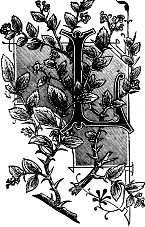
LAST Sunday you heard how God made the world, and put a man and woman to live in it. The man was named Adam; the woman was named Eve. God gave them a beautiful garden to live in, full of trees and flowers; and they had no pain, no trouble, nothing to vex them. Only one thing God told them: there was one tree whose fruit they must not eat. They might eat the fruit of all the other trees, but not of that one. As long as they obeyed, all was well and happy with them; but if they ate it they would die. But a bad spirit came and took the shape of the serpent, and talked to Eve. He told her a wicked lie—he told her that to eat the fruit would make her wise, and would not make her die. And Eve listened, and did eat. And she gave Adam, and he also ate; and so they took the bad spirit for their master instead of the good God. Then God was angry with them, and put them out of the garden, and let them be weak and sickly, and die at last.
It was a sad thing for us. For if they had been good and obeyed God, and not the bad spirit, it would have been easy for us to be good, and we would not have the devil tempting us to do wrong: we would never have known pain or sorrow. But God pitied Adam and Eve; and he promised them[Pg 23] that the Seed—that is, the Son—of the woman should bruise the serpent's head, and set them and their children free.
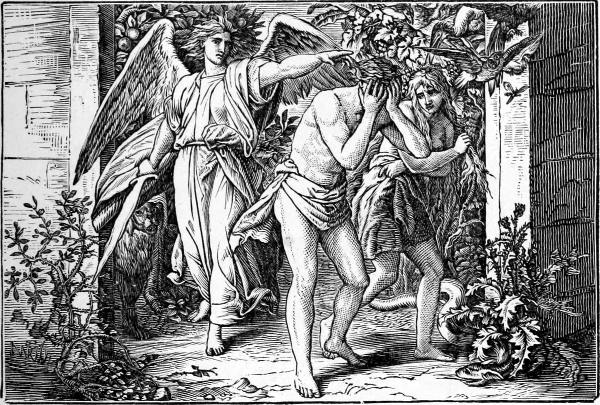
ADAM AND EVE DRIVEN OUT OF THE GARDEN OF EDEN.—Gen. 3:23, 24.
Our Blessed Lord Jesus Christ, the Son of God, set us free when He died on the cross and rose again; and now we belong to Him, and not to the bad spirit. Only we must try and ask Him to help us not to do what is wrong, as Eve did, or we shall not keep free from the power of the enemy.
QUESTIONS.
1. Who was the first man? 2. Who was the first woman? 3. Where did God put them? 4. What was the one thing they might not do? 5. What was to happen if they ate of that fruit? 6. Who came and spoke to Eve? 7. What shape did the bad spirit take? 8. What did he tell Eve? 9. What did she do? 10. Whom did she make her master? 11. What was done to punish her? 12. What sad things did the bad spirit bring on her? 13. Who came to set us free from the bad spirit?
SECOND READING.
"And behold, I, even I, do bring a flood of waters upon the earth."—Gen. 6:17.

THE Lesson this morning told the sad history of how Adam and Eve did the very thing that God forbade; so that He drove them out of the Garden of Eden, and sin and death came into the world.
After that they had children. Some were good, but not so good as Adam and Eve had been at first; and some were bad. And as time went on the bad ones grew worse, and the good ones were tempted, and many of them grew wicked too. And so all the world was getting wicked, and God saw nothing but evil when He looked down on it. And He said that He would destroy these wicked people, and wash away the evil from the earth by a great flood. But there was one good man, whose name was Noah; and God said He would save him.

AFTER THE BANISHMENT FROM EDEN.—Gen. 3:19.
He bade Noah build an Ark. It was to be a great ship, all made of wood, and it took a great many years to build; and all that time people laughed at Noah, for they would not believe that anything was going to happen. Noah made the Ark, and stored it with food. And God sent him a pair of all sorts of animals that were in the world, and he put them into pens in the Ark. Then Noah and his wife, and his three sons, Shem, Ham, and Japhet, and their wives, went into the Ark, and God shut them in.
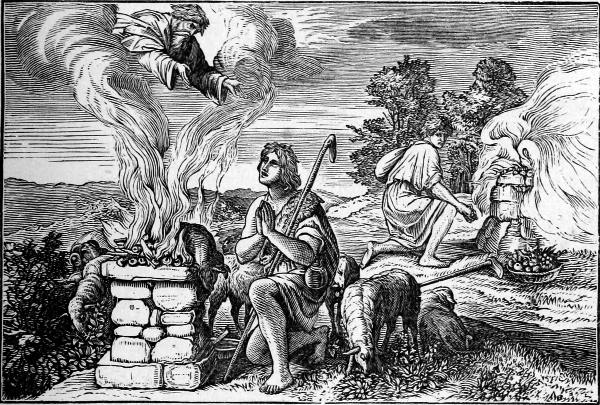
SACRIFICE OF CAIN AND ABEL.—Gen. 4;4, 5.
Then it began to rain. It rained for forty days and forty nights without stopping, and the rivers came out of their banks, and the sea came upon the land, and the ground was covered up. Even the tops of the highest hills were hidden, and everybody and every creature was drowned—all but Noah and those that were with him. There was the Ark all the time floating quite safe on the water. The storm could not upset it nor the sea get into it, for God took care of it and all that was in it.
The reason Noah was saved was because, first, he tried to be[Pg 26] good, and not do like the bad people round him; and next, because he believed what God said to him, and went on making the Ark, even when he saw no danger. If we wish God to save us, then we must take care that we do just what we are told—not what seems pleasant now, but what is really right.
QUESTIONS.
1. Do you know why Adam and Eve were driven out of the happy garden? 2. How did people go on after that? 3. How had sin come into the world? 4. What did God say He must do to the world? 5. Why? 6. Who was to be saved? 7. What was Noah to make? 8. What was the Ark like? 9. What were put in it? 10. Why were two of all creatures put into the Ark? 11. What men and women were in it? 12. What were the names of Noah's sons? 13. What happened when Noah was in the Ark? 14. How long did it rain? 15. What was covered up? 16. What became of all the people? 17. Who were safe? 18. Where was the Ark? 19. Who took care of the Ark? 20. Why was Noah saved?
THIRD READING.
"So Noah knew that the waters were abated from off the earth."—Genesis 7:2.

IT must have been a sad sight for Noah and his wife and their sons, as the rain went on and on, and the water grew deeper and deeper, and everybody and everything was drowned. Then came a time when nothing was to be seen but water. Wherever they looked all was sky and water; but it had done raining, the sky was blue again, the sun shone by day, the stars by night, and they must have been very glad.
And still the water got lower, till the Ark did not float about,
but stopped, resting on a peak of a mountain, a very high mountain,
and a few bare tops of other hills began to peep out. By-and-by,
Noah opened the window of the Ark and let out a raven. He
never saw the raven again, for a raven eats dead things, and there[Pg 27]
[Pg 28]
were so many dead bodies floating about that it got plenty of food,
and never came back to the Ark that had saved it.
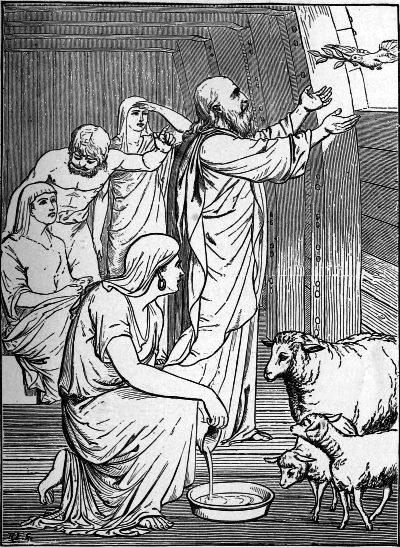
RETURN OF THE DOVE WITH THE OLIVE BRANCH.—Gen. 8:11.
He waited a week, and then he let out a dove. Now doves like trees to sit and nestle in, and they eat grains and seeds; so the poor dove found no place to rest in, and flew back to the Ark; and Noah took her back, and kept her a week, then let her fly again. She flew away but still she came back to the Ark, and this time she brought in her beak a sprig of olive branch.
It was the first green thing that Noah had seen for a year! Noah's children have loved the olive leaf everywhere, and called it the sign of peace and good news ever since.
For now Noah knew that the waters had gone down, and that trees must be able to put forth leaves again. Once more, after another week, he let out the dove, and she did not come back, for she had found a tree where she could make her home, and seeds to eat; and then Noah knew the sad time of the flood—a whole year—was over, and the earth had been washed from all her stains.
QUESTIONS.
1. What was the Flood? 2. What was the Ark? 3. Who was in it? 4. What had Noah with him in the Ark? 5. What became of everyone else? 6. Why? 7. Why was Noah saved? 8. How long did the Flood last? 9. What birds did Noah send out of the Ark? 10. Which came back? 11. Why did not the raven come back? 12. What did the dove bring? 13. What was Noah sure of then? 14. What had the earth been washed from?

THE RAINBOW.
FIRST READING.
"I do set my Bow in the Cloud."—Genesis 9:13.
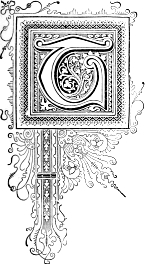
THE sin that came into the world when Eve listened to the tempter had grown as men multiplied and made each other worse. The wicked people had been drowned in the Flood, and Noah, his sons and their wives, had alone been saved in the Ark. After a whole year of being shut up there, watching the earth, first drowned and then coming out of the water, they had just come out on the fresh green earth, with all the animals saved with them, when God spoke to them.
Then God made a promise to Noah. It was that no flood of water shall ever drown all the world again, but spring, summer, autumn, and winter, day and night, will go on to the end of the world, when it shall be burnt up by fire, not drowned by water.
That Noah, and all of his after him, might feel sure that God
in His mercy will go on preserving us, and giving us days and
nights, seed-time and harvest, He gave us something to look at as
a sign of His promise. He so ordered the rays of light, that when
they shine upon drops of water in the air they cause beautiful
colors, making part of a circle, so as to form a bow. So when the[Pg 30]
[Pg 31]
sun shines on a cloud, as it rains, the fair bright rainbow is seen,
as a pledge to us of God's merciful care and love to us.

NOAH AND HIS FAMILY LEAVING THE ARK.—Gen. 8:18, 19.
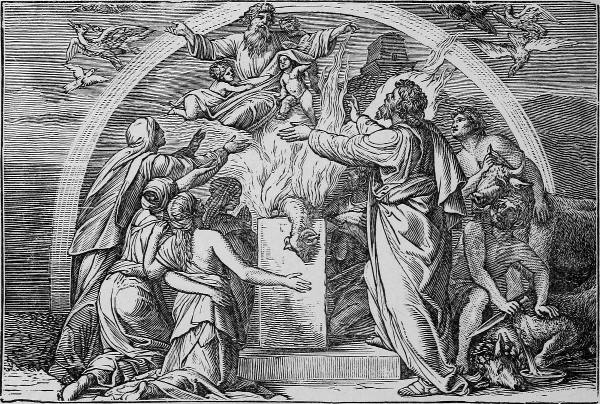
NOAH'S SACRIFICE AFTER THE FLOOD.—Gen. 8:20.
There is a rainbow round about the Throne of God in Heaven; and the lovely rainbows that we see when the sun shines out, and the showers drift away, are to put us in mind that we are safe under His care, in right of His promise to Noah and his three sons, of whom the whole earth was peopled. We are the children of his son Japhet, and all that was then said to him belongs to us also. We should recollect it, and put our trust in Him, and be thankful when we see the beautiful soft arch that the Hands of the Almighty have bended, looking out of the midst of the dark watery clouds.
QUESTIONS.
1. What beautiful sight do we sometimes see after a shower? 2. What is a rainbow like? 3. Who put the rainbow in the cloud? 4. Who was the man to whom God showed the rainbow? 5. What promise did God make Noah? 6. What had God just done to the wicked people? 7. Whom had he saved? 8. What did he say should always go on? 9. What did God put in the sky to show that he will not send another Flood? 10. What are we to think of when we see a rainbow? 11. Who takes care of us? 12. Where is there a rainbow in Heaven above?
SECOND READING.
"In thee shall all families of the earth be blessed."—Genesis 12:3.

WHEN Noah's grandchildren and great-grandchildren came to be more and more, and the world was being filled with people again, they still were not all good, and the longer time went on the worse they grew.
At last God called to a very good man, whose name was Abram, and told him that if he would come away from his home to a land God would show him, then God would bless him and lead him, and by-and-by give the land to his children, and that their children after them should be more in number than the[Pg 32] grains of sand on the sea-shore, or than the stars in the sky: and that in his seed—that was, in a Son of his—all the nations of the earth should be blessed.
It was strange to hear all this about Abram's children, for he was growing old, and he and his wife Sarai had no children at all. But he believed in God. He knew that God is Almighty, and can do whatever He will; so he only did just as God told him, and went away from his home, where God told him. He was obliged to take all his cattle with him—quantities of cows, and goats, and sheep, and camels; and he had many servants to drive them.
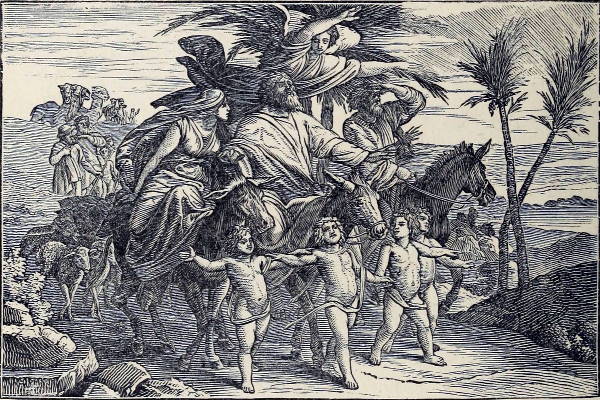
ABRAM SEES THE PROMISED LAND.—Gen. 12:3-7.
When they came to a piece of grass and a fresh spring of water, there they would stop. They had no houses—only tents, which were great curtains woven of goat's hair and fastened up with poles, so that they could be set up or taken down, and carried about. All his life Abram lived in a tent, instead of staying at home in a city, and being at his ease.
By-and-by he came to a beautiful country. There were high hills rising up, and green valleys between, full of grass for the sheep and cattle; and the wide sea spread out far away towards the sunset, all blue and glorious. God told him to look at the land, for that was the place which his children should have for their own; but in the meantime Abram had not one bit of it, and was a stranger there; and he had no child either.

MELCHIZEDEK BLESSING ABRAM.—Gen. 14:18, 19, 20.
But still he was quite sure that God spoke truth; and that somehow, though he did not know how, it would come about that his children should have the land, and that in One all the nations of the earth should be blessed. That was faith.
QUESTIONS.
1. What good man do you hear of to-day? 2. What did God tell Abram to do? 3. What did God promise? 4. Who were to have the land? 5. Why was it strange to hear of his children? 6. But did he believe it would come true? 7. Why did he believe it? 8. How did he show that he believed? 9. Where did he go? 10. What had he with him? 11. What did he live in? 12. What is a tent like? 13. What sort of place did he come to?
THIRD READING.
"Let there be no strife, I pray thee, between thee and me."—Gen. 13:8.

TWO men were travelling together. They were an uncle and nephew. The uncle's name was Abram, the nephew's was Lot. They had come from home, because God had told Abram to come away from his own home to the land that God would give his children. Abram believed, and did as God bade him; and Lot, the son of his dead brother, went with him. They did not go alone. Each of them had great flocks of cows, and sheep, and camels, and goats, and numbers of servants to take care of them. They would fix their tents, made of camels' hair, in any place where they saw a spring of water and good green grass for their cattle; and there they would stay till all the grass was eaten up, and then take up their tents and move to another place.
PARTING OF ABRAM AND LOT.
Just now they had got to a bare stony place, where the sun shone hotly, and there was not much green; but Abram had built up an altar with the great stones, and prayed there. Abram and Lot loved one another, and were at peace; but when their servants drove out their flocks to get food and water there were apt to be quarrels. If Abram's men found a green grassy valley, they would not let Lot's cattle into it; and if Lot's came to a well, they would not let Abram's flocks drink; and so on. They were always quarrelling and making complaints to their masters.
At last Abram saw that they would make Lot quarrel with him. So he said it would be wiser to part; Lot should go one way and he another—any way there should be no strife. And he even told Lot to choose which way he would go. So Lot looked, and saw to the East a pleasant green valley, with fields of corn and mea[Pg 35]dows, and a fine river running into a clear lake, and five fine towns on the bank. He liked it better than the bare stony hills where Abram was; and he never thought whether the people were good or not, but he took the first choice, and went to live there. So Abram gave up. He had the right to choose first, but he would not use it. He let his nephew choose. For he hated quarrels, and knew they were wicked; and he knew how to stop them, because he would yield up the best. That is the way to make peace and please God.
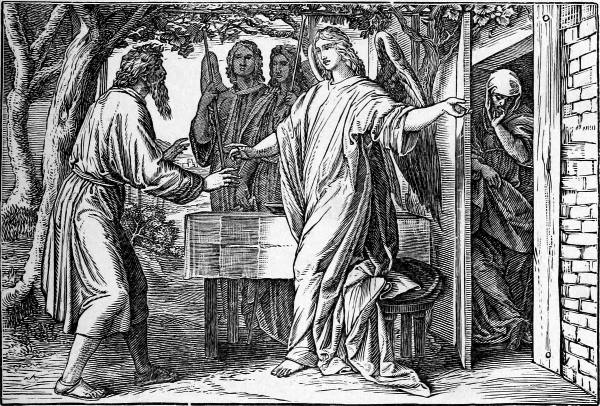
ABRAHAM ENTERTAINS THREE ANGELS.—Gen. 18:10.
QUESTIONS.
1. Who had called Abram? 2. Who went with him? 3. What was Lot to Abram? 4. Why did he go? 5. What had God promised? 6. What had they with them? 7. Who quarrelled? 8. About what did the servants quarrel? 9. Did Abram and Lot quarrel? 10. How did Abram prevent a quarrel? 11. Who was to choose first? 12. Who might have chosen first? 13. Why did not Abram choose first? 14. Ought you to be in haste to take the first choice? 15. What should you try to hinder? 16. And if you keep yourself back, and don't say "It's mine," and "I must," shall you not be likely to keep from quarrels?
ABRAHAM AND LOT.
FIRST READING.
"Escape for thy life; look not behind thee."—Genesis 19:17.

THERE was a beautiful valley, with steep hills shutting it in on all sides, and a clear swift river running through the midst and spreading into a lake. There were fine fields and rich grass, where sheep, cows, and goats could feed, and the shepherds shelter themselves under the palm trees; and on the bank of the river were five cities, with strong walls round them, and full of rich people, who bought and sold and made merry with the good things they possessed. There was one man living among them who was good, and was grieved by the wicked ways of the men round him, who only laughed at him if he tried to tell them of better things. One evening two strangers came into the city where he lived, and he was the only person who would take them in, and shelter them from the wicked people in the street.
Those strangers told him the place was to be destroyed, with all that were in it, because it was so wicked! Though the fields looked so quiet, the walls so strong, and the sun had gone down as usual, all would be ruined in a few hours' time! Then the strangers took hold of him, and his wife and daughters, and led them almost by force away from their home in the dawn of morning, bidding them escape for their lives to the mountain, and not[Pg 37] look back. They were frightened, and begged not to have to go so far as the wild mountain. Might they not go to the little city near at hand? And their wish was granted.
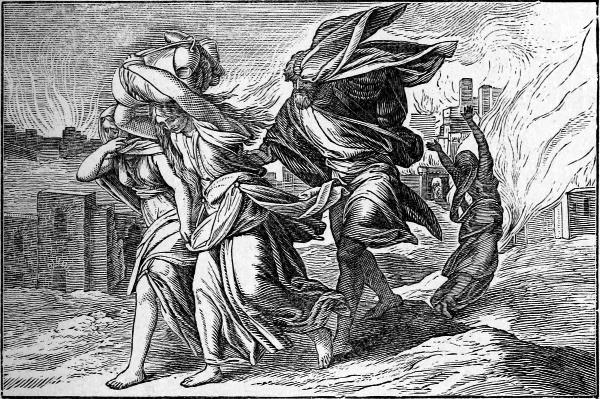
LOT AND HIS FAMILY FLEEING FROM SODOM—Gen. 19:24-26.
Just as the sun had risen they entered the little city for which they had begged; and as soon as they were safe the four towns, that had seemed so strong and firm, were all burning with fire and brimstone; and all the sinners who had mocked at warning were soon lying dead under God's awful anger! Four alone had been led out of the city by the strangers, but even of these only three came into the city of refuge. The wife did not heed the warning not to linger nor look back, the deadly storm overtook her, and she remained rooted to the spot—a pillar of salt!
The names of those cities were Sodom and Gomorrah, and the one good man who was saved by the mercy of God was named Lot. And now a strange gloomy lake called the Dead Sea covers that valley with its heavy waters, and the bare rocky hills, crusted with salt, show that the curse of God is on the place.
Let us try to carry home one thought from this terrible history. This world will one day be burnt up like those cities, and its looking safe and prosperous now does not make it safe. But God sends messengers to lead us out of it. If we attend to them, and follow their advice, we shall through all our lives be getting out of danger, and going on to a safe home in heaven; but if we care only for pleasant things here, it is like looking back, and our souls will perish with what they love. That is why our Saviour bade us "Remember Lot's wife." We should remember her when we are tempted to think it hard to give up anything pleasant, because we are told that it is wrong, and may put us in danger of God's anger.
QUESTIONS.
1. What was the name of the place I told you of to-day? 2. What was the name of the man? 3. What kind of place was Sodom? 4. Who was the only good man there? 5. Who came to Lot? 6. What did he do for the strangers? 7. What did the strangers tell Lot? 8. Why was Lot to come out of Sodom? 9. Why was Sodom to be destroyed? 10. Where did Lot go? 11. Who looked back? 12. What became of her? 13. What did God do to Sodom? 14. What sort of a place is it now? 15. What will be burnt up some day? 16. If we are not good, what will become of us? 17. But what have we to teach us to be good? 18. And how must we try to come out, like Lot?
SECOND READING.
"Now I know that thou fearest God, seeing that thou hast not withheld thy son, thine only son from Me."—Genesis 22:12.

BY-AND-BY Abraham had a son—one only son, whose name was Isaac. All the promises God had made were to be for Isaac's children after him: and Abraham loved God, and hoped all the more.
But then God called Abraham to do a strange and terrible thing. He was to go and take his dear son Isaac to the top of a hill, and there to offer him up to God as if he[Pg 39] had been a calf or a lamb. Of course, in general, to do such a thing would be shockingly wicked; but Abraham knew that when God commanded a thing, it must be right to do as he was bidden, however dreadful it was to him.
So they set out together. Abraham took the knife, and a vessel with fire in it and Isaac carried the wood with which the sacrifice was to be burnt. On the way Isaac said, "My father, behold the fire and the wood: but where is the lamb for a burnt offering?" And Abraham answered, "My son, God will provide Himself a lamb for a burnt offering."
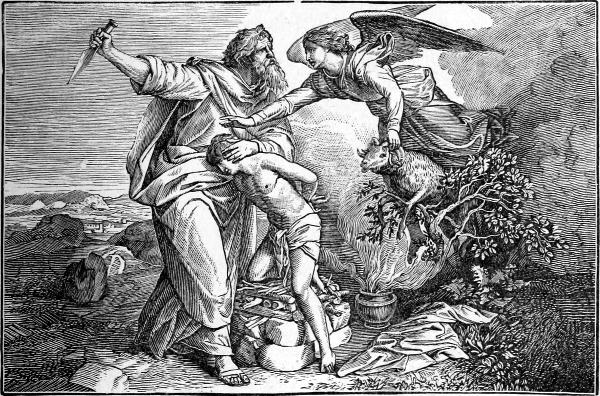
ABRAHAM OFFERING ISAAC AS A SACRIFICE.—Gen. 22:11, 12.
Isaac soon knew he was to be the lamb, for his father put
the wood in order, and bound his limbs, and took the knife. And
Isaac did not complain or struggle. He was ready, like his father,
to do the will of God. But just as Abraham had the knife ready to
slay his son, an angel called to him out of Heaven: "Lay not thine
hand upon the lad, neither do thou anything unto him: for now I[Pg 40]
[Pg 41]
know that thou fearest God, seeing thou hast not withheld thy son,
thine only son from Me."
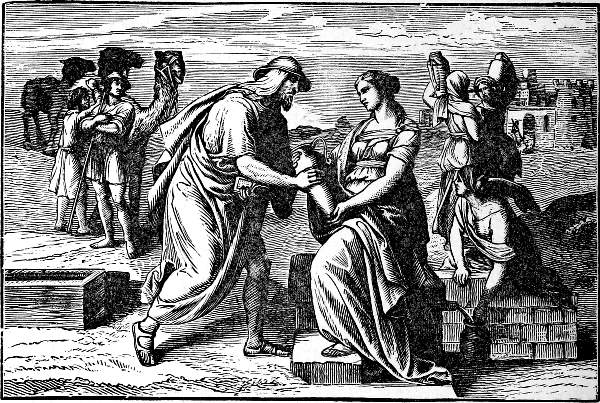
ABRAHAM'S SERVANT MEETING REBEKAH AT THE WELL.—Gen. 24:17.
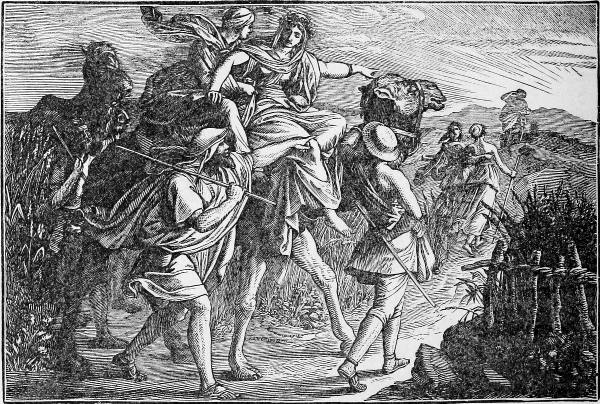
REBEKAH SEES ISAAC COMING TO MEET HER.—Gen. 24:64, 65.
Then Abraham unbound his son, and was glad as if Isaac had really risen from the dead. And he saw a ram caught in the thicket by its horns; so he took that, and offered it up instead of Isaac. Thus God really provided a lamb for a burnt offering.
And He blessed Abraham more and more, and promised again that his children should have the land, and that in his Seed should all the nations of the earth be blessed. That Seed was our blessed Lord Jesus Christ, who, you know, was really given by His Heavenly Father to die, and then came back from the dead, that all people might be saved by Him.
QUESTIONS.
1. What was the name of Abraham's son? 2. What had God promised Abraham? 3. What had Abraham done at God's command? 4. What was he now to do? 5. Whom did he obey? 6. Where was he to go? 7. Who went with him? 8. What did Isaac ask? 9. What did Abraham answer? 10. Who seemed likely to be the Lamb? 11. What was Abraham just going to do? 12. Who called him? 13. What did the angel tell him? 14. Why was God pleased with him? 15. What blessing did God give him? 16. Who was to be saved?
THIRD READING.
"I am a stranger and a sojourner with you."—Genesis 23:4.

ABRAHAM and his wife Sarah had lived together many years; but at last Sarah died, and Abraham wanted to bury her. You know in all the country he had not one morsel of ground of his own; he was a stranger there, but he knew it would all belong to his children by-and-by. But he wanted to make sure of the one bit where his wife should lie. So he went to the prince to whom Hebron belonged, and begged to buy a field with trees in it, and a rock where there was a deep cave that was called Machpelah.
The prince said he would give it; but Abraham could not feel sure that it would be always safe till he had bought it. So he weighed out the price. It was not in little bits of money like ours, but lumps of silver all the same weight, and each with a mark stamped on it—four hundred of them. Then the cave was given to Abraham, and he had his good true wife Sarah buried there, rolled in linen with spices. He was buried there afterwards himself, and so was his son Isaac, and Isaac's son after him, in the cave of Machpelah.
That cave has been kept sacred ever since. There is a building over it now, and no stranger is allowed to go into it; but deep down there is a golden grating, and far within lie these holy men and women of old. Their bodies are waiting to rise again at the Last Day, and then I hope we shall see them and know them.
QUESTIONS.
1. Who was Abraham's wife? 2. Where did Sarah die? 3. What did Abraham want to do? 4. Had he any ground? 5. So what was he obliged to do? 6. Of whom did he buy the place? 7. What was it called? 8. What is a cave? 9. What did he pay? 10. What was Abraham's money? 11. Who were buried there afterwards? 12. How is the place marked now? 13. When will Sarah's body leave the grave in the cave of Machpelah? 14. What do you say you believe in? (In the eleventh Article of the Creed.) 15. What is Resurrection?

JACOB'S JOURNEY AND DREAM.
FIRST READING.
"Bless me, even me also, O my father."—Genesis 27:34.
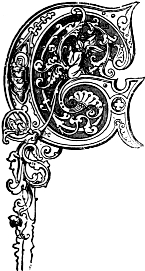
GOD had called Abraham from his home, and promised to give his children the land of Canaan, and that in his Seed all the nations of the earth should be blessed. This was renewing to Abraham the great promise of the Seed of the woman that had been made to Eve; and Abraham believed, and was glad. But though his children were to have the land, none of it was his; and he went up and down in it a stranger, living in his tent, without house or home, only trusting in faith to God's promise to his children. His son Isaac lived like him, with no home, but looking on in faith to what God promised.
Isaac had two sons; and as Esau was the eldest, he had the first right to these promises. But Esau did not care enough about them; he did not seem to get anything by them, and he liked what he could get at once better than what was a long way off. He had no faith.
One day he came home half dead with hunger, and saw his brother Jacob making soup over the fire. He said he would give all these rights for a meal of the soup; for if he died of hunger, what good would his birth-right do him? So for a mess of pottage he sold his right to the land of Canaan, and to be the forefather of our Saviour.
A time was to come when he would be sorry for what he had[Pg 44] done. His father was old and blind, and thought he was going to die; so he bade Esau, whom he loved the best, bring home some meat and make a solemn feast—which was the way then of giving a blessing. Esau went, and in time brought home the meat to his father; but when he came in, Isaac cried out, and trembled! His brother Jacob had come in his stead, and Isaac had taken him for Esau, and given to him the blessing that gave the right to the promised land, and to all God's promises!

ISAAC BLESSING JACOB.—Gen. 27:28, 29.
Then Esau cried out with an exceeding bitter cry, and asked if his father had but one blessing! Isaac was grieved for him, and blest him with all his heart; but there was no changing back, no taking away what Jacob had won and Esau had lost.
Esau did not know what he was doing when he took the pottage at once, rather than wait patiently for the glorious inheritance that was to come. This was the reason that he was allowed to be so cruelly disappointed. This is a warning to us. We have the inheritance of the kingdom of heaven promised to us; but we[Pg 45] are tempted not to care about it when we want something here in this world, whether play, or dress, or anything that seems a great deal to us now.
But if we trifle away our right to these great promises that God made us at our baptism, there will come a time of bitter grief, when it is too late. And when we are dead, it will be too late to change! Therefore, now while we are alive, we must have faith, and show it by taking care that the things we like here on earth do not make us lose the better things in heaven.
QUESTIONS.
1. What were the names of Isaac's two sons? 2. What had God promised Isaac? 3. Which son had the first right to the promise? 4. But which cared about it most? 5. What did Esau want? 6. So what did he give up for the sake of the soup? 7. Could he get it back again? 8. What are you an heir of? 9. How could we lose the inheritance of the kingdom of heaven? 10. Shall we be able to change after we are dead? 11. Then what must we care about most? 12. Why could not Esau get his father's blessing? 13. What did he like better than waiting for what he could not see? 14. Can we see heaven? 15. But when we get there, will it not be better than anything we can see here?
SECOND READING.
"This is none other but the house of God, and this is the gate of heaven."—Genesis 28:17.

YOU know that Isaac, Abraham's son, had two sons, whose names were Esau and Jacob. Now Jacob had grieved Esau by gaining God's great promise, for which Esau was so angry with him, that he had to go out away from his father's home, all alone. But Jacob knew he was not alone, for God was with him. He went on till night came. Then he was in a dismal stony place, with no house or shelter near—only big stones, and here and there a thistle.
He said his prayers, and then he lay down, with a stone for[Pg 46] his pillow and the sky over him. But in the night he saw a wonder. There was a ladder reaching from earth to heaven, and God's angels were going up and down, and the Lord Himself stood at the top of the ladder. And He told Jacob that He was going to give his children all the land he saw—North, South, East, and West; and that He would take care of him, and be with him wherever he went, and in time bring him safe home.
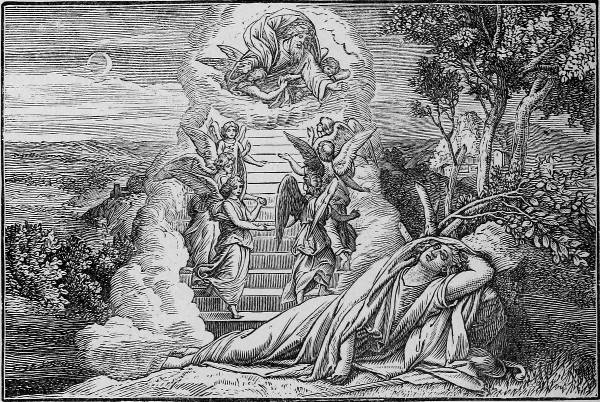
JACOB'S VISION OF ANGELS.—Gen. 28:12, 13.
Jacob woke, and found it was a dream, but he knew it was true, and that God had really spoken to him; and though he was glad he was afraid, and he said, "How dreadful is this place! this is none other but the house of God, and this is the gate of heaven." And that he might always know the place, he put one of the great stones upright, and he took some of the sweet olive oil he had brought to eat on his journey, and poured it on the stone, as the only thing he could do to show honor to God.
Then he made a solemn holy vow, that if God would take care of him on his way, and give him food to eat and clothes to wear,[Pg 47] he would make a gift to God all his life of the tenth part of all he had. Good people like to do like Jacob, and give God their tenth. And if we only had our eyes opened to see, like his, we should see God's angels coming up and down with blessings for us, for we go to the house of God and gate of heaven whenever we go to church. Let us recollect how awful Jacob felt it to be so near to God.
QUESTIONS.
1. Who was Jacob? 2. Who was Isaac? 3. Who was Esau? 4. Why was Jacob obliged to go away? 5. What was the promise? 6. What kind of place had he to sleep in? 7. What was his pillow? 8. But what did he see? 9. Who went up and down? 10. Who stood at the top? 11. What did God promise him? 12. What did Jacob say of the place? 13. How did he mark it? 14. What did he pour on the stone? 15. What vow did he make? 16. What are the houses of God? 17. Who comes up and down to us? 18. What do the angels bring us? 19. How much did Jacob promise to give God? 20. What does God do for us?
THIRD READING.
"As a prince hast thou prevailed."—Genesis 32:28.

IT was a long journey that Jacob had had to take, but God took care of him, and brought him safe to the home where his mother had come from. He lived there, and took care of his uncle's sheep and cattle, till he had earned a great many for his own; and he had married there, and had a great many sons. But after a time God commanded him to go home to the land of Canaan. He was afraid, because he thought his brother Esau might still be angry with him; but, in spite of his fear, he did as God bade him.
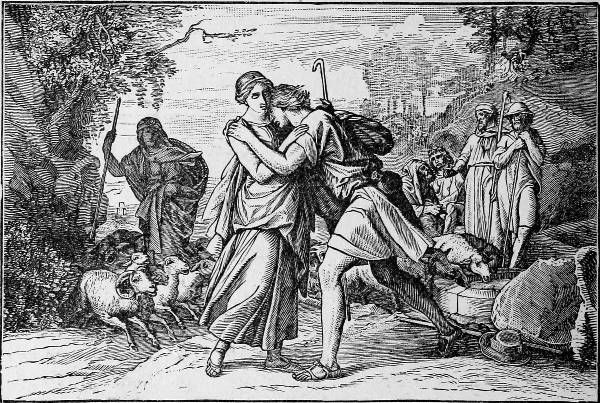
JACOB MEETING RACHEL.—Gen. 29:10-12.
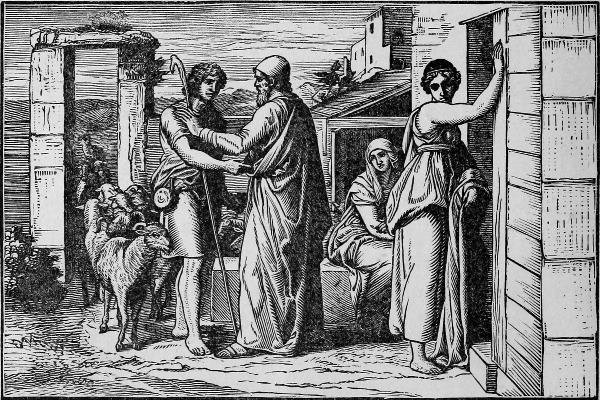
LABAN HIRING JACOB.—Gen. 29:18, 19.
When he came near the river Jordan, which flows on the East
side of the land of Canaan, he prayed to God to guard him, and
once more God let him see the angels who were going with him to
protect him. He was glad, but he was still very careful. He
[Pg 48]
[Pg 49]chose out a present of cows, and goats, and camels, and sheep,
for Esau, and sent it on to meet him; and then he sent on
the other cattle he wanted to keep for himself; then his children;
and last of all, in the safest place, his dear young son Joseph.
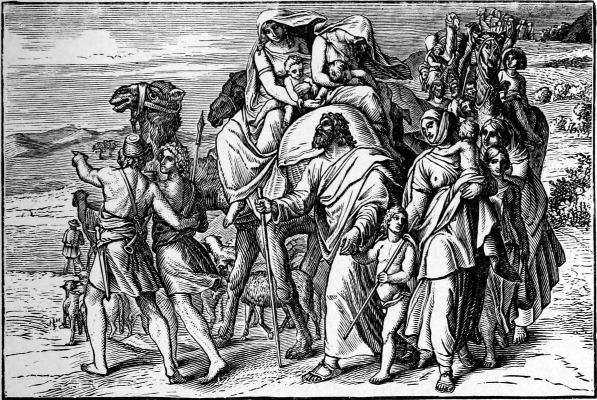
JACOB'S DEPARTURE FOR CANAAN.—Gen. 31:17, 18.
Esau came to meet him, but not in anger. The two brothers met, and fell on one another's neck and kissed one another, and were friends. So God had kept His promise to take care of Jacob; and Jacob kept his promise, for he set up an altar at Bethel, where he had seen the angels before, and praised and blessed God.
QUESTIONS.
1. Who was Jacob? 2. Why had he left home? 3. With whom did he go to live? 4. What did he earn there? 5. Why did he go back? 6. Why was he afraid? 7. What comforted him? 8. Of whom do God's angels take care? 9. What did he give Esau? 10. How did he put his family in order? 11. Who went last? 12. How did Esau meet him? 13. What was the quarrel between them? 14. But was Esau angry? 15. How did Jacob show he was thankful?
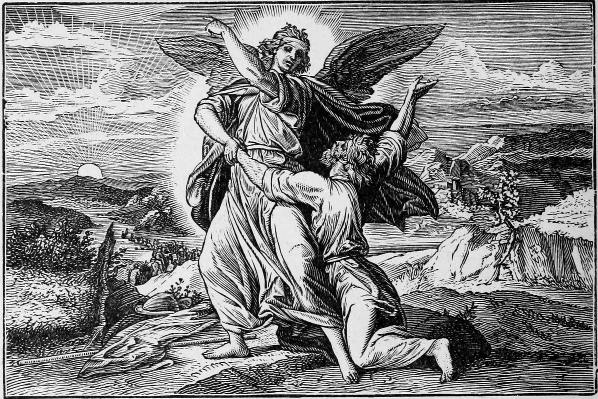
JACOB AND THE ANGEL.—Genesis 32:24.
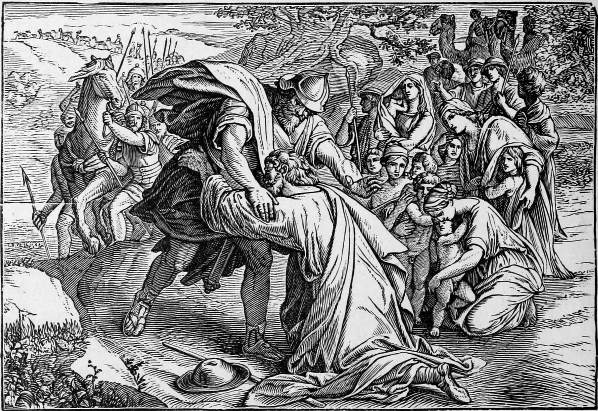
THE MEETING OF JACOB AND ESAU.—Gen. 33:3, 4.
JOSEPH IN EGYPT.
FIRST READING.
"His brethren envied him."—Genesis 37:11.

I TOLD you how Jacob went away from home, and how God promised to take care of him. He did take care of him: He led him to his uncle, and with him Jacob lived many years, and then came back with flocks of sheep and goats, camels and cows. And he had twelve sons. The best one of them was named Joseph. Jacob loved him very much, and gave him a striped dress of many colors, such as the son who is to be the heir wears in those countries. But his brothers hated and envied him, and were all the time finding fault with him.
One day, when Joseph was seventeen years old, ten of the brothers were out with their sheep, and Jacob desired Joseph to go and see what they were about. He would not tell his father how unkind they were to him, but he went; and as they saw him coming some of them were so wicked as to say that they would kill him, and never let him go home. Reuben, who was the eldest brother, tried to hinder them; but when he saw he could not stop them, he said the best way would be, not to kill him, but to let him down into a dry well just by.
There they meant to let him starve to death; and they let him[Pg 52] down without any pity for him. Reuben meant to come by-and-by and take Joseph out of the pit and save him; but there was another brother, named Judah, who did not want to have him killed, and who saw a great party of men, with camels and asses laden with goods, going on a journey. He knew they were merchants, going to sell and buy in Egypt, and he advised the other brothers to persuade them to buy Joseph; for in those days men and women used to be bought and sold, and were called slaves.
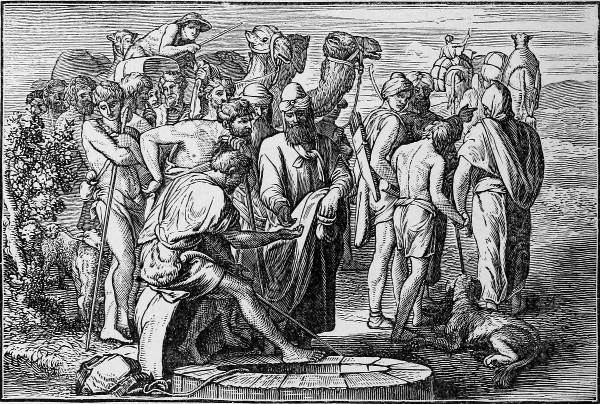
JOSEPH SOLD BY HIS BRETHREN.—Gen. 37:28.
So Joseph was drawn up out of the pit; and when the merchants saw what a fine young man he was, they paid the price for him and carried him off, away from his father and all he had ever known or cared for before. The cruel brothers kept his colored dress; and they killed a kid and stained it in the blood, and then carried it to their father, telling him they had found it. Jacob thought some wild beast had met Joseph and killed and eaten him, and he mourned and wept. His sons pretended to comfort him; but not one of them would tell him that Joseph was not dead.
QUESTIONS.
1. Whose son was Jacob? 2. How many sons had Jacob? 3. What did he set them to do? 4. Which did he love best? 5. What did he give Joseph? 6. Where did he send Joseph? 7. What did the brothers want to do? 8. Who wished to save him? 9. So what did Reuben persuade them to do? 10. What did Reuben mean to do? 11. But who came by? 12. What did the brothers do with Joseph? 13. Who persuaded them to sell him? 14. What are people called who are bought and sold? 15. What was done with his coat? 16. What did Jacob think?
SECOND READING.
"The Lord made all he did to prosper in his hand."—Genesis 39:3.

SO we see Joseph a slave. A slave is a servant who belongs to his master, as his cows and horses do; he gets no wages, and cannot go away, but is bought and sold like cattle.
Think of poor Joseph. He was used to live as the son of a great rich prince, wearing a dress of many bright colors, with many servants, and no one to obey but his kind fond father; and living in a beautiful land, all hill and valley, where he used to feed his father's flocks. But now he was a slave in a strange land, with people speaking a language he did not know, and no one to care for him or say a good word to him, shut up in a house in a town, far away from his dear hills.
Still he had one comfort, and the best of all—God was with him. He could still pray to God, and do his duty. And he did his work well, for God helped him, and everything he did was made to prosper in his hand. Then he was trusted. His master knew that he always took care of everything, as if it was his own, and left all to him, quite sure that it would be safe.
But his wicked mistress made up a story that he had behaved ill, and he was put in prison for what he had not done. This sounds hard, but it was God's own way of bringing good to pass,[Pg 54] and making Joseph come at last to honor. Very soon he was loved and trusted in his prison; and all he did the Lord made it to prosper.
Think about this. Try when you have anything to do—a lesson or a bit of work—to ask God to make it prosper. Then if you try your best He will help, and it will be sure to turn out well.
Then try to deserve to be trusted. That is a great thing. If you always recollect that God sees you, you will do the same when no one is with you as if all the world were watching; and that is the way to be true and just in all your dealings. If you are only good when you are looked at, you are not like Joseph, but are only doing service outwardly. You must try to live that your parents may
QUESTIONS.
1. Whose son was Joseph? 2. How many sons had Joseph? 3. What had they done to him? 4. Why had Joseph's brothers sold him? 5. What is a slave? 6. How did Joseph behave as a slave? 7. Who comforted him? 8. How did he take care of his master's things? 9. Who made up a story against him? 10. What was done to him? 11. But who was with him still? 12. Did he always stay in prison? 13. And what did people think of him, wherever he was? 14. What is the way to be like Joseph? 15. If you are trusted to carry a message, how should you do it? 16. Who always sees you? 17. Then, even if no one is by, how should you behave?
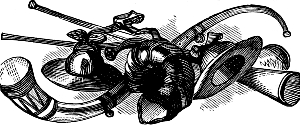
THIRD READING.
"Do not interpretations belong to God?"—Gen. 40:8.

THE young son of Jacob, Joseph, had, you know, been sold by his cruel brothers, and made a slave of; and then a wicked falsehood was told about him, and he was put into prison. But wherever Joseph was he tried to do his duty, and so God blessed him; and the keeper of the prison soon found out how different he was from the others, and let him help. I suppose he helped to carry them their food and wait upon them; and he often could say a few kind good words to them.
One day two grand people came in as prisoners. One was the chief of all the bakers, who made bread for king Pharaoh; and the other was the chief of all his cup-bearers, who carried him his wine. Some wrong thing had happened, and they were both suspected of having had something to do with it, so they had been sent to prison.
WANTED TO KNOW THE DREAMS' MEANING.
One morning Joseph saw them both looking more sad than usual; and when he asked what was the matter, they said each had a dream, and they wanted to know what it meant; for the Egyptians used to think a great deal of dreams, and there were men among them who pretended to explain them. Most dreams have no meaning, but these had, and God put it into Joseph's heart to understand them.
The cup-bearer had dreamt that he saw a vine, and that it had three bunches of grapes, and that he was squeezing the juice into the king's cup as he used to do. Joseph said this meant that in three days the cup-bearer should really hand Pharaoh the cup again; and Joseph begged that when he was free, he would tell the king about himself, and get him set free.
Then the baker told his dream—that he had three baskets full of pastry and bread ready for Pharaoh, but that the birds came down and ate them up. Joseph was obliged to tell him that this meant that he would be hanged, and that the vulture and ravens would eat his flesh. So it happened. Pharaoh looked into the matter in three days' time; he caused the baker to be hung, and the cup-bearer to come back to his old place. But the cup-bearer was ungrateful, and forgot all about Joseph in his prison, trusting to him.
QUESTIONS.
1. Who was Joseph? 2. Where was he? 3. How came he to be in Egypt? 4. Where had he been put? 5. Had he done anything wrong? 6. Who trusted him? 7. What had he to do? 8. Who came into the prison? 9. What was the cup-bearer's dream? 10. What was the baker's dream? 11. What did Joseph say the cup-bearer's dream meant? 12. What did the baker's dream mean? 13. What happened? 14. What had Joseph asked of the cup-bearer? 15. Did he remember?
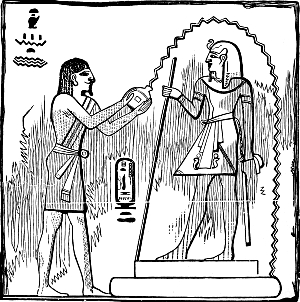
POURING OUT A DRINK OFFERING.
JOSEPH'S BROTHERS.
FIRST READING.
"We are verily guilty concerning our brother."—Genesis 42:21.

JOSEPH did not always stay in prison, for God gave him wisdom to tell the king of Egypt that his dreams had meant that there were going to be first seven years of very fine harvests, and then seven years would come of no harvests at all. So the king took him out of prison, and made him a great lord; and he set to work to buy the corn that was over and above what people wanted to eat in the years of plenty, that he might store it up against the years when the corn would not grow.
So when the bad harvest began, Joseph had plenty of corn, and he sold it for the king to all who wanted it. The famine was not only in Egypt, but in all the countries round; and by-and-by Joseph saw, among the people that came to buy, ten of his own brothers—the same who had sold him for a slave.
He knew them, for they still looked like shepherds; but they did not know him, for he had grown from a youth to a man, and was dressed like an Egyptian lord; and he would not seem to know them, though he wanted much to know what had become of his old father and his little brother Benjamin. He made as if he thought they were enemies, come to see if Egypt could be conquered when it was so bare of food.
Then they told him who they were; that they were all one man's sons, and that one brother they had lost; the other was left[Pg 58] with his father, who could not bear to part with him. Joseph would not seem to believe this, and said he must keep one of them in prison, while he sent the rest back to fetch their youngest brother, or else he could not believe them.
Then, when fear and trouble came on them, they began to think how ill they had used their lost brother Joseph; and they said to each other, "We are verily guilty concerning our brother." Joseph heard them, and could hardly bear it; but still he kept to his plan. He kept Simeon a prisoner, that he might be sure of the others coming back, and sent them home to fetch Benjamin. But he would not have any of the money they had brought for the corn, and made his steward put it all back into the mouth of their sacks.
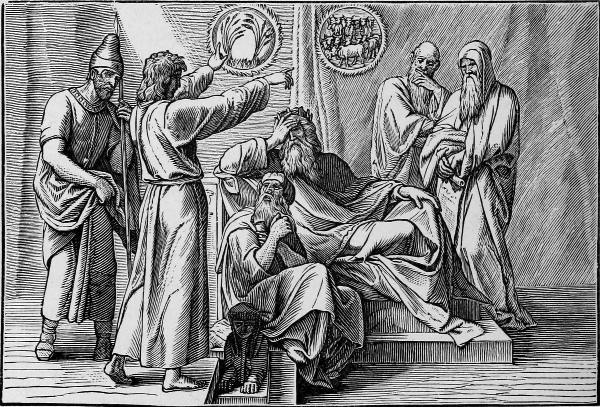
JOSEPH INTERPRETING PHARAOH'S DREAM.—Gen. 41:29, 30.
When they found this out as they went home, they were much afraid; and when they came home, their father was more afraid still. After the way they had used Joseph, he thought they had killed Simeon, and wanted to kill Benjamin. They spoke truth now, but he could not believe them; and he said he could not send[Pg 59] Benjamin, for if mischief should befall the lad, "then shall ye bring down my gray hairs with sorrow to the grave."
QUESTIONS.
1. Where was Joseph? 2. Why was he in prison? 3. What did God make him able to tell the king? 4. How many years was there to be much corn? 5. What was to be done with the corn? 6. Who managed the buying it? 7. When was the corn wanted? 8. Who came to buy corn? 9. Who did not come? 10. Why did not Joseph's brothers know him? 11. What did he make believe to think? 12. Whom did he tell them to fetch? 13. What did he give back to them? 14. What did their father say about Benjamin's going? 15. Why was he afraid to trust them with Benjamin? 16. What is the way to be believed?
SECOND READING.
"God Almighty give you mercy before the man."—Genesis 43:14.

JOSEPH'S brothers were soon obliged to go again and buy more corn in Egypt. Joseph had said they must bring the young brother they had told him of, or he should not believe their story; and when they said Benjamin must go, their father Jacob was greatly grieved, and showed how little he could trust them now, after the way they had behaved to Joseph. He would not have let Benjamin go at all if Judah had not promised to take the greatest care of him; and Judah could be trusted.
The story is so beautiful, and so easy to understand in the Bible, that I hardly like to tell it in my own words. Only think of Joseph's heart being so full when he saw his own dear youngest brother, that he could not stay with him for his tears, and went away to weep in his chamber! And yet he still tried the brothers. He wanted to see if they still were envious of the one their father loved best; so he made his steward hide his cup in Benjamin's sack of corn, and then go after them, and pretend to think they had stolen it.
The sons of Jacob were no thieves, and they said the steward might search their sacks. They took them down and looked, and there was the cup in Benjamin's sack!
They were all shocked; and the steward said that Benjamin must go back and be punished.
How pleased they would have been long ago if such a misfortune had happened to Joseph! But now their hearts were changed, and they were shocked and grieved.
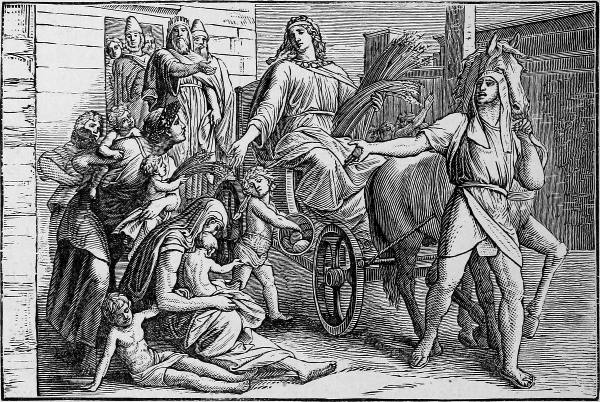
JOSEPH PROCLAIMED RULER OVER EGYPT.—Gen. 41:41, 43.
QUESTIONS.
1. What had Joseph's brothers done to him? 2. What trouble did you hear last Sunday he was in? 3. But how did he behave? 4. And what had he come to be? 5. What had he stored up? 6. Who came to buy corn? 7. How many brothers came? 8. Which did not come? 9. Why did not Benjamin come? 10. Did the brothers know Joseph? 11. What did he tell them to do? 12. When he saw Benjamin, where did he go? 13. What did Joseph tell his steward to do? 14. What did Joseph want to see? 15. How did the brothers behave this time?
THIRD READING.
"God did send me before you to preserve life."—Genesis 45:5.

ALL the eleven sons of Jacob turned back in grief, and fear, and dismay, when Benjamin, the youngest brother, whom Judah had promised to bring safely back to their father, was found to have the silver cup of the lord of the land in his sack. How it came there they could not guess, but they knew that their father's heart would break if they came home and left Benjamin to be a slave.
So they all came to the lord of the land; and Judah stood up before the strange, stern, princely man, and told him how much their old father loved this youngest son, and he would be sure to die if the lad did not come home safe. And then Judah begged to stay and be a slave in Egypt, instead of his brother Benjamin, for he said if mischief befell the lad his father would die, and that he could not bear to see.

JOSEPH MAKES HIMSELF KNOWN TO HIS BRETHREN.—Gen. 45:2.
But when Judah so spake, the lord of the land sent all the lookers-on away, and wept aloud, and said that he was their own brother Joseph, whom they had sold so long ago. He would not let them be afraid; he embraced them all and wept for joy, and asked for his father. Then he told them not to grieve for what had gone before; for God had turned it all to good, and made him be the means of saving all their lives, by storing up the corn in Egypt.
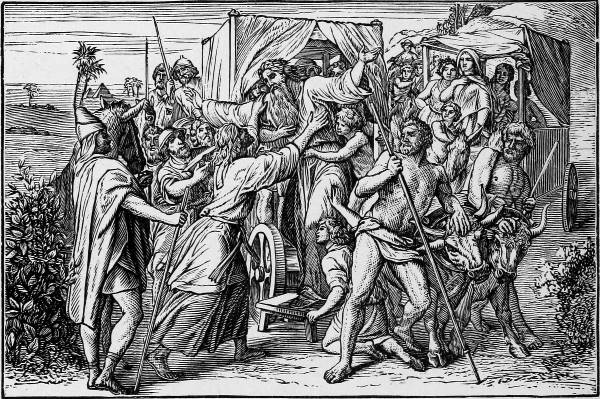
JOSEPH MEETING HIS FATHER.—Gen. 46:29, 30.
And now they were to go home, and tell Jacob, their father, that Joseph was still alive, and was a great and powerful man; and they were to fetch old Jacob, their father, and their wives and their children, and all they had, and come to live with Joseph in Egypt, where he would take care of them.
That was the way Joseph forgot all the ill his brothers had done to him, and forgave them, and loved them with all his heart. When the brothers came home, their father Jacob could scarcely believe such good news; but at last he said, "Joseph my son is yet alive, I will go to see him before I die."
And he came down to Egypt, and Joseph met him and fell on his neck and kissed him; and then there was joy indeed, joy as if Joseph had come back from the dead.
So Jacob lived all the rest of his life in Egypt, and was happy with his son Joseph. God had given him another name, Israel, and his sons, and their sons after them, were always called the children of Israel.
QUESTIONS.
1. Who was Benjamin? 2. What was found in Benjamin's sack? 3. Who put it there? 4. What was going to be done to Benjamin? 5. Who spoke for him? 6. What did Judah ask? 7. Who did the lord of the land turn out to be? 8. How came Joseph to be in Egypt? 9. Why had his brothers not known him sooner? 10. How did he treat them? 11. Whom did he send for? 12. What did Jacob say? 13. Where did Jacob go to live? 14. Why was it very kind in Joseph to help his brothers? 15. Did he give back to them the harm they had done to him? 16. How could we do like Joseph?
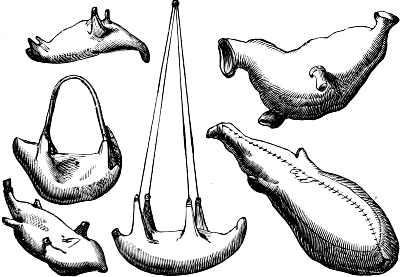
LEATHER BOTTLES.
THE CALL OF MOSES.
FIRST READING.
"I have surely seen the affliction of My people."—Exodus 3:7.
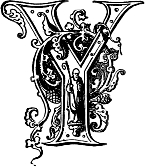
YOU heard how Joseph brought his father and brothers and their children to live in Egypt. Their children's children went on living there for many years, till they had come to be a great people, and were called the children of Israel; but then the King of Egypt grew cruel to them. He made them work very hard to make bricks and build towns for him; and what was still worse, he ordered that whenever a little boy was born to the children of Israel, he should be thrown into the river and drowned.
One mother hid her little baby for three months, and when she could not hide him any longer, she put him into a little cradle of bulrushes covered over with pitch, to keep the water out, and let the cradle float on the river, leaving the little boy's sister to watch him. Presently a lady, no other than the daughter of the cruel king, came down to bathe in the river. She saw the little cradle, and had it brought to her. The little baby was crying, and the lady pitied him and took him home, to bring up for her own child. She wanted a nurse for him, and his sister fetched his own mother, and she became his nurse.
His name was Moses, and we hear about him in the Lesson to-day. He was not living with the king's daughter now. The king had grown angry with him because he cared for his own people, and he had had to flee away and keep sheep in the wilderness.

MOSES AND THE TABLES OF THE LAW.
And there he saw a great wonder. He saw a flame of fire in a bush, and yet the bush was not burnt. And God's voice spoke to him out of the fire that did not burn, and told him that the troubles of His people, the children of Israel, were to come to an end. God would save them from the cruel Egyptians; and Moses himself was to go and lead them out, and bring them to the good land that God had promised that Abraham's children should have for their own. Moses was to go and tell the King of Egypt that it was God's will that they should go. Moses was afraid at first, but God promised to help him.
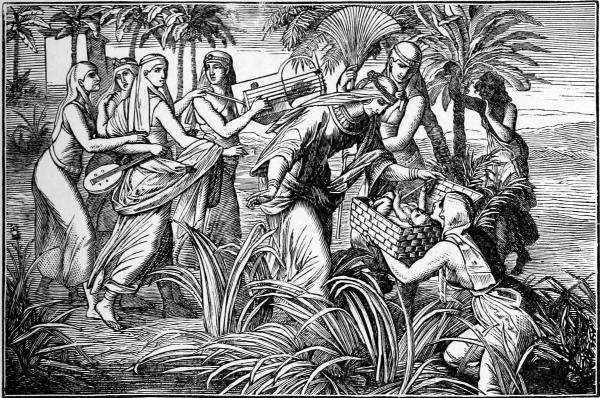
PHARAOH'S DAUGHTER FINDING MOSES.—Ex. 2:5, 6.
QUESTIONS.
1. Who was Moses? 2. Where was he put when he was a baby? 3. Why was he put on the river? 4. Who had said the little boys were to be drowned? 5. Whose babies were they that were to be drowned? 6. What other cruel things did the King of Egypt do to the children of Israel? 7. Who were called the children of Israel? 8. What became of Moses in his bulrush cradle? 9. Who brought him up? 10. Did he stay with the king's daughter? 11. Whom did he care for? 12. What wonder did Moses see? 13. Who spoke to him? 14. What was God going to do for His people? 15. What land would he give them?
SECOND READING.
"And Pharaoh said, Who is the Lord?"—Exodus 5:2.

MOSES and his brother Aaron went and told Pharaoh God's message, that the people of Israel were to go away and worship Him. But Pharaoh said, "Who is the Lord, that I should obey His voice to let Israel go? I know not the Lord, neither will I let Israel go." And he was more cruel to the children of Israel; he made them work harder and harder, and had them beaten if they did not do all the work that was set them.
They had to make bricks of clay mixed with straw; and, to punish them, Pharaoh said that they should have no straw given to them for their work, but that they must find it for themselves; and yet he required of them just as many bricks as they had had to make before. Then they cried out and were angry, and fancied Moses had brought all this trouble on them, by asking for them to go. They were very miserable, and said they wished they had never listened to Moses, for he had only made them worse off instead of better.
Aaron was a better speaker than Moses, and God had said he should help him, and that, when God told Moses anything, Aaron should speak it to the people. So the two brothers stood telling the Israelites to bear it a little longer, and then it would be all well and over, and they would get away from making the bricks in Egypt to the beautiful country.
They could not remember it themselves, but some of their fathers' grandfathers had been little boys when they came, and could tell them that it was a country not all flat, with only one river in it, like Egypt, but full of steep hills and green valleys, with bright streams running along in them, and thick woods on some of the slopes, and others laid out in gardens and vineyards. There were so many cows in the pastures, and in the wild rocks[Pg 67] and hollow trees so many bees' nests, that it was called a land flowing with milk and honey.
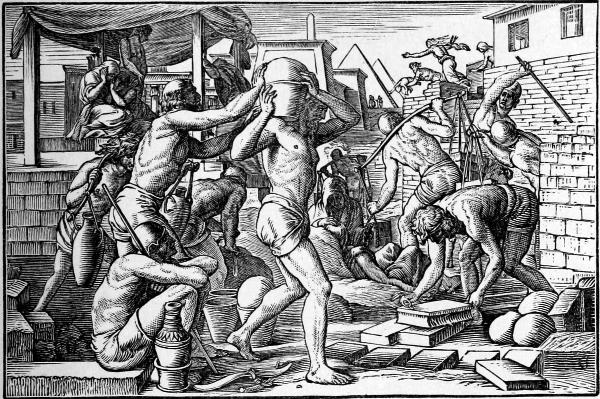
THE ISRAELITES MADE TO WORK HARD IN EGYPT.—Ex. 1:13, 14.
Should not the Israelites have liked to hear of such a place as this? But no, they were too dull to care. They thought more of whether they should get a leek or a melon to eat at supper, than of all the lovely land far away. Do you know, people are very like that when they care for now more than by-and-by. If we want just what pleases us to-day, instead of caring for what will be good for us as we grow older, we are just like the Israelites, who would not attend to Moses or to God.
QUESTIONS.
1. Who was Pharaoh? 2. Who were the children of Israel? 3. Who had been sent to call them? 4. What did Pharaoh say to Moses? 5. How did he use the Israelites? 6. What would he not give them? 7. Who was Moses' brother? 8. What was Aaron to do for Moses? 9. Who spoke to Moses? 10. Who told the people what God said to Moses? 11. What kind of place did God promise? 12. What did Moses say it flowed with? 13. Why? 14. Did the Israelites care? 15. Why not? 16. When are we like them? 17. Which should we care for most, now or by-and-by?
THIRD READING.
"I will redeem you with a stretched out arm."—Exodus 6:6.

THE Israelites were very unhappy, for Pharaoh was very cruel to them, and they thought it all Moses' fault. But Moses told them that they would be saved, and that God was going to show them His power, so that they might always remember what He had done for them, and how He punished Pharaoh, who would not obey Him.
Then God made His power to be known; so that Pharaoh and the children of Israel might both learn who is the great Lord of heaven and earth, who must be obeyed. First, Moses stretched out his rod, and all the water in the river turned into blood. For seven days it was all one red dreadful stream of blood; and when Moses held out his rod again it turned back into pure water. But Pharaoh hardened his heart again, and would not let the people go.
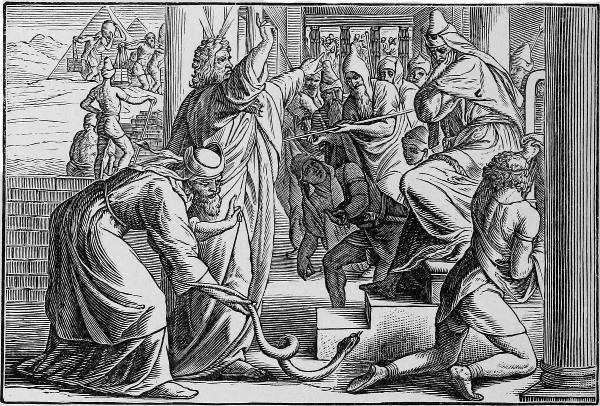
AARON'S ROD CHANGED TO A SERPENT.—Ex. 7:10.
Then God sent a multitude of frogs, that came into all the houses and bed-rooms, and on the tables and everywhere. Pharaoh could not bear to have these creatures everywhere, and said if the frogs would but go away he would let the children of Israel go. Moses prayed to God, and all the frogs died; but Pharaoh only hardened his heart again, and would not let the people go.
Next, God sent lice, disgusting unclean creatures, most horrible to the Egyptians, who could not bear anything dirty; but Pharaoh did not care. Then came swarms of flies, buzzing, stinging, and tormenting; and Pharaoh said he would allow the Israelites to go, so the flies were taken away; but no sooner were they gone than he went back again to his obstinacy, and would not let the people go.
He was trying to fight against God, and so came these terrible miseries on him. If people will not do better after being punished, worse and worse is sure to come on them.
QUESTIONS.
1. How did God punish Pharaoh? 2. What four plagues have I told you of to-day? 3. Why did these dreadful things happen? 4. Did Pharaoh care for them? 5. Why did he not mind them? 6. What happens to those who do not mind being punished?

THE PLAGUES OF EGYPT.
FIRST READING.
"There is none like Me in all the earth."—Exodus 9:14.
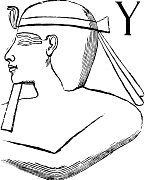
YOU remember that when God spoke to Moses out of the burning bush, it was to tell him that he should lead the children of Israel away from the people in Egypt, who were so unkind to them.
But Pharaoh, the King of Egypt, said that they should not go; he could not spare them, and he did not care for God's message to him. Then God punished Pharaoh that he might let them go. Ten times God punished him, and you hear about three of the punishments to-day.
First, how the sheep and cows, that the Egyptians worshipped like gods, fell sick and died, but still Pharaoh did not care; then how the people all had sores and boils that made them very ill, but still Pharaoh did not care; and then how there was a terrible storm, thunder and lightning, and rain and hail—such big hailstones as killed the men and cattle that were out in the fields, and lightning that struck them, and wind that broke every tree in the field.
No wonder that Pharaoh was frightened, and begged that the storm might cease, and said that then he would let the Israelites go. So Moses prayed to God, and the thunder left off, there was no more hail, and it was all still again. But when the thunder[Pg 71] was over Pharaoh grew wicked again, and left off caring, and said the Israelites should not go. And thus God went on being angry with him, till at last he came to a terrible end.
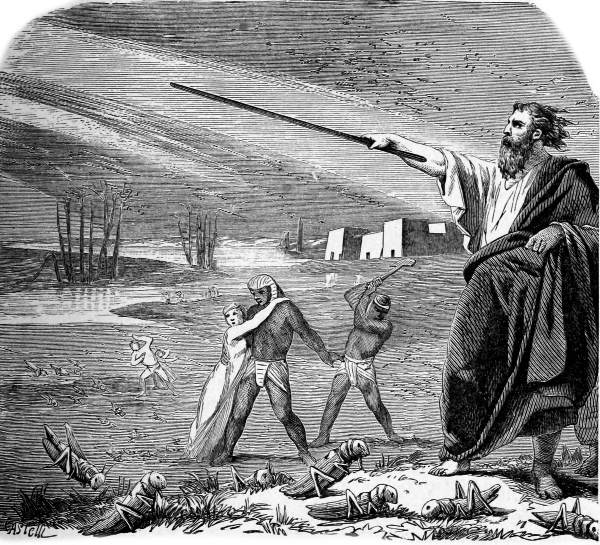
THE PLAGUE OF LOCUSTS.—Ex. 10:12.
I am afraid some children are a little like Pharaoh when they get sulky, and say "I won't," and if they are punished, still they won't—they think nobody shall force them, and they make themselves hard that they may not do what they are told. It is very sad, for this hardness is very wrong, and you see how angry God was with this king for being obstinate. Pray to God to help you not to harden your heart, but to teach you to obey. And do not[Pg 72] forget and do the same thing again when the punishment is over, or it will have done you no good, and you will have to be punished worse next time.
QUESTIONS.
1. What did God desire Pharaoh to do? 2. Who spoke God's words to Pharaoh? 3. But what did Pharaoh say? 4. Who was Pharaoh? 5. Who was Moses? 6. What was done to Pharaoh? 7. Did he mind? 8. Tell me the three plagues we hear of to-day. 9. How many plagues were there in all? 10. What happened in the thunder-storm? 11. What did Pharaoh say when he was frightened? 12. So what left off? 13. But did he let the people go? 14. What fault in some children is the same as Pharaoh's? 15. What ought they do? 16. Who can help them to fight their obstinate temper? 17. But how must they get God's help?
SECOND READING.
"The Lord hardened Pharaoh's heart, so that he would not let the children of Israel go."—Exodus 10:20.

WORSE troubles are sure to come when people have not taken warning by what was sent them before. Pharaoh had not minded seven dreadful plagues, so now God sent another. He sent locusts. These were creatures like great grasshoppers. They came in swarms and clouds, and ate up every green leaf and blade of grass, and made all the earth brown and the trees dry sticks, so that there was nothing left for man or beast to eat. Then Pharaoh gave way a little, and said he would let the men go, but that their wives and children must stay; and he would not hear a word more, but had Moses and Aaron driven out from before him.
Then God bade Moses to hold up his hand to Heaven. And darkness came on. It was dark all day—and with "darkness that might be felt;" not like night, but such black darkness that no fire or candle could give light, and no one dared to move about; but the Egyptians lay still in their places, full of horror and[Pg 73] terror, for three whole days. But all the time it was light among the Israelites—the sun rose and set as usual; and thus God showed that they were His people.
Then Pharaoh said that he would let them go—men, women and children, only he must keep all their cattle; and when Moses, speaking God's words, said that the cattle must go too, and not a hoof be left behind, Pharaoh made his heart hard again, and drove out Moses, saying the people should not go, and that Moses should never see his face again.
And Moses said, "Thou hast spoken well, I will see thy face again no more."
So ended the last hope for Pharaoh. He was never to have another chance of bending his will and doing as God told him. Oh, let us take care not to be like him!
QUESTIONS.
1. How many plagues of Egypt were there? 2. Tell me which had happened? 3. What are the two plagues of this lesson? 4. What are locusts? 5. What harm do locusts do? 6. Who did Pharaoh say might go? 7. Whom would he not let go? 8. What plague came then? 9. What made the darkness so horrible? 10. How long did it last? 11. Who were not in the dark? 12. What did Pharaoh say then? 13. What did he want to keep back? 14. And how did he then change? 15. What did he say to Moses? 16. How did Moses answer?
THIRD READING.
"He smote all the first-born in Egypt."—Psalm 78:51.

AFTER the nine sad plagues that had come upon the Egyptians—the blood for water, the frogs, the lice, the flies, the cattle plague, the boils, the hail, the locusts, the darkness—there was to be still one plague more, the last and worst. That would make the Egyptians let the people of Israel go, so they must be ready.
There should be a terrible night. God's holy angel would pass over the whole land of Egypt that night, and in each house[Pg 74] of the Egyptians he would slay the eldest son of the family. No one would be spared: Pharaoh's eldest son, the young prince, and the very poorest person's son. They had killed the little Israelite babies, so God would punish them by killing their children. None of the Israelites should lose their children; only there was one thing for them to do.
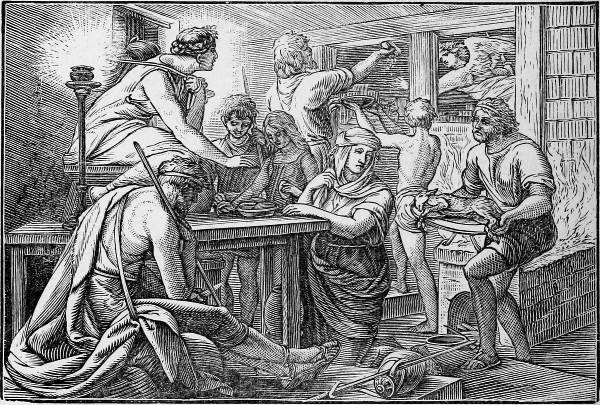
THE FEAST OF THE PASSOVER.—Ex. 12:11-14.
They were that night to sup on a lamb, and, with some of the blood of the lamb, they were to make a mark on the door-post. Where that mark was the angel would pass over and do no one any hurt; but the people would be blest and set free, because they believed God, and did as He bade them.
QUESTIONS.
1. How many plagues of Egypt were there? 2. Say them over. 3. What were they all for? 4. Who would not let them go? 5. What was the last plague? 6. Who were to die? 7. Why did the Egyptians deserve to lose their children? 8. Who would slay them? 9. Whom would the angel spare? 10. How were the Israelites to mark their houses? 11. With what blood? 12. What were they to do with the lamb?
THE PASSOVER.
FIRST READING.
"There was not a house in which there was not one dead."—Exodus 12:30.

THIS is our own gladdest Sunday in all the year, and we read of the Israelites being glad too—glad upon the very Sunday that answered to this, thousands of years ago. On this Sunday, of all those thousands of years, there has been joy and gladness and thanking God. And why? It was because all the troubles in Egypt were over, and God brought the Israelites out safe.
There was one thing they had to do first, though; Moses bade them do it, as God commanded him. Every family was to take a lamb, and it was to be killed and roasted whole in the evening, and some of its blood was to be marked upon the door-post of the house, and then all the family were to stand round the table, all ready dressed for a journey, and eat it as fast as they could, late at night.
And while all the families, fathers and mothers and children, stood up eating the lamb in this strange way, there came a great shout and cry. God had sent His angel to punish the cruel Egyptians; and every house where there was no mark of blood on the[Pg 76] door-post had some one dead in it, and that dead person was the eldest or first-born son.

DEATH OF THE FIRSTBORN OF EGYPT.—Ex. 12:29.
There was a great cry, for there was death everywhere, from the son of Pharaoh who sat on his throne down to the child of the poorest slave; and even the first-born cattle died too, because the Egyptians used to worship them; but wherever there was the blood on the door-post the angel passed over, and the eldest son was safe. Then cruel King Pharaoh was sorry and afraid at last, and said that the people who brought such trouble on him should go where they liked.
QUESTIONS.
1. Why are we glad to-day? 2. Why were the Israelites glad to-day? 3. Where were the Israelites living? 4. What hard work had they to do? 5. Who said they should come out? 6. Who would not let them go? 7. What did God tell the Israelites to eat? 8. How were they to be dressed while they ate it? 9. What were they to do with the blood? 10. Who was going to pass over the land that night? 11. What did the angel do where he did not see any blood on the door-post? 12. Who were frightened then? 13. What did the Egyptians wish then?
SECOND READING.
"It is the sacrifice of the Lord's passover."—Exodus 12:27.

WHEN the King of Egypt said the Israelites might go they were all up and dressed, quite ready and only waiting, and off they set. No more making of bricks, no more slaving for the Egyptians, no more drowning of babies! They were free! and God was going to lead them to the beautiful country that long ago He had said He would give them.

EGYPTIAN JUDGMENT SCENE.
And so, to put them in mind how they were saved from the Egyptians, God bade them on the same day in each year to kill a lamb and roast it, and put the blood on the door-post, and eat the lamb all standing round the table, dressed as if they were going for a journey, that they might never forget how God had made them free. This was called the Passover, because the angel passed over the houses where the blood was marked over the[Pg 78] door. And God came in a pillar of cloud to show them the way they should go.
Our blessed Lord was crucified when He had come to the Feast of the Passover many years after. You know He was like a lamb, He was so pure and gentle; and His Blood saves us, as that lamb's blood did the Israelites, and sets us free from the power of the devil. So we still keep the feast of being set free, on this happy Easter Sunday, when we recollect that Christ was slain for our sins, but that He rose again from the dead, and liveth for evermore.
QUESTIONS.
1. What did Pharaoh say that the Israelites might do? 2. What made him let them go at last? 3. Who were set free? 4. What were the Israelites to do every year? 5. What was this eating the lamb called? 6. Why was it called the Passover? 7. Why were the Israelites glad? 8. Who set us free? 9. What did our Lord do as on this day? 10. In what is He like a lamb? 11. So what did we say in the Easter Anthem to-day? 12. How did God lead them?
THIRD READING.
"The children of Israel shall go on dry ground through the midst of the sea."—Exodus 14:16.

ALL the Egyptians were weeping over their dead first-born sons, and the Israelites were set free, and going gladly out and away from their hard masters.
But Pharaoh's hard heart turned again, and he got all his chariots and horsemen together, and went after the children of Israel to drive them back to Egypt. And when he came in sight of them, there they were all upon the shore of the sea called the Red Sea. They could not go on, for the sea was straight before them; they could not go back, for the Egyptians were behind. They were sore afraid. But God spoke to Moses and told him not to fear. They had only to stand still and see how God would save them.
And God Himself showed that He was with them, for the pillar of cloud went behind them, instead of before, and made it dark to the Egyptians, but gave light by night to the Israelites: so the Egyptians could not get near them all night.

PHARAOH'S HOST DESTROYED IN THE RED SEA.—Ex. 14:30, 31.
Then God bade Moses stretch out his rod over the sea. And then there was a great wonder. The waves of the sea parted, and stood up on each side in a heap, and in between there was a wide open space, where the children of Israel might walk safely dry-shod, through the very midst of the sea. Through it they went, men, women, and children, through the depths of the sea, with the waves standing still on each side of them.
Pharaoh saw that they were all gone over. He chose to follow after them. But when his host was in the midst, the sea returned in its strength again and came down on the Egyptians, and every one of them was drowned—"they sank like lead in the mighty waters"—and the Israelites were freed from their enemies, quite away from all their trouble and all their slavery;[Pg 80] and they sang hymns of joy to God, who had been so good to them and now had set them free.
And we read about them being set free because this is the great Easter Day when we give thanks to our Blessed Lord for having set us free.
QUESTIONS.
1. What last plague had come on Egypt? 2. Who had set off to leave Egypt? 3. But what did Pharaoh do? 4. What was before the Israelites? 5. What was behind? 6. Where did the pillar of cloud go? 7. How were the Egyptians cut off from them? 8. What wonder did God work? 9. Where did the Israelites go over? 10. Who came after them? 11. What became of the Egyptians? 12. Who were free? 13. Who had made them free?
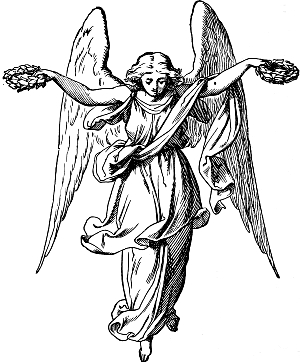
THE GAINSAYING OF KORAH.
FIRST READING.
"The Lord will show who are His and who is holy."—Numbers 16:5.
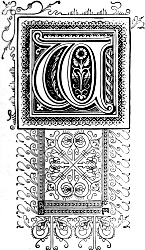
WHEN the Israelites came out of Egypt they had a long journey to go, through a dreary, lonely wilderness. Moses and his brother Aaron led them; and God took care of them, and fed them, and kept them safe.
But there were some wicked men, named Dathan and Abiram, who were tired of the wilderness, and were angry at having Moses for their leader and master, though God had made him lead them, and had done so much for them. They said they were as good as Moses, and that he should not be their prince. They did not care for God having spoken by him.
Their end was so very dreadful that I can hardly tell it to you. God would not let them rise up against His servant Moses; and when they would not listen nor repent He made the earth open under their feet, and they went down alive, and were swallowed up in the pit before the eyes of all the other Israelites; and so they died the most terrible death anyone ever died. It was because they set themselves up against Moses, whom God had placed over them, that He was so angry with them.
Remember God has set people over us: there are our fathers and mothers, and our clergymen and teachers; and it is our duty to obey them, as He tells us in the Fifth Commandment. If we are proud and saucy it is very wrong of us. It is not likely that we should be so dreadfully punished in this life as Dathan and Abiram were; but their horrible death should make us remember that God is very angry with those that will not try to obey those that have the rule over them, and set themselves up to be bold and proud, and to say they do not care.

AARON AND HUR HOLDING UP THE HANDS OF MOSES.—Ex. 17:11.
QUESTIONS.
1. What is the Fifth Commandment? 2. What is the explanation of it in the Duty to our Neighbor? 3. Who was set over the Israelites by God? 4. Where had he brought them from? 5. Where was he leading them to? 6. How should they have behaved to him? 7. What bad men were there among them? 8. Whom did they not care for? 9. What did they say? 10. Why was it very wicked of Dathan and Abiram not to obey Moses? 11. What terrible end did they come to? 12. Why was God angry with Dathan and Abiram? 13. What makes Him angry? 14. Whom did you say He had set over you? 15. Then how must you behave to your parents and clergymen and teachers?
SECOND READING.
"And seek ye the priesthood also?"—Numbers 16:10.

WHEN God gave the Commandments upon Mount Sinai, He chose that Aaron, Moses' brother, and his sons should be His priests. A priest had to offer up the sacrifices to God, and to burn incense to Him. Incense is made of dried plants and gums that have a sweet smell when they are burnt.
The priests had brazen urns with holes at the top, and chains to hold them by, and when the smoke of the incense went up it was just as our prayers rise up to God in heaven. There were other people called Levites, who had to take care of the holy things that were used in God's service, but only the priests might offer sacrifices or incense.

KORAH AND HIS ASSOCIATES SWALLOWED UP.—Num. 16:31-33.
Now one of these Levites, named Korah, wanted to do more. He was angry, and said everybody was holy, and that Aaron[Pg 84] took too much on himself. Now it was not Aaron who made himself priest, but God had made him so. Therefore it was wrong in Korah; but there were two hundred and fifty men whom he persuaded to come and get censers, and offer incense to the Lord as if they had been priests. But because they did it in pride and self-will God was angry with them, and His fire burst out and scorched them all to death! It was only the men themselves that died, not their wives or children; and Korah's family after him were better than he was, and used to sing God's praises in the Psalms.
But they always recollected that no one who was not a priest might offer sacrifice or burn incense before God.
QUESTIONS.
1. What had a priest to do? 2. What was a sacrifice? 3. What was incense? 4. What was it burnt in? 5. Who only might offer sacrifice and incense? 6. Who was the right priest? 7. How came Aaron to be priest? 8. Who wanted to offer incense? 9. What did Korah say? 10. How many came with him? 11. What did they try to do? 12. What happened to the two hundred and fifty? 13. Why were they punished? 14. What became of Korah's children? 15. Who are our priests? 16. How were they made priests? 17. What may they alone do?
THIRD READING.
"The rod of Aaron for the house of Levi was budded, and brought forth buds, and bloomed blossoms, and yielded almonds."—Numbers 17:8.

THE high-priest, whom God chose, had to offer sacrifices to Him. That was, the priest slew a lamb, or a goat, or a bullock, by the altar, and gave it to God. It was to show that the Son of God would come and die to take away sin. Now He has come and died, we have left off killing creatures in sacrifice, and only make remembrance over again of His sacrifice in the sacrament of the Lord's Supper.
The high-priest used to wear a beautiful dress. He had a mitre on his head, with a gold plate on it, and the words, "Holiness unto the Lord;" and he had a blue, red, and white robe, embroidered with gold, and round the hem little gold bells and pomegranates. He had a curious scarf called an ephod, and a beautiful breast-plate made of twelve precious stones, each with the name of one of the twelve tribes of Israel engraven on it.
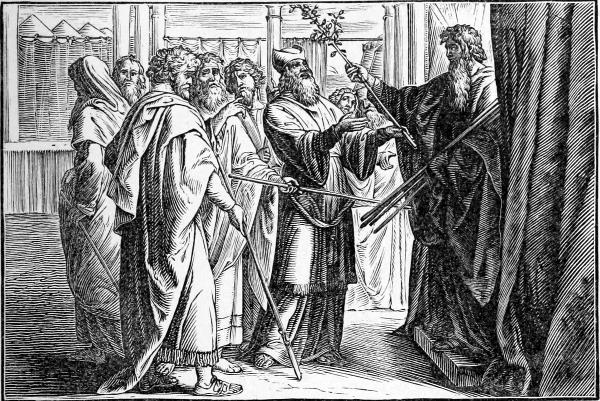
AARON'S ROD THAT BUDDED.—Num. 17:8, 9.
God said He would show who should be His priest. So He bade Moses desire the chief man in each tribe to bring a dry rod or staff, and lay them up all night in the Holy Place. The one whose rod began to grow as if it was still on the tree should be the high-priest. When the twelve men went to look in the morning, eleven rods were dry sticks still, but one had put out green leaves and pink buds, and white blushing flowers, like almond blossoms. It was Aaron's rod; and this was the way God let the children of Israel know that Aaron and his sons, and grandsons after him, were always to be priests.
QUESTIONS.
1. What was a priest? 2. What had he to do? 3. What was a sacrifice? 4. How was it offered? 5. What creatures were killed? 6. Where were they put? 7. What was this to make the children of Israel think of? 8. Why don't we kill sacrifices now? 9. Who has been sacrificed? 10. What did the high-priest wear on his head? 11. What color was his dress? 12. How was it edged? 13. What was on his breast? 14. What did God say He would show? 15. What were twelve men to bring? 16. Where were the rods put? 17. What was to show who should be priest? 18. What were the eleven rods like in the morning? 19. But how did one look? 20. Whose was it? 21. What, then, was Aaron to be?

THE HOLY PLACE.
ISRAEL IN THE WILDERNESS.
FIRST READING.
"Ye shall not tempt the Lord your God."—Deut. 6:16.

I TOLD you what sort of place a desert is, and how full it is of stones, and rocks, and sand, and with no water in it. Do you remember how thirsty Ishmael was in the desert, and how God heard the voice of the lad, and sent an angel to lead his mother to a well of water?
When the Israelites had come out of the land of Egypt, they were in a terrible wilderness. Mount Sinai stood up in the midst, and all round were great rocks of red and black marble, all dry and parched with the hot sun shining on them.
The Israelites grew very hot and sadly thirsty, but they did not pray as Ishmael had done. They grew angry, and said, "Is the Lord among us or no?" Do you not think they deserved that God should show whether He was among them by punishing them for grumbling? That was the way they tempted God. But He was so good and merciful that He pitied them; and He bade Moses to take his rod, and go to the bare, dry rock, and strike it. And when Moses struck the rock, God made a beautiful, fresh, clear spring of water come pouring out of it, so that all the people, and all their cows, and sheep, and goats, and camels, could drink and be refreshed.
Was not that a great wonder? and was not God very kind to them, though they were not good? But you see God was near to[Pg 88] help them all the time, and it was very sad that they grumbled instead of praying. Do not be like them. If a thing is hard to bear, don't murmur and grumble about it, but pray, and then you will get help. Either the vexing thing will go away, or you will leave off minding it.

MOSES BRINGING WATER FROM THE ROCK.—Ex. 17:6.
QUESTIONS.
1. Where had the Israelites come from? 2. Who was leading them? 3. What kind of place did they get into? 4. What is a desert like? 5. What was the mountain in the midst of the desert? 6. What cannot be found in the desert? 7. Who was the lad that was thirsty there before? 8. What did Ishmael do when he was thirsty? 9. But what did the Israelites do? 10. What did they say? 11. What would have served them right? 12. But did God punish them? 13. What did he tell Moses to take? 14. What did Moses strike? 15. What came out of the rock? 16. What made the water come out of the rock? 17. Was it not very good of God to give them water? 18. What ought they to have done? 19. What should you do when a thing is hard? 20. Is it not very naughty to grumble?
SECOND READING.
"As Moses lifted up the serpent in the wilderness, even so must the Son of man be lifted up."—John 3:14.

ONE great fault of the Israelites was that they had no patience. The moment they saw anything troublesome or difficult, they began to cry out, and say they could not get on, and it was very hard on them. Now it is very wrong ever to say God is very hard upon us, for we may be sure He is doing what is best for us. There was one stony, hot, steep part of the journey still to come, and when the Israelites saw it they forgot how often God had helped them, and cried out, and lamented, and complained of Him and of Moses.
So again they were punished, for the little shining snakes that live there came in numbers, darting at them and biting them, so that the bite burnt like fire, and they died. Then they cried[Pg 90] out to God and were sorry, and He told Moses of a wonderful way to cure them. Moses was to melt up some brass and make a great serpent, like the little ones that bit them, and set it up on a pole. Then if anyone who was bitten would come at once and look up at the brazen serpent, his bite would get well, and he would not die of it.
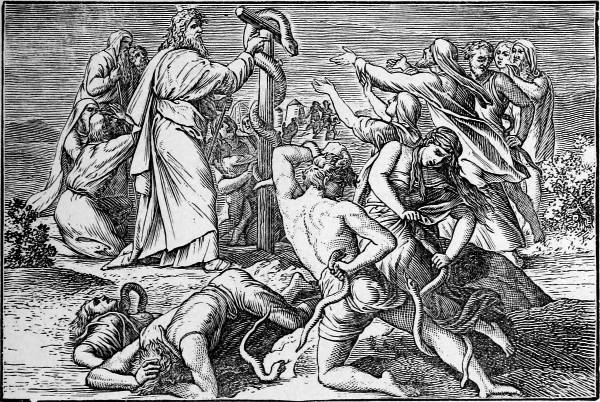
THE BRAZEN SERPENT.—Num. 21:31.
This was a miracle—a wonder. And it was to teach the Israelites something, and us too. For you know our Blessed Lord hung on the cross, as the serpent hung on the pole; and when our souls are in danger of dying of sin, we must think of Him, and look to Him in faith, and He will save us from being punished for our sin, and keep our souls from dying.
QUESTIONS.
1. What sort of place had the Israelites to go over? 2. How did they like it? 3. What did they do? 4. Why ought they not to have cried out? 5. Who had been taking care of them? 6. So how did God punish them? 7. What happened when the serpents bit them? 8. What were they sorry for? 9. So what was Moses to make? 10. Where did he put the brazen serpent? 11. What were they to do if they were bit? 12. What cured them? 13. Who hung upon the cross? 14. What does He cure our souls of?
THIRD READING.
"He humbled thee, and suffered thee to hunger, and fed thee with manna, which thou knewest not."—Deut. 8:3.

THIS morning you heard how God gave the children of Israel water to drink in the wilderness. Now you shall hear what He gave them to eat. The ground was all hard stones. There was grass which the cows and sheep could eat, and there were a few trees with long sharp thorns, but no fruit on them, and no corn to make bread; and soon the people were very hungry, and began to cry out that they did not know what would become of them.
But God was not going to forget them. When they rose up in the morning, the fresh dew lay on the grass, and all about[Pg 91] in the dew were little white things that tasted like wafers made with honey. This was called manna, and God had sent it from heaven for them to eat.
Every morning on week days there it was, and they had all to come out and pick it up. But they must get up early to gather it, for when the sun was hot it would melt away. And they could not keep it—it grew bad and was not fit to use the next day; but there was always just enough for everybody to have all they wanted. There was only one day in each week that more came down, and that was the day before the Sabbath-day, which they had instead of Sunday. Then each one could get twice as much as could be eaten in one day, and it did not spoil so fast. For on the Sabbath-day God would have them rest, and so no manna was to be found anywhere, so that they might learn to keep the Fourth Commandment—Remember the Sabbath-day to keep it holy.
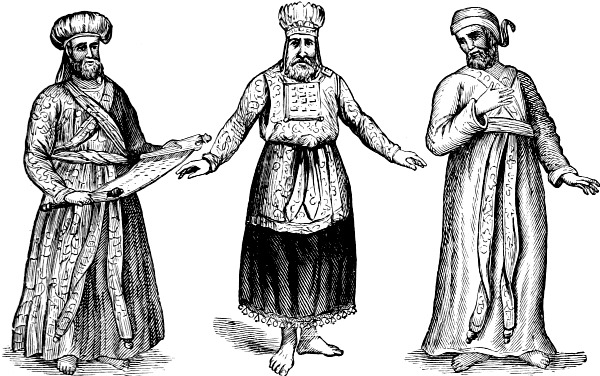
PRIESTHIGH-PRIESTLEVITE
All the time they stayed in the wilderness, the sweet white manna lay on the grass in the morning for them to pick it up—twice as much on the sixth day of the week, and on the Sabbath-day none at all. Was not that very good of God?
QUESTIONS.
1. Where were the Israelites? 2. What had they to drink in the wilderness? 3. What else did they want? 4. Why could they not get bread? 5. What did God give them instead? 6. What was the manna like? 7. Where did it lie? 8. When was the manna on the grass? 9. Who were to eat it? 10. Who sent it? 11. What became of it in hot sunshine? 12. Would it keep? 13. What was the day when it could be kept? 14. How much came down the day before the Sabbath? 15. What might not be done on the Sabbath? 16. What is the Fourth Commandment? 17. So why did they get twice as much manna the day before? 18. When did no manna come? 19. What day have we instead of the Sabbath?

BALAAM AND BALAK.
FIRST READING.
"Thou shalt not curse the people: for they are blessed."—Numbers 22:12.
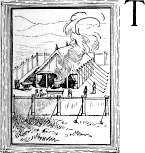
THERE was a prophet called Balaam. A prophet means a man to whom God made His will known, and who was thus much wiser than other men. This prophet one day saw some rich great men come to his house. They brought him a message, that a king named Balak wanted him to come with them, and would give him great rewards for coming. Balaam said he must wait for one night, and God would make known to him what he was to do. And at night God told him he was not to go; for what Balak wanted of him was to curse the children of Israel, and God would not have them cursed. So Balaam said he must not go, and the messengers went away.
But Balak sent more princes, still grander men, with larger presents, to fetch Balaam. He answered, "If Balak would give me his house full of silver and gold, I cannot go beyond the word of the Lord my God, to do less or more." But he had not left off wishing. He begged the messengers to stay, and see if God would give him leave to go. And this time God did say he might go, but that he should not say anything about the Israelites but what God put in his mouth. Balaam knew that God was not pleased with him; but he wanted Balak's rewards, and he set off in the morning, riding on his ass.
Presently the ass was frightened, and turned out of the road into the field. Balaam was angry at this, and beat the ass. But again the ass turned aside in a narrow walled path, and squeezed Balaam's foot against the wall. He beat her again. Presently, in a very narrow road, the poor ass fell quite down for fear; and Balaam was very angry, and beat her harder.
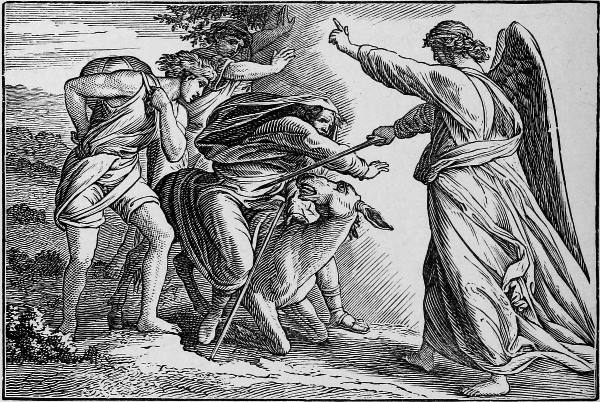
BALAAM MET BY THE ANGEL OF THE LORD.—Num. 22:31.
Then God worked a wonder. He made the dumb ass to speak, and ask why he was so cruel to her. He answered that he only wished for a sword to kill her. The ass asked if she had ever been like this before. He said, No. And then, full before him, he saw God's holy angel with a sword in his hand. And he fell down on his face.
The poor ass had seen the angel all the time; but Balaam could not see him till God made him able. And now he was afraid, and would have gone back; but the angel said he must go on now, though he would only be able to speak the words which God put in his mouth.
Think if, sometimes when you have been told you must not do something, you fret and teaze to do it—is not that like Balaam? And perhaps you teaze till some one gives you leave to do as you wish. Then you get quite cross with eagerness, and are unkind to all that hinders you; and, after all, you do not find that any good comes of getting your own way.
QUESTIONS.
1. What is a prophet? 2. Who sent for Balaam? 3. What did God tell Balaam? 4. But what did Balaam wish? 5. How did he get leave to go at last? 6. But who stood in his way? 7. Who saw the angel first? 8. What did Balaam do to the ass? 9. What wonder did God work? 10. What did the ass say? 11. Whom did Balaam see? 12. What did the angel tell him? 13. What had he been allowed to have? 14. Does good come of having our own way?
SECOND READING.
"There shall come a Star out of Jacob, and a Sceptre shall rise out of Israel."—Numbers 24:17.

THERE was a king named Balak, whose land the Israelites were to pass through. They promised not to do any harm to him or his people, if they might go quietly through; but he was afraid and angry, and wanted to have them cursed, hoping to bring God's anger on them. That was a very wicked and foolish notion of King Balak's; and God would not let it bring harm upon His people. They had not deserved to have His anger called down on them, and so He would not be angry with them.
And when Balak's friend Balaam tried to speak curses, God turned them all to blessings; and, instead of saying they should come to a terrible end, he could only say how happy and well off they should be, with God to take care of them, and be their King. He even went on to say that a Star should come out of Jacob, and a Sceptre should rise out of Israel—and that meant that our[Pg 96] Saviour should be born among them. He is called a Star, because He came to give us light; and you know a star showed the way to the place where He was born. And a sceptre is the rod a king carries in his hand. So when He was called the Sceptre, it meant that He should be a King.
Only think how angry Balak was, when Balaam could not curse, but only blessed. I wish he had been afraid, and seen it was not God's will that he should hurt the Israelites; but instead of that, he went on in his wickedness, and was miserably killed at last; for God took care of His people, and would let no one do them any harm.
Now, recollect, bad words and bad wishes do harm to the person that speaks them, not to those they are meant for. If a bad boy came and abused a steady one for going to church, or saying his prayers, it would be very bad for himself; but if the good boy kept on quietly, nothing that the other could say would hurt him one bit. God would take care of him as surely as He took care of the Israelites.
QUESTIONS.
1. What did Balak want? 2. Why did he want the Israelites to be cursed? 3. Whom did he set to curse the Israelites? 4. But what did Balaam do instead? 5. Why could he not curse them? 6. Who would not let him curse them? 7. Who was to be born among them? 8. What did Balaam call our Saviour? 9. Why was He like a star? 10. Why was He like a sceptre? 11. Could Balak hurt the Israelites? 12. Why not? 13. Whom do bad words hurt? 14. Ought we to mind them? 15. If anyone teazes you when you try to be good, must you leave off?
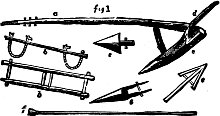
THIRD READING.
"The people did eat, and bowed down to their gods."—Numbers 25:2.

YOU heard how Balaam went to Balak; and how God made him bless the children of Israel when he wanted to curse them. But even this did not make Balaam good. He wanted Balak to give him a reward; and so he told him that though no harm could happen to the people of Israel while they were good and worshipped their God, yet if he could make them do something wicked, and turn away from their God, then God would be sure to punish them.
THE ISRAELITES INVITED TO A GREAT FEAST.
So these two wicked men sent a number of women to invite the Israelites to hold a great feast with them, in honor of their idol Baal Peor. Many were so foolish and wicked as to be led away; and they had a great feasting and revelling, and all kinds of bad pleasures that these heathen women said were to do praise to this horrible false god. Then, though Balak might have cursed for ever without hurting them, they had done themselves the harm. God sent a deadly sickness, and in one day twenty-four thousand people died.
But Phinehas, Aaron's grandson, did as Moses commanded him. He first put to death the wickedest of the people who had joined themselves to Baal Peor; and then he prayed—and all the people prayed and wept too. So God forgave them, and the plague ceased.
Afterwards Phinehas led the Israelite fighting men to punish the wicked Balak and his people; and Balaam was killed in fighting with them. All the wicked women who had tempted the Israelites away from God were put to death too. So Balaam's evil counsel ended in all sorts of misery. It is very sad to think of[Pg 98] him, for he knew so well what was good, and yet did what was so very bad. But remember this, nobody could hurt God's people till they did wrong, and then they hurt themselves, and God punished them.
QUESTIONS.
1. What did Balak want to do? 2. How had Balak tried to hurt the children of Israel? 3. Why could not Balaam curse them? 4. What did Balaam think would be the way to hurt them? 5. Whom did he send to them? 6. Whom did the women persuade them to worship? 7. What did God send to punish them? 8. How was the plague stopped? 9. How was Balaam punished? 10. Why was Balaam greatly to be blamed? 11. When could not Balaam hurt them? 12. When could he hurt them? 13. For who took care of them when they were good?
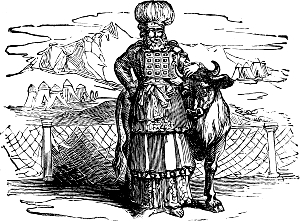
HIGH PRIEST WITH SIN OFFERING.
THE GIVING OF THE LAW.
FIRST READING.
"Thou heardest His words out of the midst of the fire."—Deut. 4:36.

WHEN the children of Israel had come out of Egypt, God had told Moses to lead them to the foot of Mount Sinai. This was a high steep rocky mountain in the wilderness. And God told Moses to set bounds round the mountain, so that nobody should come and touch it; and the people were to pray, and wait round it for the holy and awful thing that was to happen.
Then there came on the hill-top a deep dark cloud, and the mountain was altogether on a smoke, and it shook and quaked, and there were lightnings and thunders and voices, and the sound of a trumpet loud and louder, so that all the people trembled. Then out of that cloud there came a voice speaking to them—a voice that they all could hear, and that made them afraid. For it was the voice of God. And God spoke out of the cloud, and gave the Ten Commandments. They were the very same Ten Commandments you say in the Catechism, and see written up in church.

The Ten Commandments.
Thou shalt have no more Gods but me.
Before no idol bend the knee.
Take not the name of God in vain,
Nor dare the sabbath day profane.
Give both thy parents honor due,
Take heed that thou no murder do.
Abstain from words and deeds unclean
Nor steal, though thou art poor and mean.
Nor make a wilful lie, nor love it.
What is thy neighbor's dare not covet.
God had come in this terrible and awful manner to speak to them, that all Israel might hear and fear, and take care not to break them. Afterwards God gave these Ten Commandments to Moses, written upon two tables—or pieces of stone—written by God Himself. That was the way the Ten Commandments were given—by God's own voice speaking to men, out of the cloud, amid thunders and lightnings, and the sound of the trumpet, dreadful to hear.
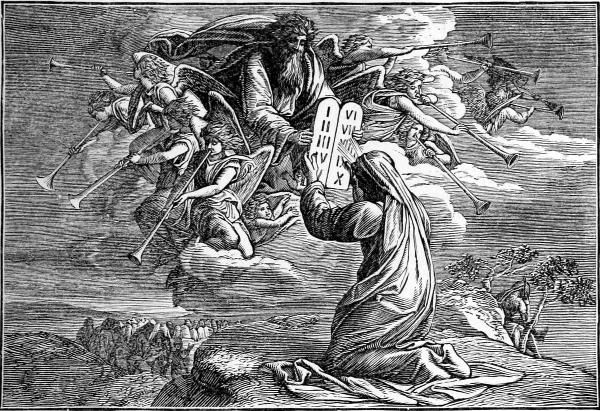
MOSES RECEIVING THE TABLES OF THE LAW.—Ex. 31:18.
And God means us all to obey the Commandments, just as much as He meant the Israelites to obey them. They are His words, and must be kept; and if we ask Him in our prayers He will give us help and strength to obey them, so that we may fulfil the promise that was made at our baptism, that we should keep God's Holy Will and Commandments, and walk in the same unto our lives' end.
QUESTIONS.
1. Where had the children of Israel come from? 2. Who was leading them? 3. Where did God tell Moses to take them? 4. What wonderful sight did they see on Mount Sinai? 5. What did they hear? 6. Who spoke out of the cloud? 7. What did God speak? 8. How many Commandments? 9. Tell me the first of them. 10. On what did God write them? 11. To whom did He give them? 12. When do you say them? 13. When did you promise to keep them? 14. What is keeping the Commandments? 15. How can you be helped to do as they tell you? 16. How must you ask for God's help?
SECOND READING.
"The Lord talked with you face to face in the mount out of the midst of fire."—Deuteronomy 5:4.

WHEN the lightning and thunder and the loud voice of the trumpet came forth from the cloud on Mount Sinai, and God had spoken the Ten Commandments, He called to Moses to come up and speak with Him in the cloud. How wonderful it must have been! Moses was the only man that ever spoke so near to God.
God gave him two blocks of stone written with the Ten Commandments, written with God's own Finger. Then God told him to make a chest to keep them in. It was to be made of wood, with gold all over it; and two figures of cherubims were to be one on each side. This chest was to be called the Ark of the Covenant. And it was to be put into a square room, inside a tent, that was to be made with curtains, and carried about with the Israelites. It was to be called the Tabernacle. And this was to be a very holy place.
The children of Israel would say their prayers in front of the Tabernacle; but they were not to go into the place where the Ark was, because they were sinful, and God is holy. That place was to be called the Holy of Holies, and no one might go near it[Pg 103] but the Priests whom God chose, and set apart to lead His worship.
The first High Priest was to be Moses' brother Aaron; and he was to wear a beautiful dress when he ministered before God—a high cap with "Holiness to the Lord" on it, a long embroidered robe, edged with gold bells and pomegranates, and a blue scarf crossed over her breast; and in the middle a breast-plate, made of twelve precious stones, each carved with the name of one of the twelve tribes of Israel, so that he might have them on his heart as he prayed to God. All this and much more God told Moses while he was on the mount.
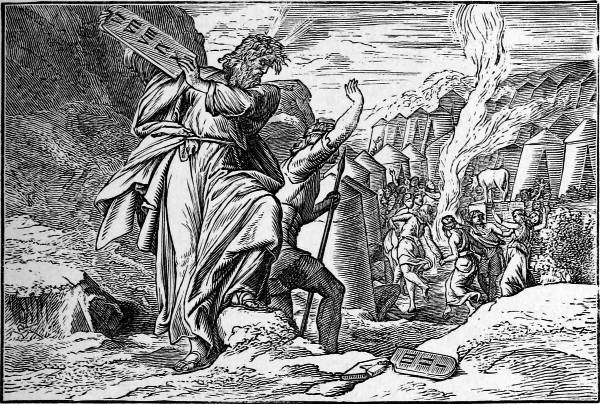
MOSES DESTROYS THE TABLES OF THE LAW.—Ex. 32:19.
QUESTIONS.
1. What was given on Mount Sinai? 2. Who spoke the Commandments? 3. To whom did God give them? 4. What were they written on? 5. Who wrote them? 6. Where were they to be kept? 7. What was the chest like? 8. What was the chest called? 9. Where was Moses to put the chest? 10. What was the[Pg 104] room called? 11. Who might go near the Holy of Holies? 12. Who was the first High Priest? 13. Who was Aaron? 14. What was Aaron to wear? 15. Why might not the people come near?
THIRD READING.
"Know therefore that the Lord thy God, He is God."—Deut. 7:9.

WHEN Moses went up into the awful cloud upon Mount Sinai, he stayed there forty days.
But all the Israelites below were impatient. They could not think what had become of Moses; and though they had so lately heard God's own Voice speaking to them, they would not wait as they had been told to do. They cried out that they wanted something instead of Moses, whom they had lost.
So they took all their gold ear-rings and melted them, and made an image of a golden calf. And then these foolish wicked people began to feast and dance, and worship this golden idol.
Moses was coming down Mount Sinai with the two Tables of the Commandments in his hands. And first he heard a shouting and singing; then he saw the people leaping and dancing, and the great golden idol standing in the midst. Then he was sure it was of no use to bring them the Commandments if they minded them no better. So he took the two tables of stone, and threw them out of his hand, and broke them to pieces.
Then he went down, and severely punished the worst of the Israelites for having disobeyed the commandment. And he broke the golden calf to pieces, and ground it to powder.
Then he went and prayed to God to forgive the people. God did forgive them, and let Moses bring two fresh tables of stone to be written with the Ten Commandments. But the first that they had lost were the tables God had given, and they could never have them back again!
QUESTIONS.
1. Where was Moses gone? 2. What was God going to give him? 3. Who were left below? 4. What did the Israelites want? 5. What did they take off? 6. What did they make of their ear-rings? 7. What is the Second Commandment? 8. How did they break the Second Commandment? 9. What did Moses do to the Tables of the Law? 10. Why did he throw them down? 11. What did he do with the golden calf? 12. Where did he go then? 13. What did he do for the Israelites?
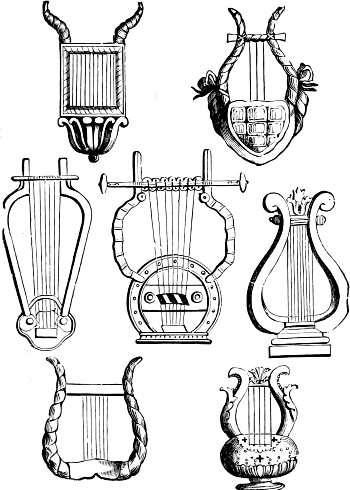
ANCIENT MUSICAL INSTRUMENTS.
THE GIVING OF THE LAW.
FIRST READING.
"I prayed therefore unto the Lord, and said, O Lord God, destroy not Thy people and Thine inheritance."—Deut. 9:26.
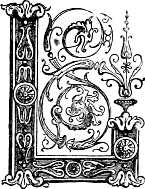
LAST Sunday you heard how sadly the people of Israel sinned by making the golden calf, while Moses was up in the mountain, and how he punished them.
Then he said he would go and pray to God to forgive them, and try them again. So up he went over the rough rocks of Mount Sinai, and into the cloud again, where he had spoken with God before. And he prayed with all his might that God would not cast off His people, though they had been so wicked, but would give them again the Commandments on their tables of stone. And God listened to Moses, and promised to give them the Commandments again.
Then Moses made a great request: he said to God, "I pray Thee, show me Thy glory." But God said, "Thou canst not see My Face, for there shall no man see Me and live." But Moses was to come up the mountain the next day, and bring with him two blocks of stone, and then God would let him see as much of His glory as he could bear.
On the next day Moses went up the mountain again, and took with him the two tables of stone. And the Lord came down in the cloud; and Moses was in the cleft of the rock, where he could see a small part of the glory, and hear the Lord's Voice pro[Pg 107]claim before him, "The Lord, The Lord God, merciful and gracious, long-suffering, and abundant in goodness and truth." Then indeed Moses bowed his head and worshipped. No man ever came so close to God as Moses, with whom God spoke face to face, as a man speaketh to his friend.

MOSES BRINGING THE NEW TABLES OF THE LAW.—Ex. 34:29-32.
Moses stayed forty days and forty nights up in the mountain. And God again wrote the Commandments upon the two tables of stone, and granted the Israelites to try again to keep them. When Moses came down from being in converse with God, the glory was still about his face. It was all shining like the sun, and was so bright that the Israelites could not fix their eyes on it; and he was obliged to put a veil over his face, because they could not bear to look at it. Was ever living man so favored, and brought into such glory?
QUESTIONS.
1. What wicked thing had the Israelites done? 2. Who prayed for their forgiveness? 3. Where did Moses go to pray for their forgiveness? 4. Who forgave them? 5. What did Moses venture to ask God to show him? 6. But what can[Pg 108] no one do? 7. Where was Moses placed? 8. What passed by? 9. What voice did he hear? 10. How was Moses more honored than any man? 11. How long did he stay in the mountain? 12. What did God give him again? 13. How did his face look when he came down? 14. What did he do to hide his face? 15. How came his face to be so glorious?
SECOND READING.
"Ye shall walk after the Lord your God, and fear him."—Deut. 13:4.

WHEN the Israelites came into the good land where they were going, they were to be very careful not to learn to worship idols. For idols were no gods at all—only wood and stone—and could not hear them pray, nor give them what they wanted. Besides, the people round them had very frightful ways of trying to please their false gods. They had one called Moloch, made of brass, and they used to offer poor little children up in sacrifice to him, and make a noise with drums and trumpets, that no one might hear their cries. There was another god called Baal, to whom they set up great images, and feasted in his honor; and a goddess, whom they called the queen of heaven, of Ashtoreth. Women used to offer cakes to her, and dance in honor of her, for they thought she sent the moon to shine on them.
Now, the Israelites were not to worship any of these false gods. They were to remember how they heard the Only True God speaking to them out of the cloud upon the mountain, and telling them, "I am the Lord thy God: thou shalt have no other gods but Me." And God told them that if they would worship Him and serve Him, all should go well with them, and they should be happy and blessed. But if they went after these false idols, all would go ill with them, and there would be only sorrow and misery.
QUESTIONS.
1. Say the First Commandment. 2. Say the Second. 3. What three idols did the people of the country worship? 4. What did they do in honor of Moloch? 5. What did they do in honor of Baal? 6. What did they call Ashtoreth? 7.[Pg 109] What did they think she sent them? 8. Who made the moon? 9. What would happen if the children of Israel worshipped God? 10. What would happen if they worshipped idols?
THIRD READING.
"It is a people that do err in their heart, and they have not known My ways."—Psalm 95:10.

AFTER the Commandments were given the Israelites went on their journey. The Ark, or chest, where the Commandments on their two tables of stone were kept, was carried before them; and God still showed that He was with them, for He made a pillar of cloud by day and of fire by night go along with them, and rest on it.
When they came near the land of Canaan, twelve men were sent on to see it. They came back, bringing such a great bunch of grapes that two had to carry it between them on a pole! But they said that the land was full of strong cities, and very strong men, and they should never be able to win it, but would all be killed.[Pg 110] Only two men, Joshua and Caleb, recollected that there could be no fear, for God had promised to save them and bring them in. The others all cried, and said they would go back to Egypt, and threw stones at Moses and Aaron when they wanted to quiet them.
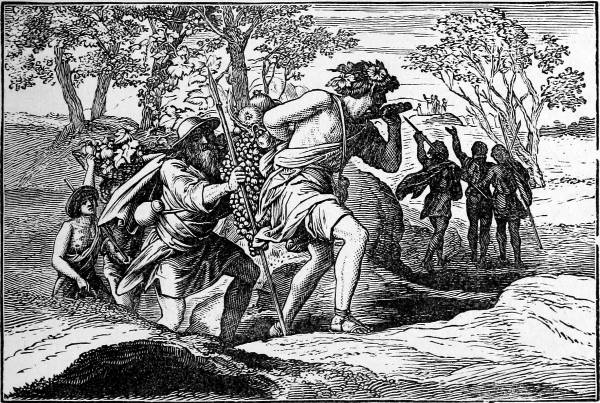
THE SPIES RETURNING FROM CANAAN.—Num. 13:24-26.
Then God showed His glory, and would have cut them all off in a moment if Moses had not prayed for them. But He said none of those who had said they would not go into the good land should go. They were to stay forty years longer in the dismal wilderness, till all the grown-up men, except Joshua and Caleb, should be dead, and their children be grown up in their stead. Then their children, who had learned to trust God and do as He bade, should be the ones to go in and live in the promised land.
QUESTIONS.
1. How did the Israelites know which way to go in the wilderness? 2. What was the ark? 3. What was in it? 4. How did God show them His Presence? 5. Whom did Moses send to look at the land? 6. What did these men bring back? 7. But what did they say of the country? 8. Who were afraid? 9. Why was it wrong to be afraid? 10. Who only were afraid? 11. What were the people ready to do? 12. How were they to be punished? 13. How long were they to stay in the wilderness? 14. Who would die? 15. Who would grow up to go in? 16. Who were the two good brave men? 17. What was promised to Joshua and Caleb?

TABLE OF SHEW-BREADARKGOLDEN CANDLESTICK
THE DEATH OF MOSES.
FIRST READING.
"They angered Him also at the waters of strife."—Psalm 106:32.
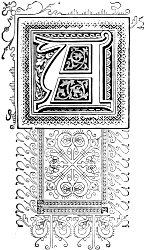
AFTER all the forty years in the wilderness, the children of Israel were quite close to their home in the promised land. There was only the river Jordan between them and the hills and valleys there. But Moses was not to go with them. Once when the people were crying out for more water, and God told him to command the stream to come out of the rock, Moses was so hot with anger that he did not attend. He said, "Hear now, ye rebels; must we fetch you water out of this rock?" And he struck the rock with his rod, instead of speaking to it.
The water came out as it had done before; but Moses had been so hasty that he had not thought how to obey God exactly, and so he was not to be allowed to lead the people in as a great warrior, lest he should fail again. God was not angry with him, but had forgiven him; only he had his punishment because he had done wrong.
Joshua was to lead the people, instead of Moses. So before[Pg 112] Moses was taken away, he called Joshua and all the chief men of each tribe, and put them in mind of all that God had done for them, and warned them very solemnly, that if they broke their promise and did not keep the Commandments, God would punish them—first a little, and then more and more, and would even cast them out of the good land at last. For, mind, God always keeps His promises; and as surely as He gives the good all that is best for them, so surely He will punish those who turn from Him.
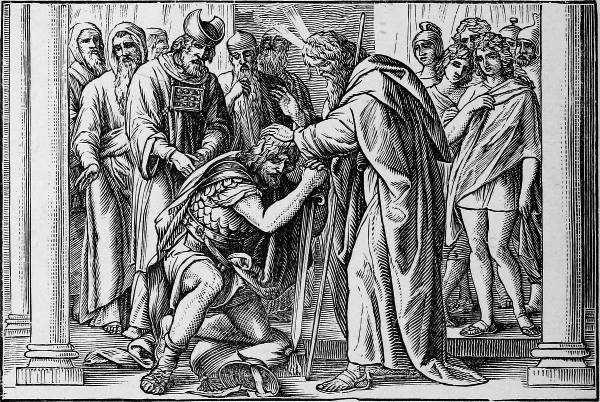
MOSES GIVING HIS CHARGE TO JOSHUA.—Num. 27:22, 23.
QUESTIONS.
1. Where were the Israelites? 2. How long had their journey lasted? 3. Where were they going? 4. What lay between them and the land of Canaan? 5. Who had led them? 6. But what one thing had Moses done? 7. What was he not to do? 8. Who was to lead them in? 9. What did Moses tell the Israelites they must be careful to do? 10. What had they promised to keep? 11. What would happen if they broke the promise? 12. What would happen if they kept the promise? 13. What promises have we made?
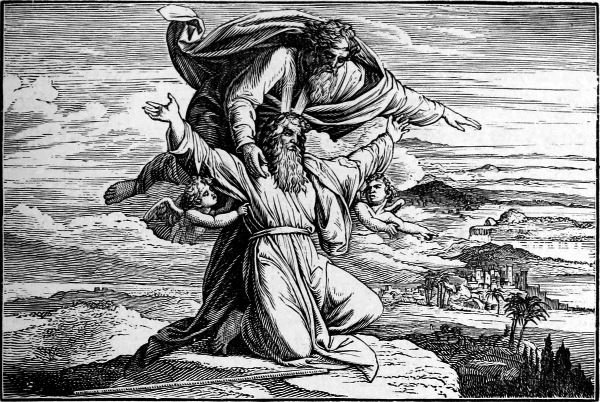
MOSES VIEWING THE PROMISED LAND.—Deut. 34:4.
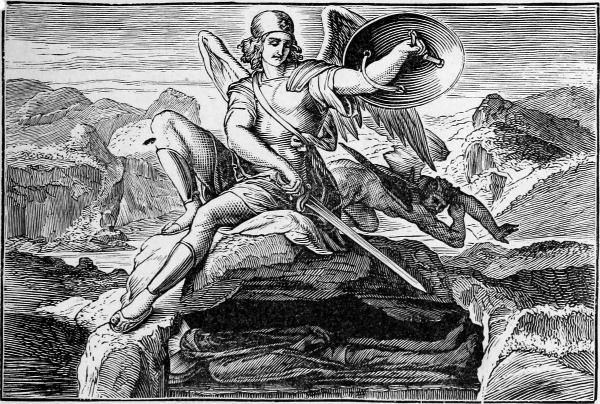
THE DEATH OF MOSES.—Deut. 34:5, 6.
SECOND READING
"So Moses the servant of the Lord died."—Deuteronomy 34:5.

IT was not God's will that Moses should lead the Israelites into the promised land, but he was to die on the east side of the river Jordan; and so he would have his rest above instead of in the land of promise.
But first God told him he might see the land. So he went up into a very high hill: and there God made him able to see all the home of his people—the snowy hill of Hermon, and Mount Lebanon where the cedar trees grow, and the hills and valleys where Abraham had wandered and Isaac and Jacob had lived, and which he had hoped for all his life; and green fields, and corn-fields, and vineyards, on to the great blue sea stretching out to the westward.
That was where his people were to live; but there was a better home for Moses. Nobody saw him any more after he went up into the mountain. There he died, and the Lord buried him, and no one knows of his grave—only the children of Israel wept and mourned for him.
QUESTIONS.
1. Where had the Israelites come? 2. Who had led them? 3. But where was Moses not to go? 4. But what did God allow him to see? 5. Where was he to go? 6. What did God show him there? 7. What kind of place was it? 8. Where had he brought the people from? 9. Who was to lead them in? 10. What was to happen to Moses? 11. Did any one ever see him again? 12. What does no one know? 13. Why do we think so much of Moses? 14. Where did he speak with God? 15. Was he not the greatest man of all in the Old Testament?

THIRD READING.
"Be strong and of good courage."—Joshua 1:6

AFTER Moses had gone out of sight on the mountain, God Himself told Joshua that Moses was dead, and that he must lead the children of Israel into the good land God had promised them. Moses had laid his hands on Joshua's head, and God's Holy Spirit had come to help him to see what was right, and to lead the people. He must be strong and brave, and do all that God commanded, and then he would be quite sure to be able to drive away all the strange people out of the land, and to make a home for the people in the land that Abraham, Isaac, and Jacob, had loved so well.
All the people promised they would do as Joshua bade them. So he was their captain instead of Moses.
QUESTIONS.
1. Who was the old leader of the children of Israel? 2. Where had Moses led them from? 3. Where were they going? 4. Where did Moses go? 5. What became of Moses on the mountain? 6. Whom did God make captain instead of Moses? 7. What did God tell Joshua? 8. What did God promise him? 9. What is the way to be helped by God? 10. What were the Israelites to be helped to do? 11. Who were to be driven away? 12. Why did the children of Israel wish to live in the land of Canaan? 13. What had God promised Abraham? 14. And does God always keep his promises?

ISRAEL IN BATTLE.
FIRST READING.
"Ye go over Jordan, and dwell in the land which the Lord your God giveth you."—Deut. 12:10.
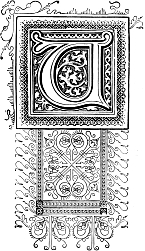
AFTER the children of Israel had been forty years living in the wilderness, God led them into the beautiful land He had promised them. But before they could come in they had to get across a river—a deep river, with rocks on each side, and a stony bottom to it, and the water running very fast indeed. The name of the river was Jordan. There was no bridges to go over, and no boat to row them across; and not only all the strong men, but all the women and little children, had to get over it!
But nobody need be afraid when God is helping him. God told them what to do. The priests, who were like clergymen to them, were to take the ark—that is, the chest where the two tables of the Ten Commandments were kept—and were to walk down into the river, without being afraid. And they were brave men; they believed what God told them, and went down into the swift stream in no fear of being drowned. And behold, as soon as their feet touched the water it stopped flowing, and stood still. No more water came down, and all the[Pg 117] hosts of the children of Israel went straight over the bottom of the river with dry feet.
The priests stood up in the middle all the time the others were going over, and when everyone was safe on the other side they came after them; and by-and-by the river came rushing down again in its own place, for it was God who had commanded it to stop short, and make a dry place for His people to pass over. And so they came into the land of Canaan that He had promised them so long.

CARRYING THE ARK OVER JORDAN.—Josh. 3:17.
QUESTIONS.
1. How long did the children of Israel stay in the wilderness? 2. Where were they going? 3. What had they to eat? 4. What had they to drink? 5. What had God given them on Mount Sinai? 6. What were the Ten Commandments written on? 7. Where were the two stones put? 8. Who carried this ark? 9. What had the Israelites to go over? 10. What was the name of the river? 11. How do we cross rivers? 12. But had they a bridge or a boat? 13. Who was taking care of them? 14. What did God tell the priests to do? 15. Were the priests afraid to go into the river? 16. Why not? 17. What happened when the priest's feet touched the water?
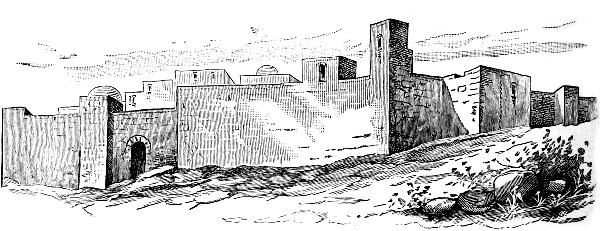
Jericho
SECOND READING.
"By faith the walls of Jericho fell down."—Hebrews 11:30.

AFTER the Israelites had come into the land of Canaan, there was a strong walled city before them, and its name was Jericho. They could not go any further till they had taken the city. But God was going to show that He fought for them. So He told them not to fight, but that every day, for a whole week, the priests should take the Ark of the Covenant on their shoulders and walk around the outside of the walls of the town.
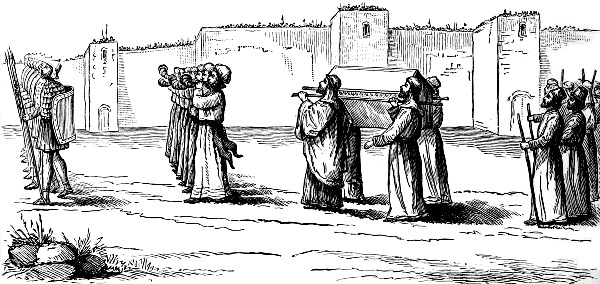
Seven priests were to go in front, blowing on trumpets made of rams' horns; but nobody else was to make any noise. So they did one day, and nothing happened. Joshua bade them do it the next day. Perhaps some of the Israelites wondered and were impatient, but they had to go on the next day still; and after that the Ark was carried round once every day for a whole week.
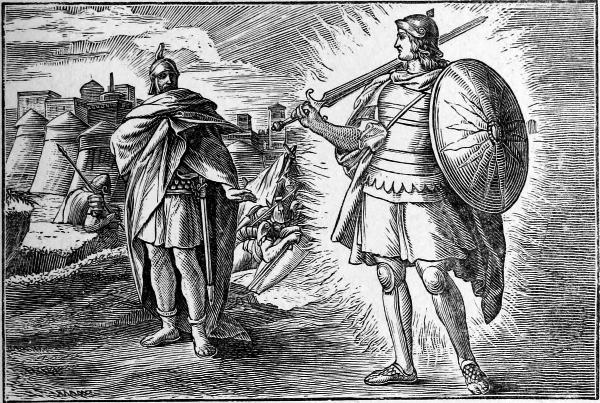
THE ANGEL APPEARING TO JOSHUA.—Josh. 5:13, 14.
On the seventh day, Joshua told the priests that God would have them go round not once but seven times. And so they did; and then, at last, on the seventh day, Joshua said, "Shout." The whole of the people shouted, and the priests blew their trumpets, and then—oh, great wonders!—the walls of Jericho fell down flat, and the people went in and took the city. So the Lord fought for Israel.
QUESTIONS.
1. Where were the Israelites now? 2. Who was their leader? 3. What city were they come to? 4. What did they want to do? 5. Were they to fight? 6. But what was to be carried round? 7. What was the Ark? 8. What was in it? 9. Who carried the Ark? 10. Who went in front of them? 11. How many days[Pg 120] did they go on? 12. How many times did they carry the Ark round first? 13. How often on the seventh day? 14. What were the priests to do? 15. What were the people to do? 16. What happened then? 17. Who had conquered Jericho? 18. What was God giving the Israelites?
THIRD READING.
"As for me and my house, we will serve the lord."—Joshua 24:15.

THIS morning you heard how God gave the children of Israel victory over Jericho. After that He gave them more victories. None of the heathen people could stand before them. They took their towns, and drove the heathen out, and had the fields and gardens and houses for their own. Then Joshua was to divide the land among them, and fix what cities each tribe should have for its own.
All the chief men of each tribe came to him, and the Lord
taught him how to fix the places for them to dwell in. The children
of the good Joseph had the very best lot of all, as his father
[Pg 121]
[Pg 122]Jacob had wished. It was just in the middle of the country, and
was full of beautiful corn land. Two tribes and a-half lived on
the other side of the river Jordan, on the edge of the desert, but
where there was fine grass for their cattle. The tribe of Judah
had a very hilly, rocky part of the country; but they loved it,
because it was where Abraham had lived and now lay buried.
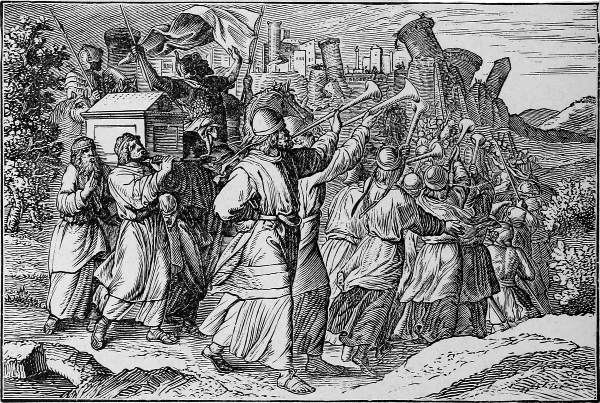
FALLING OF THE WALLS OF JERICHO.—Josh. 6:20.
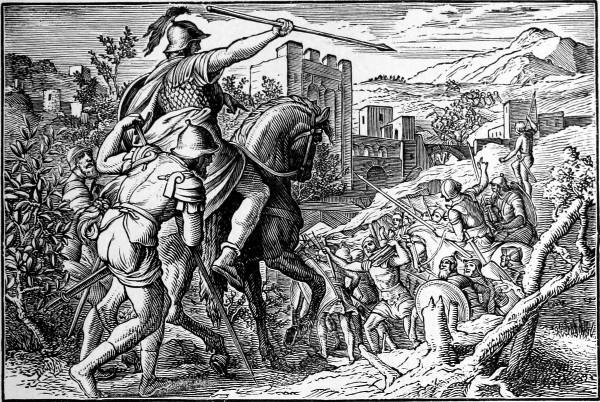
JOSHUA CAPTURING THE CITY OF AI.—Josh. 8:18, 19.

JOSHUA COMMANDING THE SUN TO STAND STILL.—Josh. 10:12, 13.

DIVIDING THE LAND AMONG THE TRIBES.—Josh. 13:6, 7.
And up all the hills they planted vines, where fine large grapes grew; and in the valleys were plenty of corn-fields. All over the country, people had each man his own house, with his vine and his fig-tree to shelter it, and olive-trees in his garden, and a field to grow corn in, and hill-sides near, where he might keep his cows, goats, and sheep. The rocks and the hollow trees were full of wild bees' nests; so that indeed they found it, as Moses had told them, a land of corn and wine—a land that flowed with milk and honey; and they were very glad to be there, and to rest after their long wandering in the wilderness.
After they had had a quiet rest, their first sorrow came.[Pg 123] It was that their brave leader Joshua had grown old, and felt himself near his death. So he called all the chief men together, and told them over again how much God had done for them; and that if they would serve Him and keep His Commandments, all would go well with them. "As for me and my house," he said, "we will serve the Lord." And all the people promised too. They said they would serve the Lord, and would not go after other gods, but would keep His Commandments.
QUESTIONS.
1. Where were the children of Israel now? 2. Who had promised the land to them? 3. Who was leading them? 4. Whom did they drive out? 5. Who had the country then? 6. How was it settled where they were to live? 7. Who had the best part? 8. What had Joseph done that was good? 9. Who went beyond the Jordan? 10. What part did Judah have? 11. What grows there? 12. What choice plants grew in the land? 13. What sort of place had they been told it would be? 14. Who was grown old? 15. What did Joshua tell the Israelites? 16. What was the way for them to be happy?
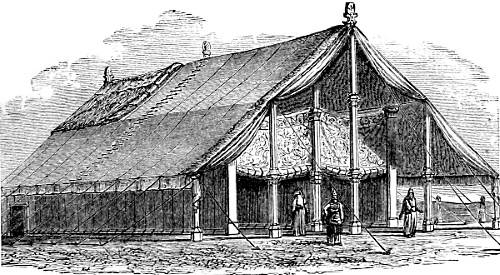
SOUTH-EAST VIEW OF THE TABERNACLE.
THE JUDGES OF ISRAEL.
FIRST READING.
"The journey that thou takest shall not be for thine honor."—Judges 4:9.
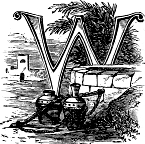
WHEN the Israelites had come to live in the beautiful land that God had promised them, they ought to have loved and served Him, and thanked Him for all His goodness. But no! They liked worshipping false gods; and they made idols to pray to, cut out of wood and stone; and they learnt wicked ways.
Then God was angry with them; and He punished them by sending cruel nations to conquer them, to burn their houses, to steal their children, and drive away their cattle. Then they would be sorry, and pray to God again; and He had pity, and sent some brave man to defend them.
To-day we hear how sadly they were used by a fierce man named Sisera, who had nine hundred war chariots of iron to go into battle with. His people used to shoot at the Israelites at the wells when they came to draw water; and nobody dared to go along the high-roads, but only through the paths, for fear of being killed.
QUESTIONS.
1. How ought the Israelites to have behaved? 2. What had God given them? 3. Whom should they have worshipped? 4. But what did they worship? 5. How did God punish them? 6. What was the name of the cruel man who ill-used them? 7. How many chariots had Sisera?
SECOND READING.
"The Lord shall sell Sisera into the hand of a woman."—Judges 4:9.

AT last God spake to a good brave woman named Deborah, and told her to send for a man named Barak, who should lead the Israelites to fight with Sisera. She sent for Barak, and told him what God had said. But Barak was afraid to go alone. He said he must have Deborah with him. He ought to have known that, if God sent him, he was sure to be safe and to succeed.
Deborah told him that since he wished it she would go with him, but that the journey should not be to his honor, for the Lord would sell Sisera into the hand of a woman. And it turned out as Deborah said. Barak won a great battle, and drove the enemies away, so that they did not hurt the children of Israel again for forty years. But he did not meet with Sisera in the battle, nor get the honor of killing him.

SISERA SLAIN BY JAEL.—Judges 4:22.
Sisera fled out of the battle, and was killed after all by a woman, whose name was Jael. Barak lost all the honor, because he would not do just as he was told, but was afraid without Deborah, just as if God could not help him better than Deborah could.
This morning's lesson told how Deborah and Barak conquered the cruel Sisera. This evening's lesson is the song that Deborah made to thank God for having given her the victory, and saved His people.
QUESTIONS.
1. Who was the holy woman that God raised up? 2. For whom did Deborah call? 3. What was Barak to do? 4. Who did Barak say must come with him? 5. Why was this wrong of Barak? 6. What happened in the fight? 7. Did Barak kill Sisera? 8. Who did kill Sisera? 9. Why was not Barak allowed to kill Sisera? 10. Whom ought he to have trusted to? 11. Who will always help us if we are not afraid to do as we are told?
THIRD READING.
"They chose new gods; then was war in the gates."—Judges 5:8.

THE Israelites never kept long from sinning and setting up idols; and, by-and-by, God let a set of robbers, called Midianites, come in and burn their crops and houses, drive away their cattle, and steal their children for slaves.
Then the Israelites were sorry, and prayed to God to save them. And God had pity on them, and sent His angel to a man named Gideon, to tell him that he was to fight for the Israelites.
A great many men came to Gideon; but the Israelites were to be shown that it was as easy for God to save them with few men as with many. So He bade Gideon send home all but three hundred men. And Gideon believed, and sent them home, and kept only the three hundred.
Then at night he took these men, and gave them each a[Pg 127] trumpet, and an earthen pitcher, with a lamp inside the pitcher, so that the light could not be seen. He took a hundred with him, and sent the other two hundreds another way, creeping quietly along till they came to the place where the Midianites had set up their tents, and were all lying asleep among the cattle they had stolen.
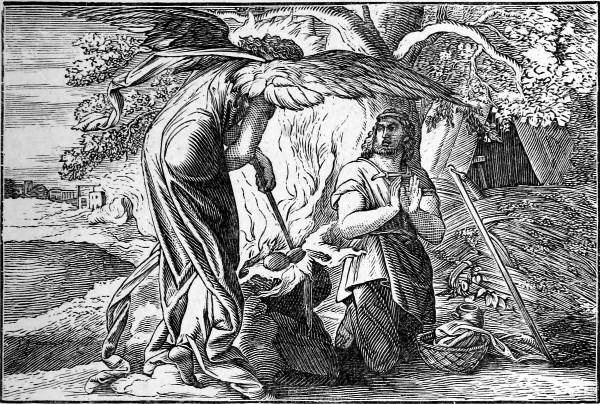
GIDEON'S OFFERING BURNT BY FIRE FROM THE ROCK.—Judges 6:21.
There they lay, and never heard Gideon and his men coming till they were close to the camp, the three parties on three sides. Then, all of a sudden, everyone of the Israelites broke his pitcher and let his lamp shine, and blew his trumpet, and shouted, "The sword of the Lord and of Gideon!"
The Midianites were awakened out of their sleep to see the lamps on three sides of them in the dark, and hear the trumpets and the cries. They were very much frightened, and quite wild with fear. They all began to beat down one another, for they did not know friends from enemies. A great many were killed, and the rest fled away, leaving all that they had stolen behind them.[Pg 128] And so God delivered the Israelites from the Midianites by the hand of Gideon, and gave them peace again as long as they would serve the Lord.
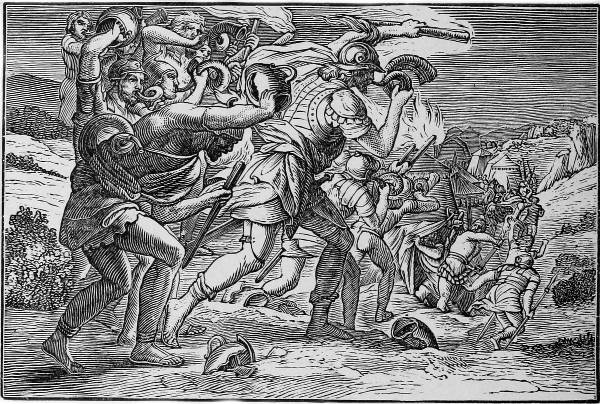
GIDEON'S VICTORY OVER THE MIDIANITES.—Judges 7:19-21.
QUESTIONS.
1. What made the Israelites meet with troubles? 2. Whom ought they to have worshipped? 3. But whom did they worship? 4. What happened then? 5. Who were the next people that ill-used them? 6. What did they do when they were punished? 7. Whom did God send to save them? 8. How many men was Gideon to have with him? 9. What did all the men carry? 10. Where did they go? 11. Into how many parties were they divided? 12. What did the Midianites hear? 13. What did they see? 14. What did they begin to do? 15. What became of those that were not killed? 16. Who had made Gideon able to beat them with so few men?


JEPHTHAH MEETING HIS DAUGHTER.—Judges 11:35.

SAMSON SLAYING A LION.—Judges 14:6.
SAMUEL.
FIRST READING.
"Samuel ministered before the Lord, being a child."—1 Sam. 2:18.
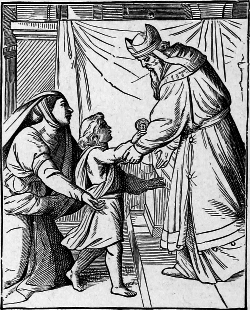
YOUNG SAMUEL BROUGHT TO ELI.
THERE was a very good woman named Hannah, and she grieved because she had no children. Whenever she came with her husband to God's holy place, she used to kneel, and pray with all her heart to God that He would let her have a son; and she promised that if she had one, she would lend him to the Lord all the days of his life.
At last God granted her prayer, and gave her a little son, and she named him Samuel. She was very glad when he was born, and she thanked God, and sang a hymn of praise for her dear little child. But she had promised to lend him to the Lord all his life; and she kept her promise.
As soon as little Samuel was old enough to be without her, she took him to the holy place, that was instead of a church, and gave him to wait upon the Lord. He lived with the High Priest, whose name was Eli, and was taught by him.
Eli was a very old man, and his sons used to behave very badly; but Samuel was always good and obedient to him, and used to wait upon him, and help him when he served God in the holy place. Samuel wore a little white linen dress like the priests; and when his mother came to see him, she used to bring him a little coat. She had five more children afterwards, three sons and two daughters.
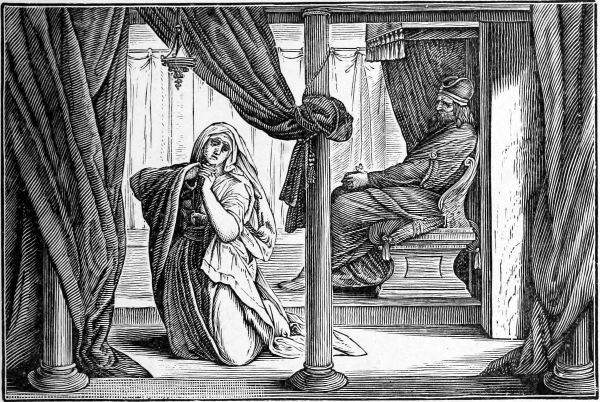
HANNAH'S PRAYER.—1 Sam. 1:11.
If you listen in the afternoon, you will hear how God spoke to Samuel whilst he was still a little boy; and I am sure you like to think of the little child in his white dress, ministering before God in His beautiful holy place. But only think. You can be like Samuel. Your father and mother lent you to God for all your life, when they took you to the font, and made you God's child; and though you live at home, you go to church, and can serve God there, if you kneel and stand and sit quietly at the proper times, mind the prayers, and repeat the Amens, and the[Pg 132] verses you know, in their right places. And if you are obedient, and try to be good, God will love you as He loved Samuel.
QUESTIONS.
1. What was the name of the woman we hear of to-day? 2. What did she wish for? 3. What did she do to obtain her wish? 4. What did God give her? 5. What was her son's name? 6. What did she promise? 7. Where did Hannah bring her little son? 8. Who took care of Samuel? 9. Who was Eli? 10. How did Samuel behave? 11. What did Samuel wear? 12. What had Samuel to do? 13. When were you lent to God? 14. Whose child are you? 15. How can you be like Samuel when you go to church? 16. How can you be like him at home? 17. Who will bless you if you try to be good? 18. What kind of children does God love?
SECOND READING.
"Speak, Lord; for Thy servant heareth."—1 Sam. 3:9.

HANNAH brought her little son Samuel, to be brought up in the holy place by the High Priest Eli.
Samuel was very good and holy, and God blessed him and loved him. One night, when everyone was gone to bed, but the lamp in the holy place was not yet gone out, Samuel heard a voice calling to him, "Samuel!" He sprang up at once, for he thought that Eli had called him, and he ran to Eli and said, "Here I am, for thou didst call me." But Eli answered, "I called not, my son; lie down again;" and Samuel went back to his bed.

Then again came the voice calling to him, "Samuel!" and again he thought it was Eli's call. He was not lazy, or fretful at being roused out of his sleep, but he ran at once to Eli, and again said, "Here I am, for thou didst call me." But Eli sent him back to his bed again; and there again he heard the call, "Samuel!"
Patiently he once more rose and came to the old man, but this time Eli knew that it must have been no other than God's[Pg 133] own voice speaking to the child. So he bade Samuel go back, and next time he heard the voice, to say, "Speak, Lord; for Thy servant heareth."
And so Samuel did. Again his name was called, and he made answer, "Speak; for Thy servant heareth."
And God spoke to him in the still night, and told him to give Eli a fresh warning of the sad things that were coming on him and on his sons. Samuel was forced to tell Eli all in the morning, sad and mournful as it was. He was afraid and grieved to have such things to say, but he told the truth, and Eli was too good a man to be angry with him, and only said, "It is the Lord: let Him do what seemeth Him good."
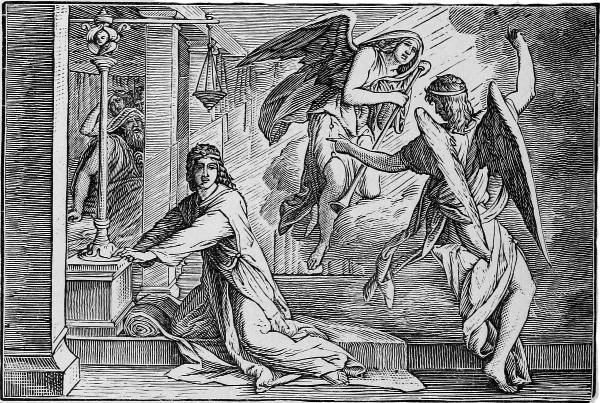
GOD TELLS SAMUEL OF DESTRUCTION OF ELI'S HOUSE.—1 Sam. 3:11.
And, after that, God often made His will known to Samuel, and blessed him, and all Israel knew that Samuel was God's own prophet. Think of the great honor and blessing of having God so often speaking to him! But we have that blessing too. God is nearer to a little Christian child than He was to Samuel; for the Holy Spirit speaks in a Christian child's heart, and tells him to be good and dutiful, and to think of God, and say his prayers with all his heart. And that is better than even being a prophet like Samuel. Only we must take great care to attend to that voice; or it will leave off, and then we shall get worse and worse, like those bad sons of poor old Eli.
QUESTIONS.
1. Who was Samuel? 2. Where was he brought up? 3. What did his mother bring him every year? 4. Who was the High Priest? 5. What did Samuel hear? 6. Who did he think was calling? 7. What did he do? 8. What did Eli say? 9. How often did this happen? 10. Was Samuel cross at being called so often? 11. Who was honoring him? 12. What did Eli perceive at last? 13.[Pg 135] What did he tell Samuel to answer? 14. What did he hear again? 15. How did he answer? 16. What did the voice tell him? 17. Whose voice speaks to us? 18. How does the Holy Spirit speak to us? 19. What must we take care to do?
THIRD READING.
"The Ark of God is taken.—Samuel 4:17.

GOD helped the Israelites again and again, but they would not leave off their wickedness, and at last He punished them still more. There came up a nation to make war upon them, fiercer than any before, called the Philistines. Then the Israelites fancied that if they took the Ark of the Covenant out into the battle with them they would get the victory, as they had done when Joshua conquered the land.
But God had never bidden them take the Ark. He had commanded that it should stay in its place at Shiloh. They did not heed this, but took it out into the camp, and all the people shouted for joy when it was brought, with the two priests, Hophni and Phinehas, Eli's sons, to take care of it. When the Philistines heard the shout, they said that the gods of Israel were come, and that they must fight all the more bravely. And they did.
God would not help His people because of their self-will, so He let them be beaten by the Philistines, and Hophni and Phinehas were killed, and the holy Ark of God was taken by these heathens. And when poor old Eli, the High Priest, heard the sad news, he was so much shocked, that he fell down backwards and broke his neck and died.
God still shewed His power, for when the Philistines put the Ark into the temple of one of their false gods the idol fell down and was broken; and wherever it was taken the people fell sick, till at last they sent it back to the Israelites: but it[Pg 136] never came back to Shiloh. It was hidden in a lonely house in the woods; and the Philistines were strong and the Israelites were very weak and miserable, because they had been so very disobedient.
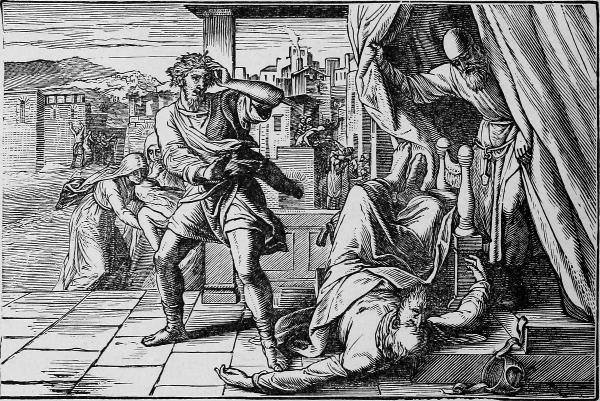
THE DEATH OF ELI.—1 Sam. 4:17, 18.
QUESTIONS.
1. What people came to fight with the Israelites? 2. Why did God let any one hurt the Israelites? 3. What did the Israelites think would help them to fight? 4. What was in the Ark of the Covenant? 5. Where was it kept? 6. Ought they to have taken it? 7. Why not? 8. Why did they take it? 9. Did it give them the victory? 10. Why not? 11. Who were killed? 12. Who was the father of Hophni and Phinehas? 13. What happened to Eli when he heard the Ark was taken? 14. Why did God allow it to be taken? 15. Did it come back again? 16. Why did not the Philistines keep it? 17. What happened to their idol? 18. What happened to themselves? 19. Where had it been before? 20. Did it ever come back to Shiloh? 21. Where was it kept?
KING SAUL.
FIRST READING.
"Behold, the Lord hath set a king over you."—1 Samuel 12:13.

THERE was a young man named Saul, who was very tall and strong. His father kept a number of asses; for, in the land of Israel, people rode on asses instead of horses. One day all the asses were lost, and Saul and one of the servants went out to look for them. They went a long, long way, and never found the asses; and at night they came to a city, and there they found Samuel.
Samuel was an old man now, and grey-headed; and he ruled over Israel, and everyone honored and loved him, because he was so good and just. Saul was very much surprised when the great and good Samuel met him, and led him into the house, and put him in the chief place, and gave him a choice of meat that had been set apart for him. Saul could not think how Samuel knew anything about him. And he was still more surprised the next morning, for then Samuel came out of the city with him, and sent the servant on before. Then Samuel took some oil, and poured it on Saul's head, which was what was called anointing, and told him that God had chosen him to be king over all the people of Israel.
Was not this wonderful news for him? And you see, God had led him to Samuel to be made king, though he so little guessed what was going to happen when he set out to look for the asses. And God still makes everything happen, even the least thing; it is all for our good, even though we do not quite see why.

SAMUEL ANOINTING SAUL.—1 Sam. 10:1.
So Saul was the first King of Israel; but he was only to be prosperous as long as he would take care to obey God.
QUESTIONS.
1. Who was the first King of Israel? 2. Did Saul expect to be a king? 3. What did he set out from home to do? 4. Where did he come? 5. Who was in the city? 6. What did you hear about Samuel last Sunday? 7. What age was Samuel now? 8. What did he give Saul? 9. What surprised Saul? 10. What did Samuel do to him the next day? 11. What is anointing? 12. What was he to be? 13. But what must he do if he would get on well?
SECOND READING.
"There is no restraint to the Lord to save by many or by few."—1 Sam. 14:6.

SAUL was the first king of Israel. But just at first, when he was appointed king, the people were in great distress; for their enemies the Philistines had overrun the whole land, and held all the strong places, and were very hard to the Israelites. They would not even let a smith live among the Israelites, that they might not be able to have swords or spears made to use in fighting, and the Israelites had to go into the Philistines' country to get their axes and ploughshares made, and to sharpen the goads, or long sticks tipped with iron that they drove the oxen with.
THE PEOPLE MUCH FRIGHTENED.
Nobody had a sword or spear but Saul and his good son Jonathan; all the rest of the people had nothing better to fight with than axes and mattocks and goads, and they were very much frightened, and came trembling after their new king.
But Jonathan trusted in God, and he and one young man set out creeping along a rugged steep path to see what the enemy were about, and by-and-by they came below the high rocky hill where the Philistines were encamped.
One of the Philistines looked out and said, "Behold, the Hebrews come forth out of the holes where they had hid themselves;" and he called out to Jonathan, "Come up to us, and we will show you a thing."
Now, Jonathan knew, as he said to his friend, that the Lord can save as easily by few men as by many, so he was not afraid; and he and the other young man climbed up on their hands and knees till they came out among all the Philistine soldiers. Then they began to fight at once, and the Philistines were so surprised at these two men beginning to fight with them,[Pg 140] that they most likely thought all the others were behind, and they began to run away.
The people in Saul's camp heard all the noise, and went out to look, and saw the Philistines running away, so they went after them, and killed many, and drove them out of the land, and got free of them once more.
So God blessed and helped the good Jonathan, because he trusted in Him; and Saul became a great king.
QUESTIONS.
1. Who was the first king of Israel? 2. Who made Saul king? 3. Who was Saul's son? 4. Who were the enemies of the Israelites? 5. Why would not the Philistines let the Israelites have any smiths? 6. What is a smith? 7. What tools does a smith make? 8. How did the Israelites get their iron tools? 9. Who were the only ones that had swords and spears? 10. Why were the people afraid? 11. Who crept out to see the Philistines? 12. What did Jonathan know that God could do? 13. Where did he climb up? 14. What happened? 15. What became of the Philistines? 16. Who became king?
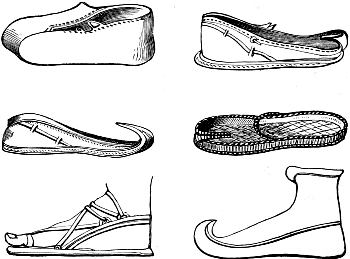
ANCIENT SHOES.
THIRD READING.
"Intreat me not to leave thee."—Ruth 1:16.

ONE fine summer day, a good man named Boaz went out into his corn-fields where his reapers were cutting down the wheat. "The Lord be with you," he said. "The Lord bless thee," they answered. Then he saw a young woman gleaning, whom he had never seen before.
He asked who she was. He heard that her name was Ruth, and she was a stranger and a widow. Then why had she come there? Because she could not bear to leave her husband's mother, Naomi, alone in her old age. She knew that if she kept with Naomi she must be poor and forlorn, and away from all her friends; but she loved her mother-in-law so much, that she said, "Intreat me not to leave thee, or to return from following after thee: * * * where thou lodgest, I will lodge: thy people[Pg 142] shall be my people, and thy God my God: where thou diest, will I die, and there will I be buried."

RUTH AND NAOMI.—Ruth 1:16.
When Boaz knew that Ruth was poor and a stranger, he told his reapers to drop some handfuls of corn in her way; and he told Ruth to keep among his young maidens, so that nobody might be rude to her, and that she might rest and eat among them when they rested in the heat of the day.
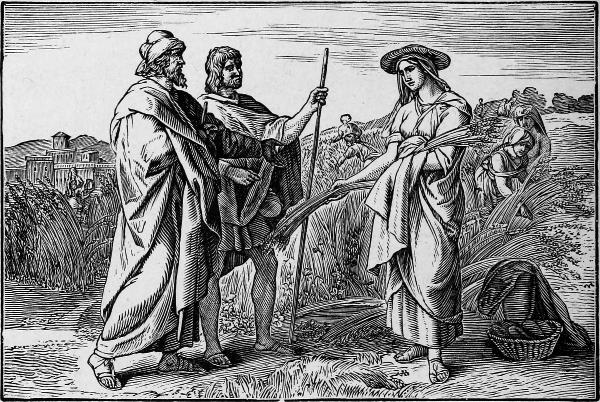
RUTH GLEANING IN THE FIELD OF BOAZ.—Ruth 2:5.
Ruth carried home plenty of corn to her mother-in-law. And soon it was found out that Boaz was their nearest friend; and he married Ruth, and Naomi lived with them; and Ruth was no longer poor and a stranger, but was happy as a wife and mother in her beautiful home.
QUESTIONS.
1. What was the name of the mother of whom we hear to-day? 2. Whose mother was she? 3. But who was good to her? 4. What did Ruth do for Naomi? 5. Where did she go to glean? 6. Who saw her? 7. What did Boaz bid his men do? 8. How did Boaz speak to his men? 9. How did they answer? 10. How was he kind to Ruth? 11. What did she find out? 12. Whom did Ruth marry? 13. What became of Naomi? 14. Why was Ruth so happy?
THE REIGN OF SAUL.
FIRST READING.
"Because thou hast rejected the word of the Lord, He hath also rejected thee from being king.—1 Samuel 15:23.

LAST Sunday you heard how God chose Saul to be king of Israel, and promised to help him if he would obey in all that God commanded him.
Now, there were some cruel robbers that lived in the mountains, and used to fall upon peaceful people and kill them; and take their cows and sheep and camels and asses, and gold and silver, and all they had. So God sent a message by Samuel to Saul and his brave men, to destroy these cruel people; but God said that none of all their prey and riches, that had been gained by such wicked ways, was to be kept by His people; it was all to be made away with; they were to have none of it for themselves.
They won the battle, and killed the robbers, as they were sure to do when God helped them; but then when they saw such fine cattle and choice things, they would not obey God, but went and took it all for themselves. They left only the poor and mean that they did not care for, and helped themselves to all they liked.
And then, when Samuel came to meet them, Saul made as if[Pg 144] he had done just what he was told, and said, "I have obeyed the voice of the Lord." But Samuel said, "What meaneth then this bleating of the sheep in mine ears, and the lowing of oxen which I hear?"
Saul wanted to make excuses; but it was not the first time he had been disobedient; and he was only frightened, he was not really sorry; so Samuel was obliged to tell him, "Because thou hast rejected the word of the Lord, He hath also rejected thee from being king."
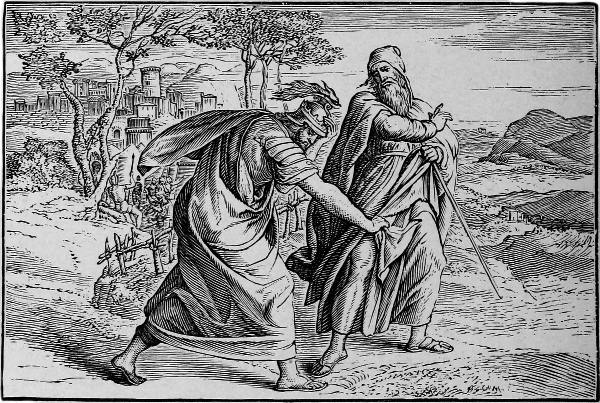
SAUL TEARING THE ROBE OF SAMUEL.—1 Sam. 15:27, 28.
Saul would not do as he was told, and so God punished him. Remember that. Your parents and teachers, or nurses, give you orders; and you have to mind them exactly—not only to do what you like, and miss out the rest. Saul did what he liked when he fought the robbers, but he would not obey when he took the spoil. Then God was angry with him. Do not you be like him; but obey when you do not like, as well as when you do like.
QUESTIONS.
1. What is the Fifth Commandment? 2. What must we always do? 3. Who did we hear of to-day who did not do as he was told? 4. What was Saul told to do? 5. Who told him? 6. Who was Samuel? 7. Who was Saul? 8. What was Saul told not to do? 9. How far did he obey? 10. In what did he disobey? 11. Why was it wrong of Saul to keep the robbers' cattle and sheep? 12. What did he say when Samuel came? 13. Was this true? 14. What did Samuel hear that showed that this was false? 15. Whom had Saul disobeyed? 16. How was Saul to be punished? 17. Why was Saul not to keep the kingdom?

DAVID ANOINTED BY SAMUEL.—1 Sam. 16:11, 12.
SECOND READING.
"I have found David my servant; with my holy oil have I anointed him."—Psalm 89:20.

THE hills that lie above Bethlehem have green slopes where the sheep feed. There, one day, a flock was feeding, and a boy with blue eyes and shining hair watched them, and perhaps sung as he watched. He was the youngest of eight brothers, and all the rest had gone down to a great feast; for Samuel, the great Prophet, was come to visit their father.
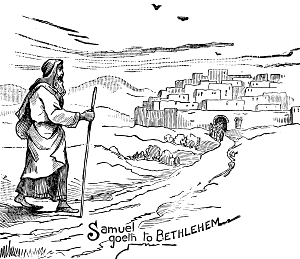
Samuel goeth to BETHLEHEM

The Elders Alarmed
Are here all thy children?
HE KEEPETH THE SHEEP
But the youngest must stay out with the sheep. No one would want him. But see a messenger is coming up the hill. He calls—David is wanted. The Prophet has called for him. So the boy is obedient, and rises up, to run down the hill at his father's call. Perhaps he stopped to wash his face in the clear well of Bethlehem before he went up to the place of the feast, the same place where Boaz had brought his bride Ruth, for Jesse, David's father was Ruth's grandson.
There stood the Prophet, with his long white hair flowing down; and as soon as young David came in, he stepped forward with a horn in his hand, and sweet-smelling oil of olives mixed with incense was flowing upon David's golden hair. He was the Anointed of the Lord. In time to come he would be king, but he must wait long and patiently first.
Yes. Each of his seven brothers had passed before Samuel—tall goodly men—but God had spoken to Samuel, and forbidden him to choose them; for Samuel could only see their fine handsome faces and figures, but God looked at their hearts, and knew they were proud men, who[Pg 147] would soon have been as fierce and headstrong as Saul himself. So he had sent Samuel to choose the youngest and least thought-of of all Jesse's sons, and anoint him to be king of Israel. Yes; and above all, to be the forefather of our Blessed Lord Jesus Christ.
QUESTIONS.
1. Who was sent to Bethlehem? 2. Who used to live at Bethlehem? 3. What was Samuel to do? 4. Whose son was he to anoint? 5. What does anointing mean? 6. What was anointing to mark him for? 7. How many sons had Jesse? 8. How many came to the feast? 9. Which did not come? 10. Where was David? 11. Were his brothers anointed? 12. Why not? 13. Who saw their hearts? 14. Who was sent for? 15. What did Samuel do? 16. Why was Saul to be punished? 17. Why was David chosen? 18. Was he to begin to reign at once? 19. How was he to wait?
THIRD READING.
"I come to thee in the name of the Lord of hosts, the God of the armies of Israel."—1 Samuel 17:45.

THOUGH King Saul had beaten the Philistines, still they used to come back again and try to conquer the Israelites.
Once they came with an army, and Saul had an army too. The Israelites were on one hill and the Philistines on another hill, and there was a valley between. Then out in front of the Philistines' camp came a giant named Goliath; for there really were giants then, and Goliath had three brothers as tall as himself.
Goliath was nearly twice as tall as any man we ever saw, and he had a helmet on his head, and armour on his breast, and an enormous spear, and a shield, and a man carried a shield before him. He stood out, and called to know if any Israelite would fight with him. Then if Goliath conquered the Israelite, the Philistines should be the lords over the Israelites; but if an Israelite conquered Goliath, then the Israelites should be lords over the Philistines.
But nobody felt bold or strong enough to go out to fight with this great man; and day after day he came and walked up and down, and laughed the Israelites to scorn for not daring to come out, they who called themselves the servants of God.
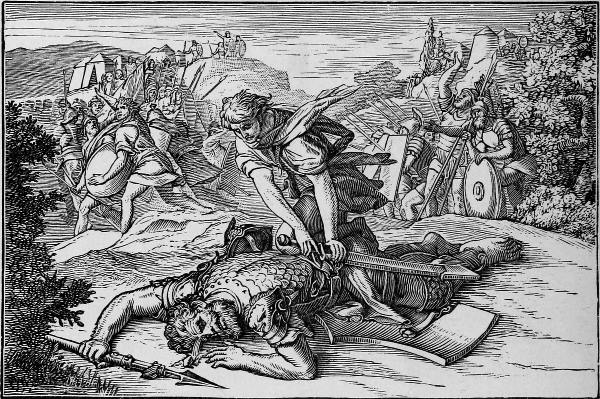
DAVID SLAYING GOLIATH.—1 Sam. 17:50, 51.
At last a young shepherd boy came to the camp. He had three brothers among Saul's soldiers, and his father had sent him to take them some loaves of bread, and see how they were. The shepherd boy's name was David. When he came he saw the proud Goliath walking up and down boasting against the Israelites; he asked the soldiers about him, and was so eager that at last they brought him to the king; and Saul asked him how it was that he, who was only a youth, could dare to think of fighting with a man of war like Goliath.
David answered that when he was keeping his flocks a lion and a bear had come and tried to take away a lamb. And God had made him strong to kill both the lion and the bear, and saved[Pg 149] him from danger; and he trusted that in like manner God would help him if he fought with the giant.
So Saul wanted to dress David in his own armour, but it was too large for him, and he would not use it. All he did was to choose five smooth stones out of the brook, and put them into his shepherd's bag. And he took his sling, a long strip of leather, the ends of which he used to hold in his hand to throw stones farther with, when he wanted to drive beasts away from his flock. And with only his sling and his stone he went out to meet the giant.

SAUL CASTING HIS JAVELIN AT DAVID.—1 Sam. 19:9, 10.
Goliath was fierce and angry when he saw such a boy, and he thought it was only laughing at him to send no better warrior to fight with him. But David said, "Thou comest to me with a sword and with a spear and with a shield: but I come to thee in the name of the Lord of hosts, * * * whom thou hast defied."
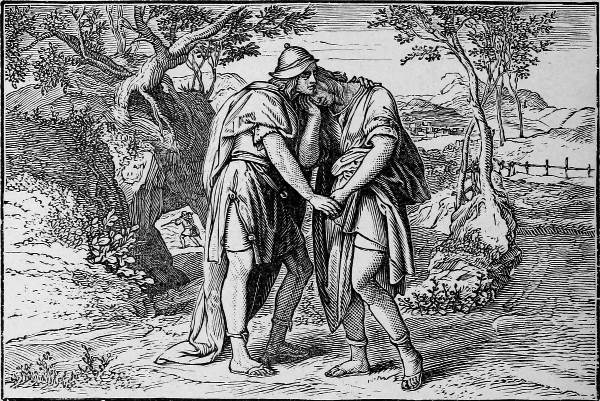
THE PARTING OF DAVID AND JONATHAN.—1 Sam. 20:42.
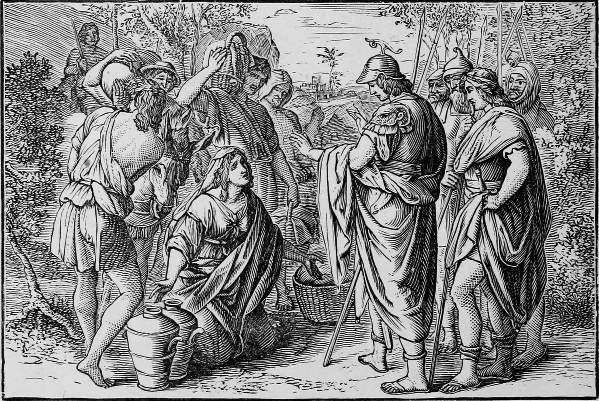
DAVID AND ABIGAIL.—1 Sam. 25:32, 33.
Then David took one of his stones and slung it out of his
[Pg 150]
[Pg 151]sling. It struck the very middle of the giant's forehead, and
went deep in, and down fell Goliath. All his great strength
was of no use to him, and David ran and stood upon him, and
drew out his great sword from his side, and cut off his head.
All the other Philistines fled away, and David gave thanks to God for his great victory.
By-and-by David came to be king instead of Saul; and he loved God, and trusted in Him so faithfully that God Himself called him a man after His own heart.
QUESTIONS.
1. Who were the enemies of the Israelites? 2. Who was the giant? 3. What is a giant? 4. What did Goliath wear? 5. What did he call the Israelites to do? 6. Who was the only one that would come out to fight? 7. What was David? 8. Why was not David afraid? 9. What had David killed before? 10. What did David take with him? 11. What was a sling? 12. What did David say? 13. Who helped David? 14. How did David attack Goliath? 15. What happened to Goliath? 16. What did David do to him then? 17. What became of the other Philistines? 18. What did David come to be? 19. What did God call David? 20. Why did God love David?

KING DAVID REIGNING.
FIRST READING.
"How are the mighty fallen!"—2 Samuel 1:19.

THE last thing that has to be told about Saul is very sad. You know he would not do as God bade him, but chose to go his own way. Then God forsook him, and left him to grow worse and worse. Then his enemies, the Philistines, came up against him, and his army came together on the hills to meet them.
But God was not with Saul, so his men could not fight, and he was beaten back step by step up into his own hills, close to his home; and there, when he found he could go no further, and that the Philistines would soon be upon him, he did the saddest thing of all—he threw himself on his own sword, that they might not take him alive.
He did not quite kill himself; and when a young robber came by, trying to get garments and weapons from the dead bodies, the unhappy king begged for a death-blow as he lay. The robber gave him the last stroke, and then took the crown from his helmet, and his bracelets, and brought them to David, to show that he was dead.
The robber thought he should have a reward, but David put him to death for having dared to strike the king: and David grieved and mourned for Saul, who had been a great and noble king once. But he had come to this miserable end because he would have his own way and will.

THE DEATH OF SAUL.—1 Sam. 31:4.
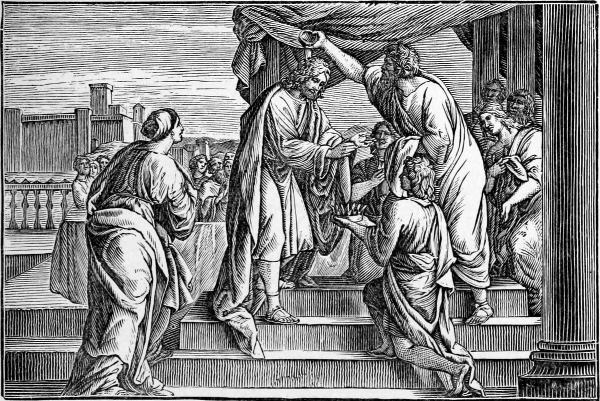
DAVID ANOINTED KING OVER ISRAEL.—2 Sam. 2:4.
Then, when Saul was killed, David was anointed to be king; and he was a very good man, and served God with all his heart. So God blessed him, and made him great and powerful.
QUESTIONS.
1. Who was Saul? 2. What was Saul's fault? 3. Who came out to fight against Saul? 4. Where was he driven? 5. Who came after him? 6. What dreadful thing did he do? 7. Who killed him entirely? 8. What did the robber take? 9. To whom did he carry Saul's crown? 10. What did David do to him? 11. Why? 12. Who was to be king now? 13. Why did Saul come to such an end? 14. Whose way should he have followed? 15. Can anyone go on well who is self-willed? 16. Who was king after Saul?
SECOND READING.
"I shall go to him, but he shall not return to me."—2 Samuel 12:23.

KING David had a little son, a baby, whom he loved very much; and this child fell sick. While it was sick King David grieved for it, and prayed that it might be made well. But it was not God's will to make the little boy well, and he died. And then David was patient, and knew it was God's will; and he said, "I shall go to him, but he shall not return to me."
For David meant that one day he should die, and then his soul would go to be with his little son's soul in the happy place of rest; and by-and-by their bodies will rise again out of their graves, and be joined to their souls again, and live for ever and ever.
King David used to sing the Psalms to praise God; indeed, he first made most of them; and in one he says, "My flesh also shall rest in hope." That was, the hope that he should rise again from the dead, and always live in God's holy home in heaven. Heaven is the happy place where we all hope to meet and live by-and-by, and that is the comfort that good Christians have when death takes away friends whom they love.
QUESTIONS.
1. What was David's sorrow? 2. What did he do when his little boy was ill? 3. Did the little boy get better? 4. What became of him? 5. How did David bear his death? 6. What did he say? 7. Where did he hope to go to his little son? 8. When would his soul go to his child's soul? 9. When will their bodies rise? 10. What does David say of his flesh? 11. What is his flesh? 12. What hope does he rest in? 13. When will our flesh rest? 14. What do we hope to do? 15. Where in the Belief do you say we hope to rise from the dead? 16. What people will be happy then? 17. What are David's songs called?

DAVID MOURNS THE DEATH OF HIS CHILD.—2 Sam. 12:18.
THIRD READING.
"O my son Absalom, O Absalom, my son, my son!"—2 Samuel 19:4.

GOOD King David had more sons besides the little one who died. One was named Absalom. He was a very fine, handsome young man, and had most beautiful hair; but he was fierce and proud, and wanted to be king.
And when David was old, this wicked Absalom gathered men together, and drove his father away, that he might[Pg 156] be king instead. Good King David had to go away, weeping and barefoot, down the steep rocky pass, for fear of his wicked son; and cruel men called him names, and threw stones at him as he went, while Absalom was made to reign in his father's palace, and did all he pleased there. But God will not let wicked men prosper; and all David's faithful old soldiers came together to help him. They had a great battle with Absalom and his men; and Absalom was beaten, and fled away on a mule.

SHIMEI CASTING STONES AT DAVID.—2 Sam. 16:5, 6.
But when he came into a wood, his thick hair was caught in an oak tree, and he could not get it loose; and his mule went away, and left him still with his hair caught in the tree.
Now, though Absalom had been so wicked, his father loved him still, and had begged all his men to take care not to hurt the young man Absalom. So when one of the men saw Absalom caught by the hair in a tree he would not hurt him, and only went and told Absalom's cousin, Joab, who was the captain of David's army.

Joab had no pity; he thought Absalom richly deserved to die, and he was afraid the king would pardon him; so he went at once, with three darts in his hand, and killed Absalom as he hung in the tree.
King David was grieved to the heart. No words can say how sad he was to think that his son had died in his sin, and never asked his pardon. He wept, and cried aloud, "O my son Absalom, my son, my son Absalom! would God I[Pg 158] had died for thee, O Absalom, my son, my son!" It was not like his grief for the innocent little baby he had lost before; for Absalom had been a bad man, and for that there is no comfort.
And when all the people came joyfully to bring King David home to his palace, to be king again, still his heart mourned for his son Absalom.

THE DEATH OF ABSALOM.—2 Sam. 18:9.
QUESTIONS.
1. What is the Fifth Commandment? 2. Do you hear of any one to-day who broke the Fifth Commandment? 3. How did Absalom break it? 4. Who was Absalom's father? 5. How had David to go away? 6. What did cruel men do? 7. Who came to help David? 8. What did he charge them? 9. Who won the battle? 10. What happened to Absalom? 11. Who saw him there? 12. Whom did the man tell? 13. Why did Joab kill Absalom? 14. Did Absalom deserve it? 15. How did his father behave? 16. What did he cry out? 17. Why was he more sorry than for his baby son? 18. What is sadder than even dying? 19. How should you behave to your parents?
PREPARING FOR THE TEMPLE.
FIRST READING.
"Nay; but I will surely buy it of thee at a price."—2 Samuel 24:24.
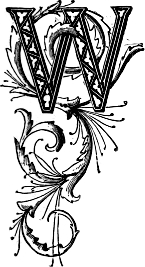
WHEN David was king his people did wrong again; and there came a plague upon them, so that a great number of them died all through the land of Israel.
David and his priests, and all the good men, fasted and prayed, and entreated that God would turn His anger away. And while they were praying, David saw the Destroying Angel standing with his drawn sword over Jerusalem; but the plague had not begun there. Then David prayed the more; and God made known to him that he must offer up a sacrifice on the threshing-floor of Ornan, just by Jerusalem, and then the plague should be stopped.
A threshing-floor was a flat rocky place on the top of a hill, where the sheaves of corn were laid out, and oxen drew boards, with the under side covered with spikes, to knock the grain out of the ears. Oman's threshing-floor was upon Mount Moriah, where Isaac had been so nearly sacrificed. He was threshing wheat on it when David came and desired to buy it for the sacrifice.
Ornan was a good man, and said he would give the whole place to the king. But David said, "I will not offer unto my God of that which doth cost me nothing." So he bought the place of Ornan, the oxen, and the threshing tools; and the sacrifice was[Pg 160] made to show that death must be for sin. Then God pardoned Israel, and the plague was stopped. We should remember that our offerings to God are only worthy if they cost us something. He does not want the things themselves, but He does value the love that gives them.

The King said...

I dwell in a house of cedar
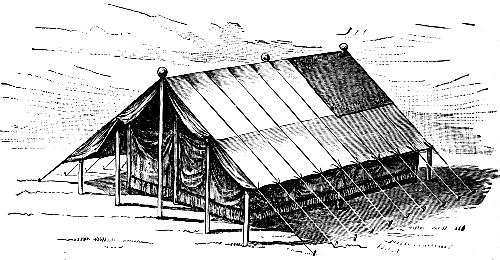
But the ark of God dwelleth within curtains.
QUESTIONS.
1. What is a threshing-floor? 2. Whose threshing-floor have we heard of? 3. Where was it? 4. What had happened on Mount Moriah? 5. Whose son was Isaac? 6. Was he sacrificed? 7. Why not? 8. What town was near? 9. Who bought the threshing-floor? 10. Why? 11. What is a plague? 12. Why was the plague sent? 13. What did David see? 14. What was he bidden to do? 15. What did Ornan want to do? 16. What did David say? 17. So what ought we to give to God?
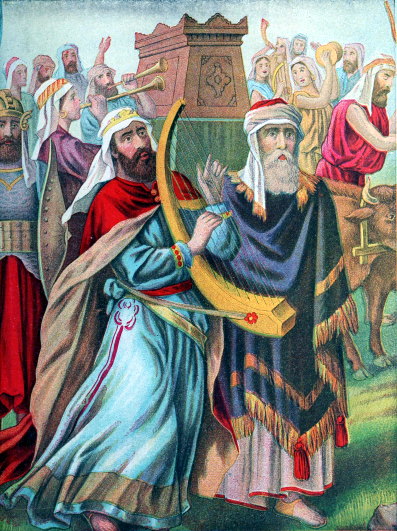
THE BRINGING UP OF THE ARK
SECOND READING.
"His seed also will I make to endure for ever."—Psalm 89:29

YOU know the two Tables of the Commandments were kept in the Ark of the Covenant; and when the Israelites were going about in the wilderness, they had a beautiful tent to keep it in. But now they had come into the Land of Promise, and had no more journeys to make, David wished to build a house, or temple, where the Ark might be kept, and to make it beautiful for the glory of God.
But the Lord had sent a prophet to tell David that he must not himself build a house for God, because he had been a man of war, and had fought, and shed much blood; but that his son Solomon should be a man of rest, and should build the Temple for the Lord.
David did not repine. He thanked God for giving him the hope that his son should do this great work; and all the rest of his life he was busy getting together gold and silver, brass and iron, and beautiful cedar wood, all for the Temple of his God. It was to be built on Mount Moriah, on the threshing-floor he had bought of Ornan, just by the city of Jerusalem, which David had conquered from the Jebusites, and made the capital of his kingdom.
QUESTIONS.
1. What was kept in the Ark of the Covenant? 2. Where was the Ark kept at first? 3. What did David want to build? 4. Why was David not allowed to build a temple? 5. Did he fret and grieve at being forbidden? 6. Who was to build the Temple? 7. What did David get ready? 8. Where was the Temple to be? 9. When had he bought it of Ornan?
THIRD READING.
"All things come to Thee, and of Thine own have we given Thee."—1 Chronicles 29:14.

DAVID had grown to be a very old man, near to his death; but, before he died, he called all the princes of his people together at Jerusalem, and asked them all to bring offerings to help to build a beautiful house, to be a Temple to the Lord their God. So all the people brought what precious things they could, to add to what the king had prepared; and a great quantity was ready—all willingly offered.
Then good King David stood up and made his offering. "All things come of Thee," he said, "and of Thine own have we given Thee." And he thanked and blessed the Lord God, who had been with him all his life; and he blessed his people Israel, and showed them his son Solomon, who was to reign after him; and he gave[Pg 163] Solomon a charge to build the Temple of the Lord, and bade them all serve the Lord with all their might. And the crown was set on Solomon's head, and he was king; and David died at a good old age. He was the shepherd boy who came to be a king, and who first sung so many of the beautiful Psalms that are still our best words for praising God.
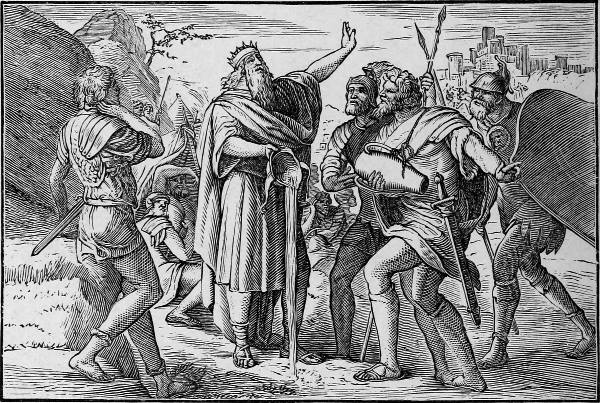
DAVID'S THREE MIGHTY MEN.—2 Sam. 23:16, 17.
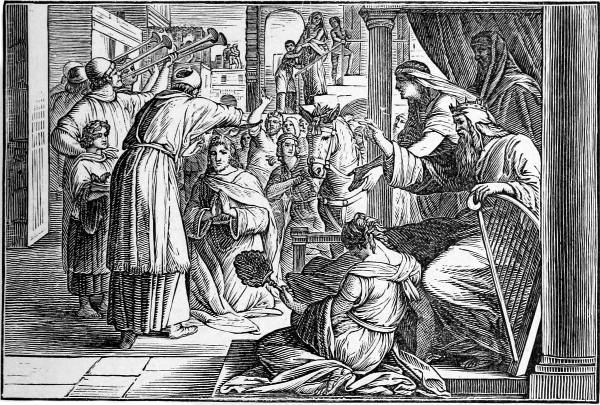
SOLOMON ANOINTED KING.—1 Kings 1:39.
QUESTIONS.
1. Who was David? 2. Who was his son? 3. What was Solomon to do? 4. What had David got ready for Solomon? 5. What did he ask his princes to bring? 7. What for? 8. When did David meet all his people? 9. Who was to be king? 10. Why was David glad? 11. What did he say to God? 12. Whose are all things? 13. What charge did David give? 14. What had David been before he was king? 15. What did David write? 16. What are the Psalms?
SOLOMON IN ALL HIS GLORY.
FIRST READING.
"Thine, O Lord, is the greatness, and the power, and the glory, and the victory, and the majesty."—1 Chron. 29:11.
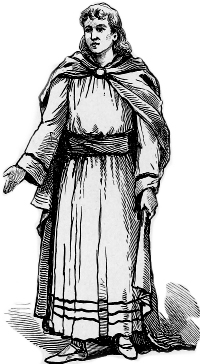
Solomon.
THE last thing King David did was to have his son, young Solomon, anointed to reign, and then to show him to the people, and charge them to help him build the Temple for the Lord God. For he said Solomon was still very young, and the work was very great; so he begged the people of the tribes to bring their offerings; and so they did.
They brought gold, silver, brass, iron, and beautiful stones, or the wood of oaks and cedars, according to what they had or could give; and when David saw it he was very happy and glad, and offered it up to God, and prayed that God would give unto his son Solomon a perfect heart, that he might serve God and keep His laws.
Then there was a great feast all round Mount Sion, all the people eating, and drinking, and rejoicing, and praising God, who had delivered them from all their enemies.
QUESTIONS.
1. What did David ask of his people? 2. What did they bring him? 3. What were all these things for? 4. Who was to build the Temple? 5. Why was not David himself allowed to build it? 6. Yet what did he get together for it? 7. Why was he happy? 8. What did he ask God? 9. What great rejoicing was there? 10. Why was everything happy now with the nation?
SECOND READING.
"Give me now wisdom and knowledge."—2 Chron. 1:10.

WHEN King David died, Solomon was still almost a boy. But God spake to him in a dream by night, and said, "Ask what I shall give thee." Then Solomon said he was but young, and knew not how to rule over this great people that God had given him; and therefore he prayed, above all, that God would give him a wise and understanding heart.
And God was pleased with Solomon's choice, and said that because he had cared for wisdom most, and had not asked for riches, or long life, or to put down his enemies, that therefore, besides wisdom, God would give him all the rest—riches, and honor, and length of life—and he should be wiser, and greater, and richer, than any king ever was before him, or should be after him.
All this was because he had cared so much to have a wise and understanding heart to know good and evil. That was first with him, and so God gave him all the rest. So it will be with all those who seek first of all to be good. God does not make us wise all at once like Solomon, but if we care about it, He will help us to get wise by little and little if we really try, and then He will bless all we do.
QUESTIONS.
1. Who was Solomon? 2. Whose son was he? 3. What was he king of? 4. How old was he when he began to be king? 5. What did God say to him at night? 6. What did Solomon wish for most? 7. What did God give him be[Pg 166]sides? 8. Why did God give him all these things when he did not ask for them? 9. What should we care about most? 10. What will God do for us if we care most about goodness? 11. How will He help us to get wise? 12. But what must we do ourselves?

THE JUDGMENT OF SOLOMON.—1 Kings 3:26, 27.
THIRD READING.
"The wisdom of God was in him, to do judgment.—1 Kings 3:28.

HERE is a story to show how wise and clever King Solomon was. One day when he was sitting on his throne two women came to him: one with a live baby, the other with a dead one, both boys, and just of the same age. They said they had been living alone together in the same house, each with her little baby, till one night one of the women rolled over her child in her sleep and smothered it, so that she found it was dead.
But each woman said it was not her baby but the other's that was dead, and that the mother of the dead one had put the[Pg 167] little corpse down by the other sleeping woman, and taken her living child out of her bosom to herself. How was it to be known which was right?—for nobody out of the house knew the two little ones apart, and each of the women declared that she was the mother of the live child, not of the dead. So they came to the king to judge between them.

THE BUILDING OF SOLOMON'S TEMPLE.—1 Kings 6:11-14.
And what plan could Solomon take to find out the truth? He sent for the executioner, with a sword, and said that as the women could not agree, both the children should be cut in two, and each woman should have the two halves. One woman was content to have it so, but the other only cried out in grief and dread, "O my lord, give her the living child, and in no wise slay it."
Then Solomon saw in a moment which was full of mother's love, and which was full of hatred and jealousy; so he said, "Give her the living child, and in no wise slay it: she is the mother[Pg 168] thereof." And so the true loving mother had her child safe and well, and the other was disappointed in her spite.
QUESTIONS.
1. Who was Solomon? 2. Who came before him? 8. What had happened to one baby? 4. What did both the women say? 5. What had Solomon to decide? 6. What did he command? 7. Did he really mean to kill the child? 8. But what did he want to find out? 9. What did one woman say? 10. What did the other woman say? 11. Which was the real mother? 12. What did Solomon command? 13. Would not the loving mother rather give the child away than have it killed?

SOLOMON'S FALL.
FIRST READING.
"All the earth sought to Solomon, to hear his wisdom, which God had put in his heart."—1 Kings 10:24.
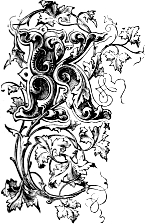
KING Solomon was the greatest king in wisdom and riches who ever lived. He had an ivory throne with golden lions standing on the steps, and a beautiful house lined with sweet cedar-wood. He sent ships which brought home gold and silver, and apes and peacocks; and it was said that gold was as common as silver generally is, and silver as common as stones!
All people honored him, and the Queen of Sheba came from her far-off country to see him, because of the fame of his greatness. And when she saw him she was quite overcome, and said that all she heard was not half so grand and glorious as what she saw. Very happy, she said, were the people who stood round him and heard the words of his wisdom.
We have the words of his wisdom in the Book of Proverbs in the Bible, for his wisdom came from God. And though we shall never see his purple robes or his gold and silver, do you know what our blessed Saviour said?—"Consider the lilies of the[Pg 170] field, how they grow; they toil not, neither do they spin: and yet I say unto you, that even Solomon in all his glory was not arrayed like one of these."
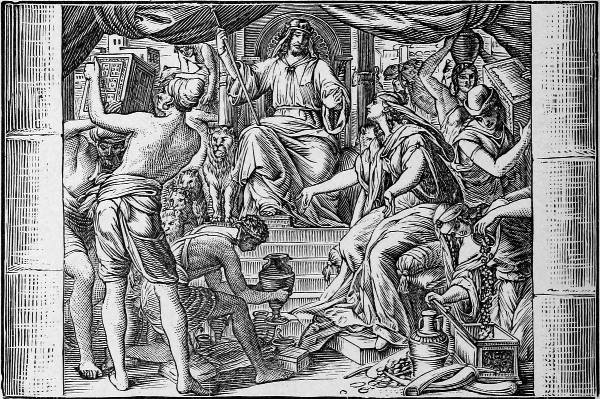
THE QUEEN OF SHEBA VISITING SOLOMON.—1 Kings 10:6-10.
The least little flower, if you look well into it, is more beautiful than anything King Solomon ever wore, for God made it; and he could only put things together that were made already.
QUESTIONS.
1. Why was Solomon so rich? 2. Whose son was he? 3. What had he built? 4. When he had built the House of God what did he build? 5. What sort of throne had he? 6. What were the steps? 7. Who came to see him? 8. What did she say of him? 9. Where have we got his wisdom? 10. What do we call it? 11. What did our blessed Saviour say about him? 12. What have we got which are more beautiful than Solomon's robes? 13. Why are flowers more beautiful than Solomon's robes?
SECOND READING.
"Then will I visit their transgression with the rod, and their iniquity with stripes."—Psalm 89:32.

IT is very sad to say that as Solomon grew old he left off being good. He married a great many wives, and brought them from the heathen nations round; and he did not teach them to worship the true God, but let them worship each in her own way.
So, out in his gardens, one lady had her idol to the moon, and another had hers to the dreadful idol Milcom, and so on; and though Solomon knew so much better, even he was persuaded to come and pay honor to these idols, just to please these women—he, the son of David, whom God had blessed so much.

IDOLATRY OF SOLOMON.—1 Kings 11:4.
And what the king did the people were sure to do. So God spake to Solomon, and told him that since he had fallen away[Pg 172] from the right way, he must be punished, and that ten out of the twelve tribes would be taken away and not belong to his kingdom.

REVOLT OF THE TRIBES.—1 Kings 12:16, 17.
It was not to happen in his own time, but in his son's time, but it must have been very sad to him to know that his beautiful kingdom and great power were to be so lessened, and that his son Rehoboam was a very foolish young man, who would spoil everything. But he was not to lose all, only part, for the sake of the holy King David, to whom God had promised that his throne should last for ever.
QUESTIONS.
1. What wrong did Solomon do? 2. Where did his wives come from? 3. What did they want to worship? 4. Did Solomon let them? 5. What did he do himself? 6. Why was this wrong? 7. What is the First Commandment? 8. What did God tell Solomon? 9. How was he to be punished? 10. How many tribes were to be lost? 11. How many were to be kept? 12. Why were any to be left? 13. What had God promised David? 14. In whose time was the trouble to come? 15. What was the name of Solomon's son?
THIRD READING.
"I will take the kingdom out of his son's hand."—1 Kings 11:35.

THERE was a strong brave man of the tribe of Ephraim, named Jeroboam, and God sent his prophet to speak to him. Jeroboam had a new mantle on, and the prophet took it and tore it into twelve pieces, and gave Jeroboam ten of them.
Then the prophet said this was to show how God was going to tear away ten tribes from Rehoboam, the grandson of David, and give them to Jeroboam, because Solomon was bringing idols in to be worshipped. And he told Jeroboam that all should go well with him, and he would be a great king, and his sons after him, if he would go on serving the Lord, and the Lord only, and would keep from idols.
QUESTIONS.
1. What was to be taken from Solomon's son? 2. What was the name of Solomon's son? 3. Who was to have the tribes? 4. Who told Jeroboam so? 5. What sign did the prophet give? 6. What was torn? 7. Of how many tribes would Rehoboam be king? 8. Of how many would Jeroboam be king? 9. Why were any taken from Rehoboam? 10. Why were any left? 11. What does the Second Commandment say? 12. How long would Jeroboam go on well?
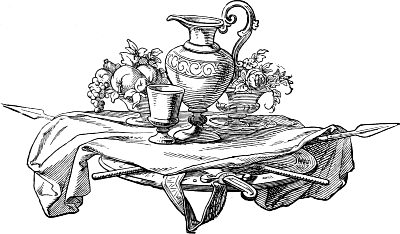
THE KINGDOM OF ISRAEL.
FIRST READING.
"This thing became a sin."—1 Kings 12:30.
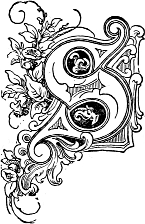
SOLOMON'S son was named Rehoboam. He was foolish and hasty; and when his father's wise old men gave him good advice he would not listen to them, but only cared for his young friends, who were as foolish as himself. So when the Israelites came to him to ask him not to be hard upon them, and make them bring him so much corn and so many sheep, the old men told him to answer them kindly and gently, but the young men said he had better be fierce and sharp. So he followed the young men's advice, and made a very unkind answer.
This made them all so angry that they said they would not have him for their king any longer; but they took Jeroboam, a brave strong man of the tribe of Ephraim, and made him their king. Only two tribes still held steady to Rehoboam. These were the tribes of Judah and Benjamin. God left him these, because of the promise that King David's sons should go on sitting on his throne. But ten of the tribes had made Jeroboam their king; so that now there were two kingdoms—a large one called Israel, and a small one called Judah.
This was because Solomon had let his heart turn away from[Pg 175] God, and had not taken pains to keep his people holy, but had cared more for riches, and power, and glory. But Jeroboam did not take pains to serve God. He set up two calves, made of gold, for the Israelites to worship, instead of going to the Temple.
QUESTIONS.
1. Who was Solomon? 2. Who was his son? 3. Whom did Rehoboam like best? 4. What did his people ask? 5. What did the old men advise? 6. What did the young men advise? 7. Whose advice did he take? 8. What answer did he give? 9. What did the Israelites do? 10. Whom did they make their king? 11. How many kingdoms were there? 13. How many tribes made up Israel? 14. Who was king of Judah? 15. Who was king of Israel? 16. Why did not Rehoboam lose all? 17. What had God promised David? 18. Why did Rehoboam lose any? 19. What foolish answer did he make? 20. What idols did he set up?
SECOND READING.
"I may not return with thee, nor go in with thee."—1 Kings 13:16.

IT is a sad story that you hear to-day. There was a man who was called a prophet, because God spoke to him, and used to send him to declare His will to the people.
Once God called this prophet, and told him to go to a place called Bethel, where the wicked king of Israel, Jeroboam, had set up a golden idol in the shape of a calf, and was teaching the people to pray to it, instead of going to the Temple at Jerusalem to worship. He was to tell the king of his sin, and how his idol should be overthrown and destroyed; and when he had done this, he was to come home at once, by a different way, and neither eat bread nor drink water, but come quickly back.
The prophet went to Bethel, and he spoke God's words to the king boldly; and when the king put out his hand to strike him God struck the hand, so that Jeroboam could not draw it back till the prophet prayed for him. Then Jeroboam felt God's power, and wanted the prophet to come to his palace with him.[Pg 176] But the prophet said no; for God had commanded him to go home at once, without eating or drinking in that wicked place. So he set off.
He had so far done well; but before he had gone all the way he grew tired, and he sat down under an oak. It was a great pity that he delayed, for there was a bad man coming after him with a lie upon his lips. This man told the prophet that God had said he was to come back and eat and drink; and I am grieved to say the prophet listened, and turned back.
He ought to have known that God would have told him Himself if he was to go back; but he did not think—he did what pleased himself, not what pleased God; and he went back to feast with this stranger. But God's anger came upon him. When he went back in the evening, a lion came out of the wood and killed him.
The lion did not kill the ass he rode upon, nor tear the body, and the ass did not run away from the lion; but the lion and ass both stood by the dead prophet till—who do you think found him? The very man who had tempted him to do wrong! Must not that have been a terrible sight?
QUESTIONS.
1. What had God told the prophet to do? 2. What had He told him not to do? 3. What was the first wrong thing the prophet did? 4. What harm came of his lingering? 5. How did he disobey? 6. What was his sad end? 7. Who found him lying dead? 8. What were standing by him? 9. Why did he come to this sad death? 10. How did he fall in the way of the wicked man? 11. What is the way to fall in with bad people? 12. Then how should you always go on messages, or to school? 13. Is it enough to mind only half what you are told?

THE QUEEN OF SHEBA VISITING SOLOMON.
THIRD READING.
"The barrel of meal shall not waste, neither shall the cruse of oil fail, until the day that the Lord sendeth rain upon the earth."—1 Kings 17:14.

IT is very sad to say, but the Israelites went on getting more fond of idols, and would not worship God. They grew so wicked that at last He punished them, to teach them who sent the rain and did them good.
He would not let it rain for three whole years. No rain by day, no dew by night! The corn would not grow, the grass dried up, and all the streams were nothing but stones; so that there was nothing to eat or to drink, and everyone was in sad distress.
There was one good man, a prophet, called Elijah, and God took care of him. He sent him to a lonely place, by the side of a little mountain stream, where there still was water to drink; and every morning and evening there came two ravens, who[Pg 178] were sent by God, to bring him bread and flesh. That was a great miracle, or wonder, which God worked to feed His prophet.
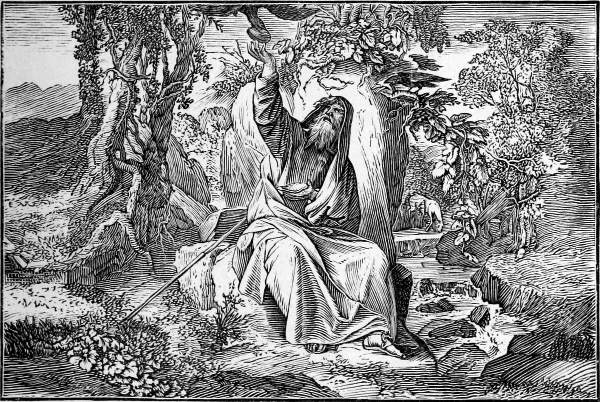
ELIJAH FED BY THE RAVENS.—1 Kings 17:5, 6.
In time the brook dried up, and then God sent Elijah to a town called Zarephath. There Elijah saw a poor woman gathering sticks, and he asked her to give him a bit of something to eat. But the poor widow woman said she had nothing for herself and her son but a handful of meal and a little oil, and she was going to make a cake of it, and bake it with a fire of her sticks; and that was the last she could get, so they must die of hunger after they had finished.

THE WIDOW'S SON RESTORED TO LIFE.—1 Kings 17:21, 22.
But Elijah still told her to make him a little cake first, for he said, "Thus saith the Lord God of Israel, The barrel of meal shall not waste, neither shall the cruse of oil fail, until the day that the Lord sendeth rain upon the earth."
And the woman believed him, and gave him a bit of her last cake. And it was as he said. There was always meal and oil enough to feed them day by day: the widow, and her son, and the[Pg 179] prophet, went on living on the meal every day, for God fed them.
At last the child fell sick and died; and his mother grieved for him. But Elijah laid the child on his bed, and prayed to God to have mercy on the widow: and God had mercy. The little child's soul came back, and he was alive again; and Elijah gave him to his mother.
Are not these three great wonders of God's goodness? God does not let us see miracles now, as He did in those times, because we are taught to believe in Him without them. But He still takes care of us. He takes care that if we trust to Him, and pray to Him, we shall have our food every day. And if we are ready to give what we want ourselves away to one who needs it, He will make it up to us, and take care of us all the more. And though no one is brought to life now who has died, yet God often gives us back our friends when they have been very ill; and we know that we shall all rise up from the dead and live with God for ever, at a greater call than Elijah's.
QUESTIONS.
1. What is a miracle? 2. How many miracles have you been hearing of? 3. For whom were they worked? 4. Who worked them? 5. What were the three miracles? 6. Why was it a miracle that the ravens fed Elijah? 7. Why did the ravens bring Elijah the food instead of eating it themselves? 8. What was the next miracle? 9. How came the widow always to have enough? 10. How did she show that she was worthy to have a wonder worked for her? 11. Why was God pleased with her? 12. What more did God do for her son? 13. Who prayed for him? 14. How could you try to be like the good widow? 15. What is the way to be helped? 16. What do you ask God to give you every day?

ELIJAH AND AHAB.
FIRST READING.
"The Lord, He is the God; the Lord, He is the God."—1 Kings 18:39.

YOU heard last Sunday how sadly the Israelites were behaving when they prayed to a golden calf. They had a still worse idol afterwards. His name was Baal; and they wanted to worship him instead of the true God. To-day there is a beautiful chapter that I hardly like to put into my own poor words. Listen to it well in church, and you will hear how wonderful it is.
There were four hundred prophets, as they called themselves, who worshipped Baal, and only one real prophet who worshipped the Lord God. This prophet was named Elijah. He called all the people to a high mountain, and said they should see who was the true God. He said he would build one altar, and that the four hundred prophets should build another; they should each offer a sacrifice, and each should pray to his god, and the God that sent fire to burn the sacrifice would be the true God.
The prophets of Baal tried first. They built their altar and put wood on it, and killed a bullock and cut it up, and they prayed to their god Baal to send fire down. But he was no god—he was nothing at all; and though they cried and shouted, and leaped about, and even cut their own flesh in their rage, not a spark of fire came.
Then Elijah made his sacrifice. And he did a strange thing; for he had water poured all over it, till all the wood was streaming wet—and you know water always put out fire—so how was it ever to be burnt? He even made a trench round, and filled that with water too. Then he knelt down, and prayed that the Lord God in heaven would show His power, and make the people know that no one else was God.

ELIJAH SLAYING THE PROPHETS OF BAAL.—1 Kings 18:39, 40.
And down from heaven came the fire! It was not stopped by the water! No, it dried that up in a moment, and burnt the wood, and consumed the sacrifice! And all the Israelites fell on their faces, and cried out, "The Lord, He is the God; the Lord, He is the God!" For only the Lord God is Almighty, and can do wonders.
QUESTIONS.
1. Who is the prophet we read of to-day? 2. What wicked thing were the Israelites doing? 3. What is the First Commandment? 4. What was the name of the false god? 5. How many prophets were there for Baal? 6. Who only [Pg 182]spoke up for the true God? 7. What did Elijah say they would try? 8. How would they know which was the real God? 9. What happened when Baal's people prayed to him? 10. Why did not Baal send them any fire? 11. What did Elijah do to his sacrifice? 12. Whom did he pray to? 13. What came down from heaven? 14. What became of all the water that Elijah had poured out? 15. Why did not the water stop the fire? 16. What did all the people cry out? 17. What word in the Belief means that God can do everything?
SECOND READING.
"A still small voice."—1 Kings 19:12.

AFTER the Israelites had called out, "The Lord, He is the God!" and owned that Baal was nothing but an idol, God had mercy on them, and sent them rain again; and their famine was over.
But King Ahab's wife, whose name was Jezebel, was a heathen woman, and she would worship Baal, and did not choose to believe in the true God. And she was very angry with Elijah, and sent men out everywhere to put him to death. Elijah was obliged to flee far away for fear of her; and he went out into the wilderness, and sat down under a juniper tree; and there he was so sad, to think that all he had done was of no use, that he requested for himself that he might die, for he could do no more good with these wicked people.
Then he went to sleep; and when he woke an angel was by him, with a cake baken on the coals, and a cruse of water; and the angel bade him rise and eat, for the journey was too great for him.
It was a great journey, for he was to go all the way to the Mount of God, where God had spoken to Moses. And there he stood in a cave; and a voice came and asked, "What doest thou here, Elijah?" Then he told how the Israelites had forsaken their God, and killed the prophets, and "I, even I only, am left," he said; "and they seek my life to take it away." Then God showed him His wonders.
First a great strong wind came rushing by—but the Lord was not in the wind. Then there was an earthquake, that broke the rocks in pieces—but the Lord was not in the earthquake. And after the earthquake a fire—but the Lord was not in the fire. And after the fire, a still small Voice.
Then Elijah wrapped his face in his mantle, and stood in the entrance of the cave, to hear what God would say to him. And God told him he was not all alone, as he thought; for there were many good men still left who had never bowed the knee to Baal, nor deserted the God of their fathers. And God sent him back to return to his work among the people of Israel, and not to think that there was no hope because he could not see it; nor to think he was left alone because he had no friends near him that he could see.
QUESTIONS.
1. How long was there no rain in the land of Israel? 2. Why was there no rain? 3. Who told the Israelites of their wickedness? 4. What wonder showed who was the real God? 5. What did the Israelites cry out? 6. Who was the Israelite king? 7. Who was Ahab's wicked wife? 8. What did she want to do to Elijah? 9. Where did Elijah flee to? 10. Who came to feed him? 11. Where did he go? 12. What had been given on the Mount of God? 13. What was said to Elijah? 14. Why was Elijah so sad?
THIRD READING.
"He laid him down upon his bed, and turned away his face, and would eat no bread."—1 Kings 21:4.

YOU learn in the Catechism to say, "Thou shalt not covet." Coveting means wishing very much for what we ought not to have; and God tells us not to covet, because all faults begin in bad wishes. Now you shall hear what shocking sin one wish led to.
King Ahab had a grand garden, and he wanted to make it bigger; but the next piece of ground belonged to a poor man named Naboth. Ahab asked Naboth to sell him his ground; but[Pg 184] Naboth said it had come to him from his father, and must go to his son, and he could not sell it. Then Ahab coveted, and lay on his bed and would not eat—caring for nothing but the bit of ground he could not get.
Now Ahab had a cruel, wicked wife; and when she saw her husband grieving about Naboth's ground she was determined to get it for him. So she had two very bad men set on to say that poor Naboth had been wicked, and must be put to death.
They bore false witness against him, and broke the Ninth Commandment when they did so; and then, worst of all, this poor innocent man was really put to death for the crime he had never done—and that was murder, which breaks the Sixth Commandment. Then Jezebel called Ahab, and told him he might go and take possession of the ground that he wanted: there was nobody to hinder him. But he never had any pleasure in it.
When he went to it, there stood God's great Prophet Elijah, ready to meet him. And Elijah told him how very angry God was with him and with Jezebel, and that they should be terribly punished for their cruel behavior to this innocent man. Then Ahab was sorry, and wept and grieved for the cruel thing that had been done; but all his sorrow could not bring Naboth back to life again. And oh! how grieved he must have been that he had not kept his wishes in order!—for almost all our faults begin in a wish.
QUESTIONS.
1. Who is the king we hear of to-day? 2. Who is the bad queen? 3. Who is the poor man? 4. What did Ahab want? 5. Why should not Naboth let Ahab have the ground? 6. How did Ahab behave when he could not get the ground? 7. Who said he should have it? 8. How did Jezebel get Naboth put to death? 9. Who met Ahab? 10. What did Elijah tell him? 11. What had Ahab done wrong? 12. What Commandment tells you not to covet? 13. What is coveting? 14. What Commandment tells us not to tell untrue things of other people? 15. Say the Ninth Commandment. 16. What Commandment was broken by putting Naboth to death? 17. How many Commandments were broken?
ELIJAH AND ELISHA.
FIRST READING.
"A certain man drew a bow at a venture."—1 Kings 22:34.
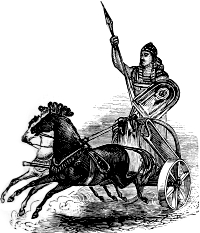
WHEN Ahab had let Naboth be stoned that he might get his vineyard, the Prophet Elijah said that Ahab would be greatly punished, and that where the dogs licked up Naboth's blood there they would lick up Ahab's; and that cruel Jezebel should be eaten up by dogs, so that no one could say, This is Jezebel.
Some time after, Ahab went out to fight a battle. He was afraid, because his conscience troubled him, and he thought he should be safer if he did not go out to fight dressed like a king, for he knew the enemies would all come and try to kill him if they saw him in his robes. But he dressed only like a common captain, and thought they would take no notice, and he would be safe. He forgot that if the enemy did not know him God knew him, and that God could see it was Ahab just as well in his common dress as in his robes and crown.
So a man drew his bow, not shooting at anybody in particular; but God's will guided the arrow, and it wounded Ahab so[Pg 186] badly that he desired to be taken out of the battle, and he died before he could be carried home. His chariot was full of his blood, and his servants washed it in the place where Naboth had been stoned to death; and the wild hungry dogs came and licked up the blood, just as they had licked up Naboth's blood. So you see no hiding could get away from God.

THE DEATH OF KING AHAB.—1 Kings 22:34.
QUESTIONS.
1. What did God say was to happen to Ahab? 2. What was to happen to Jezebel? 3. What did Ahab go out to do? 4. How did he dress himself? 5. Why did not Ahab dress like a king? 6. From whom did he want to hide? 7. But who knew him all the time? 8. How was he wounded? 9. Did the man mean to hit Ahab? 10. How came Ahab to be hit? 11. What was done with him? 12. Where was his chariot washed? 13. What licked up his blood? 14. Who had said the dogs should lick his blood? 15. Why? 16. Why did Ahab let Naboth be killed? 17. Who was angry with Ahab? 18. Can we hide from God's anger?
SECOND READING.
"My father, my father, the chariot of Israel, and the horsemen thereof."—2 Kings 2:12.

THE time had come when God was about to call away His great Prophet Elijah. And it was not as other men are taken from this earth, by dying and being buried, while their souls go away to the God who gave them. No; Elijah went out and visited all the schools, where young men and boys were being trained to sing God's praise; and Elisha, who was his scholar and his friend, went with him.
When they came to the bank of the river Jordan, Elijah took his mantle and rolled it up, and struck the waters of the stream with it, and they parted, and left a way for Elijah and Elisha to go over dry-footed. Then Elijah said, "Ask what I shall do for thee, before I be taken away from thee." And Elisha said, "I pray thee, let a double portion of thy Spirit be upon me."
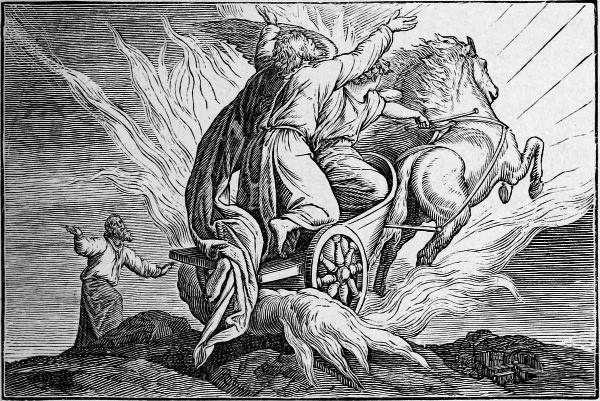
ELIJAH TAKEN UP INTO HEAVEN.—2 Kings 2:11.
And while they were talking together, there came a great wonder from heaven: a chariot and horses, all bright and glowing like fire; and Elijah was parted from his friend, and went up into heaven upon a whirlwind. Elisha stood watching, crying out, "My father, my father, the chariot of Israel, and the horsemen thereof;" as if he knew not what he said. And Elijah, as he went up, threw down his mantle; and Elisha took it up and went his way, much wondering, and full of awe.
And when he came to the river Jordan, he took the mantle, rolled up, and smote the waters, and they parted again, so that he went through with dry feet. And when the young men in the school of the prophets met him, they saw in his face and manner that the same Spirit which had been on Elijah was on him, and they bowed themselves before him.
Only one other man was ever taken up to heaven without dying, and he was Enoch, who lived before the Flood. Our blessed Lord ascended into Heaven; but He went up, He was not taken, and it was after He had died and risen again.
QUESTIONS.
1. Who was Elijah? 2. Who was his friend? 3. Where did they go together? 4. How did they get across the river? 5. What did Elisha ask? 6. What appeared to them? 7. What happened to Elijah? 8. What did he let fall? 9. Who was to be prophet in his stead? 10. What did Elisha cry out? 11. What did he do with Elijah's mantle? 12. What other man was taken up like this? 13. When did Enoch live? 14. Who only ascended into heaven?
THIRD READING.
"It is well."—2 Kings 4:26.

ELISHA was the prophet for Israel instead of Elijah. Now there was a good woman who saw him go by, and she said she would make a little room for him by the wall of her house, and put in a bed, and a table, and a stool, and a lamp, so that he could go and rest there[Pg 189] whenever he pleased. When Elisha saw it he was pleased, and told her that if she wished for anything very much he would pray God to give it to her. She answered that she dwelt among her own people, and wanted for nothing. But she had no child; and Elisha prayed for her, and God blessed her for her kindness to His servant, and by-and-by she had a son.
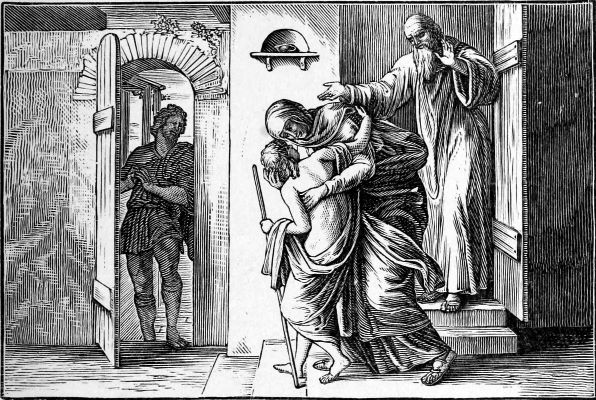
THE SHUNAMITE'S SON RESTORED.—2 Kings 4:36, 37.
But when he had grown into a boy, he went into the fields with his father to see the harvest, and the heat of the sun struck on his head so that he cried out, "My head, my head!" And his father said, "Carry him to his mother." But she could do him no good; he sat on her knees till noon, and then died.
She did not stop to weep; she had her ass saddled, and rode away to seek for the man of God. And by-and-by she met him on the way, and she knelt down before him and held him by his feet. Then he knew how it was, and he bade his servant Gehazi take his staff, and hasten on, and never rest till he had laid it on the child's face. Gehazi did so, but there was no voice nor[Pg 190] any answer. So he went back and met his master, and said, "The child is not awaked."
Then Elisha came in, and found the child lying dead on his own bed. Then he stretched himself on the boy, and prayed to God that the soul might come back to the little one. And at last God granted the prayer, and the child's flesh grew warm; and Elisha prayed again, and the child sneezed seven times as his breath came back, and he opened his eyes! Then the mother was called, and the child was given back to her; and she bowed herself to the ground, and gave thanks to God and His prophet.
QUESTIONS.
1. Who was prophet instead of Elijah? 2. What had become of Elijah? 3. Who made a room for Elisha? 4. What did she put in it? 5. What joy did God give to her? 6. What great grief? 7. What caused the boy's death? 8. What did his mother do? 9. What order did Elisha give? 10. Could Gehazi do anything? 11. What did Elisha do? 12. How did God show His mercy? 13. How did the mother thank God?
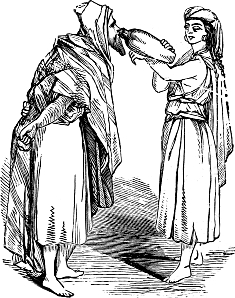
ELISHA'S MIRACLES.
FIRST READING.
"Wash and be clean."—2 Kings 5:13.

THERE was a poor little girl who was stolen away from her own home in Israel by Syrian soldiers, and carried far from her mother and friends, to be a slave. It must have been very sad and lonely; but God lets nothing happen but for good, and so this poor little captive maid did great good. Her master was named Naaman. He was the captain of the army—brave and strong; but he fell ill of a disease that no doctor could cure, and which would go on getting worse till he would die of it.
The little maid was sorry for him; and though she was all alone in a heathen land, she had not forgotten about God and His prophets, and she told her mistress that at home, in Israel, there was a prophet who could cure her master by God's power.
So Naaman set out in his chariot, and came to the prophet's door. He thought the prophet would come out, and strike his hand over the place, and cure him directly—all the more because he was such a great man. But, instead of that, the prophet sent out word to him that he was to wash seven times in the River Jordan, and he would be well.
This made Naaman very angry. He thought the bathing in Jordan would do no good, and that the prophet made light of him; and he turned and went away in a rage. Then his servants persuaded him. They said, "My father, if the prophet had bid thee do some great thing, wouldest thou not have done it? how much rather then, when he saith to thee, Wash, and be clean?"
Naaman was wise enough to listen to them. He did go and wash in the River Jordan, as the prophet bade him; and God gave the water the power to make him quite well again. Then he came back and thanked the prophet, and said he would never pray to any god again but to the One true God, who had healed him.
So you see the little maid did great good to her master, both to his body and his soul, because she was good, and remembered her God, even when she was far away from home.
QUESTIONS.
1. Who is the great captain we hear of to-day? 2. What was the matter with him? 3. Whom did Naaman go to to cure him? 4. From whom did he hear about the prophet? 5. How came the little maid into Naaman's house? 6. Who made the prophet able to cure people? 7. Had Naaman been brought up to worship God? 8. What did he expect the prophet to do to him? 9. What did the prophet tell him to do? 10. Why did he not like this? 11. Who persuaded him to try? 12. What did they say he would have been ready to do? 13. Don't we sometimes wish to do something grand, rather than just what we are told? 14. But what have we got to do? 15. What came of Naaman doing as he was told? 16. To whom did Naaman say he should always pray?

SECOND READING.
"They that be with us are more than they that be with them."—2 Kings 6:16.

THE great enemies of the kings of Israel were the Syrians, who lived at Damascus; but whenever the Syrians made a plan to come and fight with the Israelites, God made it known to the Prophet Elisha; and he told King Joram, so that the Israelite soldiers were always ready before hand to fight with the Syrians. The king of Syria began to think one of his own men must tell Joram; but they said it was the Prophet Elisha who told the king of Israel what was said in the most secret chamber of the king of Syria. Then the Syrians sent an army of men to take Elisha at Dothan, and kill him.
They came by night, and when Elisha's servant looked out in the morning, he saw horses and chariots all round the place. He was afraid, and cried out "Alas, my master! how shall we do?" But Elisha said to him, "Fear not: for they that be with us are more than they that be with them." And he prayed that the young man's eyes might be opened that he might see: and so they were—to see the whole mountain round about full of chariots of fire and horses of fire; many, many more than the Syrians had, and all come to take care of Elisha.
And God made the Syrians unable to see that Elisha was before them, and he led them all the way to Samaria, and put them before King Joram as his prisoners. Joram wanted to put them to death, but Elisha would not let him, and they were all sent safe home, and did not come back as enemies for a long time. And we know that, though we cannot see them, God's angels are still in great armies encamped all round about those who fear Him, to deliver them.
QUESTIONS.
1. Who were the enemies of the kings of Israel? 2. Who always told the plans of the Syrians? 3. How did Elisha know? 4. What did the king of Syria want to do? 5. When did his army come? 6. Who was frightened? 7. What did Elisha say? 8. Who were those who were with them? 9. Who are always round about those who fear God? 10. Why, then, need we never be afraid? 11. What happened to these Syrians? 12. But were they killed? 13. Why not?
THIRD READING.
"This day is a day of good tidings.—2 Kings 7:9.

IF King Joram had been good he would have had no troubles; but he would let his mother Jezebel worship her false gods, so God sent the Syrians against him again. And they came all round Samaria, and shut it in so close that nobody could get out; and all the food was eaten up, so that even such food as a donkey's head was so dear that hardly anybody could buy it, and everyone was getting starved. Joram was so angry, that he said at last, in his wickedness, he would cut off Elisha's head the next day.
But Elisha said quietly that to-morrow there would be quantities of food in the city, so that it would cost almost nothing. One of the king's lords laughed, and said, "If the Lord should make windows in heaven, might such a thing be?" "Thou shalt see it with thine eyes," said Elisha, "but shalt not eat thereof."
Now, that night the Lord made the Syrians hear a great noise, as if an army was coming up to help the Israelites. And they were so frightened, that they all fled away in the night, and left all their tents standing, and their armor in them, and their stores of food.
In the early morning, three poor leprous men, who could not get any food in Samaria, crept down to see if the Syrians would give them anything, or they thought if the Syrians should kill them, that would be better than being starved. But when they[Pg 195] came to the camp there was nobody there—no soldiers, no horses, only tents full of rich dresses, and fine armour, and, best of all, plenty of food. The hungry lepers went and ate, and then they thought they ought to go and tell the people in the town that all the Syrians were gone.
So the king sent out to see, two men upon lean, starved horses. They found it was all true, and everybody went rushing out to get food. The king sent the lord who had laughed at Elisha, to stand in the gate to keep order; but the people were so very hungry that they did not mind him, and he was knocked down and trodden upon, and trampled to death: and so it came to pass that he saw the plenty, but did not eat of it, because he had mocked at the word of the Lord.
QUESTIONS.
1. Who was king of Israel? 2. Who was prophet? 3. What was the chief town in Israel? 4. Who tried to take it? 5. What was the sad distress in Samaria? 6. What had they to eat? 7. Whose fault was it? 8. But whom did Joram want to punish? 9. What did Elisha promise? 10. Who laughed at him? 11. What did Elisha say? 12. What happened in the night? 13. What became of the Syrians? 14. Who found it out? 15. What did the lepers see? 16. Whom did they tell? 17. What did all the people do? 18. What became of the man who laughed at Elisha? 19. What is it that makes God angry?
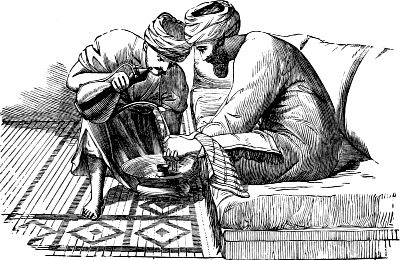
THE RUIN OF AHAB'S HOUSE.
FIRST READING.
"What hast thou to do with peace."—2 Kings 9:18.
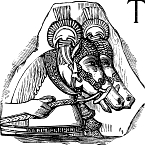
THE Sunday before last you heard how King Ahab was killed in battle, though he had fancied that he could hide from God. His wife, Queen Jezebel, was left; and she had always been worse than he was, and she had brought up her son Joram to be very wicked too. When Joram had reigned as king for twelve years, God told His Prophet Elijah to send a young man to anoint a captain called Jehu to be king instead of Joram. So the young man took some oil, and went to the town where Jehu was, and said, "I have an errand to thee, O captain." Then he poured the oil on Jehu's head, and told him that God made him king of Israel.
The other captains were glad to make Jehu king, and they made him sit on the top of a flight of steps, and blew with their trumpets, and shouted, "Jehu is king." Then they all set out to conquer King Joram.
Joram had his chariot made ready, and went out in it to meet Jehu; but, as soon as they came in sight of one another[Pg 197] Jehu shot an arrow, and it struck Joram, so that he sank down in his chariot and died.
Then Jehu went on into the town; and Jezebel thought she would still try to make friends with the people; so, instead of mourning for her son, she painted her face, and put on a headdress, and looked out at a window. Jehu said, "Who is on my side? who?" And some of the servants looked out. He said, "Throw her down." So the servants threw Jezebel out of the window, and her blood sprinkled on Jehu's horses. But he went on, and went into the palace, and was made king, and had a feast.
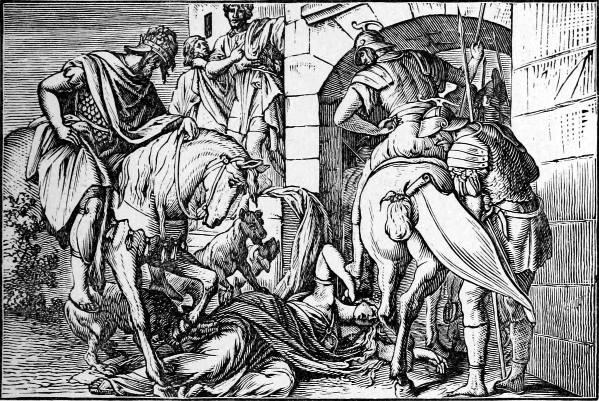
JEZEBEL EATEN BY DOGS.—2 Kings 9:32, 33.
Then he sent out, and said that he would have Jezebel buried, for she was a king's daughter. However, when his men went out to look for her, they found that the wild dogs that ran about the streets had eaten up every bit of her, so that there was nothing left of her but her skull and her feet, and the palms of her hands.
You remember that God's prophet Elijah, had told Ahab that the dogs should eat Jezebel, because she was so cruel. She[Pg 198] worshipped idols, and killed God's prophets, and had poor Naboth put to death that Ahab might have his vineyard. So God punished her. People need not hope that God will not punish what they have done wrong, for He will be quite sure to punish unless they are very sorry, and pray to Him, to pardon them for Jesus Christ's sake.
QUESTIONS.
1. Who was Ahab? 2. Who was Jezebel? 3. What wicked things had they done? 4. What had the prophet told them? 5. What had become of Ahab? 6. Who was king after Ahab? 7. How long was Joram king? 8. Whom did God choose to punish Jezebel and Joram? 9. Who was sent to tell Jehu? 10. What is anointing? 11. Who did you hear of before who was anointed? 12. What did the other captains do to Jehu? 13. Who came out to meet him? 14. What did Jehu do to Joram? 15. What did Jezebel do? 16. What became of Jezebel? 17. What was left of Jezebel? 18. Why did she come to such a shocking end? 19. What does God do to sinners? 20. Does He always punish them at once? 21. Does he forget? 22. What must be done if we would not be punished?
SECOND READING.
"Jehu destroyed Baal out of Israel."—2 Kings 10:28.

WHEN that fierce soldier, Jehu, was made king, the men of Israel cut off the heads of all Ahab's sons and grandsons, and made them up into two heaps at the city gates; and all the people who worshipped Baal were shut up in his temple, and every one of them killed. It is very sad and terrible; but God had commanded that people who prayed to idols should not live, because they taught the rest of the Israelites to be wicked too. When we hear about it, we must recollect that it is a fearful thing to turn away from serving God, and that He is sure to punish those who will not worship Him.
You are not likely to pray to an idol; but I hope you do say your prayers night and morning, and mind them as you say them.[Pg 199] Not saying our prayers, and not going to church, is turning away from God; and it would be very sad and ungrateful to do that, for God has done much more for us than He did for the Israelites, and we know more about Him than they did.
QUESTIONS.
1. Who came to punish them? 2. What was done with the heads of the princes? 3. What was done to the worshippers of Baal? 4. Why were they put to death? 5. What Commandment did these worshippers of Baal break? 6. What is the First Commandment? 7. Whom must we worship? 8. When do we worship Him? 9. Must we go without saying our prayers?
THIRD READING.
"The arrow of the Lord's deliverance."—2 Kings 13:17.

ELISHA grew to be a very old man, and when at last he fell sick and was near his death, the king of Israel, whose name was Joash, came and kept by his bed-side.
Elisha said, "Open the window eastward;" and he opened it. Then Elisha said, "Shoot;" and Joash took his bow and shot an arrow. And Elisha said, "The arrow of the Lord's deliverance." Then he said, "Take the arrows; smite upon the ground."
Joash struck three times on the ground, but he did not go on striking, for he did not think enough of God and His prophet to understand that if he obeyed Elisha God would bless him. So Elisha told him if he had struck many times, he would have had a great many victories over the Syrians, but as he had only struck three times, he would only have three victories. For it is when people begin by obeying in little things that God gives them a great deal.
Then the great Prophet Elisha died, and was buried; and Joash beat the Syrians three times, but no more, because he had not believed and obeyed.
QUESTIONS.
1. Who was dying? 2. Who came to see Elisha? 3. What did Elisha tell Joash to do? 4. What did he call the arrow? 5. What did he bid Joash do then? 6. How many times did Joash strike the ground? 7. What ought he to have done? 8. Why did he not? 9. What did Elisha promise him? 10. Why did not he have more victories? 11. If we want to do great things, how must we do little things?
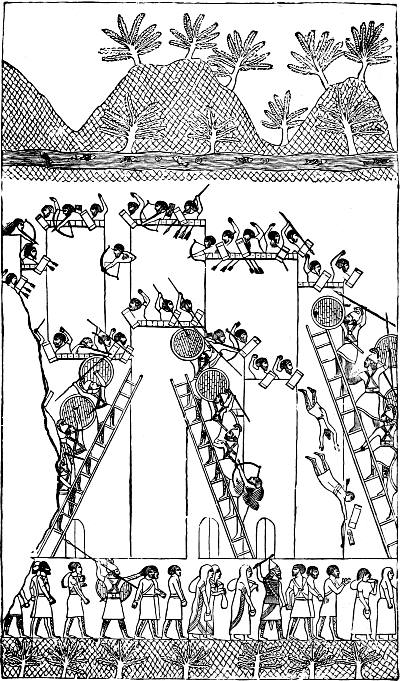
A CITY CAPTURED AND THE INHABITANTS LED AWAY CAPTIVE.
HEZEKIAH AND JOSIAH.
FIRST READING.
"He did that which was right in the sight of the Lord."—2 Kings 18:3.

YOU have heard of many bad kings. There is a good king to tell you of at last—good King Hezekiah. He cared for nothing so much as to please God. He would not have any idols, but he cleared them all away, and had the holy Temple all set to rights, and made beautiful as God had commanded; and he had all the services at the Temple at the right times, and used to go and pray there himself constantly. And he did all he could to make his people good too.
But there came a great danger. There was a king of Assyria named Sennacherib, who had quantities of soldiers and horses and chariots, and he used to conquer towns, and carry all the people in them away to live far from home. He thought he would seize Hezekiah and his people in this way, and he did come and do much harm all over the country.
He did not come at once to Jerusalem; but he sent three boasting men, with an army, to stand outside the walls, and call out to the people inside, that Sennacherib was coming to conquer them and carry them away, and that they need not believe their king Hezekiah when he said that God would help them, for no god had ever yet saved a country from Sennacherib.
Hezekiah's people were terribly afraid. Some wanted him to get help from the king of Egypt; but Hezekiah knew that God[Pg 202] had forbidden him to have anything to do with the Egyptians. He knew that God could help him, and that the way to be helped was to do just what God told him. So, though Sennacherib had so many men, and he had so few, and the Egyptians had plenty of soldiers and horses, he made sure that God could save him much better than any Egyptian of them all.
Next Sunday morning you will hear what happened.
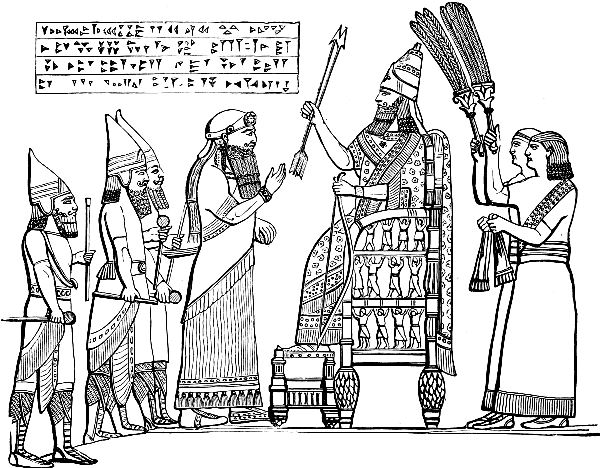
RABSACES BEFORE SENNACHERIB.
QUESTIONS.
1. Who is the good king we hear of to-day? 2. What did he clear away? 3. What Commandment did he keep? 4. Where did he go and pray? 5. Who was his enemy? 6. What message did Sennacherib send to the people of Jerusalem? 7. Where did the people want Hezekiah to send for help? 8. Why would not Hezekiah send for help from Egypt? 9. To whom did he trust?
SECOND READING.
"Thou art the God, even Thou alone, of all the kingdoms of the earth: Thou hast made heaven and earth."—Isaiah 37:16.

HEZEKIAH was king of Jerusalem. He was very good, and always served God and prayed to Him. But a great fierce king named Sennacherib brought an army into his land, and ruined all his towns and villages except Jerusalem, and shut up Hezekiah in his town, so that his people could not dare to come out.
And Sennacherib wrote a letter to tell Hezekiah that it was no use to hope to escape, he was coming to take away the Jews and ruin Jerusalem; and this wicked man even said that Hezekiah need not think that his God would save him, for no nation had ever yet been saved by its gods, so the God of Hezekiah could not help him.
HEZEKIAH'S PRAYER.
In his great distress Hezekiah went up to the Temple, and told God all his trouble. And he said, "Thou art the God, even Thou alone, of all the kingdoms of the earth: Thou hast made heaven and earth." He said he knew the gods of those nations could not save them, for they were no gods, only wood and stone; but he trusted that God would save him and his people, though they were far too weak to defend themselves against this terrible king and his people.
God heard the good king's prayer, and sent him a promise that his enemy should not even come before Jerusalem, nor shoot one arrow at it. And God kept His word. The fierce soldiers of Sennacherib all lay down to sleep one night, but they never woke up again. God sent His angel, with a deadly blast, and all the army that wanted to destroy His people died in one single night.
It was because they and their king had fancied God could[Pg 204] not save His people, that they died. And it was because Hezekiah prayed to the Lord and tried to be good and holy, that no one could hurt him. Now try to do like Hezekiah. If you are vexed, or if you are afraid, tell God all about it, and ask Him to help you. And He will be quite sure to hear and help you, if you will only speak to Him and tell Him what is in your heart.
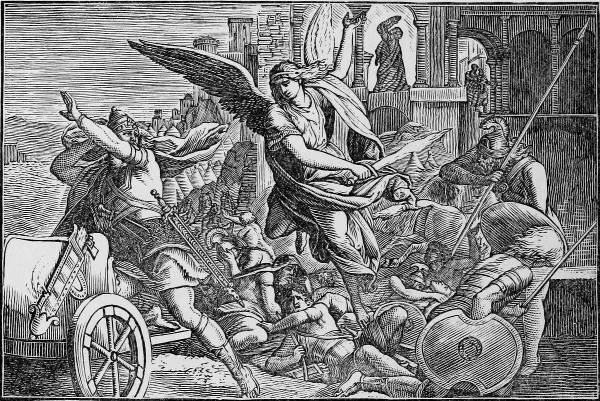
THE ANGEL SLAYING THE ASSYRIANS.—2 Kings 19:35.
QUESTIONS.
1. Who was Hezekiah? 2. What kind of king was he? 3. Who wanted to hurt him? 4. What did Sennacherib mean to do? 5. What had he done to other cities? 6. What very wicked thing did Sennacherib say? 7. Where did Hezekiah go in his distress? 8. To whom did he pray? 9. Why did he say the other cities had not been saved by their gods? 10. What commandment tells us not to have gods of wood and stone? 11. What did Hezekiah ask God to do? 12. What did God promise? 13. And what happened to the soldiers of Sennacherib? 14. Who slew them? 15. Why were these people slain? 16. Why was Hezekiah safe? 17. What did he do that he might be saved? 18. How can you do like Hezekiah? 19. What may you tell God about? 20. What will He be sure to hear? 21. And if you pray to Him, what will He do for you?
THIRD READING.
"Like unto him was there no king before him, that turned to the Lord with all his heart, and with all his soul, and with all his might."—2 Kings 23:25.

THERE is one more good king to tell you about, whose name was Josiah. He was great-grandson to good King Hezekiah. The two kings who had come between Josiah's grandfather and father, had both been very bad men. His grandfather repented when he fell into trouble, and God forgave him; but his father never repented, and died in his wickedness when Josiah was only eight years old. But Josiah was very different. He made his people break down their idols, and clear out the Temple of the unholy things they had brought in, and worship God rightly once more.
THE BOOK OF THE LAW OF MOSES.
While they were cleaning out the Temple, they found a book that nobody knew—the Book of the Law of Moses—that is, the first five books in the Bible. All the time of these two bad kings nobody had minded it, or read it; it had been lost, and everyone had forgotten all about it.
When Josiah knew what it was, and that it was the Law that God had spoken to Moses, he made the priests read it to him and all his people. They were very much frightened when they heard it; for they found they were doing all the very things that God had said He would punish them for, and turn them out of their good land.
So Josiah sent to a holy prophetess to ask her whether, if they left off their sins, and were very sorry, and prayed with all their might, God would still forgive them. But God told her to answer that the people had done so wrong, and grown so wicked, that now their punishment must come; but that, as[Pg 206] Josiah's heart was tender, and he loved God, it should not happen in his time, and that he should be quietly buried with his fathers. And, after years of goodness, Josiah was killed in a battle, and all his people mourned over him.
But they had not been really good, they only pretended, just to please him, and went back to their wicked ways, in spite of all the pains he had taken with them; and his own sons were as bad as the rest. So the punishment was obliged to come.
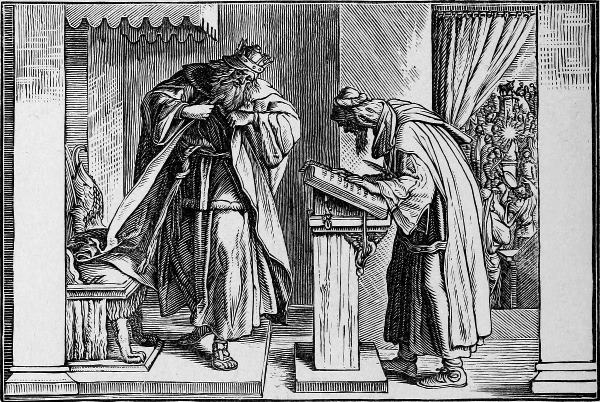
THE BOOK OF THE LAW FOUND.—2 Kings 22:10, 11.
What I wish you to mind to-day is how these people lost their Book of the Law for want of attending to it. If you have not got a Bible of your own, I dare say you soon will have one. And then, pray, do not do like these people of Israel. Do not let it lie by till you forget to look at it, and forget what is in it, and then forget even where it is. If you do, you will grow as bad as these people were, and God will be forced to punish you as He was forced to punish them.
QUESTIONS.
1. Who was Josiah? 2. How many kings were there between him and Hezekiah? 3. What sort of kings were they? 4. What kind of person was Josiah? 5. How old was he when he began to reign? 6. What did he have cleaned out? 7. What did they find there? 8. Who gave the Law? 9. What was to happen if it was not kept? 10. How had it been lost? 11. What did Josiah cause the priests to do? 12. Why was he frightened? 13. What did he ask? 15. But why did the people deserve to be punished? 16. What did they do as soon as Josiah was dead? 17. What came of forgetting their Bibles? 18. Ought we to forget our Bibles? 19. If we never read them, can we be good? 20. And if we are not good, what must be done to us?
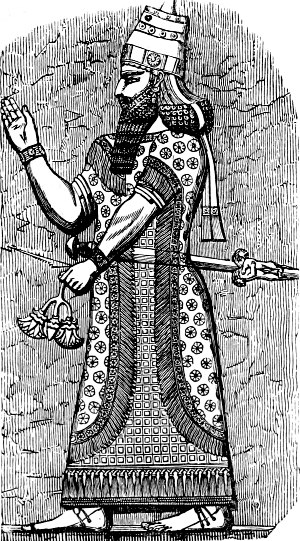
AN ASSYRIAN KING.
JEHOIAKIM'S CRUELTY.
FIRST READING.
"I speak unto thee in thy prosperity; but thou saidst, I will not hear."—Jer. 22:21.

JOSIAH was the last good king. In his time God called Jeremiah, when he was only a young boy about twelve years old, to be His prophet; and all the time Josiah reigned Jeremiah was teaching the people God's will, while Josiah was doing all he could to help them to do right and serve the Lord.
But the Jews did not heed either the king or the prophet—they only longed after their idols. Even Josiah's own sons would not be good, after they had been brought up by such a holy father; but no sooner was he killed in battle, than they went back to all the bad ways that he had put an end to.
The eldest son, Jehoahaz, only reigned three months. Then God let the king of Egypt take him away; and the Prophet Jeremiah says that it was far sadder for him to go away a captive, and never see his home again, than for good Josiah to be in his grave, loved and wept for by all. For though God had let Josiah die so early, it was in mercy. The people had grown so wicked that they must be punished, and so he was taken away from the evil to come. His next son was king after his brother Jehoahaz.
The next brother was king instead. His name was Jehoiakim. One would have hoped he would have taken warning by his[Pg 209] brother's troubles, and served God better. But no! He did not care to attend to poor people. He thought he should be safe in a fine house. He sent for large stones, and had great beams of cedar tree for the roofs, and painted the walls of his great rooms with scarlet. But he paid no wages to his workmen, and was cruel to everybody, and had innocent people killed if they made him angry with them.
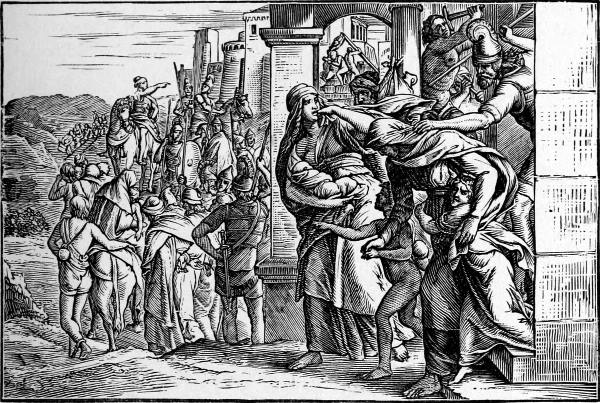
JERUSALEM BESIEGED AND PEOPLE TAKEN CAPTIVE.—2 Kings 25:11.
Only there was one man who was not afraid of this King Jehoiakim. It was God's prophet Jeremiah. He told the king how little good his fine house would do; and what was more, he said that when he died nobody would be sorry for him. They had wept for his father with a great weeping and many tears; but when the cruel Jehoiakim died nobody would lament. Nobody would say, "Ah, lord!" or, "Ah, his glory!" but they would care for him no more than if he was an ass who was being buried.
QUESTIONS.
1. Who was the good king you heard of last Sunday evening? 2. What kind of sons had he? 3. What became of the first? 4. What was he never to do? 5. What was the name of the second? 6. What did Jehoiakim want to build? 7. What were the walls of? 8. How was it roofed? 9. How was it painted? 10. But what did he not pay? 11. How did he treat the people? 12. Who could have made him quite safe? 13. But how must he have lived if he wanted God to take care of him? 14. If God did not take care of him, would his fine house do him any good? 15. Who told him it would do him no good? 16. What had everyone done when Josiah died? 17. Why did they weep for Josiah? 18. But would they care when Jehoiakim died? 19. Why would nobody care for Jehoiakim?
Note—The two other Lectionary Lessons for this day are from Nehemiah. If it be desired to read the "story" on them, it is to be found on the 39th Sunday, but it was omitted here to prevent chronological confusion.

ASHTORETH.
JEREMIAH'S PROPHECIES.
FIRST READING.
"He reserveth to us the appointed weeks of the harvest."—Jer. 5:24.

THE chapter to-day is one where God is putting us in mind, by His Prophet Jeremiah, whom he sent to speak to the wicked kings, that we ought to remember Him and be thankful to Him. Two of His great mercies are spoken of here.
If you go and stand on the sea-shore, you see the great wide sea of waters heaving and moving all over. Then a long wave comes rising up; it runs on and on, and rises high, falls over in white foam, and breaks on the sand with a rush. Then another rolling wave comes after it, and another, and another, each a little higher than the last. They hide the ground; and if you stood still at the edge of the first, they would soon carry you off. Stone is hidden after stone, rock after rock, and you would think all the land would get covered at last. No, there is no fear of that.
In six hours' time, the waves leave off coming farther and farther; but each leaves a little bit more ground uncovered, till they have gone quite back to where they were before, and the beach lies fresh and shining in the wet. People call this the tide, and know it always does so; it comes up and goes back at its set times, because God fixed a line for that fierce sea, and said to it, "Hitherto shalt thou go, and no farther; and here shall thy proud[Pg 212] waves be stayed." And if the waves dash and roar ever so loud, still they never can get beyond the bound God fixed for them.
There is the wonder of the sea! Now look at the wonder of the land. All over the country, the corn stands up tall and brown; or else it has been cut, and is piled up in shocks; or the wagons are carrying it safe home! Perhaps you have been gleaning in the fields, and have brought home your lap full of corn.
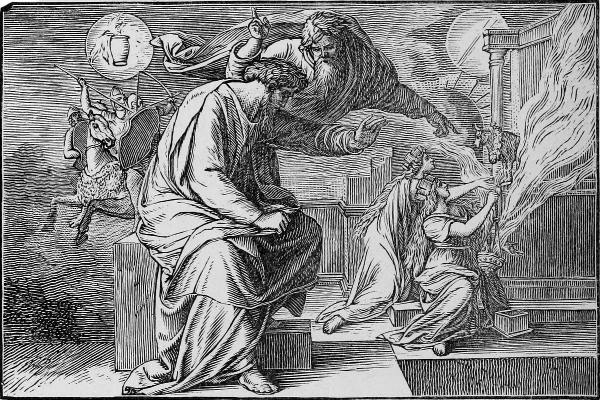
THE LORD COMMANDS JEREMIAH.—Jer. 2:16, 17.
How did we get the corn that is to make us bread? It was because, when the farmer sowed his grain, God sent rain to make it grow, and caused the sun to shine, so as to draw up the stalk, and swell the grain in the ear; and now He hath "reserved to us the appointed weeks of the harvest." He has given us the glad harvest-time to store up our wheat, to make bread for all the year. Let us thank Him, and never forget who gives us bread, nor to say our prayer for daily bread.
QUESTIONS.
1. What do the waves of the sea do every day? 2. What do people call the coming up of the sea? 3. Need we fear its coming too far? 4. Why cannot the waves come too far? 5. What did God say to the sea? 6. Who made the sea? 7. Can you tell me a verse you say or sing at church about the sea being His? 8. What is it that God gives us every day to eat? 9. What is bread made of? 10. Where does corn grow? 11. Who makes the corn grow? 12. What does God send to make the corn grow? 13. What do we call the gathering in of our corn? 14. Who takes care we shall have a harvest? 15. How should we ask God for our food? 16. How should we thank Him for our food?
SECOND READING.
"Yet they were not afraid."—Jer. 36:24.

YOU heard what a bad, cruel king Jehoiakim was. Still there was a hope that he and his people would take warning, when he heard that God would punish his sin; so Jeremiah the Prophet had all his prophecies written out on a roll of parchment, and his friend Baruch went to the Temple, and read to the people that if they would not worship God and serve Him faithfully, He would cause them all to be taken away prisoners to a strange land.
Baruch stood reading the parchment; and the people listened to him, and some of them began to grow afraid. But then came some of the king's great people, and when they heard it they thought it would make the king angry. They forgot that God's anger signified much more than the king's anger. They did not want Jeremiah or Baruch to be punished, but they were afraid to let the reading go on. So they told Baruch to go away and hide himself and Jeremiah carefully, and then they took the prophecies to shew them to the king.
The king was sitting by the fire warming himself, for it was in the winter. He listened for a little while; but when he found that the parchment was about his sins and God's anger,[Pg 214] he took out a knife and cut the whole into bits, and burnt it in the fire. Was he so foolish as to think that burning the prophecy would prevent it from coming to pass? If so, he made a great mistake; for God desired Jeremiah to have it all written over again, and more too; for the punishment was to be worse now than it would have been before—much worse than if Jehoiakim had listened, and left off his bad ways, and prayed to God.
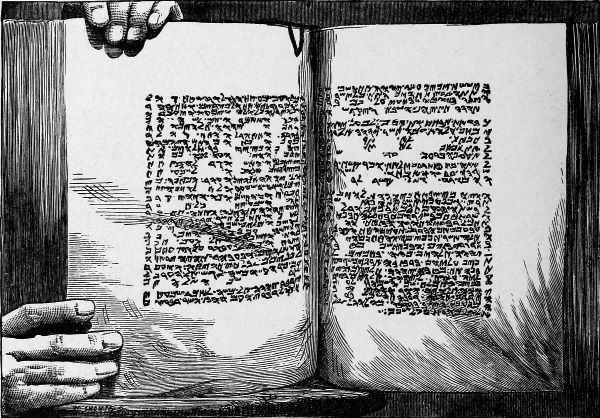
TWO PAGES OF AN ANCIENT SCROLL OF SCRIPTURES.
In a very short time the enemy all came round Jerusalem, and everyone was shut up in the city, and could not get out, and food was very scarce; and Jehoiakim was taken and put in chains; and thus he died, and nobody grieved for him. His young son, Jehoiachin, was called king for a little while, but only for a very little while; for the king of Babylon broke into the city, and made him prisoner, and took him away to be shut up far from[Pg 215] home. And as to the dead body of Jehoiakim himself, nobody had time to give him a burial; so it was thrown out at the gates as if he had been a dead ass instead of a king of Judah.
So you see God's words through Jeremiah all came true, though Jehoiakim would not heed them. He only made it worse by not listening.
QUESTIONS.
1. Who was the king? 2. Who was the prophet? 3. What had Jeremiah said about Jehoiakim? 4. Where did God tell him to have it written? 5. Who was to read it? 6. To whom did Baruch read? 7. Where did the great people take the roll of parchment? 8. What did the king do to it? 9. Whose words did he throw away? 10. Why would not he listen? 11. Did he hinder the harm from coming? 12. What happened to him? 13. How was he buried? 14. How should he have tried to prevent the harm from coming? 15. How should you behave if you have fault found with you?
THIRD READING.
"Thus have we obeyed the voice of Jonadab the son of Rechab our father in all that he hath charged us."—Jer. 35:8.

GOD is pleased with those who obey what their parents tell them. To-day we hear about a family, whose father gave them an order that sounds strange to us. They were never to live in stone or brick houses, but always to have tents; they were not to have corn-fields or vineyards, but only flocks of sheep, and herds of cows and goats; and they were never to taste wine or strong drink, but only water and milk. It was quite a long time after the old father, who gave these orders, had died, that the Prophet Jeremiah was told to try whether they still minded him. He was told to set pots of wine and cups before them, and to ask them to drink. But they all answered steadily, that their father had bidden them never to touch wine, nor have fields, nor build houses; and they were resolved that they would obey him. Then God was pleased with them, and gave a blessing to them by the[Pg 216] mouth of His prophet. He said that there should never be an end to their tribe, because they were so obedient. And so it has been.
These Rechabites, as they are called, lived two thousand four hundred years ago; and their children and descendants have gone on like them ever since—living in tents, keeping sheep, and drinking no wine, and obeying the voice of their father, who lived so long ago. They have lasted so long, because God blessed their obedience.
Now, sometimes a little child goes out alone, and some friend offers it something nice that it knows its mother would not like it to have. Or some person asks a little boy to come into a beer-shop, and drink a drop, when perhaps his father had told him not. Recollect, then, that if you are steady in minding what you are told, as those good Rechabites were, then God will be pleased with you, and own you for His good child, and give you His blessing.
QUESTIONS.
1. What is the Fifth Commandment? 2. Who are the people we hear of to-day who honored their father? 3. Who was their father? 4. What had he told them? 5. Where were they to live? 6. What were they not to drink? 7. Who tried if they would obey? 8. What did Jeremiah offer the Rechabites? 9. What did they answer? 10. What blessing did God give them? 11. How have they gone on ever since? 12. Why was God pleased with them? 13. What can you do to please God? 14. If you are out of sight of your father and mother, what must you still do? 15. If any of you are asked to do what your mother would not like, how must you behave? 16. Who is pleased if you are obedient?

ASSYRIAN ARMLET.
THE TAKING OF JERUSALEM.
FIRST READING.
"Behold, I am against you, saith the Lord God."—Ezekiel 13:8.
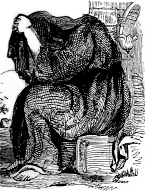
WHEN King Jehoiakim was dead, and his son Jehoiachin carried away to Babylon, another king began to reign, named Zedekiah. He was Jehoiachin's uncle; he was Jehoiakim's brother; and he was son to good Josiah. The king of Babylon said that Zedekiah should reign as long as he would be obedient to him, and pay some money every year, so as to show that he owned the king of Babylon for his master. And God spake through His prophet Jeremiah, and said that if Zedekiah would obey the king of Babylon, the people should be left in peace, only they must be patient under their punishment.
But Zedekiah was more like his bad brother than his good father. He listened to people who pretended to be prophets, though God had never spoken by them. They told him to set up for himself against the king of Babylon, and that all the beautiful things that had been taken out of the Temple should come back again.
And when Jeremiah told them that it would not be so, and that if they rebelled against the Babylonians it would be worse for them, and the king would be put to death, they were so wicked as to let the holy prophet down into a pit, with mud and[Pg 218] mire at the bottom; and there he lay sunk in the mire, and with no food to eat, nor water to drink.
At last a black man, one of the king's slaves, came and told the king that the prophet would soon be dead if he stayed there. Then Zedekiah was shocked, and he told the black to get Jeremiah safe out of the pit. So they threw him down soft rags, and told him to put them under his arms, that the ropes might not hurt him when they drew him up.
So Jeremiah came out of the horrible pit, and had some food; and the king sent to see him in secret. Then he told the king that it was God's will that he should bear to be under the Babylonian power, and that he must not make war; for that if he did, he would come to great misery, and die blind and a prisoner.
Zedekiah was not angry, as his brother had been, but all he had to say for himself was that he was afraid of his people. He was more afraid of them than of God, and he would not do what he knew to be right. So he told the black man to keep Jeremiah safe, and take care he had food every day; but he begged Jeremiah not to say one word to these wicked men about the conversation they had had together.
Was it not a foolish thing to be so afraid of men, when God could have taken care of him? He would have been quite safe if he had only been bold enough to do as God told him! Mind, that if ever idle children should want you to be as naughty as they are, and tease you till you feel afraid to stand out against them, the only way to be safe is to do as God tells you. Zedekiah, who was afraid to do right, was quite as much punished as Jehoiakim, who was bold to do wrong.
QUESTIONS.
1. Who was the king after Jehoiakim? 2. What did the king of Babylon promise? 3. What did God say? 4. By whom did God speak? 5. To whom[Pg 219] did Zedekiah listen instead? 6. What did he do to Jeremiah? 7. What kind of place was the pit? 8. Who had pity on Jeremiah? 9. How was Jeremiah taken out of the pit? 10. What did he tell the king? 11. Why did not Zedekiah mind him? 12. Why was it very foolish of Zedekiah to be afraid of the people?
SECOND READING.
"There was written therein lamentations, and mourning, and woe."—Ezekiel 2:10.

THIS is a sad text; but when people are wicked, sadness must always follow.
You heard how kind God had been to the Israelites, and how much He had done for them; how He gave them their beautiful land, and their city of Jerusalem, and blessed them whenever they were good. And if they sinned, He sent punishment, that they might learn to do better; and when they were sorry He forgave them, and made them happy again. But they would not keep to what He told them; they would worship idols, and grow worse and worse, till at last God said that there could be only "lamentation, and mourning, and woe," for the trouble they had brought on themselves.
God sent a great army under the king of Babylon, and Jerusalem was given up to them. The fierce soldiers came in, and burnt the houses, and robbed the Temple; and as to the young king, Jehoiachin, they took him and his mother, and all his chief lords and priests, and carried them away to Babylon, where he was a long time in prison.
The chapter to-day was written by a holy prophet, whose name was Ezekiel, and who was taken away to Babylon at the same time as the young king. God came and spoke to Ezekiel, that he might go on warning the people, that if they did not repent now that they were punished, He would be obliged to go on punishing them still.
Think about that. You know if you have done wrong and[Pg 220] been punished, it is that you may mind another time, and not do the same over again. If you are obstinate or careless, and go back to the old fault, then you will have to suffer more and more; and there can be nothing but "lamentation and mourning and woe."
QUESTIONS.
1. Who is the prophet whose chapter is read to-day? 2. Where did Ezekiel live? 3. Who took him to Babylon? 4. Who was taken there at the same time? 5. How old was king Jehoiachin? 6. What was his home? 7. Why were he and his people taken away from Jerusalem? 8. What had been their sin? 9. How had God tried to make them better? 10. Had they attended? 11. What must come of sin? 12. What is the use of being punished? 13. What will happen if we do not leave off the fault when we are punished?
THIRD READING.
"And ye shall be comforted."—Ezekiel 14:22.

THE prophet Ezekiel had many sad things to tell the Jews; but he had some comfortable ones. They had been very wicked, and God took them away from their dear home at Jerusalem, and let it be burnt with fire; and put them to live far away in a strange land at Babylon. But He told them that if they would leave off their sins, and turn back to Him, and not worship idols any more, then He would forgive them, and bring them home again.
To-day the Lesson says that they must really be sorry in earnest, not only pretend to be sorry. If they said they would worship God, and were caring for their idols in their hearts all the time, then He must go on being angry, and punishing them; but if they were really sorry, and really prayed to Him, then when they had been punished enough, they should be comforted.
They should not always stay in Babylon, in the dull flat land, with the streams of water flowing lazily through it; but[Pg 221] they should see their own dear hills and fields again, and live in their homes once more. That would be such gladness, that it would make up for all the sorrow. All that was wanted was, that they should be really sorry, and leave off all the bad things they had done, and repent from the bottom of their hearts.
Now when we have done wrong, and are punished, it is to make us sorry, that we may do so no more. Little children are punished by their friends; grown-up people are punished by God sending troubles. Then we must be sorry, not only for the punishment, but the fault, and really try with all our hearts not to do it again. If we only say we are sorry, and then run back to our old ways, something worse will come of it. No, we must be sorry in earnest, and then God will forgive us, for His dear Son Jesus Christ's sake.
QUESTIONS.
1. What was happening to Jerusalem? 2. What was done to the houses? 3. What was done to the people? 4. Where had they to live? 5. Where did they wish to be? 6. Why were they taken to Babylon? 7. What wicked thing had they done? 8. But what hope had they? 9. What must they do to be forgiven? 10. Where should they go back again to? 11. Why are people punished? 12. What is the way to be forgiven? 13. How are children punished? 14. How are grown-up people punished? 15. What should we do if we are punished? 16. Will it do to go back to the fault?

THE FALL OF JERUSALEM.
FIRST READING.
"Repent, and turn yourselves from all your transgressions."—Ezekiel 18:30.
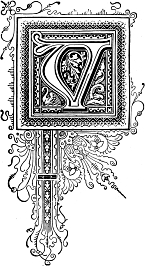
VERY sad things were going on among the Jews. A great many of them were carried away out of their beautiful hilly land of Canaan, to live among the flat wet marshes round Babylon, and only a few were left with their king Zedekiah at Jerusalem.
Jeremiah was speaking God's words to the people of Jerusalem; Ezekiel was speaking God's words to the people who were captives by the river side. They both said the same thing—that the only way to be peaceful, and not to suffer worse and worse, would be to repent and leave off their sins that had displeased God, and pray to Him to spare them, and then to bear patiently the punishment that had begun. But this was just what Zedekiah and his people would not do.
They misused Jeremiah for giving them such advice, and they would not own the king of Babylon for their master; and instead of believing God's true prophets, they listened to the false ones, who said, that in a very little while the captives would come back again, and all would be well.
Then Ezekiel took a tile, a great flat piece of pottery, and he drew on it the walls and towers of the city of Jerusalem, and made little tents and banks round it, and he lay down by it on his side, and watched it. And he weighed out for himself a very little bad bread to eat.
Then, when the people came to ask him why he did this, he said that it was to show them how it would be with their own Jerusalem far away. The Babylonians would come round it, and set up their tents, and make banks of earth to keep the people in, and shoot stones and arrows, and climb the walls. Inside there would be no better food than Ezekiel was eating—no, nor so good—and everyone would be starving, and dying of thirst.
Then the enemy would break in, and carry all the chief of them away to Babylon, and keep them prisoners there—till the whole people had come to repent of their sins, and had turned to the Lord with all their hearts.
For God has no pleasure in man's being punished. He only punishes that we may turn away from our sin and do right, and be saved at last. If only these Jews would have listened to Ezekiel and Jeremiah, and repented, they would have been spared; but instead of that, they went on growing worse and worse, till they had to have seventy long years of punishment before they could be forgiven.
We must take care when we are punished that we are sorry, and not obstinate and hard, or we shall have to be punished more and more.
QUESTIONS.
1. Who were the two prophets? 2. Where did Jeremiah prophesy? 3. Where did Ezekiel prophesy? 4. What did they both tell the people? 5. Would the people mind them? 6. What did King Jehoiakim do to Jeremiah's prophecies? 7. What did King Zedekiah do to Jeremiah? 8. What did Ezekiel take? 9. What did he draw on the tile? 10. What did he put round the tile? 11. Where did he lie? 12. What did he eat? 13. What was the tile to stand for? 14. Who were coming round Jerusalem? 15. What would they set up?
SECOND READING.
"Woe to the bloody city."—Ezekiel 24:6.

SO Jerusalem had been taken, and pulled down, and burnt; and King Zedekiah was dead, and all his sons, and most of the great people had been carried away to Babylon. Only the poorer people were left, that they might plough and sow, and gather the corn and the grapes, and keep the land from getting waste and full of weeds. The Prophet Jeremiah was left among them. There is one book in the Bible called the Book of Lamentation, for it is the sad verses that he made to mourn over the beautiful city and the glorious Temple, all burnt with fire because the people had been so sinful.
Still Jeremiah told the people that were left, that if they would be patient and obey the king of Babylon, that after the seventy years of punishment the troubles should be over, and[Pg 225] their friends should come back, and the Temple be built up again. But still, after all that had happened, these wilful Jews would have their own way. They said they were afraid of the king of Babylon there, and must go to Egypt to be safe; just as if they were not safer where God told them to stay, than they could be anywhere else. So off they went, and they carried Jeremiah by force with them, whether he would or no.

JEREMIAH MOURNING OVER JERUSALEM.—Lam. of Jer. 1:1, 2.
But almost as soon as Jeremiah came there, God told him to take some great stones and put them into the clay of the brick kiln near Pharaoh's house, and say that upon those very stones the king of Babylon himself would set up his tent in a few years' time.
And so it was. The Babylonians raised a great army, and came marching into Egypt, and there they burnt and destroyed, and killed and made slaves of the people they found there. Then these foolish Jews saw that if they had only stayed quietly at home the king of Babylon would have done them no harm. But now they had run away just where he was coming, and would hurt them most. That came of not trusting God's Word, but trying to run away from Him; for truly nothing is so foolish as to try to hide from God.
QUESTIONS.
1. What had been done to Jerusalem? 2. Where were all the chief people gone? 3. Who was left? 4. Where did Jeremiah stay? 5. What sad book did Jeremiah write? 6. Why was he sorry? 7. What did he tell the Jews that were left? 8. Where did they want to go? 9. Why was it wrong to go to Egypt? 10. Why did they choose to go to Egypt? 11. What did God tell Jeremiah? 12. Where was the king of Babylon to set his throne? 13. Where would they have been safest? 14. Why?
THIRD READING.
"I will cause you to pass under the rod."—Ezekiel 20:37.

GOD told His prophet Ezekiel to put the Israelites in mind of all that He had done for them, and how ungrateful they had been—always worshipping idols, and turning away from Him, though He had brought them out of the land of Egypt, and led them through the wilderness, and given them the beautiful land of Canaan. But they would not serve Him there, so punishment had come.
SOME ISRAELITES WERE CAPTIVES.
Some of the Israelites were captives already in the land of the king of Babylon. Ezekiel was one of them; and just four years after he spoke this prophecy, Nebuchadnezzar, the king of Babylon, came up against Jerusalem, and took it once more, and made King Zedekiah prisoner as he was trying to flee away. Zedekiah's sons were put to death before his eyes; and after that his eyes were put out, and he was carried in chains to Babylon, and there slain.
Beautiful Jerusalem was set on fire, the walls were thrown down, and all the gold and silver in the Temple was carried off to Babylon; and the Jews themselves were made to go there too, and live as prisoners there.
This was the way God punished them to make them sorry for their sins; and still He gave them hope that when seventy years were over, they should come back, and build up their city; and after that they would always remember their old fault, and never turn to worship false gods again. So God was merciful even in His anger, and sent their sorrow to make them know Him and serve Him better.
QUESTIONS.
1. Where had God led the Israelites from? 2. What beautiful place had He given them? 3. What were they to do for Him? 4. Did they serve Him? 5. What did they worship? 6. How did He punish them? 7. What young king had they lost already? 8. Who was the king that came up against Jerusalem? 9. What did Nebuchadnezzar do to Jerusalem? 10. Who was the king Nebuchadnezzar took? 11. What was done to king Zedekiah? 12. What was done to the city? 13. What was done to the people? 14. Were they ever to come back again? 15. How soon were they to come back? 16. What did they learn by their troubles?
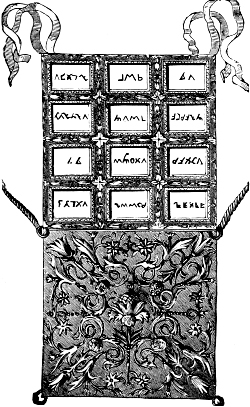
THE BREASTPLATE.
THE JEWS AT BABYLON.
FIRST READING.
"By the rivers of Babylon, there we sat down, yea, we wept, when we remembered Zion."—Psalm 137:1.
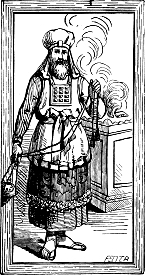
WHEN the Jews came to Babylon, some were made to live in the city, where they worked at trades, and kept shops. Others lived in the country and worked in the fields. These were not like the fields at home. The goodly land at home was full of hills and valleys, with sloping pastures for the flocks, and vineyards on the sides of the hills; but the land round Babylon was quite flat, with broad rivers flowing slowly and lazily through the meadows, with weeping willows upon their banks.
While Jerusalem was being besieged, Ezekiel, at Babylon, drew the picture of the town on a tile, and shut it in with a wall, and lay watching it, and weighing out a little bit of bad bread for himself to eat every day, that the other Jews who were with him might know what was going on among their brethren at Jerusalem, as God told him.
And in a vision he saw the angels come and mark in their foreheads all that were good, that they might not be hurt in the siege; while the bad would die by sword, and hunger, and sickness. So it is still, God saves His own good ones. The angels know and mark them, when all the rest are given up to God's terrible anger.
QUESTIONS.
1. What sort of place was Babylon? 2. Was it like the land of Israel? 3. Who was the prophet there? 4. What did he do while the siege of Jerusalem was going on? 5. Where did he draw it? 6. What did he eat? 7. Who were eating bread like that? 8. Who saw him? 9. What did he see an angel doing? 10. Who were marked? 11. What became of those who were marked? 12. What became of those who had no mark? 13. Who will always be safe? 14. How are you marked?
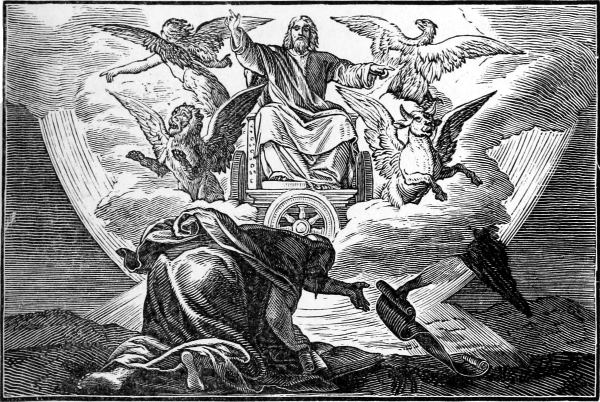
EZEKIEL'S VISION.—Ezekiel 1:28.
SECOND READING.
"Son of man, can these bones live?"—Ezekiel 37:3.

THE great prophet Ezekiel was shewn by God how the Jews should be brought back after all their troubles. The Lord made him have a sort of dream, when he saw a whole valley spread over with dry bones, and the Lord said, "Son of man, can these bones live?" And Ezekiel said, "Lord, Thou knowest."
Then the Lord bade Ezekiel sing; and as he sung there was a shaking, and the bones came together again and joined in their[Pg 230] right places; and as he sung on, the flesh came back on them; and then the Lord bade him call to the winds of heaven, and they came and filled them with breath again, and they rose up and lived.
Just so God said the kingdom of Judah was dead and scattered, but He would breathe on it, and wake it, and join it together again, like the dead bones rising to life.
And just so, we know, when all our bodies are dead, and our bones lie in the grave, the call of the Lord's voice will wake them up, and we shall rise on our feet, and His breath will come to us, and we shall stand before Him an exceeding great army. For that is the resurrection of the body which we look for.
QUESTIONS.
1. Who was the prophet? 2. What had happened to the kingdom of Judah? 3. Who had conquered it? 4. Why had Nebuchadnezzar conquered it? 5. 5. What did God shew Ezekiel? 6. How did the bones look? 7. What did God bid Ezekiel do? 8. What happened? 9. What came back to the bones? 10. What was dry and dead like the bones? 11. But what did God promise to do? 12. When did the Jewish people come to life? 13. What will become of us by-and-by? 14. What will be done with our bodies? 15. When will they wake? 16. What will wake them? 17. What will be joined together? 18. Will they die any more? 19. For what do we believe in?
THIRD READING.
"God gave them knowledge and skill."—Daniel 1:17.

AMONG the Jews who were carried away to Babylon there were some little boys, young princes of the king's family, who had been brought up in the palace of the house of David. They could not have been more than twelve years old when they were thus taken from their homes.
The king of Babylon, Nebuchadnezzar, thought he should like to have them to wait on him. So he desired the steward[Pg 231] of his place to have them taken into his care, to be taught both to wait on the king, and to know all the learning of Babylon.
Slaves instead of princes. That was sad enough, but what grieved these boys most of all was that the dinners that were sent to them all came from the king's own table, and they knew that all the meat there came from creatures that had been offered up to idols.
Now there was one boy, whose name was Daniel, who knew that it was very wrong for any Jew to eat meats that had been offered to idols. Some of the boys said they did not care, and some said they were very sorry, but they could not help it. Yes, Daniel said, they could help it if they would leave off eating meat and drinking wine, and only have beans and water.
LOYAL TO DANIEL.
Then three more of the boys said they would stand by Daniel, and have only the beans and water rather than break God's holy Law. Their proper names were Hananiah, Azariah, and Mishael, but the king had changed all the boys' names, and he called them Shadrach, Meshach, and Abed-nego.
So Daniel asked their master, Melzar, to give them none of the rich wine and fine dainties, but only water and pulse—that is, beans.
But Melzar said they would grow thin and weak on such poor food, and then the king would be angry with him.
"Only try us for just ten days," Daniel said.
And God so blessed the food, that at the end of ten days, Daniel, Hananiah, Azariah, and Mishael, were fairer and fatter than all their cousins and friends who had been eating the king's dainties.
And Melzar had found that none were so true and honest and obedient and painstaking, so he trusted them very much;[Pg 232] and they grew wise and learned, and still loved and feared their God, though they were slaves so far away from home.
Now remember how they began. It was by giving up the things they liked when they found it was wrong to have them. When you are tempted to be greedy, would it not be a good thing to recollect Daniel and the other boys eating beans and drinking water?
QUESTIONS.
1. Who were the boys carried to Babylon? 2. What were their proper names? 3. What did the king call them? 4. What was the name of the king of Babylon? 5. How did he desire these boys to be brought up? 6. What had they been at home? 7. What were they to eat? 8. Why did they not like to eat these meats? 9. What did Daniel beg for? 10. Who joined with him? 11. Who was their master? 12. What did Melzar say? 13. How long was it to be tried? 14. How did Daniel and his friends look? 15. Why was this? 16. Why did God bless them? 17. How did they behave? 18. What was the beginning of all their holiness? 19. What ought we to keep in order?
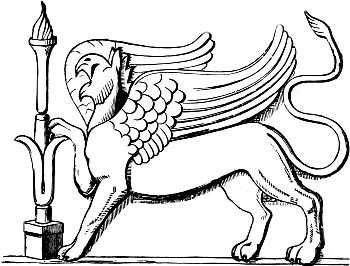
DANIEL AT BABYLON.
FIRST READING.
"Our God whom we serve is able to deliver us from the burning fiery furnace."—Daniel 3:17.

YOU remember that the Jews had been so wicked, that God had let them be conquered by their enemies, and taken quite away from home to the great city of Babylon.
The king of Babylon worshipped idols; and he set up a great golden idol, much higher than this room, and commanded that as soon as his music played, everyone should fall down and worship the image; or if anyone would not, that person should be thrown into a burning fiery furnace.
A furnace is like a very large oven, or like a brick-kiln—a sort of house quite full of fire—for burning and baking bricks, or melting iron, or anything else that requires to be made very hot. Many people were afraid of such a horrible punishment as being thrown into the furnace; and when they heard the music, they made haste to bow down before the great golden image.
But the Jews knew that they must not worship idols; so what could they do? I only know what three of them did. They were three young men, named Shadrach, Meshach, and Abed-nego, who were brought up before the king, because they would not bow down before his great image. The king asked them how it was; and told them fiercely that if they would not worship his golden image, they must be thrown into the fire.
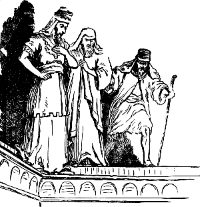
I am with Thee saith the Lord to deliver Thee.
Jer. 1-19
WHEN THOU WALKEST THROUGH THE FIRE, THOU SHALT NOT BE BURNED;
NEITHER
SHALL THE FLAME KINDLE UPON THEE
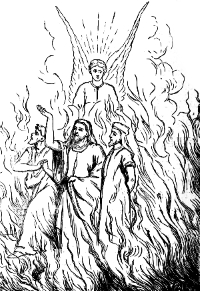
But they stood up boldly, and said, "Our God whom we serve is able to deliver us from the burning fiery furnace, and He will deliver us out of thine hand, O King! But if not, be it known unto thee, O King, that we will not serve thy gods, nor worship the golden image which thou hast set up."
The king was very angry at this brave answer. He had the furnace made seven times hotter than usual; and Shadrach, Meshach, and Abed-nego were thrown into it, tied hand and foot; and the flame was so hot, that it burnt the men that threw them in.
Presently, the king gave a loud cry. For in the midst of the fire were the men, not tied, but free, and walking in the burning heat, as if they were in cool spring air! And there was another with them, whose form was the Son of God. Then he called them, and the three came out. There was no smell of fire about them, and not a hair of their heads was singed; they had not felt the heat at all; but that Holy One had taken care[Pg 235] of them, and had kept them safe in the midst of the fire.
Then the king of Babylon knew how wrong he had been; and he sent forth a command, that no one should ever speak a word against the God of Shadrach, Meshach, and Abed-nego, who had saved them in the burning fiery furnace.
QUESTIONS.
1. Where were the Jews living? 2. How came the Jews to be at Babylon? 3. What did the king of Babylon want everyone to worship? 4. Who would not worship the golden image? 5. Why would not Shadrach, Meshach, and Abed-nego worship the image? 6. What is the Second Commandment? 7. What was done to them for not worshipping the image? 8. What is a furnace? 9. How hot was it made? 10. What did the king see in the fire? 11. Who was with him? 12. Were they hurt? 13. Why did not the fire burn Shadrach, Meshach, and Abed-nego? 14. Who took care of them in the fire?
SECOND READING.
"Those that walk in pride He is able to abase."—Daniel 4:37.

GREAT Nebuchadnezzar, the king of Babylon, had a strange dream. He thought he saw a great tree with spreading branches and fine leaves, making a sweet shelter, where all the creatures came and stood, and the birds nestled in the boughs; but while he was admiring it there came a holy one down from heaven, and said the tree was to be cut down, and only the stump left in the tender grass of the field, and that it should be bound with iron, and wet with the dew of heaven till seven years had passed over it.
When Nebuchadnezzar woke he was troubled, and was sure the dream had a meaning, and he sent for the prophet Daniel to tell him what it was. Daniel was so sorry, that at first he could hardly bear to speak; but at last he told the king that it was himself, Nebuchadnezzar, that the tree meant.
He was great and mighty, and countries and people were shadowed over by his power; but soon he would have a fall—he would lose his senses, and his man's heart would be like a beast's heart, and he would be driven out of his palace, and he would eat grass like an ox, and his body would be wet with the dew of heaven, and his hair would be long like eagles' feathers, and his nails like eagles' claws, till seven years had passed by; and then he would recover his senses, and know and understand again, and he would come back to his kingdom again. Then he would know and own that the Lord of Heaven is the true God.
THOUGHT THAT NOTHING COULD HURT HIM.
Nebuchadnezzar was shocked at first, but soon he forgot all about the dream, and felt himself so wise and strong and brave, that nothing could hurt him. He was walking one day in his palace, a most beautiful one, and looking out on the grand city with the river running through it, with all the bridges and the hundred brazen gates; and his heart was lifted up with pride, and he said, "Is not this great Babylon that I have builded?" That very moment there came a voice from heaven that said the time was come!
And a strange madness came on the king, his brave clever spirit became as senseless as a beast's; and he only wanted to graze in the field like the cattle. So they drove him out of the palace, and put a band of iron round him, and let him eat grass like an ox, and his hair grew long and shaggy, and his nails like eagles' claws, just as Daniel had said.
So seven years passed away; and at the end of them he came to his senses again, God gave back his man's heart and his reason, and he went back to his palace, and sat on his throne again. And one of the first things he did was to have a letter written to his people, telling them all this story, and bidding[Pg 237] them do honor to the God of Daniel, who putteth down and setteth up.
QUESTIONS.
1. Who was Nebuchadnezzar? 2. Who was Daniel? 3. How came Daniel to be at Babylon? 4. What did the king see in his dream? 5. What happened to the tree? 6. What did the king want to know? 7. Whom did he send for? 8. Whom did Daniel say the tree meant? 9. What was to happen to the king? 10. How long was he to be in this state? 11. What beautiful place had Nebuchadnezzar built? 12. What did he say about it? 13. What happened that moment? 14. What did this poor king want to be? 15. What did he eat? 16. What was his hair like? 17. What were his nails like? 18. How long did he go on like that? 19. What did God restore to him? 20. What was the first thing he did? 21. What did he tell the people? 22. Had not he lost all his pride? 23. What should we not boast of?
THIRD READING.
"God hath numbered thy kingdom, and finished it."—Daniel 5:6.

AFTER Nebuchadnezzar, some troublesome times began at Babylon; but at last his grandson Belshazzar was reigning. He was a foolish, self-pleasing young man; and his enemies, the great nation of Medes and Persians, came to make war on him, but still he did not care for anything but his amusement.
He thought Babylon so strong that they could never break in; and he gave a great feast to all his lords, with fine meats and wines, and he had all the gold and silver bowls, and the golden candlestick that had been brought out of the Temple of God at Jerusalem, on the tables, while he and his friends were drinking and singing and shouting.
All on a sudden a stillness came over them, and their eyes opened wide with fright. For just over the candlestick there was seen a man's hand. There was no body, only the hand; and the finger went along writing on the wall, tracing out letters.
There were four words, but no one could read them or tell what they meant.
The king was terribly frightened. His knees knocked together, and he shook all over, and he called for some one to tell him what this writing could be. Nobody could guess; but at last the queen, his mother, came and put him in mind how Daniel had been able to explain his father's dreams. So Daniel was sent for, and he at once read the writing. He told them Belshazzar was found wanting. His kingdom was going to be taken from him, and given to the Medes and Persians.

DANIEL INTERPRETING THE WRITING ON THE WALL.—Dan. 5:25-28.
And even then, all the time the Babylonians were feasting and not watching the enemy, Cyrus, the clever king of the Persians, was making his men dig ditches, into which he turned all the water of the great river that ran through the city; and that very night all his army came in, walking up the dry bed of the stream. No one saw them till they were in the city; and that very night Belshazzar was slain.
QUESTIONS.
1. Who was king of Babylon? 2. Who made war on Belshazzar? 3. What was all he cared for? 4. What feast did he make? 5. What were brought out? 6. What frightened him? 7. What was the hand doing? 8. What could no one understand? 9. Who spoke up? 10. Who was sent for? 11. What did Daniel say it meant? 12. What happened that night? 13. How did the Persians get in? 14. Who was king of the Persians? 15. Why did Belshazzar come to such a sad end?
THE RETURN FROM BABYLON.
FIRST READING.
"The Lord is in His holy Temple: let all the earth keep silence before Him."—Hab. 2:20.
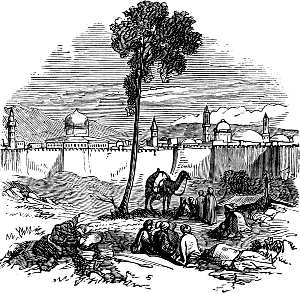
THE Jews had gone back to their old city of Jerusalem, but they found it looking very sad and ruinous. The walls were broken down, and the pleasant houses were heaps of ruins, and grass and brambles had come up in the courts, and there were heaps of stone blackened with the fire and smoke that had burnt down the city.
The first thing they did was to clear the place where God's holy Temple used to stand, and to build it up again. But they were not rich and powerful like King Solomon, who built the first Temple; they had no gold and silver, and the new Temple they built was very small and poor compared with the old one.
There were old men among them who remembered the first Temple as it used to be, and they wept aloud as they saw how different the new one was; but there were young men who were very glad to have a Temple at all, and they shouted for joy; so there was a mixed sound of weeping for sorrow and of crying out with joy.
Then God sent His Prophet Haggai to tell the old men not to be afraid, for the glory of this latter House should be greater than that of the former. The way this should be was that our Blessed Lord Himself would come to the new Temple, as a little Babe at first and afterwards as a grown Man; and when He was there, the honor and glory of the Temple would be greater than ever it was before. Now there is no one Temple: but God's Houses are Churches, and we have them everywhere to pray to Him in, and meet Him there though we cannot see Him. Let us take care to worship Him there very humbly and reverently.
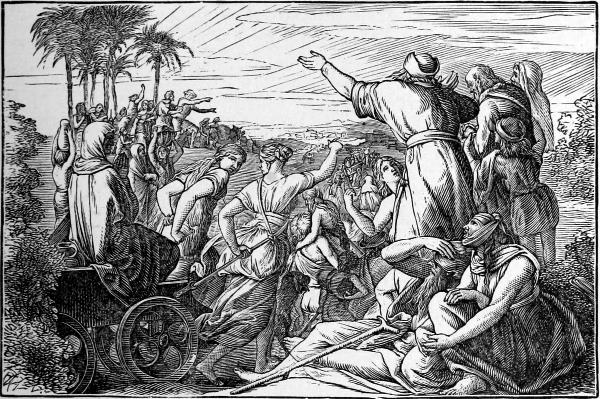
RETURN OF THE JEWS FROM CAPTIVITY.—Ezra 1:5.
QUESTIONS.
1. Where did the Jews return to? 2. What state was their city in? 3. What had they to do to their city? 4. What did they first build up? 5. What sort of Temple did they build? 6. Why was the new Temple not so fine as the old one? 7. What did the old people do? 8. What did the young people do? 9. How did God comfort the old people? 10. Who would come to the new Temple? 11. Is there a Temple now? 12. What have we instead? 13. How should we behave in church?
SECOND READING.
"What doth the Lord require of thee, but to do justice, and to love mercy, and to walk humbly with thy God?"—Micah 6:8.

THE name of the leader of the Jews, when they came home from Babylon to their own country was Zerubabel.
Zerubabel was their prince. He was of David's family, and he would have been king if the Jews had been allowed to have kings; but he was contented to go back without the crown and throne and sceptre that his fathers had had before him, and to live humbly in obedience to the king of Babylon.
ZERUBABEL'S GREAT DESIRE.
That which Zerubabel cared to have was a little spot of ground among the mountains. It was the village of Bethlehem, the place from which David had been called away long ago, from feeding his father's sheep, to come and be king of Israel. Why should Zerubabel care for that little piece of ground more than for Solomon's palace, that was so glorious? One reason was, that the Prophet Micah had said, "But thou, Bethlehem-Ephratah, though thou be little among the thousands of Judah, yet out of thee shall He come forth unto Me that is to be Ruler in Israel; whose goings have been from everlasting."
And faithful men understood that this meant that the Saviour of the world should be born at Bethlehem, and that He would be among Zerubabel's children's children. That was why Zerubabel cared so much for the poor little ruined village, and took care to make a home of it again, though now there were only a hundred and twenty-three people to come back to live in it. God was pleased with Zerubabel's faith, and blessed him because he had not despised the day of small things.
God said that to Zerubabel a mountain should become a[Pg 243] plain—that is, that what seemed most difficult should grow easy, and that Zerubabel should be the man who should build up the Temple again—God's own House, that was lying in ruins. That was the great honor this good man had, because he believed in God's promise with all his heart, and went so bravely and steadily to work upon a little, when he could not do a great deal. For to him that is faithful in a little shall much be given.
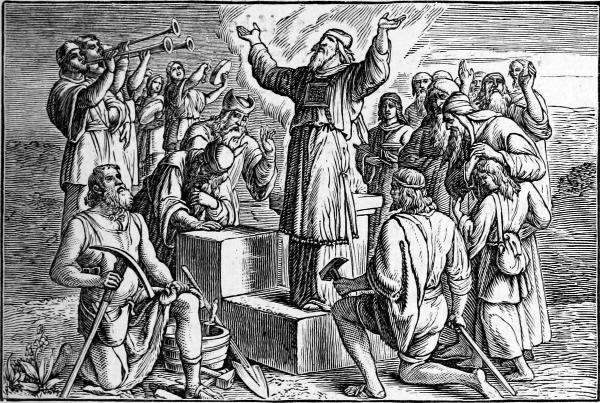
BUILDING OF THE NEW TEMPLE.—Ezra 3:10.
QUESTIONS.
1. Who was Zerubabel? 2. Where were the Jews coming back from? 3. What had Zerubabel's fathers been? 4. Why was not Zerubabel a king? 5. Who was the father of the kings of the Jews? 6. What had David been before he was a king? 7. Where did he keep his sheep? 8. What was the place Zerubabel cared to have again? 9. Why did Zerubabel care for Bethlehem? 10. Who was to be born there? 11. Who had said so? 12. What did Zerubabel believe? 13. How many people went back to Bethlehem? 14. Did Zerubabel despise it for being small? 15. What did he think of? 16. Why did God bless him? 17. What did God say he should build up? 18. What did God say difficulties should be to him? 19. Do not things we have to do sometimes seem[Pg 244] like great mountains to get over? 20. But who can make them easy to us? 21. Only what must we do ourselves? 22. And what is the way to do great things well? 23. What must we never despise?
THIRD READING.
"Thy God whom thou servest continually, He will deliver thee."—Dan. 6:16.

THERE was another king of Babylon, and his name was Darius. It was the strange, foolish way of his people to treat him as if he was a sort of a god, and more than man; and one day his people came to him and begged him to make a law that for thirty whole days nobody should say their prayers to any god, or ask anything of any man, except of Darius the king; or if they did, they should be thrown to the lions, to be eaten up.
Darius thought this was all to do him honor, so he made the law that thus it should be. Now when a law had once been made by the king of that people, it could not be changed. So nobody was to say their prayers to anyone but the king for all that time.
But by-and-by the king's people came and told him that there was one old man who did not attend to his law, but that they had watched him in his own room, and there he said his prayers three times a-day, just as if the king had made no law at all.
The king was very sorry when he heard who it was, for this man who would not leave off saying his prayers was the man he trusted most in all the kingdom. It was Daniel, one of the captive Jews, son or brother to one of the last kings of Jerusalem. He had been taken to Babylon when he was a very little boy, and now he was quite an old man, but he had never ceased praying to the great God of Heaven, and he was not going to leave off now. He was a prophet of the Lord, and very wise, and he was one of the king's very best advisers, so Darius was greatly grieved when he was accused.
But Darius could not help himself; the law that had once been made could not be broken, and these spiteful people declared that Daniel must be thrown to the lions. All day long the king tried to get his wise good counsellor saved from this dreadful fate, but he could not succeed; and at evening Daniel's enemies came to take him and throw him to the lions in their den.

THE JEWISH CAPTIVES CONDUCTED BEFORE DARIUS.
Still, though Darius was a heathen himself, he had one hope; and when he saw his friend led away, he said, "Thy God whom thou servest continually, He will deliver thee."
So they took Daniel, and put him into a pit among the lions, and they fastened up the door and left him there; and the king was so sorry, that he could not sleep all night for grieving for the good, wise, brave man who was thrown to the lions because he would not leave off praying to God, and feared God more than man.
And when daylight came they all went to the den. The[Pg 246] enemies hoped to find that Daniel was eaten up, but the king cried out in a lamentable voice, "O Daniel, servant of the living God, is thy God, whom thou servest continually, able to deliver thee from the lions?"
And Daniel's own voice came cheerfully back, and told the king that his God had sent His angel, who had shut the lions' mouths, so that they could not hurt him, and had kept him safe all night.
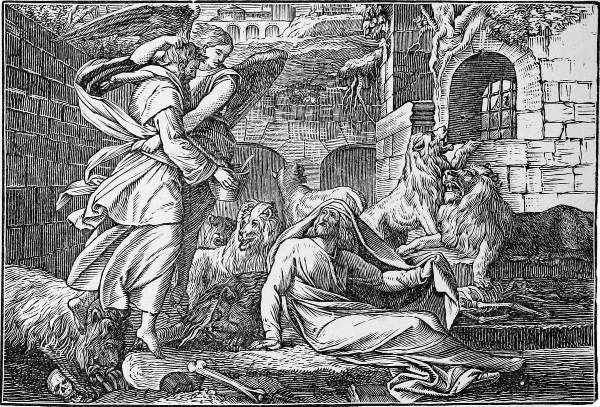
DANIEL IN THE LION'S DEN.—Daniel 6:19, 22.
And the king was very glad, and commanded them to take Daniel out of the pit, and to put the spiteful men in instead; and the lions were so hungry that they brake all their bones in pieces before ever they came to the bottom of the den.
Only think what Daniel was willing to bear rather than not say his prayers! And it was because he prayed that God saved him. God's power shut the lions' mouths, because Daniel had been more afraid to leave off praying than even to be torn to pieces. How glad we should be that we can say our prayers[Pg 247] safe and unhurt; and how careful we should be never to miss them out of idleness, if Daniel would not miss them out of fear.
QUESTIONS.
1. Where were the Jews living? 2. Who was king of Babylon? 3. What law was Darius persuaded to make? 4. Who was to be prayed to? 5. What was to be done to anybody who said prayers to any but Darius? 6. Who did go on saying his prayers? 7. Who was Daniel? 8. What was done to Daniel? 9. Did the lions hurt Daniel? 10. Why was Daniel kept safe in the den? 11. Whom did Daniel fear most, God or men? 12. When should we say our prayers? 13. Can anyone hurt us if God takes care of us?

BABYLONIAN BRICK.
TROUBLES OF THE JEWS.
FIRST READING.
"Surely in vain the net is spread in the sight of any bird."—Prov. 1:17.
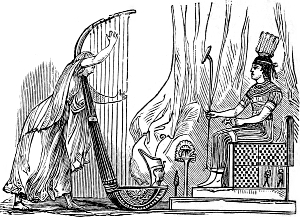
THERE was a gentle Jewish girl, named Esther, who had been left an orphan very young, and was brought up by her kind relation, Mordecai, who was one of the Jews who had not gone back to Jerusalem, but still lived in Persia.
One day there came a messenger from the king, to carry away poor Esther from home. The king wanted all the maidens in his land to be brought together, that he might choose the most beautiful of them all for his queen, and the others would be kept for slaves.
All the other maidens dressed themselves up, and painted themselves to try to look beautiful; but Esther did not ask for any ornaments, she only put on what she was ordered to wear. Yet she looked so much the most lovely of all, in her modest quietness, that the king chose her and married her, and set the crown on her head, and made her his queen.
But she had a sad life, though she was queen. She was always shut up, and could not see her kind friend Mordecai, and she could not even go to her husband without his leave, or she would have been put to death.
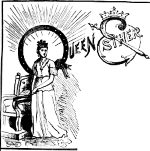
Queen Esther

The Golden Scepter
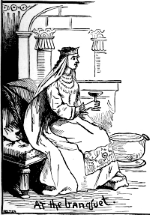
At the banquet
Her kinsman, Mordecai, used to sit in the palace gate every day, to hear news of her. Now, there was a very bad man named Haman, who used to pass by every day; and Mordecai never would bow to him, because he was one of the people whom God had forbidden the Jews to have any concern with.
Haman grew so angry at last that he resolved not only to get Mordecai killed, but all the Jews besides. So he went to the king, and told him a false story about the Jews, and persuaded him to give orders that their enemies in all the lands round Jerusalem, and everywhere else, should fall on them on a set day, and put them to death.
And the king was so foolish and so cruel as to consent to seal the letters, saying that all the Jews were to be killed on one day. But Mordecai heard about this cruel plot, and he sent secret word to Esther that she must try to save her people, by telling the king that he had been deceived by Haman.
Poor Esther was much afraid. She knew that if she went to the king without[Pg 250] leave, she would be put to death; but she thought it was better for her to run the risk, than to let all the Jews perish. So she dressed herself beautifully, as the king liked best to see her; and she went to his court almost fainting with fear.
But when he saw her, he touched her with his golden sceptre. Then she knew he would not put her to death; and when he asked why she had come, and what she wanted, she said she wished to ask him to a banquet of wine in her chamber.
And when he came there, she was able to tell him of the cruel plan for killing all her people, and how falsely Haman had spoken. The king was very angry when he understood it all; and wicked Haman was hung upon the very gallows he had meant for Mordecai. And so the Jews were saved by the good queen, who was not afraid to risk her life for her people.

QUEEN ESTHER CROWNED.—Esther 2:17.
QUESTIONS.
1. Where were some of the Jews living? 2. What was the name of the Jew girl? 3. What was the name of her kinsman? 4. How did the king choose his wife? 5. Who was the most beautiful woman? 6. Where did Mordecai sit?[Pg 251] 7. To whom would not Mordecai bow? 8. What did Haman want to do? 9. Who consented? 10. Why was it dangerous for Esther to go and speak to the king? 11. What did the king do when he saw her? 12. What did holding out the sceptre mean? 13. What did she ask him? 14. What did she tell him? 15. What was done to Haman? 16. How were the Jews saved?
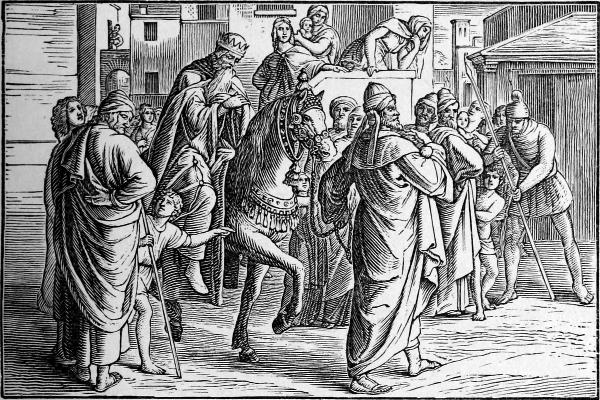
TRIUMPH OF MORDECAI.—Esther 6:11.
SECOND READING.
"Thy servants think upon her stones, and it pitieth them to see her in the dust."—Ps. 102:14.

THERE was a good Jew named Nehemiah, whom the King of Persia had made his cup-bearer. One day one of the Jews came from Jerusalem, and told Nehemiah how sad all was at their home, the city that once had been so beautiful. There was a little bit of the Temple built up, but all the streets were heaps of ruins, and only a house or two here and there built up; and the robber tribes round were always breaking in and doing mischief.
Nehemiah wept, and prayed to God for his people; and when[Pg 252] he went in to wait on the king and queen, he still looked so sad, that they asked him what was the matter. Then he told them that he had just heard that his dear home, where his fathers' tombs were, was lying waste, and that the cruel enemies were always doing harm; and he begged the king to let him go home and try to help them.
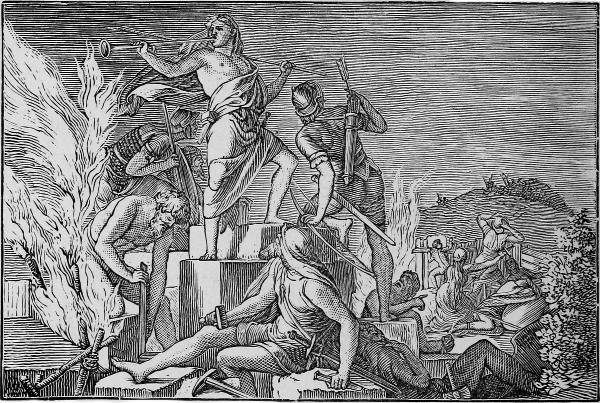
NEHEMIAH ARMETH THE LABORERS—Neh. 4:16,17.
So the king gave him leave, but set him a time to come back; and Nehemiah went all the long way to Jerusalem. It was quite as bad as he had heard. The houses were all down, only here and there one standing; and when he went out on his ass at night to view the ruins, there was a heap of stones where a gate should be, and a hole where a wall should be.
So Nehemiah stirred up all the Jews, and they set to work to build the wall to keep out the robbers. Then the enemies laughed at them, and said a fox could break down all they built; and when they went on, people used to come and attack them, so that they had to work with swords ready to fight, and always[Pg 253] on the watch to come to help if they heard a trumpet blown. But they kept on, and the wall was built and the gates set up; and they were safe once more from enemies coming in among them.
QUESTIONS.
1. Who was Nehemiah? 2. What made him sad? 3. Who were living at Jerusalem? 4. What had happened to it? 5. What did Nehemiah do when he heard this sad news? 6. How did God begin to grant his prayer? 7. What did the king ask him? 8. What did he tell the king? 9. Where did he go? 10. What did he find there? 11. Why did they want a wall? 12. What did he set the Jews to do? 13. How did they build? 14. Who tormented them? 15. But what was finished at last?
THIRD READING.
"The joy of the Lord is your strength."—Prov. 5:17.

GOOD Nehemiah built up the wall of Jerusalem; and his friend Ezra did all he could to teach the Jews to keep the Law of God rightly. It was Ezra who gathered together the five books of Moses, and collected the writings of the prophets, and wrote out the history of the kings, and put nearly all the Old Testament in order as we have it now.
And Ezra and Nehemiah took care to teach the people to keep the Sabbath again, as the Fourth Commandment had taught them. Nehemiah used to have the gates of the city shut up, that no stranger might bring any burthen in, and that no one might come in to sell or buy on God's holy day.
And then they kept the Feast of the Tabernacles. It was a most beautiful feast. All the people went and cut down great boughs of myrtle, olive, pine, and citron, and willow trees, and built up arbors with them, where they lived for seven whole days, to put them in mind of how their fathers had lived when they came out of Egypt.
And on the great day of the feast, every Jew went up to the[Pg 254] Temple with a green bough in his arm, and stood in the court, and all the priests came out on the steps with palm-branches, and with silver trumpets. Then the trumpets were sounded, and everybody waved their branches for joy. And the priests began a beautiful rejoicing psalm, and at its most joyful verses the people waved their palms again.
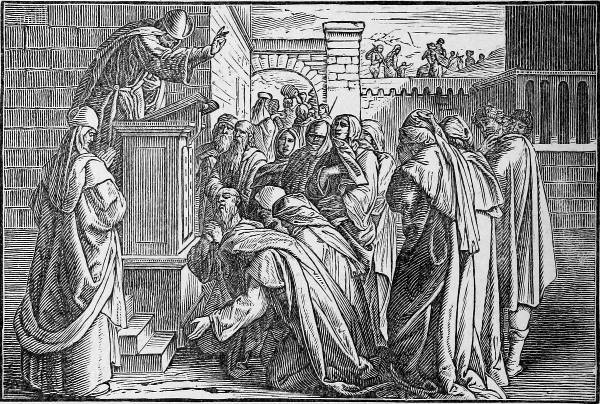
A SOLEMN FAST AND REPENTANCE OF THE PEOPLE.—Neh. 9:1,2.
At night all the court of the Temple was lighted up with great lamps, to put the people in mind that the Lord is our light. How beautiful it must have been, and how happy all the people were to have come back from worshipping idols, and being punished in a strange land, to praise their own true God once more, who blessed and made them happy.
QUESTIONS.
1. Who were the two good men who governed the Jews? 2. What did Ezra collect together? 3. Who taught good men how to write the Bible? 4. What parts of the Bible did Ezra put together? 5. What commandment were Ezra and Nehemiah careful about? 6. How did they keep people from breaking the Fourth Commandment? 7. What great feast did they keep?

THE COMING OF THE LORD.
FIRST READING.
"The fulness of the time was come."—Gal. 4:14.

SHEPHERD
THERE was a long time after the Jews came home during which we do not know much about them. Only they had quite left off worshipping idols, and stood out bravely when a bad king wanted to make them do so.
But they were not good in other ways. They quarrelled among themselves a great deal. One set, who were called Pharisees, were very proud and hard-hearted; and another set, who were called the Sadducees, would not believe or obey any of the Bible that was written after the time of Moses—none of the Prophets nor of the Psalms.
These two sets quarrelled so much that they allowed a fierce strange nation to come in and make themselves their masters. These were the Romans, whose city was Rome, in Italy. They were fierce soldiers, and wanted to make the world all their own.
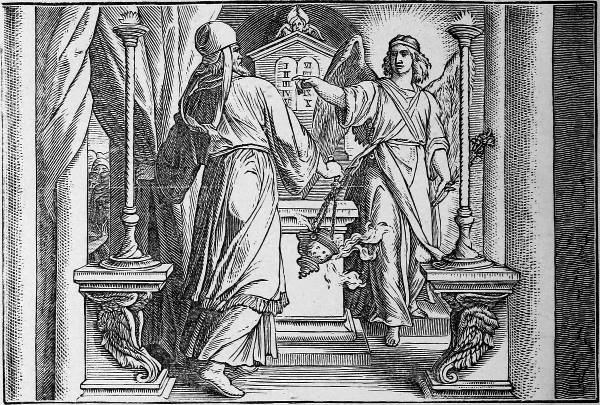
THE ANGEL APPEARS UNTO ZACHARIAS.—Luke 1:12, 13.
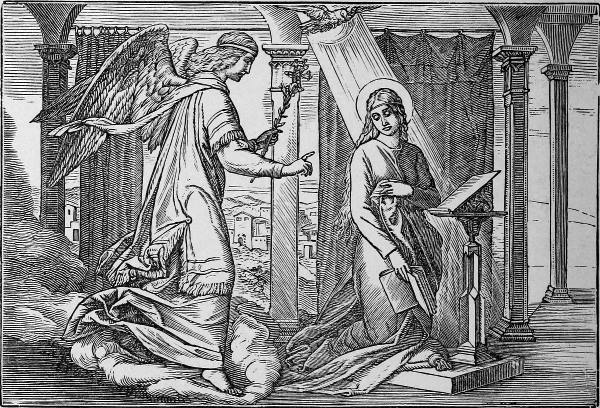
THE ANGEL APPEARS UNTO MARY.—Luke 1:35.
One of their generals, whose name was Pompey, was so
[Pg 256]
[Pg 257]daring that he forced his way into the Holy of Holies, where no
one was allowed to go but the High Priest once a-year. He was
disappointed to find nothing there, only an empty chamber,
without any image or likeness; and the Jews were much grieved
and distressed. It was always said that nothing ever went well
with Pompey afterwards.

THE STAR OF BETHLEHEM

THE PROPHECY OF ELIZABETH AND OF MARY.—Luke 1:39-45.
QUESTIONS.
1. What sin had the Jews left off? 2. But were they grown good? 2. Who were the two parties? 4. What was amiss with the Pharisees? 5. What would not the Sadducees believe? 6. What came of their quarrels? 7. What sort of people were the Romans? 8. Where was their home? 9. What did they want to conquer? 10. Where did their general make his way? 11. What was the Holy of Holies? 12 What did he find there? 13. Why was there no image there? 14. What commandment forbids the worshipping any image? 15. Who alone was allowed to go into the holy place? 16. How often? 17. What was said of Pompey after he broke in?

SECOND READING.
"He shall be great, and shall be called the Son of the Highest.—Luke 1:32.

THE Romans set up a strange king over the Jews. His name was Herod, and he was an Edomite—that is, a descendant of Jacob's brother Esau. He believed in the true God, and began to make the Temple much more beautiful than it had been since it had been built up after the Jews came back from Babylon. But he was a very wicked and cruel man, who killed his own wife, and made everybody afraid of him; and the Jews were very unhappy under him.
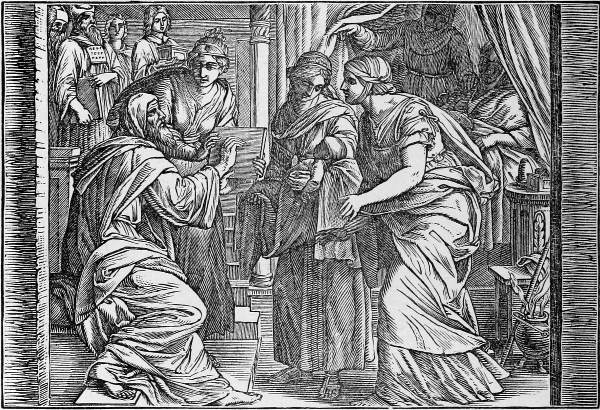
THE BIRTH OF JOHN.—Luke 1:62-64.
They had one hope, and that was, that it was just about the time when God had promised to send a Holy One into the world to save them and set them free; and they thought He would be a great, mighty king, like David, who would conquer Herod, and drive away the Romans, and have a crown and throne brighter than Solomon's.
And just then an angel was sent from God to the little town of Nazareth, where there lived a young maiden, quite a poor woman, but most good and holy, a descendant of the great King David. The angel told her that she was highly favored, for she was to be the mother of the Son of the Highest, for the Holy One who was to be born of her should be the Son of God; and when He was born, she was to call His name Jesus, which means the Lord our Saviour, because He should save His people from their sins; and Mary said, "Behold the handmaid of the Lord; be it unto me according to thy word."
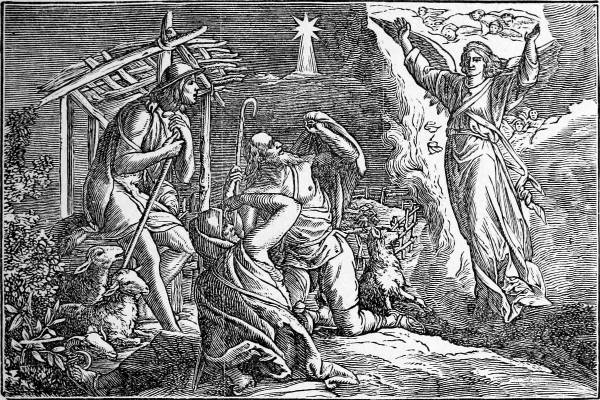
THE ANGEL ANNOUNCING THE BIRTH OF JESUS.—Luke 2:10, 11.
QUESTIONS.
1. Whom did the Romans make king of the Jews? 2. What nation did Herod belong to? 3. Who was the forefather of the Edomites? 4. Whose son was Esau? 5. What sort of man was Herod? 6. What did he do to please the Jews? 7. But how did he treat them? 8. Whom did he put to death? 9. What were the Jews hoping for? 10. Who had promised that Holy One? 11. What did the Jews think He would be? 12. Who came to say He was coming[Pg 260] at last? 13. To whom was the angel sent? 14. What was her name? 15. Where did he live? 16. What did the angel tell her? 17. Who would be born of her? 18. Whose Son would He be? 19. What was she to call Him? 20. What does Jesus mean? 21. What did she answer?

THE BIRTH OF JESUS.—Luke 2:10, 12.
THIRD READING.
"Glory to God in the highest, and on earth peace, good will toward men." Luke 2:14.

THE blessed Virgin Mary lived at Nazareth; but it was God's will that the holy Son of God should be born at Bethlehem, the little town where David used to live and keep his sheep. The Romans sent out orders that everyone should go to their proper home to have their names set down, and pay a piece of money.
So the Virgin Mary had to go, with a good man named Joseph, a carpenter, who was to be her husband. Such a number of people had come there that there was no room for them in the[Pg 261] inn, and they had to go to a stable—a cavern underground—where the oxen and asses were.
And it was there that the Holy Child of Mary, the Son of God, was born, in the stable where the cattle were. The blessed mother wrapped Him in baby-clothes, and laid Him in the manger, among the hay and straw.
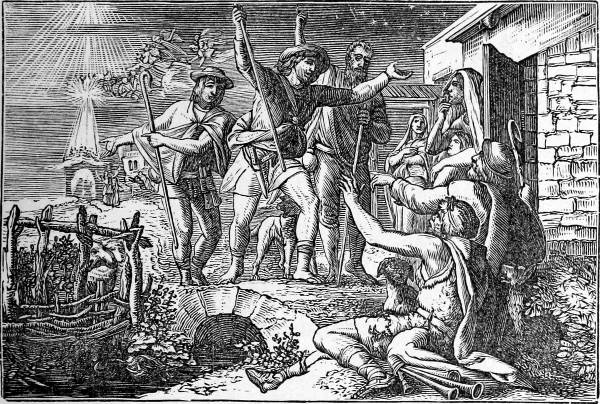
THE BIRTH OF JESUS PROCLAIMED BY THE SHEPHERDS.—Luke 2:17.
None of the people in the inn knew or cared; but there were shepherds on the hill, keeping watch over their flocks by night. The angels came down to them, and told them that to them was born that day, in the city of David, a Saviour, which is Christ the Lord, and that He was a Babe lying in a manger.
As soon as the angel had said that, many other angels, who were very glad that poor men below should be saved, all began to sing, "Glory to God in the highest, and on earth peace, good-will toward men."
So the angels and the shepherds kept the Saviour's birthday, and we keep it upon Christmas-day.
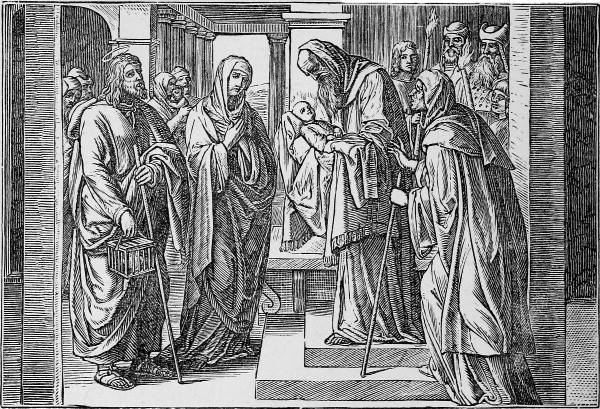
PRESENTATION IN THE TEMPLE.—Luke 2:27, 28.
QUESTIONS.
1. What was David's town? 2. But where did the blessed Virgin Mary live? 3. How came she to go to Bethlehem? 4. Where had she to rest? 5. Why could she not go to the inn? 6. Who was born in the stable? 7. Where was He laid? 8. Who were told of it? 9. Who told the shepherds? 10. What did the angels sing? 11. Why were they glad? 12. Why are we glad? 13. What is the birthday of our Lord?
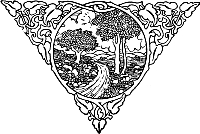
THE CHILDHOOD OF OUR LORD.
FIRST READING.
"We have seen His star in the east and are come to worship Him."—Matt. 2:2.
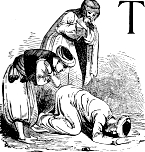
THE shepherds were not the only people who came to see the blessed Lord Jesus when He was a little Infant. Far away in the East, God showed a bright, beautiful star to some wise men, and taught their hearts that it was the sign that the great King was born.
They set out on their journey to Judea, to see and honor Him; and when they came, they asked, "Where is He that is born King of the Jews, for we have seen His star in the East, and are come to worship Him."
This made Herod afraid, for he thought this must be a king who would take his kingdom from him. He made the learned men among the Jews look out in the prophecies where Christ should be born.
They found it was to be at Bethlehem, and he told the wise men so, and desired them to let him know when they found the King, that he might come and worship Him too; but he did not really mean to worship Him, but to kill Him.
However, God Himself showed these wise men where to find our blessed Lord, for the same star that they had seen in the East came out again, and went before them, and came and stood over where the young Child was. And though they saw a little Baby,[Pg 264] and a poor mother holding Him in her arms, they knew He was the Lord and King; and they worshipped Him, and offered Him the gifts they had brought.
There was gold, and there was frankincense, which means the sweet-smelling, costly powder that was burnt in the Temple; and myrrh, which is a precious gum which comes out of trees, and is used to preserve and keep things good.
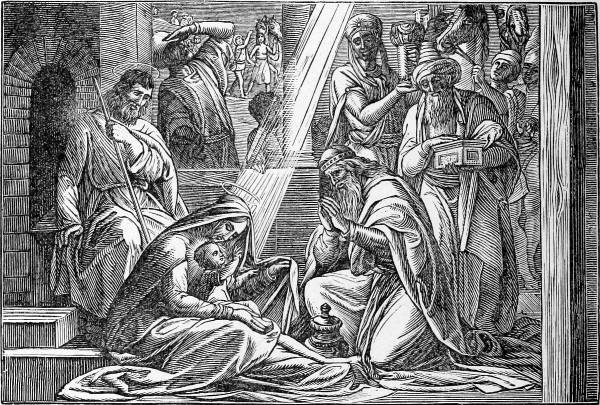
THE VISIT OF THE WISE MEN.—Matt. 2:10, 11.
QUESTIONS.
1. Who came to see our Lord? 2. Where did they come from? 3. What had they seen? 4. What did they ask? 5. Whom did they ask? 6. What did Herod say? 7. Did he want to worship? 8. What did he want to do? 9. How did the wise men find the way? 10. Whom did they see? 11. What did they offer Him? 12. What were the gifts? 13. What is frankincense? 14. What is myrrh? 15. Why did they worship Him?

SECOND READING.
"Arise, and take the young child and His mother."—Matt. 2:13.

HEROD was afraid that the new-born King of the Jews would take away his kingdom. So he meant to kill Him as soon as he could find out from the wise men where He was. But the wise men never came back to tell him, for God spoke to them in a dream, and warned them to go back to their own country another way.
And God also spoke to Joseph the carpenter, the blessed Virgin Mary's husband, and told him to take the young Child and His mother, and flee into the land of Egypt, and stay there till they should be told to come back, for Herod was seeking the young Child to destroy Him. Joseph obeyed, and the whole family fled into Egypt, and lived there for some years.
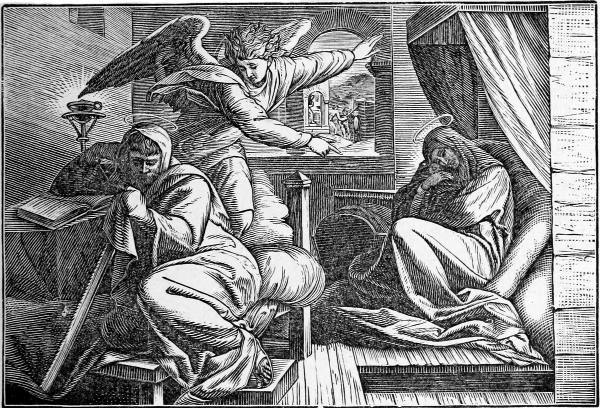
JOSEPH COMMANDED TO FLEE INTO EGYPT.—Matt. 2:13.
When Herod found the wise men did not come, he was very angry; and to make sure of killing Him who was to be King of the[Pg 266] Jews, he was so cruel and wicked as to cause all the babies in Bethlehem, of two years old and under, to be put to death.
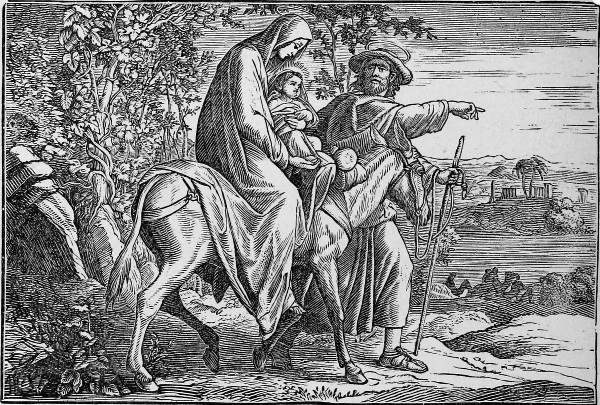
THE FLIGHT INTO EGYPT.—Matt. 2:14, 15.
We call them the Holy Innocents, because they were the first who died for Jesus Christ's sake. It seemed very sad then, but they have been happy and glorious ever since in heaven, and always will be. But God had taken care of Him, and He was safe in Egypt; and there they stayed till our Lord was about three years old, and then the wicked King Herod died.
QUESTIONS.
1. What did Herod want to do? 2. Why could he not find our blessed Lord? 3. Who warned the wise men? 4. Whom did Herod murder? 5. What do we call those Babes of Bethlehem? 6. But whom did he not find? 7. For where was our Lord? 8. Who had taken Him there? 9. Who was Joseph? 10. How did Joseph know He was to go to Egypt?

THIRD READING.
"Jesus increased in wisdom and stature, and in favor with God and man."—Luke 2:52.

WHEN Herod died, Joseph brought our blessed Lord and His mother back from Egypt, and went to live at Nazareth. We do not know any more about Him till He was twelve years old, and then He went up with Joseph and His mother to Jerusalem to keep the Feast of the Passover. That great feast the Jews always kept in remembrance of the night when God delivered them out of their troubles in Egypt.

KILLING THE MALE CHILDREN UNDER TWO YEARS OLD.—Matt. 2:16.
When the time came for going home, the blessed Mary and Joseph could not find the Child Jesus. They thought at first that He was among the other boys of the company who had come up from Nazareth, and they went on a day's journey; but when He did not come back to them in the evening, they turned back to Jerusalem to seek Him. They looked for Him during three days[Pg 268] all round the city, and found Him at last in the Temple, among the boys who came to be taught by the learned men there.
Everybody who listened was astonished at His understanding and His answers; but when His mother came to call Him, He went home with her directly; and He obeyed her and Joseph in everything, and helped and worked for them, though He was really their God and King.
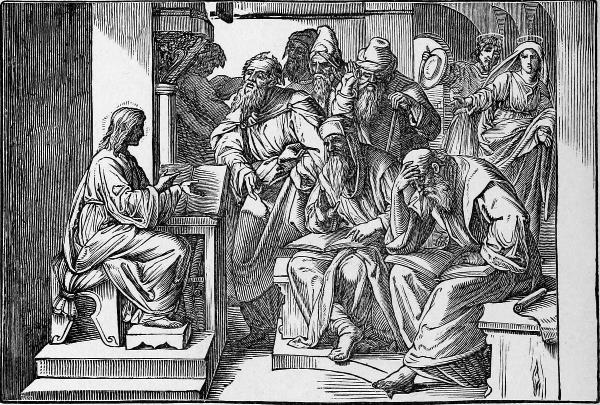
JESUS TEACHING IN THE TEMPLE.—Luke 2:46, 47.
That was to teach us all how good children should behave at home to their fathers and mothers, for Joseph was like a father to Him, though His real Father is God. And as He grew older He lived on with them, and worked as a carpenter with them till He was thirty years old. So, you see, He knows just what it is to be one of us, and a poor hard-working man. For God from heaven came to be one of us men, and just like us.
QUESTIONS.
1. When did our blessed Lord come back from Egypt? 2. Where did He go and live? 3. How old was He when we hear about Him again? 4. Where did[Pg 269] He go then? 5. What feast did they go to? 6. What was the Passover to put people in mind of? 7. What happened when it was time to go home? 8. How long was He lost? 9. Where was He found? 10. What was He doing there? 11. What was everyone surprised at? 12. What did He do when He was called? 13. How can you do like Him when you are called from what you like? 14. How did He always behave to His mother and Joseph? 15. How can you try to be like Him?
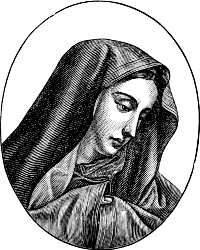
THE PREPARATION FOR THE MINISTRY.
FIRST READING.
"Repent ye: for the kingdom of heaven is at hand."—Matt. 3:2.
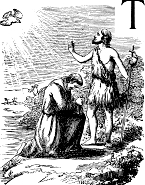
THE blessed Lord Jesus lived at Nazareth, and worked there as a carpenter until He was thirty years old, so that He has felt how we live here, and knows what our feelings and ways are by trying them.
When it was nearly time for Him to begin to set up His kingdom, a holy man was sent to make ready for Him. This man's name was John, and he lived out in the rocky and bushy country on the bank of the river Jordan, dressed in a coarse garment woven of camel's hair, and living on the locusts and wild honey he found there.
He stood there telling everyone who came that the kingdom of God was going to begin, and that those who wished to belong to it must repent and give up their sins. All who would feel and own their sins he took down to the river and bathed and washed them, to show how some day they would have their souls washed, just as their bodies were washed now.
This washing was called baptising, and he is always called John the Baptist; but he always told the people that there was One coming who was greater than he was, and that this Holy One would baptise them with the Holy Ghost and with fire.
QUESTIONS.
1. How long did our blessed Lord live at Nazareth? 2. What did He do there? 3. Who was sent to prepare His way? 4. Where did John live? 5. What did he wear? 6. What did he eat? 7. What are locusts? 8. What did he tell the people? 9. What were they to be sorry for? 10. What is repenting? 11. What did he do to those who repented? 12. In what river did he wash them? 13. What was this washing called? 14. What was he called? 15. Who did he say was coming? 16. How would that One baptize them?
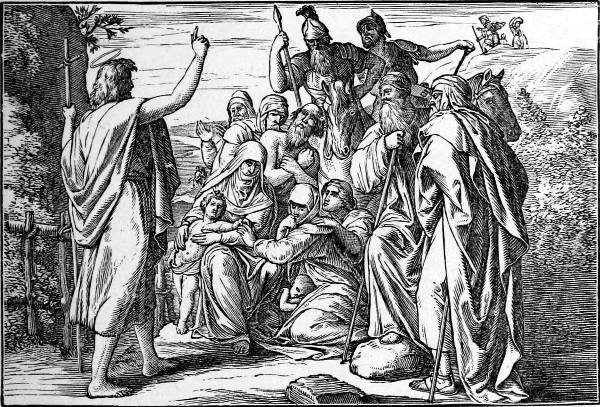
JOHN THE BAPTIST PREACHING IN THE WILDERNESS.—Matt. 3:2, 8.
SECOND READING.
"This is my beloved Son, in whom I am well pleased."—Matt. 3:17.

ONE day, as John was baptising, Jesus came to him, and desired to be baptised. His mother and John's mother were cousins, and John knew He had never done one wrong thing in all His life, and had nothing to repent of. So he said, "I have need to be baptised of Thee, and comest Thou to me?" Then Jesus answered, "Suffer it to be so now, for thus it becometh us to fulfil all righteousness.
Then John baptised Him; and as they were coming up out of the water, the heaven above was opened, and there came God the Holy Ghost, taking a shape like a dove, and rested upon the Head of Jesus, and there was God the Father's voice speaking out of heaven, and saying, "This is My Beloved Son, in whom I am well pleased."
Then John the Baptist knew that Jesus was the Son of God, and the great King whose way he had been sent to prepare.
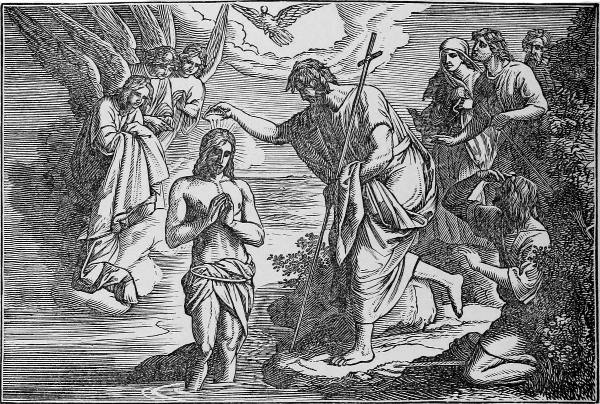
THE BAPTISM OF JESUS.—Mark 1:9.
And this was the beginning of baptism, or christening, as we call it. We are all baptised into the name of the Father, the Son, and the Holy Ghost, and made to belong to Jesus Christ.
QUESTIONS.
1. Who was John the Baptist? 2. Where did he baptize? 3. Who came to him to be baptized? 4. What relation was the blessed Virgin to his mother? 5. What did he say? 6. Why did he say so? 7. What was the answer? 8. What happened after the baptism? 9. Who came down from heaven? 10. Who spoke from heaven? 11. What did God the Father's voice say? 12. What did John know then? 13. Whose Son is Jesus? 14. How had John been preparing His way?
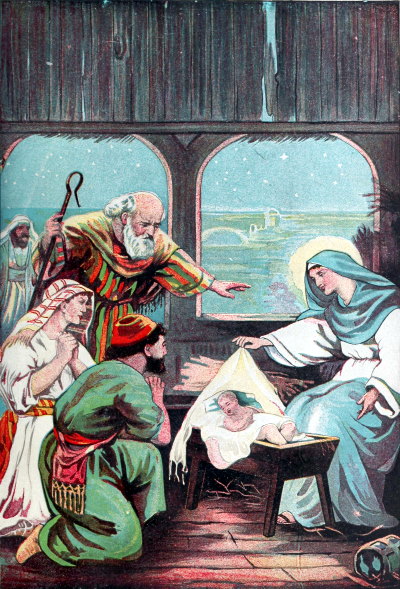
CHRIST IN THE MANGER.
THIRD READING.
"Thou shalt not tempt the Lord thy God."—Matt. 4:7.

OUR Lord Jesus had come into the world to conquer the Devil, to whom Eve had given power over it when she ate the fruit.
So He went up into a lonely place in the wilderness, that He might meet the Devil, and stand up against all the temptations that had led Eve astray. He was there forty days, with nothing to eat; and the Devil came and said, "If Thou be the Son of God, command that these stones be made bread." But He would not do it at Satan's word; and so as Eve fell by eating, He stood by resisting hunger.

THE TEMPTATION OF JESUS.—Matt. 4:10, 11.
Then the Devil showed Him all the kingdoms of the world, and the glory of them, in one moment of time, and said, "All these things will I give Thee, if Thou wilt fall down and worship me." But though Eve had been tempted by seeing the beauty[Pg 274] of the fruit, our Lord was not led astray by all the glory and beauty of this world. So He conquered again.
Then He stood with Satan on the top of a high wall, with a precipice below; and Satan tempted Him to cast Himself down, so that the angels should come round and bear Him up, and all might see He was the Son of God. It was just as Satan had told Eve, that she would be like a God if she ate the fruit; and He said, "It is written, thou shalt not tempt the Lord thy God."
Satan left Him then for a time, and the angels came and waited on Him. That was the beginning of His victory over Satan and sin. And every one of us must fight our battle too. Whenever we are inclined to be naughty, Satan is tempting us, but we must try to be strong and drive him away; and our Lord Jesus will help us if we only try, and will drive him away.
QUESTIONS.
1. What had our Lord come into the world for? 2. When had Satan become master of the world? 3. Where did our Lord go? 4. What was the first temptation? 5. Why would not He make the stones into bread? 6. What was the second temptation? 7. What did Satan want Him to do? 8. What was the third temptation? 9. Who would have come round Him? 10. Would He let them show that He was God? 11. What did He say to Satan? 12. What did Satan do? 13. Who came to wait on our Lord? 14. Who had been conquered?

THE CALLING OF THE DISCIPLES.
FIRST READING.
"Behold the Lamb of God."—John 1:36.

NOW that John the Baptist knew that Jesus was, indeed, the Son of God, whom he had been sent to proclaim, he began to point Him out, saying, "Behold the Lamb of God, which taketh away the sin of the world." There were two poor fishermen, who had come out to listen to John, who heard, and who went to Jesus and asked, "Master, where dwellest Thou?" He said, "Come and see."
Their names were Andrew and another John. They stayed all one night with Him, and saw and felt that He was so great and holy that no one else could be the Christ who had been promised to come and save the world; and John was always the nearest and best loved of all to Him.
Andrew went and told his own brother Simon, whom our Lord named Peter, which means a rock; and they brought two more of their friends to see Him, whose names were Philip and Nathanael. When Jesus saw Nathanael coming, He said, "Behold an Israelite indeed, in whom is no guile!"
Nathanael asked how He could know him. Our Lord[Pg 276] answered, "Before that Philip called thee, when thou wast under the fig tree, I saw thee." Then Nathanael said, "Thou art the Son of God; Thou art the King of Israel." For he had been alone under the fig tree, and nobody who was not God could have seen or known he was there; and our Lord said that because he believed, he should see greater things than these.
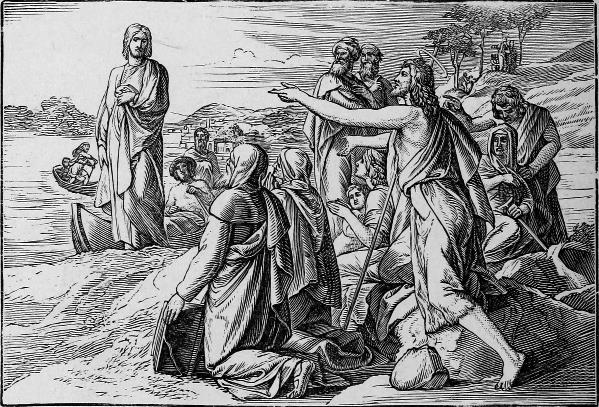
BEHOLD THE LAMB OF GOD.—John 1:36.
QUESTIONS.
1. Who had been sent to proclaim our Lord? 2. What did John the Baptist say of Him? 3. Who were the two first who listened? 4. What was their trade? 5. Who was the best loved of all? 6. Whom did Andrew fetch? 7. What name was given to Simon? 8. What does Peter mean? 9. What friends did they tell of our Lord? 10. What did our Lord say of Nathanael? 11. What does "without guile" mean? 12. What did Nathanael ask? 13. Why was he surprised? 14. What did our Lord say? 15. What was his answer? 16. How did he know that Jesus was God? 17. Where can God see?

SECOND READING.
"Thou hast kept the good wine until now."—John 2:10.

PERSONS who loved to learn of a Master were called His disciples. So John and his brother James, Andrew and Simon Peter, Philip and his friend Nathanael, were all called our Lord's disciples.
They were all invited to a wedding at Cana, the village in the hills where Nathanael lived; and the blessed Virgin Mary, our Lord's mother, was there too. But the bride and bridegroom were poor people, and in the midst of the feast it turned out that there was not wine enough. The blessed Virgin said, in a low voice, to her Son, "They have no wine."

JESUS CALLING HIS DISCIPLES.—John 1:51.
Now, there were six great jars standing by, and Jesus told the servants to fill them with water. So they filled them up to the brim; and then He told the servants to draw out some of what they had poured in, and carry it to the chief person there.
As soon as this man had tasted it, he found it was such good wine that he said to the bridegroom that most people began their feasts with their best wine, but that here the best had been kept for the last. This was the first wonderful thing our Lord did on earth, and it made His disciples know that He was God, for no one else could have done such a wonder.
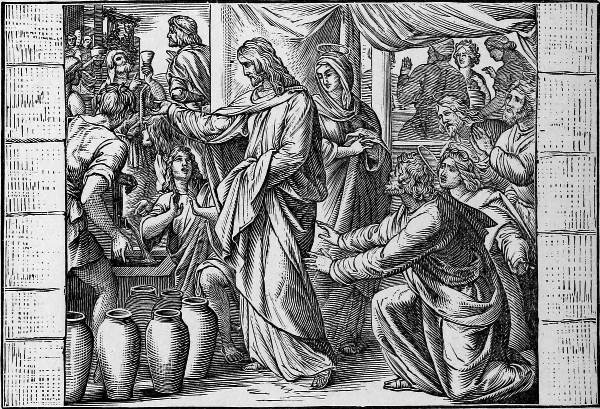
THE MIRACLE IN CANA.—John 2:7, 8.
We call these wonders miracles. Our Lord worked many more while He was on earth, and most of them were cures to the blind, or the lame, or the sick. He made them well directly by His power and love.
QUESTIONS.
1. What are disciples? 2. Who were the first disciples? 3. What feast did they go to? 4. Where was the feast? 5. What was wanting at the feast? 6. What did our Lord's mother say? 7. What did He tell the servants to do? 8. How many waterpots were there? 9. What did the water become? 10. To whom was it carried? 11. What was said of it? 12. How came it to be wine? 13. What is such a wonder called? 14. Why could our Lord do miracles? 15. What did they show?
THIRD READING.
"I will make you fishers of men."—Matt. 4:19.

I TOLD you Andrew and Peter and John were fishermen. They used to go fishing at night in boats, on the blue lake of Galilee, shut in between the high mountains. One night, they had been out in two boats, trying hard to catch fish, but none would come to their nets.
In the morning, they saw Jesus standing on the bank, with a great crowd of people round Him, come to see and hear His teaching. He called to Simon Peter to come and take Him into his boat, so that He could teach the people from thence without being crowded.
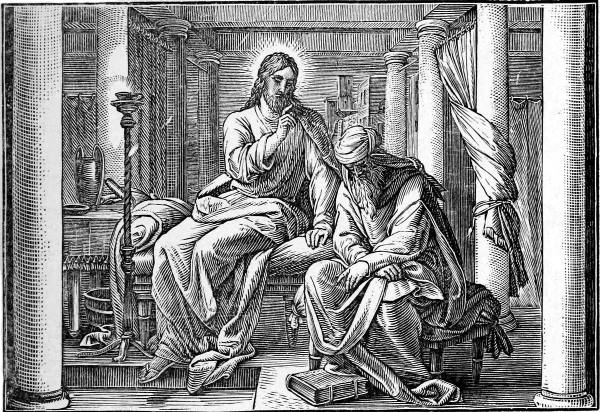
JESUS TEACHES NICODEMUS.—John 3:2, 3.
When He had done speaking, He told Andrew and Peter to
go out into the deeper water, and let down their nets. They said,
"Master, we have toiled all the night, and have taken nothing:
nevertheless at Thy word I will let down the net." And instantly
[Pg 280]
[Pg 281]the net was so full of fishes, that Andrew and Peter could not
draw it up without the help of John and his brother James, who
was with him in his boat; and both boats were quite full of fish,
and ready to sink with the weight.
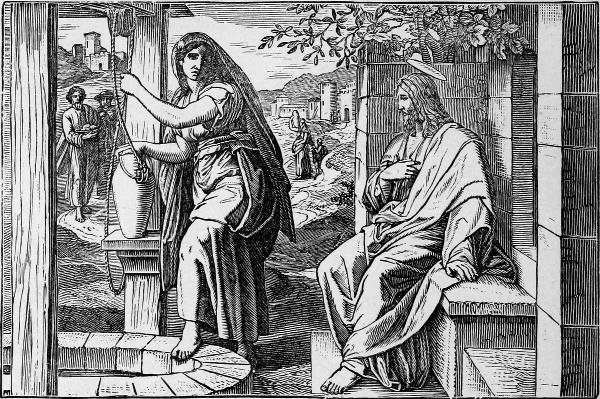
JESUS AND THE WOMAN OF SAMARIA.—John 4:25, 26.
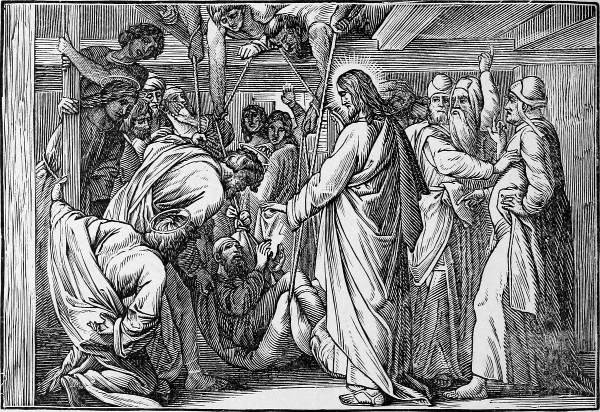
JESUS HEALS THE SICK OF THE PALSY.—Mark 2:4, 5.

Our Father who art in Heaven
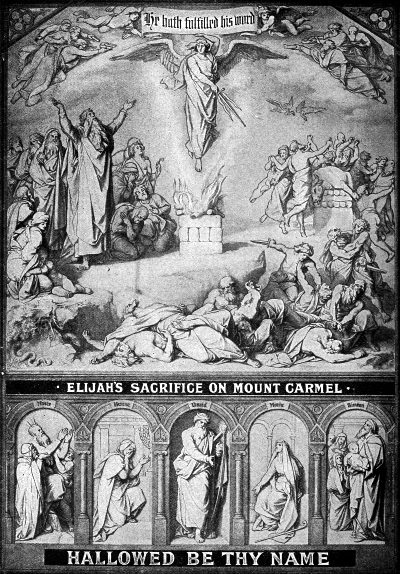
He hath fulfilled his word
ELIJAH'S SACRIFICE ON MOUNT CARMEL
HALLOWED BE THY NAME
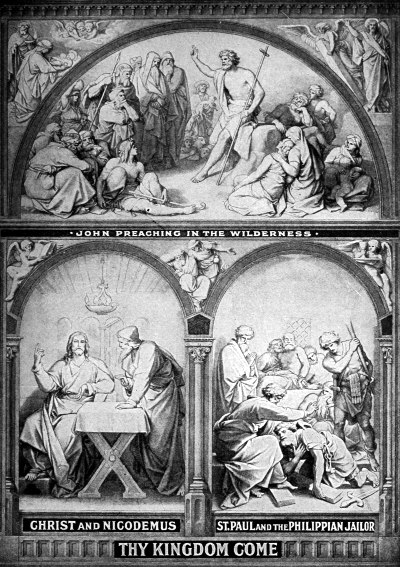
JOHN PREACHING IN THE WILDERNESS
CHRIST AND NICODEMUS
ST. PAUL AND THE PHILIPPIAN JAILOR
THY KINGDOM COME
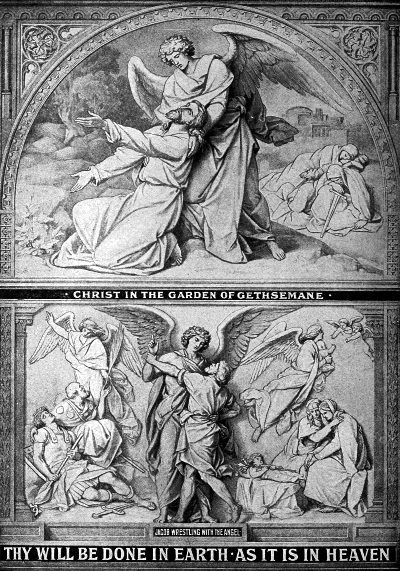
CHRIST IN THE GARDEN OF GETHSEMANE
JACOB WRESTLING WITH THE ANGEL
THY WILL BE DONE IN EARTH AS IT IS IN HEAVEN
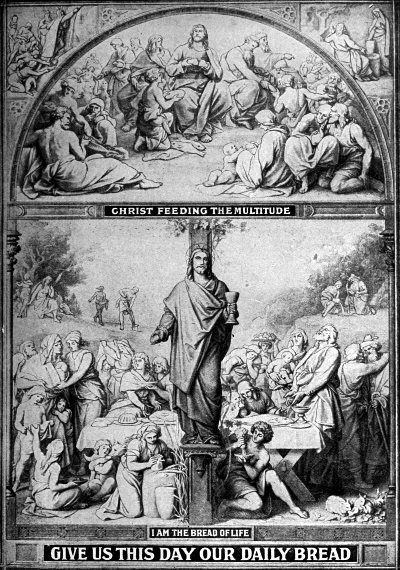
CHRIST FEEDING THE MULTITUDE
I AM THE BREAD OF LIFE
GIVE US THIS DAY OUR DAILY BREAD
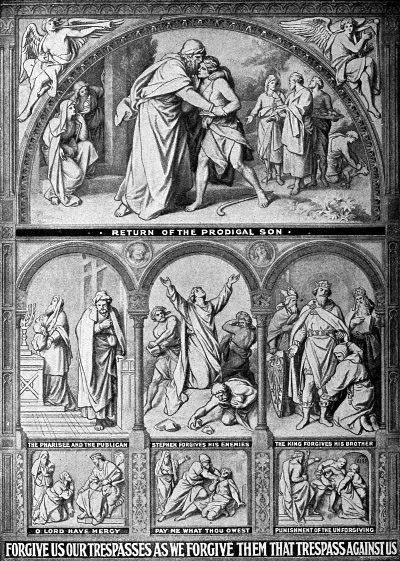
RETURN OF THE PRODIGAL SON
THE PHARISEE AND THE PUBLICAN
STEPHEN FORGIVES HIS ENEMIES
THE KING FORGIVES HIS BROTHER
O LORD HAVE MERCY
PAY ME WHAT THOU OWEST
PUNISHMENT OF THE UNFORGIVING
FORGIVE US OUR TRESPASSES AS WE FORGIVE THEM THAT TRESPASS AGAINST US
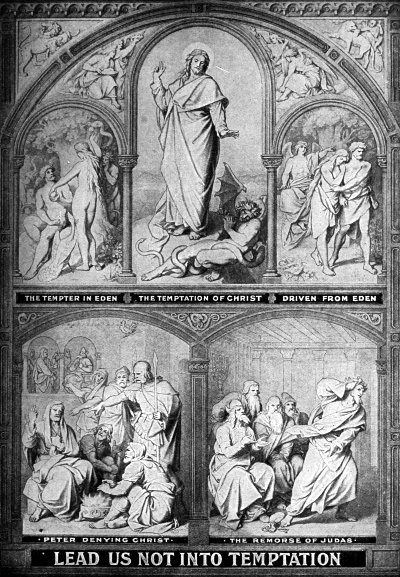
THE TEMPTER IN EDEN
THE TEMPTATION OF CHRIST
DRIVEN FROM EDEN
PETER DENYING CHRIST
THE REMORSE OF JUDAS
LEAD US NOT INTO TEMPTATION
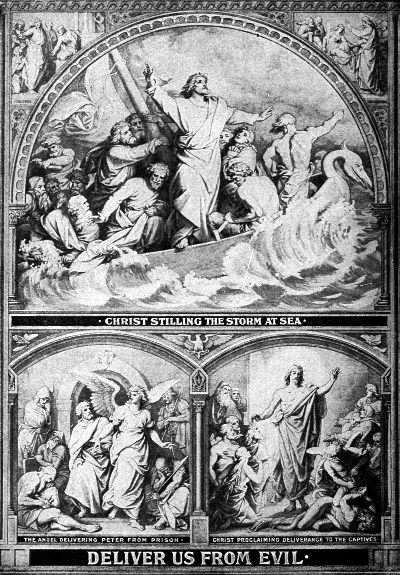
CHRIST STILLING THE STORM AT SEA
THE ANGEL DELIVERING PETER FROM PRISON
CHRIST PROCLAIMING DELIVERANCE TO THE CAPTIVES
DELIVER US FROM EVIL
When the boats came to land, our Lord told the four disciples that they were to come with Him, for He would make them fishers of men, for they were to draw disciples to Him, instead of catching fish. They believed Him, and left all they had to follow Him, and they were always with Him—His dear friends who followed Him everywhere, and stored up His holy words in their hearts.
QUESTIONS.
1. What was the trade of the disciples? 2. Where did they fish? 3. How did they fish? 4. Who came to them? 5. What did he bid them do? 6. What had they been doing all night? 7. But what did they now let down? 8. What did they find in their nets? 9. What were filled? 10. How came the fish there? 11. What did our Lord call them to do? 12. What were they to be? 13. What did they leave? 14. Who were these four?
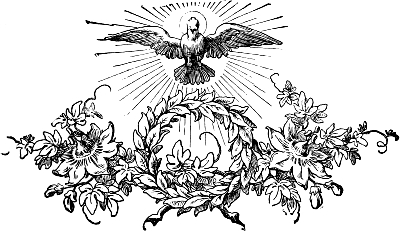
THE MINISTRY.
FIRST READING.
"He went about doing good."—Acts 10:38.
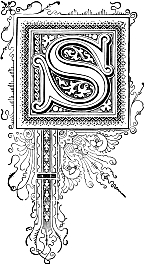
SIMON PETER had a house at Capernaum, which is one of the towns that stand upon the shore of the Lake of Galilee. There our Lord cured the mother of Peter's wife of a bad fever by His mighty power in one moment, and there He generally lived when He was in those parts; but He never stayed long there, for He went about doing good.
In every town or village that he came to, He used to go and teach in the synagogue. A synagogue was a place where the Jews who lived too far from Jerusalem to go to the Temple every Sabbath-day used to meet, and hear the Old Testament read and explained to them, and pray together.
Our Lord used to teach in the synagogues, and draw out all the meaning of the Law; and when He came out, all the sick people who were near, and all the blind and deaf and dumb people, were brought to Him, and He cured them all by only just touching them, or even only by bidding their disease to go away. For He was God as well as man, and could do all things. Or He would sit on the mountain side, and all the people would come round Him, and He would teach them.
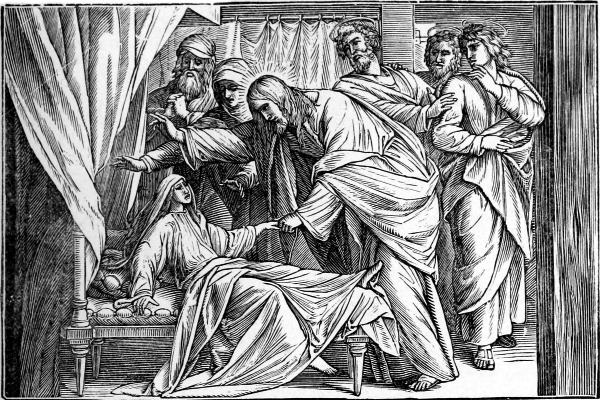
JESUS RAISES THE DAUGHTER OF JAIRUS.—Mark 5:41, 42.

JESUS GIVES SIGHT TO THE TWO BLIND MEN.—Matt. 9:27, 28.
There is one beautiful discourse of His, called the Sermon on the Mount, which I hope you will soon know well. And in it He taught his disciples the prayer we all say, and call the Lord's Prayer, and which we love the best of all prayers.
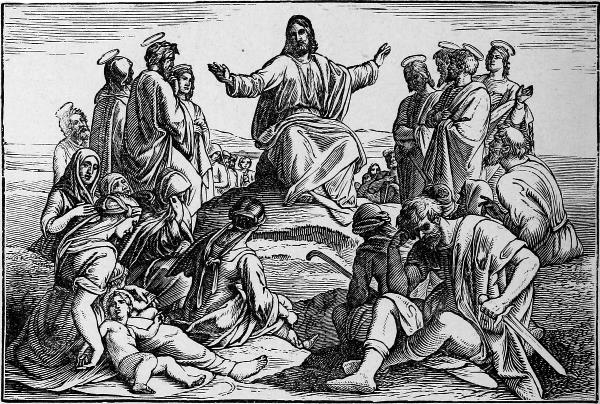
SERMON ON THE MOUNT.—Matt. 5:1-3.
QUESTIONS.
1. In whose house did our blessed Lord Jesus live? 2. Where was Capernaum? 3. What had He done for Simon Peter's wife's mother? 4. Where did He teach? 5. What is a synagogue? 6. When did the Jews go there? 7. What did they do in the synagogue? 8. What did our Lord explain? 9. Whom did He cure? 10. Where did He sometimes teach? 11. What is one great discourse of His called? 12. What prayer did He give His disciples? 13. How does it begin? 14. When do we say it?


JESUS RAISES THE WIDOW'S SON.—Luke 7:14, 15.
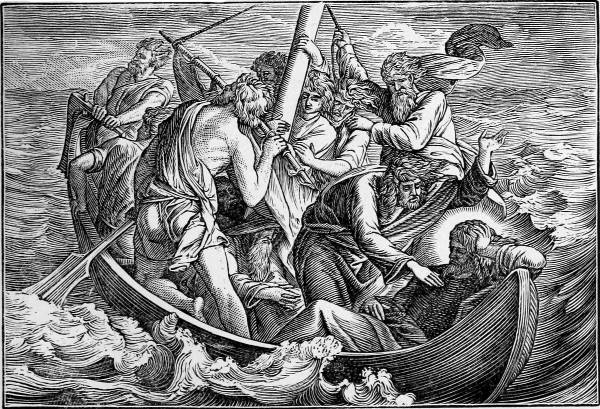
JESUS SLEEPS DURING THE STORM.—Matt. 8:24, 25.
SECOND READING.
"I have compassion on the multitude."—Matt. 15:32.

OUR Lord Jesus chose out twelve of His disciples to be always with Him, and to teach and work with Him. All the six you have heard of before were among them, and there was another called Matthew, who had been a rich man, but left all his riches to follow our Lord. These twelve were called apostles.
I told you that the Jews were in two parties, called Pharisees and Sadducees, and they used to quarrel and have many bad ways. When they found that Jesus blamed them, they were very angry; and when He was called the Holy One whom God promised, they said that the Christ would be a great king, and that He was only pretending. But all the poor heard Him gladly; and when He was driven out of the towns, they came after Him[Pg 287] into the hills and open places, and went everywhere they could to hear Him.
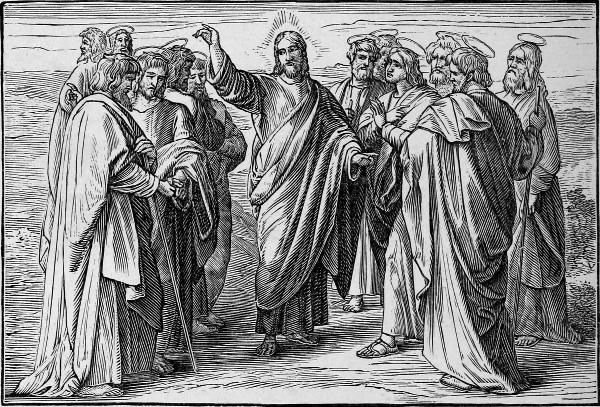
SENDING FORTH THE TWELVE APOSTLES.—Matt. 10:5-7.
One day, evening was coming on, and all these people had been with Him all day, and had nothing to eat. He said to Philip, "Whence shall we buy bread, that these may eat?" Philip came from a village just below, but he did not know what to do.
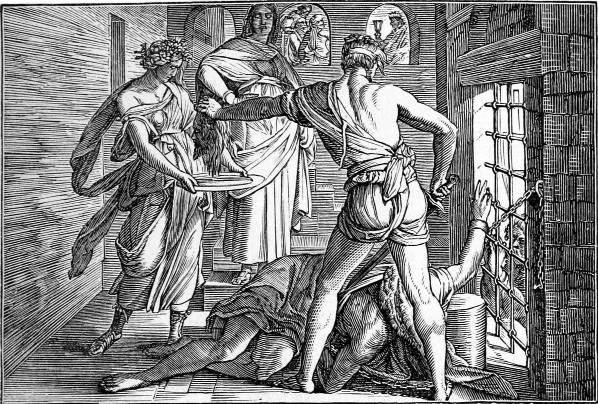
DEATH OF JOHN THE BAPTIST.—Mark 6:27, 28.
Andrew said there was a little boy there, who had brought five loaves and two small fishes; but what would they be among so many? Indeed, the loaves were not like ours—only thin barley cakes. But our Lord said, "Make the men sit down."
So they all sat on the grass; and He gave thanks, and began to give out to the apostles the bread and the fish, and they never came to an end, but there was enough for all the five thousand; and when they had all done, He told the apostles to gather up the remains, that nothing might be lost. And there was enough to fill twelve great baskets.
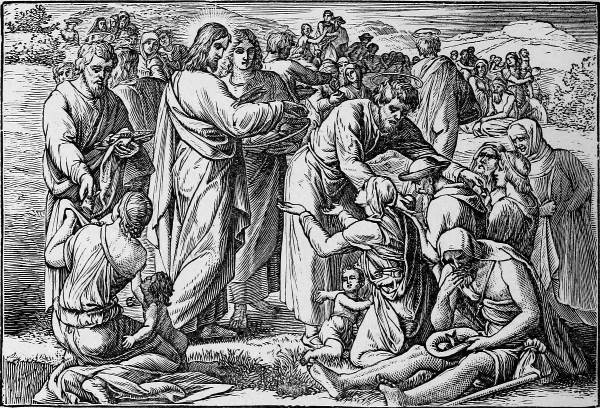
JESUS FEEDING THE FIVE THOUSAND.—John 6:10, 11.
QUESTIONS.
1. How many disciples did our Lord choose? 2. What were they to be called? 3. What were the names of the first six? 4. Who was the rich man? 5. Who hated our Lord? 6. Why? 7. Why did they think He could not be Christ? 8. Where was He driven from? 9. Where did he go? 10. Who came after Him? 11. What was all He had to feed them with? 12. Who brought the five loaves and two fishes? 13. Where did they sit? 14. What did our Lord do first? 15. Who gave out the food? 16. How much was left? 17. How many had eaten?


The Lords Prayer
Our Father
which art in Heaven,
hallowed be Thy Name.
Thy Kingdom come.
Thy Will be done in earth
as it is in Heaven. Give us this
day our daily bread. And
forgive us our trespasses, as
we forgive them that trespass
against us. And lead us not
into temptation; But deliver
us from evil: For Thine
is the Kingdom, The
Power, and the Glory,
For ever and ever.
AMEN.
THIRD READING.
"Be of good cheer; it is I; be not afraid."—Matt. 14:27.

THE people whom Jesus had fed wanted to make Him a king, but He would not be an earthly king; so He told the apostles to row away across the lake, while He went up alone into the hills to pray to His Father, where the people could not find Him.
It was a rough night. The wind came down from the hills, and tossed the lake up in great waves; and the apostles rowed with all their might, but they made little way. But when the night was far on, they saw a Figure coming to them, walking on the waves. They were frightened, and cried out. Then the Figure said, "It is I; be not afraid!" and they knew it was their Master, and were glad.

JESUS SUPPORTS THE SINKING PETER.—Matt. 14:30, 31.
And Peter said, "Lord, if it be Thou, bid me come unto Thee on the water." So he came out of the boat, and as long as he[Pg 290] trusted in His Master, he could walk; but when he saw the wind boisterous, he was afraid, and cried out, and then he began to sink.
He called out, and Jesus put forth His hand and held him up, saying, "O thou of little faith, wherefore didst thou doubt?" Then they were both taken into the boat, and the wind ceased, and the lake was calm and still.
QUESTIONS.
1. What did the people want to do? 2. Why did they want to make Jesus a king? 3. What did He do to get out of their way? 4. Where did He bid the disciples go? 5. What sort of night was it? 6. What happened to the apostles? 7. How did our Lord come to them? 8. What did they do when they saw Him first? 9. How did they know Him? 10. Who came out to Him on the water? 11. When was St. Peter safe? 12. When did he begin to sink? 13. What did our Lord say to him? 14. What happened as soon as they were in the boat?
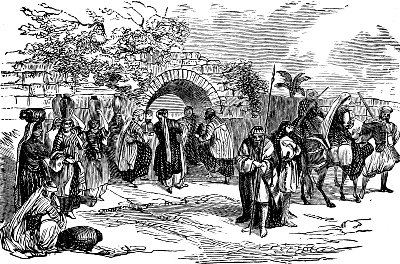
THE WELL OR FOUNTAIN AT NAZARETH.
WONDERS OF OUR LORD'S WORKING.
FIRST READING.
"Young man, I say unto thee arise."—Luke 7:14.
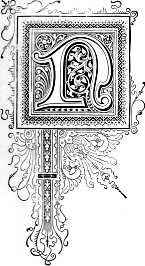
NO one can think how good and kind our blessed Lord Jesus was. Once, when He was going with His disciples into a village called Nain, He met a funeral coming out. People are not carried to the grave in their coffins in the East; but they are laid on a sort of bed called a bier, with all their best clothes on, and a wreath of flowers round the head.
The person who was now to be buried was quite a young man, and he was the only son of his mother, and she was a widow. And when the Lord saw it, He had pity on the poor woman, and He said to her, "Weep not." Then He came and touched the bier, and the bearers stood still. Then He said, "Young man, I say unto thee, Arise." And he that was dead sat up and began to speak; and our Lord gave him back alive to his mother.
QUESTIONS.
1. What was our Lord always doing? 2. What village was He going into? 3. What did he meet? 4. Who was going to be buried? 5. Had his mother any more sons? 6. And what was she? 7. How are people carried to their graves in the East? 8. Who had pity on the mother? 9. What did He say to[Pg 292] her? 10. What did He do? 11. What did he say to the dead man? 12. What did the dead man do at once? 13. To whom was he given back? 14. How came Jesus to be able to work such miracles? 15. Was not he most kind and loving so to do?
SECOND READING.
"His face did shine as the sun."—Matt. 17:2.

ONLY once all the time He was in this world did our Lord Jesus let His apostles see any of His glory, and then it was only the three who believed in Him best, and whom He kept the most with Him.
One night, He took Peter and James and John out to a mountain with Him, as He was wont to do when He was going apart to pray. They went to sleep; but when they woke, they saw Him in bright light and glory. His face was shining like the sun, and His clothes were as white as the light; and there were two talking with Him, Moses and Elias. And they were talking of how He was come to die at Jerusalem.
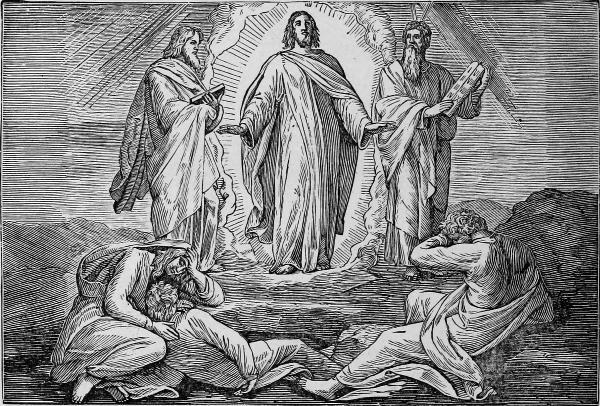
THE TRANSFIGURATION.—Luke 9:29-32.
The three were afraid, but they were happy too; and Peter
[Pg 293]
[Pg 294]said, "Master, it is good for us to be here: and let us make three
tabernacles; one for Thee, one for Moses, and one for Elias;"
for, indeed, he hardly knew what he was saying.
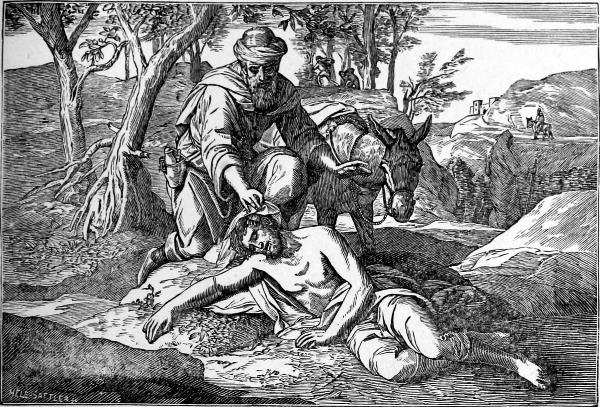
THE GOOD SAMARITAN.—Luke 10:33, 34.

JESUS AND THE SISTERS OF BETHANY.—Luke 10:41, 42.
And even as He spoke, a bright cloud came and hid the wonderful sight from them, and then they found that no one was with them but their Master, Jesus, looking as usual; and He bade them tell no one about what they had seen, until the Son of man should be risen again from the dead.
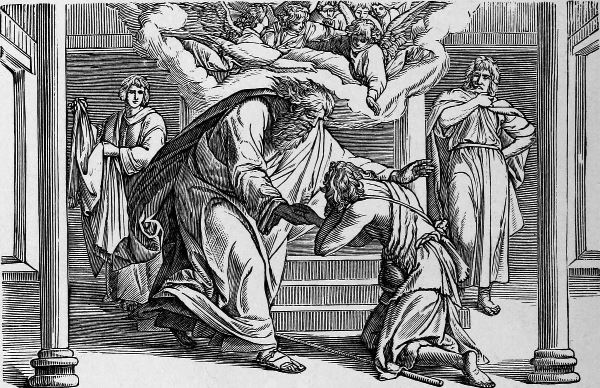
THE RETURN OF THE PRODIGAL SON.—Luke 15:22.
They knew that their Lord was the Son of man; but they could not think what He could mean by rising again from the dead.
This wonderful showing forth of His glory is called the Transfiguration.
QUESTIONS.
1. What was the Transfiguration? 2. Who were allowed to see it? 3. Where did it happen? 4. What was our Lord's face like? 5. What were His clothes like? 6. Who came and talked to Him? 7. Who was Moses? 8. Who was Elias? 9. Do you remember what had become of Elias? 10. What were Moses and Elias talking about with Him? 11. What were the three apostles doing at[Pg 295] first? 12. What did Peter say when he woke? 13. What happened then? 14. Who was left with them? 15. What did He forbid them to do? 16. When might they speak of it? 17. What could not they understand?
THIRD READING.
"Suffer the little children to come unto me."—Mark 10:14.

AFTER His Transfiguration, our Lord Jesus often told His apostles that He was going to be taken by the chief priests at Jerusalem, and that He should be ill-used, and beaten, and spit upon, and put to death on a cross; and that the third day He should rise again. But they never could understand how this would be, for they had never heard of rising from the dead; and they were so sure that He was Christ, and that Christ would be a great King, that they never understood or believed that He was to die.

THE RICH MAN AND LAZARUS THE BEGGAR.—Luke 16:19-21.
And sometimes they even disputed among themselves who would be first and greatest in His kingdom. When they did this[Pg 296] our Lord called a little child, and took him, and set him in the midst, and said that the greatest in His kingdom would be the most like that little child; for only those who are ready to be last here can be high up there.
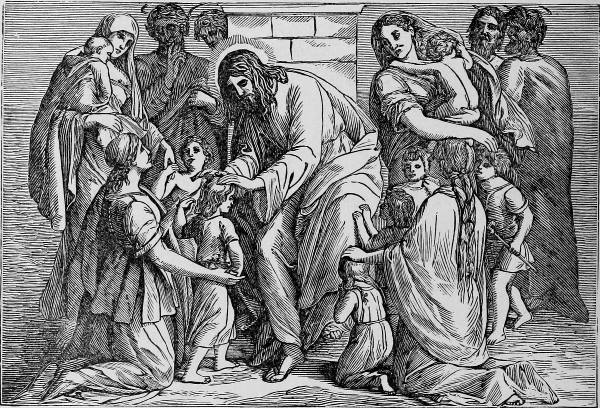
"SUFFER LITTLE CHILDREN TO COME UNTO ME."—Mark 10:14.
The Lord loved little children. Once, when the mothers were bringing their babies for Him to touch, the disciples wanted to keep them away; but He said, "Suffer the little children to come unto me, and forbid them not, for of such is the kingdom of heaven."
And then He took the little ones up in His arms, and put His hands on them, and blessed them. And just so He embraces and blesses the little children we bring to Him in church, though we cannot see Him now; and He is always glad to hear them pray.
QUESTIONS.
1. What was the Transfiguration? 2. What did our Lord say would happen to them? 3. Why would not the disciples believe it? 4. What did they dispute about? 5. Whom did our Lord call? 6. What did He tell them? 7. What is the way to be high in the kingdom of heaven? 8. Who were brought to Him?
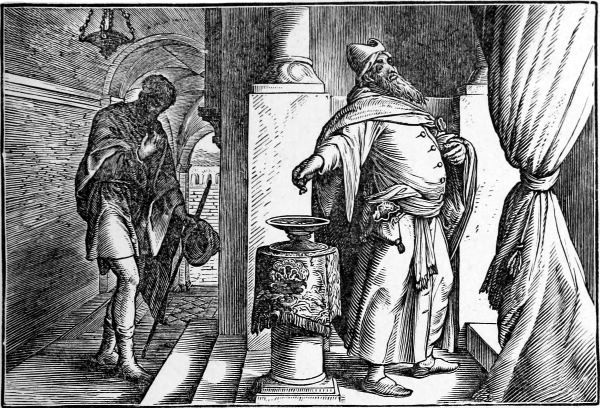
THE PHARISEE AND THE PUBLICAN.—Luke 18:11-13.
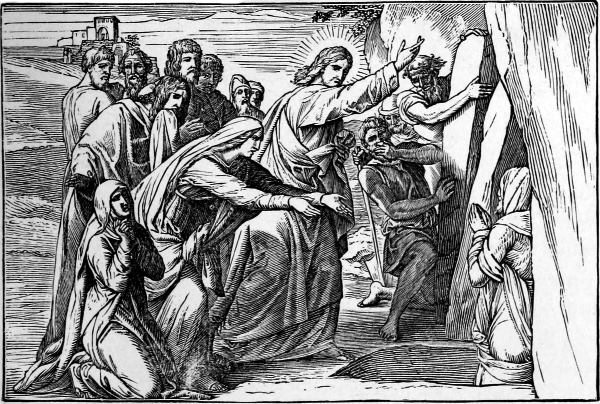
THE RAISING OF LAZARUS.—John 11:43, 44.
GOING UP TO JERUSALEM.
FIRST READING.
"Have mercy on us, O Lord, thou son of David."—Matt. 20:30.
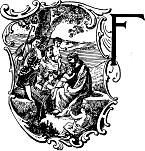
FOR three years our blessed Lord went about doing good and teaching, generally in Galilee, in the towns or on the hills, where the people came out to hear Him; and at the feasts, when people ought to worship at Jerusalem, He used to go up and speak to them in the outer court of the Temple.
But there was a wicked high priest named Caiaphas, who had been set up by the Romans, and he and the Pharisees and Sadducees all hated Jesus, because He found fault with their evil ways, and they would not believe He was the Christ, but wanted to put Him to death.
So whenever He came to Jerusalem it was more dangerous; and then they stirred up the chief men of Galilee, so that He could not be in the town, but had to wander on the hills. Once, when a man wanted to follow Him, He said, "Foxes have holes, and the birds of the air have nests; but the Son of man hath not where to lay His head."
And at last, when His time was come, He set His face to go to Jerusalem to keep the Passover, though He knew that He[Pg 299] would be taken and put to death there, and so be the real Passover. As He was going, two blind men, who sat by the roadside begging, called out, "Have mercy on us, O Lord, thou son of David!" And He stood still and cured them both.
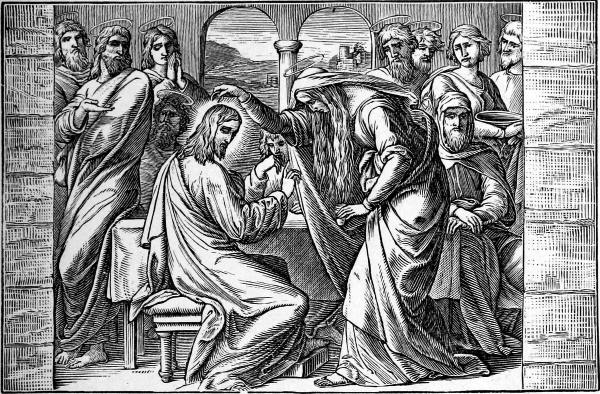
MARY ANOINTS THE HEAD OF JESUS.—Mark 14:1-11.
QUESTIONS.
1. How long did our blessed Lord teach? 2. Where did He teach? 3. When did He go to Jerusalem? 4. What did He go to Jerusalem for? 5. Where did He teach? 6. Who hated him? 7. Who was Caiaphas? 8. Why did they hate Him? 9. Where did they drive Him? 10. What did He say about having no home? 11. When did He set His face to go to Jerusalem? 12. What feast was He going to keep? 13. What did He know would happen to Him? 14. Whom did He cure as He was going? 15. What did the blind men cry out?

SECOND READING.
"Hosanna to the son of David."—Matt. 21:9.

IT was only the great rich wicked men that hated our Lord. The common people heard Him gladly, and only wanted Him to begin to be king. And they really thought the time was come when He came up to Jerusalem. Just before He came in, He sent two of His disciples to fetch a young ass on which no one had ever sat, and on it He rode down Mount Olivet.
Now, there was an old prophecy which said to Jerusalem, "Behold, thy King cometh unto thee, meek, and sitting upon an ass." People remembered this, and began to receive Him like a king; they spread their mantles on the ground before Him, and others cut down branches from the trees and strewed them in the way; and the people before and behind, especially the children, cried out with all their might, "Hosanna to the son of David:[Pg 301] Blessed is He that cometh in the name of the Lord; Hosanna in the highest. Hosanna means, "save now."

CHRIST ENTERING JERUSALEM.—Matt. 21:8, 9.
The Pharisees were very angry, and bade Him stop them; but He answered with the verse of a Psalm, "Yea, have ye never read, Out of the mouth of babes and sucklings hast Thou ordained strength?"
But as He looked at beautiful Jerusalem, He wept over the city, for He knew that sad and dreadful punishments were coming on it; and yet the people would not listen to Him, and be sorry, and so be saved.
QUESTIONS.
1. Who loved our Lord? 2. What did they want Him to do? 3. What made them think His reign was coming? 4. How did He come into Jerusalem? 5. What was the old prophecy? 6. What did the people do in His honor? 7. What did they cry? 8. What does "Hosanna" mean? 9. Who were angry? 10. What did He say? 11. But why was He grieving? 12. What made Him sorry for the city? 13. How were the people bringing sad punishment on themselves?
THIRD READING.
"My house shall be called the house of prayer."—Matt. 21:13.

THE first thing our blessed Lord did at Jerusalem was to go into the Temple; and there, in the courts, He found people keeping shop, selling the lambs that were wanted for the Passover, and doves for other services, and changing the coin that strangers brought for Jewish money.
This was very disrespectful to God, and He was angry. He had driven them all out once, and they had come back, and now they were doing it again. So He drove them all out, and told them His Father's house was a house of prayer, but they had made it a den of thieves.
No one dared to answer Him, and all that day and the next He stood in the Temple, teaching the people, and showing the[Pg 302] wickedness of the chief priests and Pharisees. It seemed as if all the people of Jerusalem were ready to follow Him, and as if He might begin His reign directly; but this was not what He came for, and, as He well knew, the Pharisees were planning against Him.
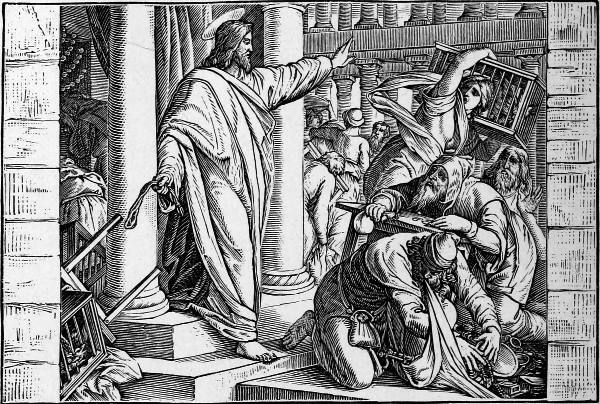
JESUS DRIVES OUT THE MONEY-CHANGERS.—Matt. 21:13.
They wanted to get Him to say something that they could say was against the Law, so they asked Him many hard questions, but His great wisdom put them all to silence, and made them ashamed; but they were so hard and wicked that they only hated Him the more.
QUESTIONS.
1. Where did our Lord go? 2. What were the Jews doing there? 3. Why was this wrong? 4. What did He do to them? 5. Had He done this before? 6. What did He tell them? 7. Who was his Father? 8. What was His Father's house? 9. What are our houses of prayer? 10. How must we behave in them? 11. Who were planning against Him? 12. But who followed Him gladly? 13. What did they want Him to be?
THE EVENING OF THE BETRAYAL.
FIRST READING.
"Jesus knew that his hour was come."—John 13:1.
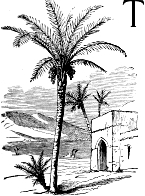
THE chief priests grew more fierce and bitter when they saw how all men listened to the Lord Jesus. They could do nothing to Him by day, because the people would have risen up to defend Him; so they tried how to find Him alone and at night, to take Him secretly.
Now, one of the twelve apostles, named Judas Iscariot, was too fond of money, and used to take for himself what was trusted to him to take care of. So he went on from bad to worse, till at last he did the dreadful thing of promising the chief priests that he would show them to some lonely place, where they could take his Lord and Master prisoner; and then they were to pay him for this wickedness with thirty pieces of silver.
Judas settled all this, and then he went back to our Lord and the other eleven apostles just as usual, thinking they did not know; but our Lord did know very well. But He bade the apostles get ready the supper that was eaten the night before the Passover, in a large upper room that was lent to them for it, and there He sat down to eat with them.
QUESTIONS.
1. What feast was being kept at Jerusalem? 2. Why were the priests and Pharisees angry? 3. What did they want to do? 4. Why did they not take Him in the Temple? 5. Where did they want to take him? 6. Who said He would show them the way? 7. What did they promise to Judas Iscariot? 8. Who was he? 9. Then how came he to be so wicked? 10. Where did our Lord go to eat His Last Supper? 11. Who were eating with Him?

JESUS WASHING HIS DISCIPLES FEET.—John 13:2-5.
SECOND READING.
"This do in remembrance of me."—Luke 22:19.

WHEN our Lord and His apostles were eating the Supper together, He was very sorrowful, and said, "One of you shall betray me." The apostles were grieved, and each said, "Lord, is it I?" And He said, "He that dippeth his hand with me in the dish, the same shall betray me."
And then, as the custom was, He dipped His piece of bread [Pg 305]in the dish in the middle of the table, and gave it to Judas. Then the wicked man presently got up and went away.
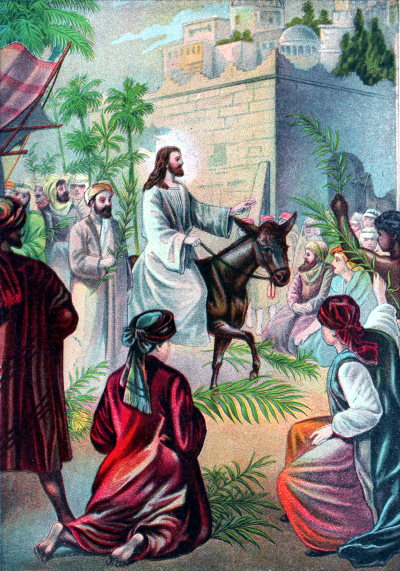
CHRIST ENTERING JERUSALEM.
And as they were still in the upper room, our Lord took bread and broke it, and gave a piece to each of His apostles, and said, "Take, eat: this is My Body, which is broken for you: this do in remembrance of me." And He took a Cup of wine, and said, "This Cup is the new testament in My Blood: This do, as oft as ye drink it, in remembrance of me."

THE LAST SUPPER.—Matt. 26:26-28.
And that was the beginning of what we call the Holy Sacrament of the Lord's Supper, "For as often as ye do eat of this Bread, and drink this Cup, ye do show the Lord's death till He come."
QUESTIONS.
1. Who were eating together? 2. When was it? 3. Why was our Lord sorrowful? 4. What did He say one of them would do? 5. What did they all ask? 6. Who did He say it would be? 7. What did He dip then? 8. To whom did He give it? 9. Who went away? 10. What holy Sacrament did He appoint? 11. What did He take? 12. What did He say of the bread? 13.[Pg 306] What did He then take? 14. What did He say of the wine? 15. What is the outward sign of the Lord's Supper? 16. What is the inward grace? 17. What does it show forth?

JESUS IN THE GARDEN OF GETHSEMANE.—Matt. 26:38, 39.
THIRD READING.
"Not as I will, but as Thou wilt."—Matt. 26:39.

SUPPER being over, and night coming on, our Lord went out with His disciples to a garden, full of olive trees, called Gethsemane, where He often used to pray. He told them again on the way that they would soon all be afraid, and leave Him; but Peter could not think so, and said boldly that if everybody fell from Him, he never would. But Jesus answered, "Verily, I say unto thee, that this night, before the cock crow, thou shalt deny me thrice."
Then He went on to the garden, taking only Peter, James, and John into it with Him, and telling them to watch while He went apart to pray. They were heavy and sorrowful, and could[Pg 307] not keep awake; but while He was praying, He was in the greatest trouble and grief that ever anyone felt.
He knelt and prayed in an agony, till His sweat was as great drops of blood falling down to the ground. For He was feeling the sorrow for all the sin of all the world—the sorrow that belongs to you and me.
The disciples heard Him say, "O my Father, if it be possible, let this cup pass from me: nevertheless, not as I will, but as Thou wilt." He came to them more than once, and called them, as if He longed for them to comfort Him; but still they fell asleep again, though He said, "What, could ye not watch with me one hour? The spirit indeed is willing, but the flesh is weak."
QUESTIONS.
1. Where did our Lord go then? 2. What was the garden full of? 3. What did He say the apostles would all do? 4. Who thought He never could leave Him? 5. What did our Lord tell Peter? 6. Whom did He take into the garden? 7. What were they to do? 8. What great grief did He suffer? 9. Why did He suffer such agony? 10. What did he pray? 11. What could not the disciples do? 12. What did He say at last? 13. What was their flesh? 14. Was He angry? 15. But was He not much grieved that they did not comfort Him?

THE TRIAL AND CONDEMNATION.
FIRST READING.
"Betrayest thou the Son of man with a kiss?"—Luke 22:48.
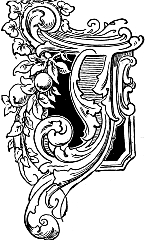
JUST as our Lord had wakened His three apostles for the last time, there came a tread of soldiers, and lanterns gleamed through the olive trees. For Judas Iscariot, the traitor, knew that his Master was apt to go to the olive garden to pray at night, and he was leading them, and he said to them, "Whomsoever I shall kiss, that same is He: hold Him fast." And he came up first to Jesus, and said, "Hail, master;" and kissed Him. All our Lord said was, "Judas, betrayest thou the Son of man with a kiss?"
Peter tried to defend Him, and drew a sword and cut off the ear of one of the servants; but our Lord bade him put the sword back into the sheath; and then, in His great love, our blessed Lord touched the ear, and cured it in an instant, and begged that all the disciples might be allowed to go their way. Indeed, they were so much afraid that they all forsook Him and fled away, except John and Peter, who both followed to see what would be done with Him.
The soldiers dragged our blessed Lord to the house of the high priest, Caiaphas, where his enemies tried to make out some charge to bring against Him; but as He was good and holy, and had no sin at all, they could accuse Him of nothing. And when[Pg 309] they asked Him questions, He answered them not a word, for He knew that it was only to accuse Him.
While He stood at the upper end of the hall, John, who knew one of the servants, had come in to the lower end, and had brought in Peter with him. The chill of the morning had come on, and the servants lighted a fire on the pavement, where Peter stood and warmed himself. One of the maids there looked at him, and asked if he did not belong to Jesus of Nazareth. Peter was afraid, and said, "I know not what thou sayest."
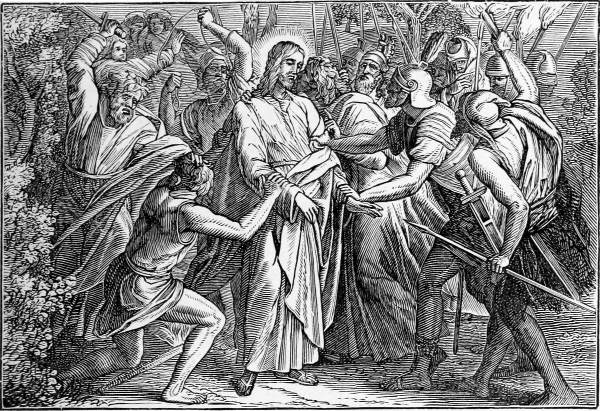
JUDAS BETRAYS JESUS.—Matt. 26:48-50.
But then another maid said, "This fellow was also with Jesus of Nazareth.." Peter grew more afraid, and went on declaring he did not know such a person; but presently another servant said, "Did not I see thee in the garden with Him?" Again Peter's fear of being punished for wounding the man in the garden led him further astray, for he began to curse and swear, and say, "I know not the man." Just then the cock crew, and the Lord turned round and looked upon Peter.
That look went to his heart. He went out and wept bitterly; and whenever he thought of his sin, he wept.

CHRIST BEFORE CAIAPHAS.—Matt. 26:65, 66.
QUESTIONS.
1. Where was our Lord? 2. What time was it? 3. Whom had He taken with Him? 4. Who came up in the night? 5. Who was leading them? 6. How did Judas show which was our Lord? 7. What was he wicked enough to say? 8. How did our Lord answer? 9. How did Peter try to save Him? 10. What blow did He strike? 11. What command did our Lord give Peter? 12. What did he do for the wounded man? 13. What care did He take for His disciples? 14. Who only followed Him? 15. Where was our Lord taken? 16. What did the chief priests try to find? 17. Why could they find nothing to accuse Him of? 18. What had He said Peter would do? 19. What had Peter then said? 20. Yet what did he do? 21. What made Him deny? 22. What did he answer? 23. What brought his better mind back? 24. What sound? 25. What look? 26. What did he do when he thought of his sin?

SECOND READING.
"He is brought as a lamb to the slaughter."—Isaiah 53:7.

AS soon as it was light, all the chief men of the Jews met in the council chamber in the Temple, and had our Lord brought before them. But no one could prove that He had broken the law; and whenever a story was brought against Him, it turned out not to be true.
At last the high priest stood up and commanded Him to say whether He were the Christ or not. He answered, "Thou hast said: nevertheless, I say unto you, hereafter shall ye see the Son of man sitting on the right hand of power, and coming in the clouds of heaven."
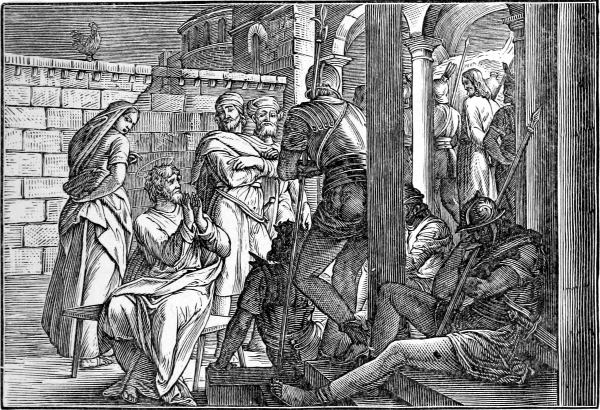
PETER DENYING JESUS.—Luke 22:60, 61.
At this answer, Caiaphas and all the other enemies made a great outcry, as if they were very much shocked, at His speaking of Himself as the great Judge of all—namely, as God.
They all cried, "He is guilty of death;" and they began to[Pg 312] beat Him and strike Him; and they blindfolded Him, and struck Him on the face, and bade Him say whose blow it was. And all the time He stood gentle and patient, and said not one word of complaint or anger.
Since the reign of the great wicked Herod, the Romans had not allowed the Jews to put anybody to death without their leave; so the chief priests were obliged to take Jesus before the Roman governor, Pontius Pilate. But it was not possible to find anything that a Roman would think He deserved to be put to death for.
When the chief priests said that "by our law He ought to die, because He made Himself the Son of God," Pilate only feared to do anything against Him; for he saw that there was no fault in Jesus, but that the chief priests were spiteful, and hated Him.
Then the chief priests said that He called Himself King of the Jews. This made Pilate more anxious, for to set up to be an earthly king would have been rebelling against the Romans; but still he wanted to let Jesus go, because he saw that He was innocent; yet he did not like to offend the priests, who might have accused him to the Emperor of Rome. Pilate saw what was just; but he was afraid, and cared for himself more than for his duty.
QUESTIONS.
1. Where did the chief priests meet? 2. Who was brought there before them? 3. What did they intend to do? 4. But could they find any fault in Him? 5. So what did the chief priest ask Him? 6. What did He say? 7. What did they all cry out? 8. How did they begin to treat Him? 9. How did He bear it all? 10. How can we try to be like Him? 11. What were not the Jews allowed to do? 12. Who had the power over them? 13. Before whom did the chief priests take our Lord? 14. Who was Pilate? 15. What did Pilate think of the charges against Him? 16. But why did not Pilate set Him free? 17. Why was he afraid of His being called King of the Jews?

THIRD READING.
"Ye denied the Holy One and the Just, and desired a murderer to be granted unto you."—Acts 3:14.

PILATE thought he had found a way of saving the Lord Jesus without offending the Romans. It was the custom that at the feast of the Passover he should set some prisoner free, whomsoever the Jews asked for. And he thought, as the people loved our Lord, that they would ask for Him.
But there was a robber and murderer in prison named Barabbas, and the enemies of our Lord went about among the people, stirring them up to ask for him to be set free; so that the poor, foolish people all broke out with a great shout to ask that this murderer Barabbas might be set free.
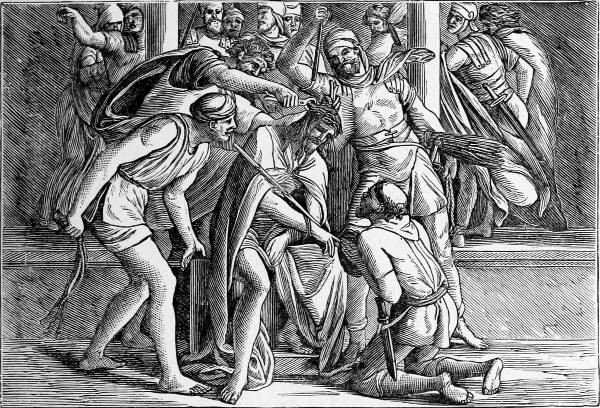
JESUS CROWNED WITH THORNS.—Mark 15:16-19.
Pilate asked them what he was to do with Jesus, and then there was a great roar from all the people, "Crucify Him! crucify Him!"
Now, crucifying was a very horrible and painful punishment, that had never been allowed among the Jews, but was chiefly used by the Romans themselves for slaves and for robbers; so that their savage cry was for Jesus to have the punishment that belonged to Barabbas.
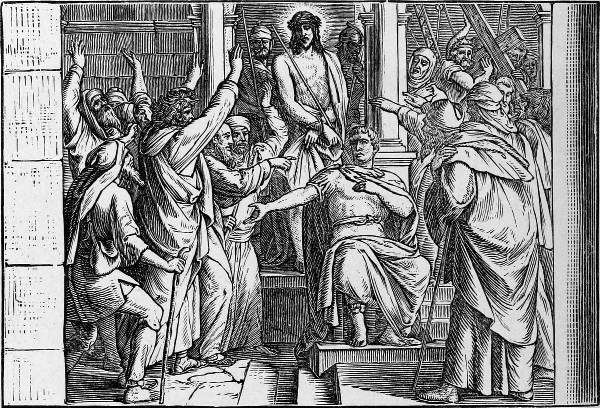
CHRIST BEFORE PILATE.—John 19:14-16.
Pilate's soldiers were very cruel, and they laughed at a poor man being called a king; so when they had beaten the blessed Jesus till He was bleeding all over, they took one of their old red soldiers' cloaks and threw it over Him; and they platted a crown of sharp thorns, and forced it upon His head; and they put a reed in his right hand, instead of a sceptre; and they bowed their knees, mocking Him by pretending to do Him honor.
He never spoke one word of anger all this time; and when Pilate saw His meek, brave, patient face, pale and faint with pain, and streaming with blood, he thought the people would pity Him; so he led Him out once more to the top of the steps of the judgment hall, and said, "Behold the man!" But the people were[Pg 315] too mad to have any pity or feeling, and they only cried louder and louder still, "Crucify Him! crucify Him!"
Pilate was not brave enough to go against them all, even to save an innocent man; so all he did was to take water and wash his hands before them all, to show that he was clear of wishing it, and he said, "I am innocent of the blood of this just person." But the chief priests made the dreadful answer, "His blood be on us, and on our children!" meaning that they would take the guilt and punishment.

THE END OF JUDAS ISCARIOT.—Matt. 27:3-5.
QUESTIONS.
1. What plan had Pilate for saving our Lord? 2. Whom did he always set free at the feast? 3. Whom did he wish to set free? 4. But whom did the chief priests make them ask for? 5. Who was Barabbas? 6. What did they all cry out? 7. What kind of punishment was crucifying? 8. To whom would it naturally have belonged? 9. But who was going to bear the worst of punishments? 10. How did the soldiers treat our Lord? 11. Why did they mock Him? 12. What did they put on His head? 13. What did they dress Him in? 14. What did they put in His hand? 15. What did Pilate hope to do? 16. What did he say? 17. What was the cry in answer?
THE CRUCIFIXION.
FIRST READING.
"They pierced my hands and my feet."—Ps. 22:16.
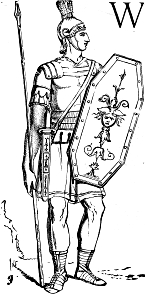
WHEN the judgment was over, Pilate gave up our Lord to the four soldiers who were to crucify Him. His cross, a heavy beam of wood, with another fastened across it, was laid on His shoulders, that He might carry it to the place where He was to suffer—a place named Calvary, outside the walls of Jerusalem.
He was so weak and worn out after the long sad night, the being taken from one judge to another, and the beating and tormenting, that He could hardly walk under it; and the soldiers met a man coming out of the country whom they forced to carry it after Jesus.
When they came to Calvary, the soldiers made the blessed Jesus lie down on the beam of wood, and they stretched His arms out on the cross-beam, and drove a large nail through each of the palms of His hands into the wood, and another nail through His feet; and then they lifted up the cross, with Him upon it, and planted it in the ground, that He might hang there till He should die.
And all He said while they were thus nailing Him were the[Pg 317] words, "Father, forgive them; for they know not what they do!" That was the great pain He bore to save us!
QUESTIONS.
1. Where was our Lord to be crucified? 2. Who led Him there? 3. Where was it? 4. What had He to carry? 5. But who had to be called to help Him? 6. Why was He so worn out? 7. What had they done to Him? 8. What was the cross? 9. How was He fastened to it? 10. What was done to it then? 11. What prayer did He make? 12. For whom was He praying? 13. For whom was He dying?
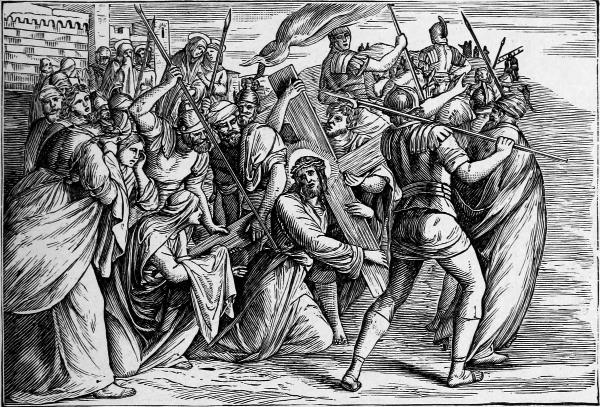
JESUS FALLS UNDER THE CROSS.—Luke 23:27, 28.
SECOND READING.
"Jesus of Nazareth the King of the Jews."—John 19:19.

OVER the head of the blessed Lord on the cross was a tablet, with the words, "Jesus of Nazareth the King of the Jews;" and on each side of Him was another cross, with a robber upon it.
There He hung patiently, while the chief priests and Pharisees passed by, mocking and laughing at His pain, and crying out, "He saved others; Himself He cannot[Pg 318] save. If He be the King of Israel, let Him now come down from the cross, and we will believe Him."
Even the robbers at first joined in the cry; but by-and-by one of them began to feel that He who was so patient and so great in all that agony must truly be the Son of God; and he rebuked his fellow, and said, "Lord, remember me when Thou comest into Thy kingdom!" And the Lord answered, "To-day shalt thou be with me in paradise!"

THE CRUCIFIXION.—John 19:30.
His holy mother had come to stand by the foot of His cross, and with her, her sister and some other women, and His beloved apostle John. The Lord looked down at her, and said, "Woman, behold thy son!" and He looked at St. John, and said, "Behold thy mother!" And John took the blessed Virgin home with him, and was always like a son to her afterward.
At noon-day, a dreadful darkness came over all the earth, and it lasted for three whole hours, as if the very sun mourned for Him who made it. Just at three o'clock, the blessed Lord[Pg 319] said, "I thirst;" and as one of the soldiers was touching His lips with a sponge full of vinegar, He gave a great sad cry, "My God, my God, why hast Thou forsaken me!"
Then presently he added, "It is finished! Father, into Thy hands I commend my spirit!" And He cried with a loud cry; and so He, who was God and man in one, died for us men, and for our salvation.
QUESTIONS.
1. What was set up over our Lord's head? 2. Who were crucified on each side? 3. How did the robbers behave at first? 4. How did one change? 5. What did he say? 6. How did our Lord answer? 7. Who were standing by His cross? 8. What did He say to His mother? 9. What did He say to John? 10. What did John do for her? 11. What came over the earth? 12. How long did the darkness last? 13. What did our Lord cry out? 14. How did a soldier try to quench His thirst? 15. What was His sad cry?
THIRD READING.
"And rested the sabbath day."—Luke 23:56.

THERE were some good people even among the chief of the Jews; and two of these, named Nicodemus and Joseph of Arimathea, went to Pontius Pilate, and asked him to let them bury the body of Jesus. People generally were much longer in dying on the cross, so Pilate sent to see if He was dead.
To make sure, one of the soldiers pierced His side with a spear, and out came blood and water together. The robbers were still alive, so the soldiers broke their legs, that they might die sooner; and so the repenting one soon went to our Lord in Paradise.
Then Nicodemus and Joseph of Arimathea took the holy body down from the cross, quite dead. Now, close by, Joseph had a garden, and in it was a cave which he meant to be buried in, but where no one had yet been laid. They carried our Lord's body there; and the good women who followed Him, Mary Magdalene and the rest, wrapped it up in linen cloths and sweet spices.
They wanted to do more for it; but it was getting late on Good Friday evening, and the Sabbath or seventh day was counted from sunset, and then they could do no manner of work. So they had to wait till the Sabbath should be over; and Joseph rolled a great rock to close up the door, and they went away in their grief.
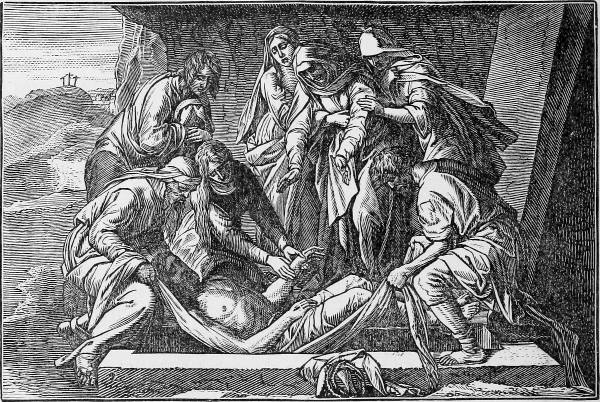
THE BURIAL OF JESUS.—John 19:41, 42.
And then came a guard of soldiers, whom the chief priests had sent to watch the stone, for fear, as they told Pilate, that the disciples should steal the body away in the night. So they put seals, to make sure that no one should move the stone; and the soldiers were set to watch.
QUESTIONS.
1. Who asked for our Lord's body? 2. What did Pilate want to know? 3. How did they make sure that our Lord was dead? 4. What was done to the robbers? 5. Where did Nicodemus and Joseph take the body? 6. To whom did the cave belong? 7. Who were there too? 8. How did they wrap the body? 9. What did they put with it? 10. Why did they not do any more? 11. What day was it? 12. What was the next day? 13. What is the Fourth Commandment? 14. When did the Sabbath begin?
THE RESURRECTION.
FIRST READING.
"Now is Christ risen from the dead."—1 Cor. 16:20.
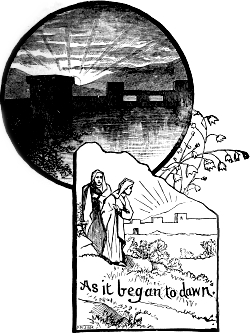
As it began to dawn.
THE holy women waited all the Sabbath day in sorrow; and our Lord Jesus lay in His grave. But, on the night after, He rose up from His grave, and came forth again, for He is alive for evermore. There was a great earthquake, and an angel came from heaven, and rolled away the stone from the door of the cave, and sat upon it; and for fear of him the keepers did shake, and were as dead men.
Very early in the morning, Mary Magdalene and the other women came with the sweet spices they had prepared. They wondered who would roll away the stone for them; but when they came nearer, they saw that it was taken away; and when they went in, they saw that the body of the Lord was gone.
They feared at first that some one had taken it away; but
behold, two men stood by them in shining garments, who said,
[Pg 322]
[Pg 323]"Why seek ye the living among the dead? He is not here, but is
risen, as He said. Come, see the place where the Lord lay."
And as the women went in great wonder to tell the disciples, they saw Jesus Himself, the same whom they had seen and touched quite dead the day before yesterday, standing before them, speaking kindly to them. So they held Him by the feet, and worshipped Him. For never was there such wonderful joy and gladness in all the world.

THE RESURRECTION.—Matt. 28:2-4.
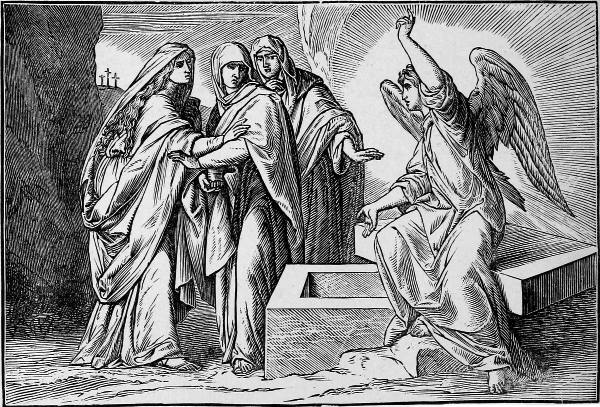
THE WOMEN AT THE TOMB OF JESUS.—Mark 16:5, 6.
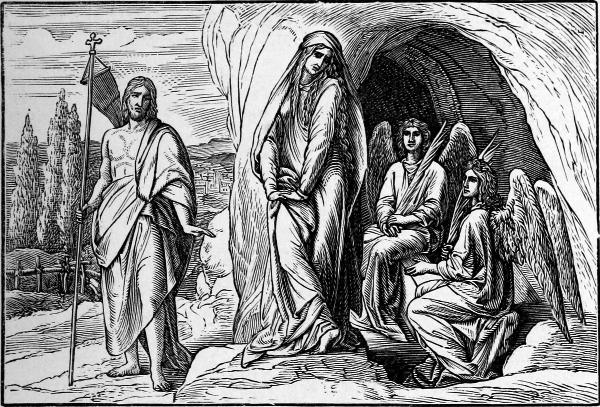
MARY MAGDALENE AT THE SEPULCHRE.—John 20:11-13.
QUESTIONS.
1. What happened all the Sabbath? 2. What happened the night after? 3. Who rose again? 4. Who came down from heaven? 5. What happened to the soldiers? 6. Who were the first at the grave in the morning? 7. What did they bring? 8. What did they wonder about? 9. What did they find? 10. Who stood by them? 11. What did the angels say? 12. Who was living? 13. Whom did they go to tell? 14. Who met them? 15. How did they show their joy? 16. Why were they so very glad? 17. What day was it?
SECOND READING.
"The Lord is risen."—Luke 24:34.

IT was the first day of the week that our Lord rose from the dead, and we call that day the Lord's day, and have kept it holy ever since, instead of the seventh. But on that first day it seemed too wonderful. The apostles had never understood when their Lord spoke of dying and rising again; and though the women said they had seen Him, they were afraid to trust their word, and thought it a mistake.
Later in the day, two of the disciples were walking to Emmaus, a little village near Jerusalem, when a stranger came and joined them. He asked why they were sad, and what they were talking of. They told Him it was of Jesus of Nazareth, who had been a great prophet, and they had hoped would have redeemed Israel; but now He had been put to death the day before[Pg 325] yesterday, yet that some of the women said that they had seen a vision of angels which said that He was alive.
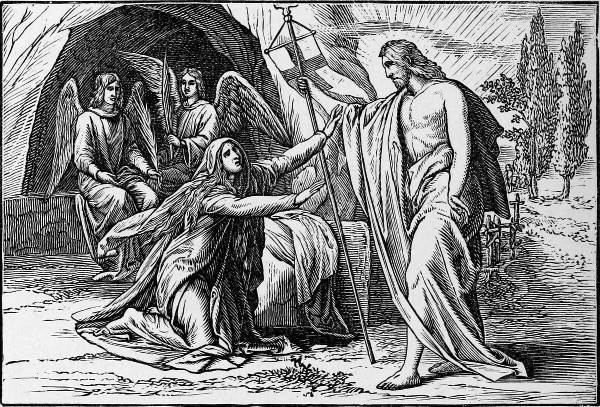
JESUS APPEARS TO MARY MAGDALENE.—John 20:16.
Then the stranger began to show them, as they had never seen before, that all the Old Testament meant that when the Christ came, the Seed of the woman, He was to suffer, and save the world before His kingdom and glory could begin; and their minds understood, for they were opened to see and know the Scripture, so that they were sure that Jesus was the Christ.
So they came to Emmaus, and went into a house; and the stranger made as if He would have gone farther, but they pressed Him to come in.
He sat down with them, and took bread and blessed and broke it; and then their eyes were opened, and they knew it was Jesus Himself! And as they knew Him, He vanished out of their sight. And they said to one another, "Did not our heart burn within us, while He talked with us by the way?"
QUESTIONS.
1. What day did our Lord rise? 2. What is it called? 3. Which day do we keep holy? 4. Who could not believe yet? 5. Where were two disciples going? 6. Who came and walked with them? 7. Who was it really? 8. Did they know Him?
THIRD READING.
"Peace be unto you."—Luke 24:36.

In the evening, the ten apostles were all together in the upper room, with the doors close shut, for fear of the Jews. There were only ten, for Thomas was not there; the wretched Judas had hung himself in his grief and despair.
The two disciples came back from Emmaus, and told how they had seen Jesus; and while they were telling about it, though the door was not opened, they found Jesus Himself standing in the midst, and they heard His voice say, "Peace be unto you."
They were afraid at first; but again He said, "Why are ye troubled? and why do thoughts arise in your hearts? Behold My hands and My feet, that it is I Myself: handle Me, and see; for a spirit hath not flesh and bones, as ye see Me have." Then He showed them that there were the marks of the nails in His hands and feet, and the spear-wound in His side; so that it was His own real body that had come again from the dead.

JESUS APPEARS TO TWO OF HIS DISCIPLES.—Luke 24:15.
And while they could not believe for joy, and wondered, He said, "Have ye here any meat?" And they gave Him a piece of broiled fish and a honeycomb; and He ate with them, to make them quite sure it was Himself.
QUESTIONS.
1. Where were the ten met? 2. Why were there only ten? 3. Who were away? 4. What had become of Judas? 5. Who had come home? 6. Who stood in the midst? 7. What did He say? 8. What did He show? 9. What did He eat before them?
THE ASCENSION.
FIRST READING.
"Blessed are they that have not seen, and yet have believed."—John 20:29.

then said Jesus unto
them be not afraid
OUR blessed Lord Jesus did not stay with His apostles as He did before His death and rising. They did not see Him after that first day for a whole week; and they could not make Thomas, who had not been there when He came, believe that it was true that any man could come again from the grave.
He said He should never believe that it was the Lord Himself, unless he could put his fingers into the prints of the nails, and his hand into the wound in the side.
The next Sunday evening, Thomas and the other ten were all in the upper room together, when Jesus came and stood in the midst, and said to Thomas, "Reach hither thy finger, and behold My hands; and reach hither thy hand, and thrust it into My side: and be not faithless, but believing."
Then Thomas knew Him indeed, and could only say, "My Lord and my God."
And the Lord answered, "Thomas, because thou hast seen me, thou hast believed: blessed are they that have not seen, and yet have believed." And that is the blessing for all of us, who[Pg 328] have not lived when our blessed Lord was on earth. We have not seen Him, but we must believe in Him; and that faith is the beginning of all goodness.
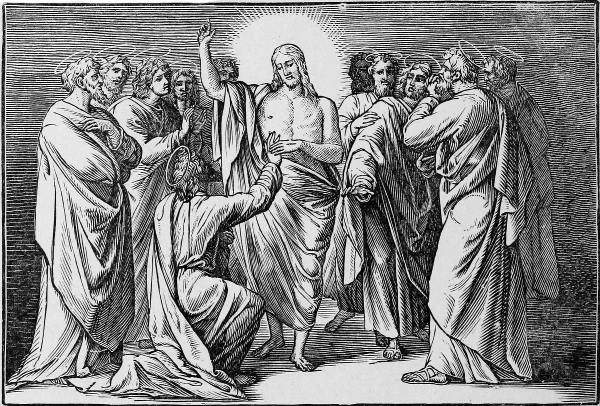
JESUS CONVINCING THOMAS OF HIS RESURRECTION.—John 20:26-29.
QUESTIONS.
1. What had happened on Easter-day? 2. Who saw our Lord then? 3. Who had not seen Him? 4. What could not Thomas believe? 5. What did He say? 6. What prints did he mean? 7. When did our Lord come again? 8. Where were the apostles? 9. Who was there this time? 10. What did our Lord say to him? 11. What did Thomas answer? 12. What did our Lord then say? 13. Why had Thomas believed? 14. But who are blessed? 15. Have we seen our Lord? 16. But what must we do? 17. What is believing called? 18. What begins with faith?

SECOND READING.
"Feed my lambs."—John 2:15.

OUR Lord told His apostles to go into Galilee; and there some of them went out fishing on the lake, as they used to do; but they fished all night, and caught nothing. In the dawn of morning, they saw One standing on the bank, and He said, "Children, have ye any meat?" They said, "No." Then He said, "Cast the net on the right side of the ship." And directly the net was full of a hundred and fifty-three fishes, all large and good, and it did not break!

JESUS APPEARS TO HIS DISCIPLES AT THE SEA OF TIBERIAS.—John 21:1-7.
Then John knew who it was, and said to Peter, "It is the Lord." And Peter was so glad, that he sprang out of the boat, and came hurrying through the water to His Master's feet.
And Jesus said, "Come and dine;" and the disciples found a fire ready lighted on the bank, with the broiled fish and bread;[Pg 330] and they ate with Him again, and felt His care after their long, weary, hungry night.
When they had eaten, the Lord said, "Simon, son of Jonas, lovest thou me more than these?"
"Yea, Lord, Thou knowest that I love Thee," Peter answered.
"Feed my sheep," our Lord said. Then again He asked, "Simon, son of Jonas, lovest thou me?" "Yea, Lord, Thou knowest that I love Thee," said Peter. "Feed my lambs," He said; and again He asked, "Simon, son of Jonas, lovest thou me?" Then Peter was grieved, and said, "Lord, Thou knowest all things; Thou knowest that I love Thee."
And again Jesus said, "Feed my sheep." Peter knew that our Lord is the Good Shepherd, and that His sheep and lambs are the people and the children of His flock, the Church; and that he was to show his love for His Master by taking care of them.
QUESTIONS.
1. Where did our Lord come to His disciples again? 2. What were they doing? 3. What time did He come? 4. How did they know Him? 5. Had He ever done anything like this before? 6. Who knew Him first? 7. Who sprang to Him first? 8. What did He give them to eat? 9. What question did He ask Peter three times? 10. What had Peter once done three times? 11. What did Peter answer now? 12. What did our Lord three times bid him do? 13. Who is the good Shepherd? 14. Who are His sheep? 15. Who are His lambs?
THIRD READING.
"This same Jesus, which is taken up from you into heaven, shall so come in like manner as ye have seen Him go into heaven."—Acts 1:11.

FOR forty days our Lord came in ways like what I have told you to see and teach His disciples. Once, five hundred of them saw Him together; but He never came to the wicked unbelieving Jews again.
But when the feast of weeks was near, the disciples went back to keep it at Jerusalem. There our Lord came to them again, and He led the eleven apostles out[Pg 331] with Him to the Mount of Olives. He taught them, and charged them much; and He gave them a great command, "Go ye therefore, and teach all nations, baptising them in the name of the Father, and of the Son, and of the Holy Ghost: teaching them to observe all things whatsoever I have commanded you: and, lo, I am with you alway, even unto the end of the world."
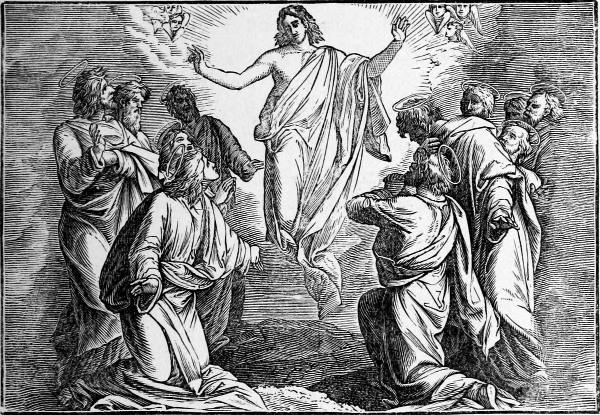
THE ASCENSION.—Luke 24:50, 51.
And then He bade them stay at Jerusalem until they should be endued with power from on high. And while He talked with them, He was parted from them, and went rising up into heaven, going higher and higher, till a cloud received Him out of their sight.
While they still looked up after Him, two angels stood by them, and said, "Ye men of Galilee, why stand ye gazing up into heaven? this same Jesus, which is taken up from you into heaven, shall so come in like manner as ye have seen Him go into heaven."
And so it was that our blessed Lord Jesus ascended up to His throne in heaven again, after He had been born, and lived, and died to save us. And there He is in heaven, now watching over us, and laying all our prayers before His Father in heaven, and getting ready our home there for each of us.
QUESTIONS.
1. How long did our Lord stay below? 2. Where did the disciples go? 3. Where did He take them with Him? 4. What was the great charge He gave them? 5. Whom were they to teach? 6. What were they to do to those whom they taught? 7. In whose name were they to baptize them? 8. What were they to teach them? 9. Who would always be with them? 10. What happened while He was speaking? 11. Where did He rise? 12. Who came to tell them where He was gone? 13. What do we call the day? 14. When will He come again?

THE WAITING-TIME.
FIRST READING.
"I will pray the Father, and he shall give you another Comforter, that he may abide with you forever."—John 14:16.

OUR Lord had told the apostles that though He was going to heaven, He would send them another Comforter, who would be with them for ever, and in whom He Himself should be present with them—even God the Holy Ghost, who is One with God the Father and God the Son.
Ten days after He had ascended up to heaven, on the great day of the feast of weeks (or, as we call it, Whitsunday), as the disciples were together in one place at Jerusalem, they heard a sound like the noise of a rushing mighty wind, and it filled all the house; and there came flames like tongues divided in the midst, and sat on the head of each disciple—not burning, but shining.
And wonderful knowledge came to all of them—they understood all they could not understand before; and they could speak all sorts of different languages, without ever having learnt them. These wonders were to show them that God the Holy Ghost had[Pg 334] come down from heaven to be with them, and to dwell in them, and help them, and make them strong for ever and ever.
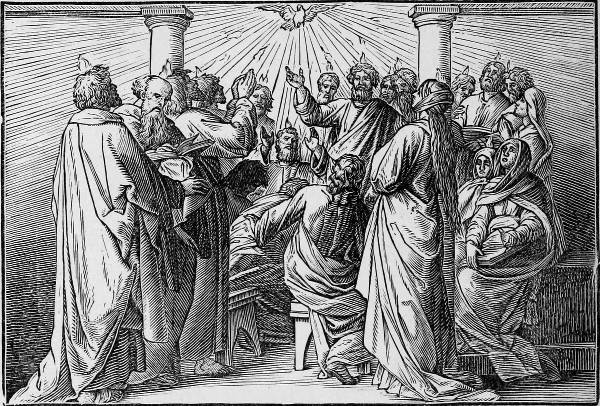
TONGUES OF FIRE RESTING ON THE DISCIPLES.—Acts 2:2-4.
QUESTIONS.
1. Whom had our Lord promised to send His disciples? 2. Who is that Comforter? 3. Who is with us when God the Holy Ghost is with us? 4. How long after our Lord's Ascension did He come? 5. What feast was it? 6. What do we call the day? 7. Where were the disciples? 8. How did they know when God the Holy Ghost came down? 9. What did they hear?
SECOND READING.
"Abide in me."—John 15:4.

THE Lord God the Holy Ghost goes on coming and being with us still. He does not show us when He comes now, because it is more blessed to believe than to see; but we know He does come to each of us when we are baptised, to help us and make us good.
The reason He made the apostles able to speak all those languages, was that they were to go and teach all the nations round the Gospel—that is to say, the good news that[Pg 335] Christ was come, and had died for the sins of everyone, and risen again. They did go and teach; and all who chose to believe and belong to Christ's kingdom were baptised.
Then each of us receives the Presence of the Holy Ghost, to help us to be good, and to keep God's holy law, the Ten Commandments, that He gave on Mount Sinai.
More and more of that good help of the Holy Spirit is given to everyone who comes, as our Lord bade, to take and eat and drink of the bread and wine, by which we partake of the Body and Blood of Christ; and He gives all that we ask to us if we pray to Him. For we belong to those nations that the apostles were commanded to teach and baptise, and bring into the fold; and we belong to Jesus Christ just as much as His own first disciples did.
We are called Christians, after His name; and all the time we live here, He takes care of us; and if we serve Him, He takes our souls to be with Him in Paradise, when death parts them from our bodies.
QUESTIONS.
1. Who stays with us still? 2. When does He come to us? 3. What does He come to us for? 4. Why did He teach the apostles to speak languages? 5. Where were they to teach the nations? 6. What does Gospel mean? 7. What is the good news? 8. Who belong to His kingdom? 9. What have we to do? 10. What are His laws? 11. Who will help us to keep them?
THIRD READING.
"We, according to His promise, look for new heavens and a new earth."—2 Pet. 3:13.

THE Lord Jesus Christ is coming again. We do not know when it will be; but, sometime or other, He will send His angel to blow a trumpet; and all that are in their graves shall hear His voice, and their souls will come back to their bodies; and we shall all be alive again; and if we have been good and holy, we shall be caught up to meet the Lord Jesus in the air.
For then He will come, with all His holy angels, and will sit on a great white throne; and all that have ever lived will be called before Him, and judged for all the things they have done, and the words they have said.
And then those that have gone on doing wrong, and never being sorry, and never caring for the Lord Jesus, but have made Satan their master, will be given to Satan, to be in misery in hell-fire for ever.
But those who have tried to do their best, and held fast to our Lord Jesus, and prayed Him to wash them clean in His blood, will be taken home for His sake. And they will have the happiest and most blessed home that ever can be in heaven. There will be all brightness, and no more pain, nor grief, nor sorrow; and the Lord shall wipe off all tears from all eyes; and there shall be gladness and joy for ever and ever.
The old earth will be burnt up; but there will be new heavens, and a new earth, all beautiful, with nothing that will hurt or spoil or fade, but all lovely and peaceful.
And then there will be the great joy of singing the praise of God, who made us, and saved us, and helps us to be good, for ever and ever.
Holy, holy, holy, Lord God Almighty, which was, and is, and is to come! Alleluia!
QUESTIONS.
1. When will our Lord come again? 2. What will He come for? 3. How will the dead be waked? 4. Who will be caught up to meet Him? 5. What will He sit on? 6. Who will come before Him? 7. What will everybody be tried for? 8. Who will be punished? 9. Who will be saved? 10. What will become of the old world? 11. What will the new home be? 12. What sort of place will it be? 13. Why will it be so happy?
By ANNE FLETCHER.
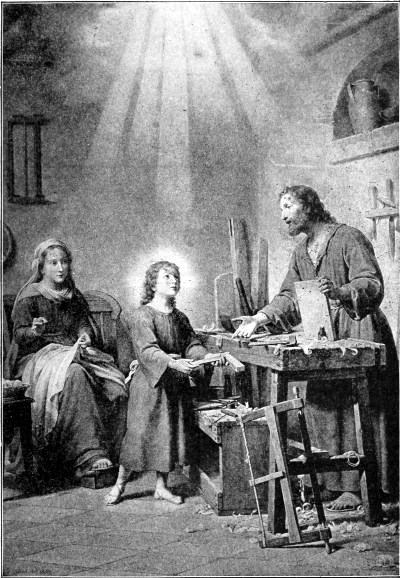
THE CHILD CHRIST, MARY HIS MOTHER AND JOSEPH
JESUS RENDERED OBEDIENCE, NOT ONLY TO MARY, BUT TO JOSEPH—LUKE 2:51.
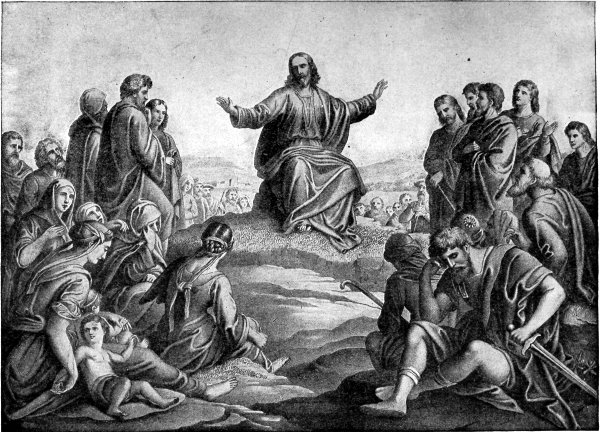
THE SERMON ON THE MOUNT
St. Matthew 5:5-7. St. Luke 6:20-49.

FINDING OF THE LOST SHEEP.
St. Matthew 18.12-14; St. Luke 15.3-7
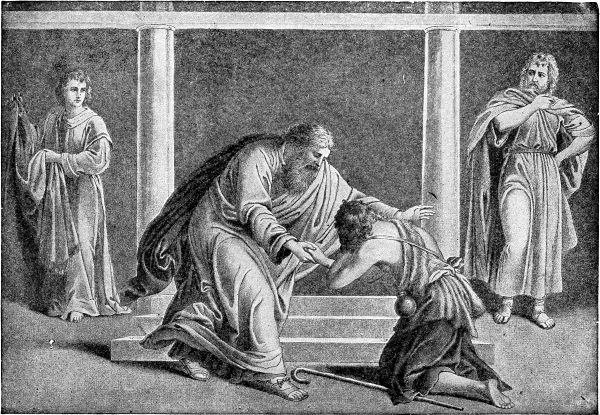
RETURN OF THE PRODIGAL SON.
St. Luke 15.15-32
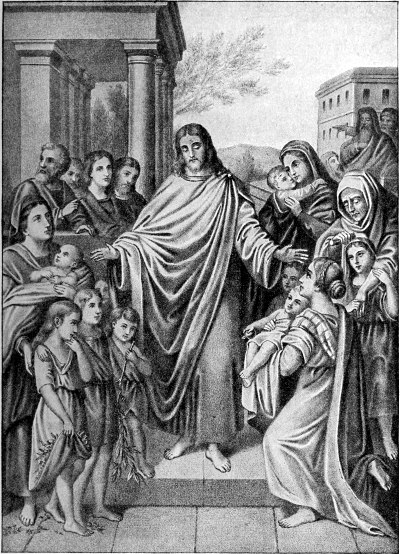
CHRIST BLESSING LITTLE CHILDREN
ST. MATTHEW 19:13-15; ST. MARK 10:13-16; ST. LUKE 18.15, 16.
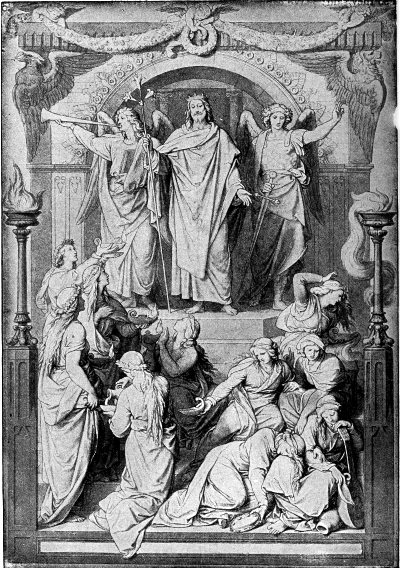
THE WISE AND FOOLISH VIRGINS.
St. Matthew 25:1-13

THE CRUCIFIXION
St. Matthew 27:35-38; St. Mark 15:24-28; St. Luke 23:33, 34; St. John 19:18-24
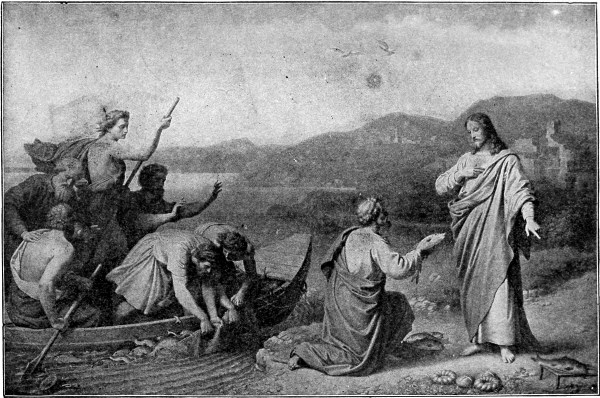
"THEY CAST THE NET ON THE RIGHT SIDE OF THE SHIP AND WERE NOT ABLE
TO DRAW IT FOR THE MULTITUDE OF FISHES." St. John 21. 6
Transcriber's Notes:
In the list of illustrations Return of the Prodigal Son 278 has been corrected to 378.
Illustrations have been moved out of mid-paragraph.
Variations in spelling and hyphenation are retained.
Punctuation has been retained as published.
End of Project Gutenberg's Captivating Bible Stories, by Charlotte Mary Yonge
*** END OF THIS PROJECT GUTENBERG EBOOK CAPTIVATING BIBLE STORIES ***
***** This file should be named 62126-h.htm or 62126-h.zip *****
This and all associated files of various formats will be found in:
http://www.gutenberg.org/6/2/1/2/62126/
Produced by Richard Hulse, Alan and the Online Distributed
Proofreading Team at https://www.pgdp.net (This file was
produced from images generously made available by The
Internet Archive)
Updated editions will replace the previous one--the old editions will
be renamed.
Creating the works from print editions not protected by U.S. copyright
law means that no one owns a United States copyright in these works,
so the Foundation (and you!) can copy and distribute it in the United
States without permission and without paying copyright
royalties. Special rules, set forth in the General Terms of Use part
of this license, apply to copying and distributing Project
Gutenberg-tm electronic works to protect the PROJECT GUTENBERG-tm
concept and trademark. Project Gutenberg is a registered trademark,
and may not be used if you charge for the eBooks, unless you receive
specific permission. If you do not charge anything for copies of this
eBook, complying with the rules is very easy. You may use this eBook
for nearly any purpose such as creation of derivative works, reports,
performances and research. They may be modified and printed and given
away--you may do practically ANYTHING in the United States with eBooks
not protected by U.S. copyright law. Redistribution is subject to the
trademark license, especially commercial redistribution.
START: FULL LICENSE
THE FULL PROJECT GUTENBERG LICENSE
PLEASE READ THIS BEFORE YOU DISTRIBUTE OR USE THIS WORK
To protect the Project Gutenberg-tm mission of promoting the free
distribution of electronic works, by using or distributing this work
(or any other work associated in any way with the phrase "Project
Gutenberg"), you agree to comply with all the terms of the Full
Project Gutenberg-tm License available with this file or online at
www.gutenberg.org/license.
Section 1. General Terms of Use and Redistributing Project
Gutenberg-tm electronic works
1.A. By reading or using any part of this Project Gutenberg-tm
electronic work, you indicate that you have read, understand, agree to
and accept all the terms of this license and intellectual property
(trademark/copyright) agreement. If you do not agree to abide by all
the terms of this agreement, you must cease using and return or
destroy all copies of Project Gutenberg-tm electronic works in your
possession. If you paid a fee for obtaining a copy of or access to a
Project Gutenberg-tm electronic work and you do not agree to be bound
by the terms of this agreement, you may obtain a refund from the
person or entity to whom you paid the fee as set forth in paragraph
1.E.8.
1.B. "Project Gutenberg" is a registered trademark. It may only be
used on or associated in any way with an electronic work by people who
agree to be bound by the terms of this agreement. There are a few
things that you can do with most Project Gutenberg-tm electronic works
even without complying with the full terms of this agreement. See
paragraph 1.C below. There are a lot of things you can do with Project
Gutenberg-tm electronic works if you follow the terms of this
agreement and help preserve free future access to Project Gutenberg-tm
electronic works. See paragraph 1.E below.
1.C. The Project Gutenberg Literary Archive Foundation ("the
Foundation" or PGLAF), owns a compilation copyright in the collection
of Project Gutenberg-tm electronic works. Nearly all the individual
works in the collection are in the public domain in the United
States. If an individual work is unprotected by copyright law in the
United States and you are located in the United States, we do not
claim a right to prevent you from copying, distributing, performing,
displaying or creating derivative works based on the work as long as
all references to Project Gutenberg are removed. Of course, we hope
that you will support the Project Gutenberg-tm mission of promoting
free access to electronic works by freely sharing Project Gutenberg-tm
works in compliance with the terms of this agreement for keeping the
Project Gutenberg-tm name associated with the work. You can easily
comply with the terms of this agreement by keeping this work in the
same format with its attached full Project Gutenberg-tm License when
you share it without charge with others.
1.D. The copyright laws of the place where you are located also govern
what you can do with this work. Copyright laws in most countries are
in a constant state of change. If you are outside the United States,
check the laws of your country in addition to the terms of this
agreement before downloading, copying, displaying, performing,
distributing or creating derivative works based on this work or any
other Project Gutenberg-tm work. The Foundation makes no
representations concerning the copyright status of any work in any
country outside the United States.
1.E. Unless you have removed all references to Project Gutenberg:
1.E.1. The following sentence, with active links to, or other
immediate access to, the full Project Gutenberg-tm License must appear
prominently whenever any copy of a Project Gutenberg-tm work (any work
on which the phrase "Project Gutenberg" appears, or with which the
phrase "Project Gutenberg" is associated) is accessed, displayed,
performed, viewed, copied or distributed:
This eBook is for the use of anyone anywhere in the United States and
most other parts of the world at no cost and with almost no
restrictions whatsoever. You may copy it, give it away or re-use it
under the terms of the Project Gutenberg License included with this
eBook or online at www.gutenberg.org. If you are not located in the
United States, you'll have to check the laws of the country where you
are located before using this ebook.
1.E.2. If an individual Project Gutenberg-tm electronic work is
derived from texts not protected by U.S. copyright law (does not
contain a notice indicating that it is posted with permission of the
copyright holder), the work can be copied and distributed to anyone in
the United States without paying any fees or charges. If you are
redistributing or providing access to a work with the phrase "Project
Gutenberg" associated with or appearing on the work, you must comply
either with the requirements of paragraphs 1.E.1 through 1.E.7 or
obtain permission for the use of the work and the Project Gutenberg-tm
trademark as set forth in paragraphs 1.E.8 or 1.E.9.
1.E.3. If an individual Project Gutenberg-tm electronic work is posted
with the permission of the copyright holder, your use and distribution
must comply with both paragraphs 1.E.1 through 1.E.7 and any
additional terms imposed by the copyright holder. Additional terms
will be linked to the Project Gutenberg-tm License for all works
posted with the permission of the copyright holder found at the
beginning of this work.
1.E.4. Do not unlink or detach or remove the full Project Gutenberg-tm
License terms from this work, or any files containing a part of this
work or any other work associated with Project Gutenberg-tm.
1.E.5. Do not copy, display, perform, distribute or redistribute this
electronic work, or any part of this electronic work, without
prominently displaying the sentence set forth in paragraph 1.E.1 with
active links or immediate access to the full terms of the Project
Gutenberg-tm License.
1.E.6. You may convert to and distribute this work in any binary,
compressed, marked up, nonproprietary or proprietary form, including
any word processing or hypertext form. However, if you provide access
to or distribute copies of a Project Gutenberg-tm work in a format
other than "Plain Vanilla ASCII" or other format used in the official
version posted on the official Project Gutenberg-tm web site
(www.gutenberg.org), you must, at no additional cost, fee or expense
to the user, provide a copy, a means of exporting a copy, or a means
of obtaining a copy upon request, of the work in its original "Plain
Vanilla ASCII" or other form. Any alternate format must include the
full Project Gutenberg-tm License as specified in paragraph 1.E.1.
1.E.7. Do not charge a fee for access to, viewing, displaying,
performing, copying or distributing any Project Gutenberg-tm works
unless you comply with paragraph 1.E.8 or 1.E.9.
1.E.8. You may charge a reasonable fee for copies of or providing
access to or distributing Project Gutenberg-tm electronic works
provided that
* You pay a royalty fee of 20% of the gross profits you derive from
the use of Project Gutenberg-tm works calculated using the method
you already use to calculate your applicable taxes. The fee is owed
to the owner of the Project Gutenberg-tm trademark, but he has
agreed to donate royalties under this paragraph to the Project
Gutenberg Literary Archive Foundation. Royalty payments must be paid
within 60 days following each date on which you prepare (or are
legally required to prepare) your periodic tax returns. Royalty
payments should be clearly marked as such and sent to the Project
Gutenberg Literary Archive Foundation at the address specified in
Section 4, "Information about donations to the Project Gutenberg
Literary Archive Foundation."
* You provide a full refund of any money paid by a user who notifies
you in writing (or by e-mail) within 30 days of receipt that s/he
does not agree to the terms of the full Project Gutenberg-tm
License. You must require such a user to return or destroy all
copies of the works possessed in a physical medium and discontinue
all use of and all access to other copies of Project Gutenberg-tm
works.
* You provide, in accordance with paragraph 1.F.3, a full refund of
any money paid for a work or a replacement copy, if a defect in the
electronic work is discovered and reported to you within 90 days of
receipt of the work.
* You comply with all other terms of this agreement for free
distribution of Project Gutenberg-tm works.
1.E.9. If you wish to charge a fee or distribute a Project
Gutenberg-tm electronic work or group of works on different terms than
are set forth in this agreement, you must obtain permission in writing
from both the Project Gutenberg Literary Archive Foundation and The
Project Gutenberg Trademark LLC, the owner of the Project Gutenberg-tm
trademark. Contact the Foundation as set forth in Section 3 below.
1.F.
1.F.1. Project Gutenberg volunteers and employees expend considerable
effort to identify, do copyright research on, transcribe and proofread
works not protected by U.S. copyright law in creating the Project
Gutenberg-tm collection. Despite these efforts, Project Gutenberg-tm
electronic works, and the medium on which they may be stored, may
contain "Defects," such as, but not limited to, incomplete, inaccurate
or corrupt data, transcription errors, a copyright or other
intellectual property infringement, a defective or damaged disk or
other medium, a computer virus, or computer codes that damage or
cannot be read by your equipment.
1.F.2. LIMITED WARRANTY, DISCLAIMER OF DAMAGES - Except for the "Right
of Replacement or Refund" described in paragraph 1.F.3, the Project
Gutenberg Literary Archive Foundation, the owner of the Project
Gutenberg-tm trademark, and any other party distributing a Project
Gutenberg-tm electronic work under this agreement, disclaim all
liability to you for damages, costs and expenses, including legal
fees. YOU AGREE THAT YOU HAVE NO REMEDIES FOR NEGLIGENCE, STRICT
LIABILITY, BREACH OF WARRANTY OR BREACH OF CONTRACT EXCEPT THOSE
PROVIDED IN PARAGRAPH 1.F.3. YOU AGREE THAT THE FOUNDATION, THE
TRADEMARK OWNER, AND ANY DISTRIBUTOR UNDER THIS AGREEMENT WILL NOT BE
LIABLE TO YOU FOR ACTUAL, DIRECT, INDIRECT, CONSEQUENTIAL, PUNITIVE OR
INCIDENTAL DAMAGES EVEN IF YOU GIVE NOTICE OF THE POSSIBILITY OF SUCH
DAMAGE.
1.F.3. LIMITED RIGHT OF REPLACEMENT OR REFUND - If you discover a
defect in this electronic work within 90 days of receiving it, you can
receive a refund of the money (if any) you paid for it by sending a
written explanation to the person you received the work from. If you
received the work on a physical medium, you must return the medium
with your written explanation. The person or entity that provided you
with the defective work may elect to provide a replacement copy in
lieu of a refund. If you received the work electronically, the person
or entity providing it to you may choose to give you a second
opportunity to receive the work electronically in lieu of a refund. If
the second copy is also defective, you may demand a refund in writing
without further opportunities to fix the problem.
1.F.4. Except for the limited right of replacement or refund set forth
in paragraph 1.F.3, this work is provided to you 'AS-IS', WITH NO
OTHER WARRANTIES OF ANY KIND, EXPRESS OR IMPLIED, INCLUDING BUT NOT
LIMITED TO WARRANTIES OF MERCHANTABILITY OR FITNESS FOR ANY PURPOSE.
1.F.5. Some states do not allow disclaimers of certain implied
warranties or the exclusion or limitation of certain types of
damages. If any disclaimer or limitation set forth in this agreement
violates the law of the state applicable to this agreement, the
agreement shall be interpreted to make the maximum disclaimer or
limitation permitted by the applicable state law. The invalidity or
unenforceability of any provision of this agreement shall not void the
remaining provisions.
1.F.6. INDEMNITY - You agree to indemnify and hold the Foundation, the
trademark owner, any agent or employee of the Foundation, anyone
providing copies of Project Gutenberg-tm electronic works in
accordance with this agreement, and any volunteers associated with the
production, promotion and distribution of Project Gutenberg-tm
electronic works, harmless from all liability, costs and expenses,
including legal fees, that arise directly or indirectly from any of
the following which you do or cause to occur: (a) distribution of this
or any Project Gutenberg-tm work, (b) alteration, modification, or
additions or deletions to any Project Gutenberg-tm work, and (c) any
Defect you cause.
Section 2. Information about the Mission of Project Gutenberg-tm
Project Gutenberg-tm is synonymous with the free distribution of
electronic works in formats readable by the widest variety of
computers including obsolete, old, middle-aged and new computers. It
exists because of the efforts of hundreds of volunteers and donations
from people in all walks of life.
Volunteers and financial support to provide volunteers with the
assistance they need are critical to reaching Project Gutenberg-tm's
goals and ensuring that the Project Gutenberg-tm collection will
remain freely available for generations to come. In 2001, the Project
Gutenberg Literary Archive Foundation was created to provide a secure
and permanent future for Project Gutenberg-tm and future
generations. To learn more about the Project Gutenberg Literary
Archive Foundation and how your efforts and donations can help, see
Sections 3 and 4 and the Foundation information page at
www.gutenberg.org
Section 3. Information about the Project Gutenberg Literary Archive Foundation
The Project Gutenberg Literary Archive Foundation is a non profit
501(c)(3) educational corporation organized under the laws of the
state of Mississippi and granted tax exempt status by the Internal
Revenue Service. The Foundation's EIN or federal tax identification
number is 64-6221541. Contributions to the Project Gutenberg Literary
Archive Foundation are tax deductible to the full extent permitted by
U.S. federal laws and your state's laws.
The Foundation's principal office is in Fairbanks, Alaska, with the
mailing address: PO Box 750175, Fairbanks, AK 99775, but its
volunteers and employees are scattered throughout numerous
locations. Its business office is located at 809 North 1500 West, Salt
Lake City, UT 84116, (801) 596-1887. Email contact links and up to
date contact information can be found at the Foundation's web site and
official page at www.gutenberg.org/contact
For additional contact information:
Dr. Gregory B. Newby
Chief Executive and Director
gbnewby@pglaf.org
Section 4. Information about Donations to the Project Gutenberg
Literary Archive Foundation
Project Gutenberg-tm depends upon and cannot survive without wide
spread public support and donations to carry out its mission of
increasing the number of public domain and licensed works that can be
freely distributed in machine readable form accessible by the widest
array of equipment including outdated equipment. Many small donations
($1 to $5,000) are particularly important to maintaining tax exempt
status with the IRS.
The Foundation is committed to complying with the laws regulating
charities and charitable donations in all 50 states of the United
States. Compliance requirements are not uniform and it takes a
considerable effort, much paperwork and many fees to meet and keep up
with these requirements. We do not solicit donations in locations
where we have not received written confirmation of compliance. To SEND
DONATIONS or determine the status of compliance for any particular
state visit www.gutenberg.org/donate
While we cannot and do not solicit contributions from states where we
have not met the solicitation requirements, we know of no prohibition
against accepting unsolicited donations from donors in such states who
approach us with offers to donate.
International donations are gratefully accepted, but we cannot make
any statements concerning tax treatment of donations received from
outside the United States. U.S. laws alone swamp our small staff.
Please check the Project Gutenberg Web pages for current donation
methods and addresses. Donations are accepted in a number of other
ways including checks, online payments and credit card donations. To
donate, please visit: www.gutenberg.org/donate
Section 5. General Information About Project Gutenberg-tm electronic works.
Professor Michael S. Hart was the originator of the Project
Gutenberg-tm concept of a library of electronic works that could be
freely shared with anyone. For forty years, he produced and
distributed Project Gutenberg-tm eBooks with only a loose network of
volunteer support.
Project Gutenberg-tm eBooks are often created from several printed
editions, all of which are confirmed as not protected by copyright in
the U.S. unless a copyright notice is included. Thus, we do not
necessarily keep eBooks in compliance with any particular paper
edition.
Most people start at our Web site which has the main PG search
facility: www.gutenberg.org
This Web site includes information about Project Gutenberg-tm,
including how to make donations to the Project Gutenberg Literary
Archive Foundation, how to help produce our new eBooks, and how to
subscribe to our email newsletter to hear about new eBooks.